
ORANGE CITY COUNCIL
Ordinary Council Meeting
Agenda
7 November 2017
Notice
is hereby given, in accordance with the provisions of the Local Government Act
1993 that a Ordinary meeting of ORANGE CITY COUNCIL
will be held in the Council Chamber,
Civic Centre, Byng Street, Orange on Tuesday, 7 November 2017 commencing
at 7.00pm.
Garry
Styles
General Manager
For apologies please
contact Michelle Catlin on 6393 8246.
1 Introduction
1.1 Apologies
and Leave of Absence
1.2 Acknowledgement
of Country
I would like to acknowledge the Wiradjuri people who are the
Traditional Custodians of the Land. I would also like to pay respect to the
Elders both past and present of the Wiradjuri Nation and extend that respect to
other Aboriginal Australians who are present.
1.3 Declaration
of pecuniary interests, significant non-pecuniary interests and less than
significant non-pecuniary interests
The
provisions of Chapter 14 of the Local Government Act, 1993 (the Act)
regulate the way in which Councillors and designated staff of Council conduct
themselves to ensure that there is no conflict between their private interests
and their public role.
The
Act prescribes that where a member of Council (or a Committee of Council) has a
direct or indirect financial (pecuniary) interest in a matter to be considered
at a meeting of the Council (or Committee), that interest must be disclosed as
soon as practicable after the start of the meeting and the reasons given for
declaring such interest.
As
members are aware, the provisions of the Local Government Act restrict any
member who has declared a pecuniary interest in any matter from participating
in the discussion or voting on that matter, and requires that member to vacate
the Chamber.
Council’s Code of Conduct provides that if members have
a non-pecuniary conflict of interest, the nature of the conflict must be
disclosed. The Code of Conduct also provides for a number of ways in which a
member may manage non pecuniary conflicts of interest.
|
Recommendation
It is recommended that Councillors now disclose any
conflicts of interest in matters under consideration by the Council at this
meeting.
|
2 Mayoral
Minutes
Nil
3 Confirmation
of Minutes of Previous Meeting
|
RECOMMENDATION
That the Minutes of the Ordinary
Meeting of Orange City Council held on 17 October 2017 (copies of which were
circulated to all members) be and are hereby confirmed as a true and accurate
records of the proceedings of the Council meeting held on 17 October 2017.
|
Attachments
1 Minutes of the
Ordinary Meeting of Orange City Council held on 17 October 2017
ORANGE CITY COUNCIL
MINUTES OF THE
Ordinary Council Meeting
HELD IN Council Chamber, Civic Centre, Byng Street, Orange
ON 17 October 2017
COMMENCING AT 7.00pm
1 Introduction
Cr R Kidd (Mayor), Cr J McRae (Deputy Mayor), Cr K Duffy, Cr
J Hamling, Cr T Mileto, Cr S Munro, Cr S Nugent, Cr M Previtera, Cr S Romano,
Cr G Taylor, Cr R Turner, Cr J Whitton
General Manager, Director
Corporate and Commercial Services, Director Development Services, Director
Community, Recreation and Cultural Services, Manager Administration and
Governance, Manager Corporate and Community Relations, Operations Manager,
Works Manager, Manager Waste Services and Technical Support
|
RESOLVED
- 17/432 Cr
J Whitton/Cr S Romano
That Council permit the
Central Western Daily to livestream the meeting, media to film the meeting
and a CSU student to record the Council Meeting of 17 October 2017.
|
JON BAKER OF THE
CHURCH OF CHRIST LED THE COUNCIL IN PRAYER
1.3 ACKNOWLEDGEMENT OF COUNTRY
1.4 Declaration
of pecuniary interests, significant
non-pecuniary interests and less than significant non-pecuniary interests
Cr J McRae declared a significant non-pecuniary interest in
Item 5.7 (Requests for Financial Assistance - 1a – Donation to
Rotary Club of Orange Daybreak) – as a member of the Board of
Rotary Club of Orange Daybreak.
Cr J Whitton declared a pecuniary interest in Items 4.1,
4.2, 6.1 (Orange Airport Industrial Park) as a family member lives in the
precinct of the Airport.
Cr J Hamling declared a pecuniary interest in Item 5.9
(Stronger Country Communities) as he has a commercial arrangement with Housing
Plus.
2 Mayoral
Minutes
Nil
THE MAYOR DECLARED THE ORDINARY
MEETING OF COUNCIL ADJOURNED FOR THE CONDUCT OF THE OPEN FORUM AT 7.03PM
OPEN FORUM
Item 4.1 – Orange Local
Environmental Plan Amendment 9 – Orange Airport Industrial Park
Anne Salter
Ms Salter outlined her objection to
the Orange Airport Industrial Park proposal.
Kerry Rains
Ms Rains outlined her objection to the Orange Airport
Industrial Park proposal.
Jason Vials
Mr Vials outlined his objection to the Orange Airport
Industrial Park proposal.
Brock Skelton
Mr Skelton outlined his support of the Orange Airport
Industrial Park and requested Council continue to support the project.
Tim Wise
Mr Wise outlined his objection to the Orange Airport
Industrial Park proposal.
Susannah Playfair
Ms Playfair spoke on behalf of the Spring Hill and
Surrounding Districts Consultative Committee, and outlined the
Committee’s objections to the proposal.
John Holliday
Mr Holliday outlined his objection to the Orange Airport
Industrial Park proposal.
THE MAYOR DECLARED THE ORDINARY
MEETING OF COUNCIL RESUMED AT 7.50PM
3 Confirmation
of Minutes of Previous Meeting
|
RESOLVED
- 17/433 Cr
K Duffy/Cr S Munro
That the Minutes of the
Ordinary Meeting of Orange City Council held on 3 October 2017 (copies of
which were circulated to all members) be and are hereby confirmed as a true
and accurate record of the proceedings of the Council meeting held on 3
October 2017.
|
4 Notices
of Motion/Notices of Rescission
4.1 Orange
Local Environmental Plan Amendment 9 - Orange Airport Industrial Park
TRIM Reference: 2017/2113
|
|
Cr J Whitton declared a pecuniary interest in Item 4.1
as a family member lives in the precinct of the Airport, left the Chamber,
and did not participate in the voting or debate on this item.
|
|
RESOLVED - 17/434 Cr
S Munro/Cr J McRae
That Council rescind its decision made at the Council
Meeting held on 22 June 2017:
RESOLVED -
17/266 Cr
J Davis/Cr R Turner
1 That,
having considered the report by the Director Development Services and the
submissions made following exhibition, Council resolves in accordance with
Section 59 of the Environmental Planning and Assessment Act 1979 to
proceed with Amendment 9 to Orange Local Environmental Plan 2011 subject
to:
·
the proposed IN1 General Industrial zone being altered to
IN2 Light Industrial zone and including as additional permissible uses Rural
Industries, Agricultural Produce Industries and Freight Transport Facilities
·
an Additional Permitted Use listing being added to schedule
1 of the Local Environmental Plan to enable Industrial Training Facilities in
the proposed B7 area
2 That
in the event that the additional permissible uses for Rural Industries,
Agricultural Produce Industries and Freight Transport Facilities are not
included for land in the IN2 Light Industrial Zone, the IN1 General
Industrial zone in the original proposal be maintained.
3 That
as the changes are made to address community submissions and in consultation
with the Department of Planning and Environment, the proposal not be
re-exhibited.
4 That,
in consultation with the Department of Planning and Environment, the proposal
be forwarded to the Parliamentary Counsel Office for legal opinion and
subject to a satisfactory outcome the matter being submitted to Department of
Planning and Environment for final determination and publication.
|
CR
TAYLOR AND CR DUFFY CALLED FOR A DIVISION OF VOTING
|
Division
of Voting
|
|
Voted For
|
Cr R Kidd (Mayor), Cr J
McRae (Deputy Mayor), Cr K Duffy, Cr T Mileto, Cr S Munro, Cr S Nugent, Cr M
Previtera, Cr S Romano
|
|
Voted Against
|
Cr J Hamling, Cr G
Taylor, Cr R Turner
|
|
Absent
|
Cr J Whitton
|
4.2 Orange
Airport Industrial Park by Crs Duffy, Kidd, Munro, Mileto and McRae
TRIM Reference: 2017/2107
|
|
Cr J Whitton declared a pecuniary interest in Item 4.2
as a family member lives in the precinct of the Airport, left the Chamber,
and did not participate in the voting or debate on this item.
|
|
MOTION Cr
K Duffy/Cr S Nugent
That Council resolve to withdraw, from the Department of
Planning and Environment, proposed Amendment 9 of the Orange Local
Environment Plan 2011, described as Orange Airport Industrial Park.
|
|
AMENDMENT Cr
G Taylor/Cr R Turner
That Council suspend the airport rezoning and undertake
further work including:
1 A business
plan for the airport business park rezoning site.
2 A thorough
response to issues raised.
3 An investigation
into alternative sites.
4 The
development of a plan to identify a variety of land sizes and types for
future employment and industrial uses.
|
|
THE AMENDMENT ON BEING PUT TO THE MEETING WAS LOST
THE MOTION ON BEING PUT TO
THE MEETING WAS CARRIED
|
|
RESOLVED - 17/435 Cr
K Duffy/Cr S Nugent
That Council resolve to withdraw, from the Department of
Planning and Environment, proposed Amendment 9 of the Orange Local
Environment Plan 2011, described as Orange Airport Industrial Park.
|
|
Division
of Voting
|
|
Voted For
|
Cr R Kidd (Mayor), Cr J
McRae (Deputy Mayor), Cr K Duffy, Cr T Mileto, Cr S Munro, Cr S Nugent, Cr M
Previtera, Cr S Romano
|
|
Voted Against
|
Cr J Hamling, Cr G
Taylor, Cr R Turner
|
|
Absent
|
Cr J Whitton
|
MATTER ARISING
|
RESOLVED
- 17/436 Cr
K Duffy/Cr S Munro
1 That
Council seek the support of Cabonne Council and Blayney Shire Council to
review the 2006 Sub-Regional Rural and Industrial Land Use Strategy.
2 That
Council seek funding from the State and Federal Governments for this study.
|
4.3 Revitalising
the Central Business District by Cr Nugent
TRIM Reference: 2017/2119
|
|
RESOLVED - 17/437 Cr
S Nugent/Cr J McRae
1 That
Council’s communication strategy on
the Orange Central Business
District revitalisation project be
brought forward and commence before the end of 2017 to inform the community
about the timing, strategies and opportunities for input into the project.
2 That
the Council, in consultation with key stakeholders including the Orange
Business Chamber and Central NSW Business HQ, lead a business and community
engagement forum to communicate the planned strategies of Council and provide
an avenue for consultation to revitalise the Orange Central Business
District.
|
|
QUESTION
TAKEN ON NOTICE
Cr Taylor requested a report on the background and cost of
the supply and installation of the bike rack in the Anson Street carpark.
|
4.4 Carrington
Hotel Re-Development by Cr Nugent
TRIM Reference: 2017/2120
|
|
RESOLVED - 17/438 Cr
S Nugent/Cr J McRae
1 That,
in relation to the
Carrington Hotel re-development considered
at the Council Meeting of Tuesday
3 October 2017 (Item 5.3 Development Application 129-131 Byng Street), Council:
a Write to Mr Euan Green and thank him for his detailed
written submission on the history of the Carrington Hotel,
as well as his
presentation to Council at its meeting on October 3rd.
b Provide Councillors with
information on:
· the
detailed landscape plan for the site (once developed) including the tree
species proposed for the five new trees shown on the approved plan.
· the
specific location of the bicycle rack to be included in the development.
c Request
Council’s Heritage Adviser
to
prepare a report assessing the Carrington Hotel
against the relevant criteria to warrant being identified as an individual heritage item.
2 That
Council consult with the property owner in relation to a possible heritage
listing of this site.
|
|
QUESTION TAKEN ON
NOTICE
Cr Duffy requested information on the status of the
recruitment of Council’s Heritage Advisor. The General Manager
confirmed information will be provided to Councillors.
|
5 General
Reports
5.1 Outstanding
Questions Taken on Notice
TRIM Reference: 2017/1958
|
|
RESOLVED - 17/439 Cr
J Whitton/Cr S Nugent
That the information provided in the report by the Manager
Administration and Governance on Questions Taken on Notice be acknowledged.
|
MATTER
ARISING
|
RESOLVED
- 17/440 Cr
J Hamling/Cr R Kidd
That a report be prepared on the cost of installing CCTV
surveillance at the John Lomas Skate park, with the report to include options
available in the event that those responsible for vandalising the facility
can be identified.
|
5.2 Statement
of Investments - September 2017
TRIM Reference: 2017/2115
|
|
RESOLVED - 17/441 Cr
K Duffy/Cr S Munro
1 That Council receives the
Statement of Investments as at 30 September 2017.
2 That
Council receives and adopts the certification of the Responsible Accounting
Officer.
|
5.3 Policy
Committees of Council
TRIM Reference: 2017/1811
|
|
RESOLVED - 17/442 Cr
S Nugent/Cr J Hamling
That Council
determine the Policy Committee Structure.
|
|
RESOLVED
- 17/443 Cr
J Whitton/Cr G Taylor
That Council establish the following Policy Committees
for the 2017/18 term.
a Planning
and Development
b Employment
and Economic Development
c Infrastructure
d Sport
and Recreation
e Environmental
Sustainability
f Finance
g Services
|
|
RESOLVED
- 17/444 Cr
J Whitton/Cr J McRae
That the method of voting
for the election of Policy Committee Chairpersons be ordinary ballot.
|
|
RESOLVED - 17/445 Cr
J Hamling/Cr R Kidd
That the General Manager, acting
as Returning Officer, conduct the election for the Policy Committee
Chairpersons.
|
The General Manager declared the
election of the following Chairpersons:
a Planning
and Development – Cr Turner
b Employment
and Economic Development – Cr Whitton
c Infrastructure
– Cr Romano
d Sport
and Recreation – Cr Hamling
e Environmental
Sustainability – Cr Nugent
f Finance
– Cr McRae
g Services
– Cr Duffy
CR MILETO PRESENTED TO THE MAYOR
AND COUNCIL A CERTIFICATE OF APPRECIATION FROM THE ASBESTOS EDUCATION COMMITTEE
FOR COUNCIL’S SUPPORT OF ASBESTOS AWARENESS MONTH
** Cr Hamling left the meeting
with the time being 9.45pm **
|
TRIM Reference: 2017/1973
|
|
RESOLVED - 17/446 Cr
R Turner/Cr T Mileto
That the report from the General Manager on the Centroc
Board Meeting 10 August 2017 at Parliament House in Canberra be acknowledged.
|
5.5 Local
Government NSW Annual Conference 2017
TRIM Reference: 2017/1972
|
|
RESOLVED - 17/447 Cr
R Kidd/Cr K Duffy
That the Council attendees to the Local Government NSW
Annual Conference 2017 to be held 4-6 December 2017 at the Hyatt Regency,
Sydney, be Cr Kidd (voting delegate), Cr Duffy (voting delegate), Cr Whitton
(voting delegate), Cr McRae and Cr Nugent, with Cr Romano and Cr Munro as
possible attendees.
|
5.6 Annual
Waste Diversion and Education Strategy Implementation - 2016/17
TRIM Reference: 2017/1991
|
|
RESOLVED - 17/448 Cr
R Turner/Cr S Nugent
That the information provided in the report on Annual
Waste Diversion and Education Strategy Implementation – 2016/17 be
acknowledged.
|
|
QUESTIONS
TAKEN ON NOTICE
Cr McRae requested information on what actions have been
taken in those waste diversion areas where targets have not been achieved.
|
|
Cr Kidd advised he would consider
the possibility of providing certification for bricks from the Maternity Ward
of the former Orange Base Hospital.
|
5.7 Requests
for Financial Assistance
TRIM Reference: 2017/2092
|
|
Cr J McRae declared a significant non-pecuniary
interest in this item (1a – Donation to Rotary Club of Orange Daybreak)
– as a member of the Board, left the Chamber, and did not participate
in the voting or debate on this item.
|
|
RESOLVED - 17/449 Cr
R Turner/Cr S Munro
That Council approve the following donation to be funded
from the General Donations and Major Promotions budget allocation (amount is
exclusive GST):
- Gold Sponsorship of the Classic Cars, Food and
Wine event being hosted by Rotary Club of Orange Daybreak with the
donation being made up of in-kind services up to a value of $2,000.00
for footpath sweeping, hanging of banners at the site, promotional
materials in the Visitor Information Centre and on Council’s
website and the supply of water to the venue for seven days.
|
** Cr McRae returned to the Chamber. **
|
RESOLVED
- 17/450 Cr
S Nugent/Cr S Munro
That Council approve the following donation to be funded
from the General Donations and Major Promotions budget allocation (amount is
exclusive GST):
·
$1,313.00 donation in cash plus the use of the West/East Rooms
for workshops on two days for no charge be provided to the Orange Cowra
Cabonne Science Hub for the CORRIDOR project.
|
|
RESOLVED
- 17/451 Cr
S Munro/Cr R Kidd
That Council approve the following donations to be funded
from the Sports Services and Promotions budget (all amounts exclusive of
GST):
a A
cash donation of $1,500.00 and an in-kind donation valued at $200.00 for a
logo painted on field to Orange CYMS Rugby League Club Group 10 Grand Finals.
b An
in-kind donation valued at $200.00 for the logo painted on field and use of
bollards to Orange Emus Rugby Club for the Central West Rugby Union Grand
Finals.
|
MATTER ARISING
|
RESOLVED
- 17/452 Cr
J McRae/Cr S Nugent
That Council seek further information on the actual
expenditure of the Group 10 Rugby League Grand Final event.
|
|
RESOLVED
- 17/453 Cr
S Munro/Cr K Duffy
That a donation of $200.00 (ex GST) be made from the
Sports Participation Program to Special Olympics Central West Region Club for
attendance at the Special Olympics National Games.
|
5.8 New
Community Strategic Plan
TRIM Reference: 2017/2134
|
|
RESOLVED - 17/454 Cr
S Romano/Cr S Munro
That the report by the Manager Corporate and Community
Relations on the new Community Strategic Plan be acknowledged.
|
5.9 Stronger
Country Communities Priorities
TRIM Reference: 2017/2139
|
|
Cr J Hamling declared a pecuniary interest in Item 5.9
(Stronger Country Communities) as he has a commercial arrangement with
Housing Plus. Cr Hamling had left the meeting prior to this item and did not
participate in the debate or voting.
|
|
RESOLVED - 17/455 Cr
S Romano/Cr T Mileto
That Council confirm the following priority of the
projects to be submitted to the Stronger Country Communities Fund:
1 Domestic
Violence Crisis Centre
2 Robertson Park
Toilets
3 Jack Brabham
amenities
4 Footpaths
5 Under awning
lighting
6 Upgrades for
Rotary Park and Somerset Parks
7 Wade Park lighting
8 Orange
Presbyterian Church child safe playground and parking
9 Hockey Field
|
|
QUESTIONS
TAKEN ON NOTICE
Cr Munro requested a report be prepared on whether the Pay
It Forward facility in Peisley Street could be used as a domestic violence
crisis centre.
|
|
Cr
Romano requested a report on the current status of the BMX track.
|
6 Closed
Meeting
|
RESOLVED - 17/456 Cr
S Munro/Cr S Nugent
That Council adjourn into a Closed Meeting and members of
the press and public be excluded from the Closed Meeting, and access to the
correspondence and reports relating to the items considered during the course
of the Closed Meeting be withheld unless declassified by separate resolution.
This action is taken in accordance with Section 10A(2) of the Local
Government Act, 1993 as the items listed come within the following
provisions:
6.1 Employment
Generating Developments - Background Documents
This item is classified CONFIDENTIAL under the
provisions of Section 10A(2) of the Local Government Act 1993, which permits
the meeting to be closed to the public for business relating to (d)i
commercial information of a confidential nature that would, if disclosed prejudice
the commercial position of the person who supplied it and (d)ii information
that would, if disclosed, confer a commercial advantage on a competitor of
the council.
|
The Mayor declared
the Ordinary Meeting of Council adjourned for the conduct of the Closed Meeting
at 10.30PM.
The Mayor declared
the Ordinary Meeting of Council resumed at 10.35PM.
7 Resolutions
from Closed Meeting
The General Manager read out the
following resolutions made in the Closed Meeting of Council.
6.1 Employment
Generating Developments - Background Documents
TRIM Reference: 2017/2151
|
|
Cr J Whitton declared a pecuniary interest in this item
as a family member lives in the precinct of the Airport, left the Chamber and
did not participate in the voting or debate on this item.
|
|
RESOLVED - 17/457 Cr
R Turner/Cr J McRae
That the information provided in the report by the General
Manager be acknowledged.
|
The Meeting Closed
at 10.36PM
This is Page Number 11 and the Final
Page of the Minutes of the Ordinary Meeting of Orange City Council held on 17
October 2017.
4 Notices
of Motion/Notices of Rescission
4.1 Notice
of Motion - Activities for Young People
RECORD NUMBER: 2017/2290
I, CR
Sam Romano, wish to move the
following Notice of Motion at the Council Meeting of 7 November 2017:
|
Motion
That Council be provided a report on the activities of
the Youth Action Council and explore opportunities to promote and increase
the membership of this group and the activities and events that are provided
for young people.
|
Background
The importance of having organised, safe activities for our
young people is critical in reducing alcohol and drug use and other anti-social
behaviour. I would like to see this group promoted more broadly, and identify
and discuss opportunities for activities and entertainment for young people,
particularly in the 14-18 years age group.
Signed
Cr Sam Romano
STAFF COMMENT
Council established the Youth Action Council
“YAC” more than two years ago with a focus on these types of
activities. The YAC is supported by Council’s Youth Officer.
The YAC sets its own agenda and organises and promotes its
activities. Recent examples include a Pool Party at the Aquatic Centre on 20
October and a trivia night on 27 October.
The YAC members also have the opportunity to participate in
free activities such as regular workouts at Snap Fitness on Thursday mornings,
free movie nights, Duke of Edinburgh Scheme as well as a multitude of other
activities.
An update report on the activities of this group can be
provided.
4.2 Notice
of Motion - Recreational Use - Suma Park Dam, Spring Creek Dam and Gosling
Creek by Cr Romano
RECORD NUMBER: 2017/2296
I, CR
Sam Romano wish to move the following Notice of Motion at the Council Meeting
of 7 November 2017:
|
Motion
That Council receive a report on the costs and
timeframe for allowing supervised fishing, camping and boating at Suma Park
Dam, Gosling Creek Reserve and Spring Creek Dam, to include amenities, car
parking and a camping ground.
|
Background
Suma Park Dam, Spring Creek Dam and Gosling Creek reserve
could be set up similar to that at Lake Canobolas, with the addition of
offering powered camping sites. This could also provide additional
accommodation for seasonal workers.
Signed
Cr Sam Romano
STAFF COMMENT
The issue of allowing recreational use of Council’s
water reservoirs has been considered several times by the previous Council.
Council considered the attached report at its meeting held on 5 September 2017,
with Council resolving:
|
RESOLVED - 17/406 Cr
C Gryllis/Cr K Duffy
That Council develop a Recreational Water Strategy for
the City of Orange.
|
It is planned to present a
draft Recreational Water Strategy to be included in the community consultation
for the next Community Strategic Plan which will commence this year. An update
on this strategy can be provided to Council.
Attachments
1 Recreational
use of Gosling Creek Dam, Spring Creek Dam and Suma Park Dam - Infrastructure
Policy Committee - 5 September 2017, D17/64067⇩
Council Meeting
7 November 2017
4.2 Notice
of Motion - Recreational Use - Suma Park Dam, Spring Creek Dam and Gosling
Creek by Cr Romano
Attachment 1 Recreational
use of Gosling Creek Dam, Spring Creek Dam and Suma Park Dam - Infrastructure
Policy Committee - 5 September 2017







RECORD NUMBER: 2017/2327
I, CR
Jeff Whitton wish to move the following Notice of Motion at the Council Meeting
of 7 November 2017:
|
Motion
That Orange City Council seek a hot-mix asphalt plant
to be located in Orange to service the needs of the City of Orange and the
region.
|
Background
In the past, Orange was serviced by a local hot mix
facility. This allowed road repair and construction teams the ability to
address repairs very promptly without the need to wait for the availability of
hot mix supply. This has been an issue during periods of high demand for
example when the Roads and Maritime Services has had big contracts. A local
plant with local jobs and crews would lift the availability of supply and the
effectiveness of roadworks.
Signed
Cr Jeff Whitton and Cr Glenn Taylor
STAFF COMMENT
At its meeting of 6 August 2013, Council considered the
attached report, and resolved:
3.B ASPHALT PRODUCTION PR17975
|
RESOLVED – 13/393 Cr
Taylor/Cr Munro
|
|
1 That the information provided in the report by
Manager Works on Asphalt Production dated 24 July 2013 be acknowledged.
2 That
this matter be reviewed in future pending alternative developments and
reported to Council.
|
cOMMENT
A pro-active approach to see a local asphalt plant could be
pursued with regular updates to Council, with a target of seeing a commitment
in the short term.
Attachments
1 IPC
- 6 August 2013 - Asphalt Production, D17/64428⇩
Council Meeting
7 November 2017
4.3 Local
Hotmix Plant
Attachment 1 IPC - 6
August 2013 - Asphalt Production
2013/707
REPORT TO GENERAL
MANAGER
INFRASTRUCTURE
POLICY COMMITTEE MEETING – 6 AUGUST 2013
FROM MaNAGER
WORKS
DATE 25
JULY 2013
ON ASPHALT
PRODUCTION
EXECUTIVE SUMMARY
The purpose of this report is to provide
information on the establishment of a Council owned asphalt production plant.
The report looks at the potential challenges
facing the establishment of such a facility as well as its ongoing viability in
what is a very competitive industry which has undergone significant
rationalisation in recent years.
Unless Council is prepared to invest heavily in
such a venture and develop a level of quality control and expertise equivalent
to that currently provided by existing industry, the considerable risks of such
a venture are too high and considered not to be an appropriate use of
Council’s resources.
FINANCIAL IMPLICATIONS
There are no expected financial implications
from adopting the recommendation of this report.
POLICY/GOVERNANCE IMPLICATIONS
There are no expected policy or governance
implications from adopting the recommendation in this report.
RECOMMENDATION
|
That the information
provided in the report by Manager Works on Asphalt Production dated 24 July
2013 be acknowledged.
|
SUPPORTING INFORMATION
Recent History of Asphalt Production in Orange
For many years Council had an asphalt
production facility adjacent to the old BMG quarry on Racecourse Road. The
facility was shut down after an incident where the plant caught fire in the
late 1980’s. The site has since been decommissioned and
decontaminated.
Boral subsequently set up a low production
facility at Phillip Street adjacent to the Council quarry. This plant ran
through until it was closed in 2012 and is currently being
decommissioned. The plant was closed because the aging plant could not
guarantee reliable production or meet current environmental control
requirements.
Council Meeting
7 November 2017
4.3 Local
Hotmix Plant
Attachment 1 IPC - 6
August 2013 - Asphalt Production
2
ASPHALT PRODUCTION
25 July 2013
For Boral the small plant in Orange was only
seen as a backup for the larger production facility in Dubbo.
Current Asphalt Plant Availability
Currently, the closest supplies of asphalt can
be obtained from Downer EDI at Bathurst with an average return trip of 2 hours
including loading, or from Boral at Dubbo with an average return trip time of
just under 4 hours. Council has predominantly sought ex bin supplies from
Bathurst due to the relatively shorter turnaround time. Supplies from Dubbo
were predominantly utilised by Boral when contracted to undertake larger
‘supply and lay’ works by Orange Council within the area.
Boral has recently advised that they will no
longer have the ability to run asphalt crews from its Dubbo facility due to the
lack of skilled operators available and low volumes of work in the region. They
will however, still be able to produce asphalt from the plant for ex bin (from
the premises) supplies.
Typical Council Usage
Historically Orange Council had only been using
asphalt for road maintenance and footpath paving work primarily because the
local production was limited. In recent times Council’s demand
through contracted works and maintenance activities has increased and been
sourced from Bathurst (Downer EDI) and Dubbo (Boral). Typically Council would
utilise in the order of 3000 tonnes per year of hot mix asphalt on road and
footpath construction and repair projects. In the current capital works
programme it is anticipated that Council will use around 6000 tonnes of asphalt
per year as a result of Council’s accelerated works funding allocation
and a one off 1000 tonne project on the Mitchell Highway at Molong Road for
Roads and Maritime Services (RMS). In addition, with a greater emphasis
on asphalt work requested by Council, these higher volumes may be sustained
into the future.
Possible Sites
As discussed above, the previous site of
Council’s asphalt plant was on Racecourse Road. This site would now be
considered unsuitable due to its proximity to residential areas and a water
body.
Another site that could reasonably be considered
is the site recently occupied by Boral under a lease to Council for asphalt
production in Phillip Street adjacent to the sewerage treatment plant. This
site is owned by Council and is currently zoned industrial which is compatible
with this type of operation. Other sites that could be utilised include
industrial land owned by Council in the Narambla Estate.
Typical Plant Description
Typically an asphalt plant would have the
following key components:
· Hard stand areas and water management
system,
· Raw materials storage bays,
· Bitumen storage tanks and heating,
· Belt conveyor for transfer of
aggregates,
· Rotary dryer of aggregates,
· Bucket elevator,
3
ASPHALT
PRODUCTION
25
July 2013
· Vibrating screens,
· Hot bin,
· Pug mill mixer,
· Loading hopper,
· Air quality filters,
· Tank bunding area, and
· Operations control housing and
amenities.
Raw Materials Supply
Aggregate suppliers
Apart from specified fine material, aggregates
incorporated into asphalt are typically of basaltic origin (blue metal) with a
specified hardness, angularity and grading. Currently suppliers available to
provide these products include Boral’s Shadforth quarry and/or
Hanson’s Molong quarry.
Bitumen Supply
Bitumen of a grade and quality suitable for
asphalt production is typically imported by the larger petroleum producers such
as Shell or BP. Council would need to go to tender to secure the supply
of bitumen. Because of our relatively small usage compared to other
commercial operators, it is expected that Council would pay a premium for this
product.
Environmental Issues
Development approval of such a facility would
require varying levels of environmental assessment depending upon factors such
as the expected production rate, proximity to residential areas and water
bodies. Depending on the capacity of the plant, this could require an
Environmental Impact Statement.
Typical environmental issues to be addressed
would include, dust, noise, water management, hazardous materials and gaseous
emissions.
Set up Costs
Without engaging specialists to design and
price a system to suit Council’s requirements it is difficult to
definitively estimate the costs to set up the plant. However from discussion
with representatives from the asphalt industry, the indicative costs to set up
a plant with a capacity of approximately 20,000 tonnes per annum are in the
order of $10M. It can be argued that Council has no need for this level of
capacity in an asphalt facility, however the reality is that the costs for the
most part reflect the need to comply with strict quality and environmental
requirements.
Quality Control
In order to ensure that the product produced
and laid met the requirements and tolerances required by RMS and Council,
rigorous testing as part of a quality assurance process would need to be
enforced. It is reasonable to argue that the testing of the product as
laid could be tested by readily available geotechnical firms, however
production at the plant would need a far more responsive in-house
capability. This would require specialist equipment and technicians.
4
ASPHALT PRODUCTION
25 July 2013
Other Plant Such As Pavers and Dedicated Trucks
If Council were to allocate the funds to set up
an asphalt plant it would be logical to develop an in house capability to be
able to lay the asphalt to specified tolerances, especially when carrying out
works for RMS. Additional funds would then need to be added to purchase
an asphalt paver, steel drum rollers, transfer systems, dedicated float,
assorted hand tools and truck bodies with heated beds. The estimated cost
for these ancillary items would be $1.2M new. Additionally a crew of skilled
staff would need to be recruited to maintain and operate the equipment required
at an ongoing cost of approximately $480,000 per annum.
Set Up Time Frame
From initial planning through to initial
production of asphalt it is anticipated that at least 24 months would be
required.
Operating Costs
An asphalt plant could typically be operated by
two trained staff members at a cost of $175,000 per annum. Maintenance
costs are estimated to average $100,000 per annum over the first ten
years.
Output – Domestic Consumption
The local and reliable supply of asphalt would
substantially reduce Council’s reliance on temporary road patching
techniques with cold mix. Council would also increase its capability to
undertake larger repairs and preservation treatments within its capital works
programme. As discussed previously, this would need to be in conjunction
with appropriate resourcing. Any investment in this type of facility
would result in a production capacity that would far exceed Council’s
current and anticipated consumption.
Output – Commercial Consumption
It would be anticipated that an asphalt plant
in Orange could service the supply needs of the civil construction industry
within a 50km radius. This would include contractors working on private
subdivisions and surrounding Councils.
It could also be envisaged that Council crews
would need to seek and bid for private work to lay asphalt from the plant
outside of Council’s peak construction periods in order to achieve an
appropriate level of utilisation of the plant and equipment and thus achieve an
appropriate return on investment.
SUMMARY
Hot asphalt is a superior road repair and
construction product and Council would undoubtedly benefit from an asphalt
facility located within its boundaries for the reasons of convenience, transport
costs, quality product and road repair.
As described above, there are substantial costs
involved in establishing and maintaining a plant and associated operational
capacity.
5
ASPHALT PRODUCTION
25 July 2013
Anecdotal evidence as can be seen by
Boral’s recent decision to restrict its operations in Dubbo and to shut
down in Orange, would suggest that the commercial viability of running such a
plant and associated operational capacity in the central west is at best
marginal. For this decision to be made by a major producer with many years of
expertise in the industry and substantial buying power of raw materials
indicates that Council would face a substantial risk of underproduction and
overall return for the level of investment required. Council would
also face the risk that the established
industry may utilise its current market share and existing economies of scale
to make it difficult for a new player to compete in such a limited market.
Council is currently inviting tenders for
supply and lay of asphalt to facilitate the delivery of its capital works
programme. In preparing tenders, the flexibility to engage a panel of
contractors and award work based upon availability and performance has been
written into the schedules. It is thought that this will better provide for a
consistent quality product to be supplied throughout the construction season.
Council could also choose to pursue group
purchasing arrangements through the CENTROC group which would have the
advantage of bulk purchasing arrangements. Similar arrangements have been
undertaken in Sydney metropolitan area with the WESROC and SOUTHROC groups of
councils.
Wayne Gailey
MANAGER WORKS
5 General
Reports
5.1 Community
Committee Framework
TRIM REFERENCE: 2017/2248
AUTHOR: Michelle Catlin, Manager Administration and Governance
EXECUTIVE Summary
This report seeks Council’s determination of its
Community Committee structure over the current term of Council. A suggested
framework is provided for Council’s consideration based on discussions at
recent Councillor Briefings, however Council is free to establish any Committee
is deems appropriate.
Orange City Council is also represented on a range of other
external agencies and organisations, and these are also listed for
determination by Council for the coming term.
This report provides draft Charters for the proposed
Committees for information. Council will have the opportunity to adopt the
final Charters following the expression of interest process for members is
complete.
Link To Delivery/OPerational Plan
The recommendation in this report relates to the
Delivery/Operational Plan strategy “1.2 Our City -
Information and advice provided for the decision-making process will be
succinct, reasoned, accurate, timely and balanced”.
Financial Implications
Nil
Policy and Governance Implications
Under the Local Government (General) Regulation 2005,
Council may establish those Committees it deems appropriate. Any such
Committees established are governed by Council’s adopted Code of Meeting
Practice and Committee Members are required to comply with Council’s Code
of Meeting Practice and Code of Conduct.
Once the Community Committee network is established by
Council, expressions of interests will be sought from interested community
members and appropriate agencies. Invitations to join a Council Committee will
also be extended to the unsuccessful candidates in the 2017 Local Government
election.
The results of this process, together with the final Charter
for each Committee, will be presented to Council for adoption in December.
As some Councillors will be representing Council at the
National Local Roads Congress, and therefore an apology for the Council Meeting
of 7 November 2017, Councillors may indicate their preferences in relation to
the Committees structure, membership and/or Chairing a Committee in writing to
the author prior to the meeting, and these preferences will be provided to the
Mayor for consideration during the Council Meeting.
|
Recommendation
1 That
Council establish the Community Committee framework for the 2017/2020 term of
Council.
2 That
Council elect a Chairperson for each Community Committee established (with
exception to those that Council determine will have a community member as the
Chairperson).
3 That
Council seek expressions of interest from community members and relevant
agencies/organisations to join a Community Committee, based on the draft
Charter for each Committee.
4 That
Council determine representation on the following external bodies
a City
of Orange Traffic Committee (Chairperson and alternate)
b Orange
Rail Action Group (any interested Councillor)
c Joint
Regional Planning Panel (three members)
d Business
Enterprise Centre (one Councillor)
e Association
of Mining Related Councils (Mayor plus one Councillor)
f Orange
Business Chamber (one Councillor)
g TDO
Limited (Mayor plus two Councillors)
h CENTROC
(Mayor plus alternate)
i Central
West Libraries (one Councillor)
|
further considerations
Consideration has
been given to the recommendation’s impact on Council’s service
delivery; image and reputation; political; environmental; health and safety;
employees; stakeholders and project management; and no further implications or
risks have been identified.
SUPPORTING INFORMATION
Community
Committees
Council has a history of establishing
Community Committees as a mechanism for two-way feedback with the community and
relevant agencies. One of the initiatives introduced in more recent times was
to ensure each Committee develops and receives update reports on an Action
Plan. This allows the Committee to identify projects and tasks to be completed,
and as these Action Plans are reported to Council, this information is used to
inform Council’s Delivery/Operational Plan.
The following
table provides a draft framework for Council’s consideration. Most of the
Committees established by the previous Council are included in the table,
noting the combination of the Sport and Recreation Committee and the Bicycling
Committee.
Some discussion
has occurred at Councillor Briefings in relation to the Orange Regional Museum
Committee. This Committee, at its meeting held on 29 August 2017, made the
following recommendation, and therefore the Orange Regional Museum Committee is
included in the table for Council’s consideration.
RECOMMENDATION Cr N Jones/Mr C Hawke
1 That
the Orange Regional Museum Community Committee continue.
2 That Council
investigate avenues to capture community input into the way the cultural
precinct is utilised or that Council consider if a Cultural Committee can
achieve this.
|
|
Community
Committee
|
Policy
Committee it reports to
|
Councillor
members
|
Chairperson
|
Meets
|
|
Economic Development
|
Employment and Economic Development
|
3
|
Councillor
|
Every second month
|
|
Orange Health Liaison
|
Employment and Economic Development
|
2
|
Councillor
|
Quarterly
|
|
Sister Cities
|
Employment and Economic Development
|
2
|
Councillor
|
As required
|
|
Audit and Risk Management
|
Finance
|
Mayor + 1
+ alternate
|
Independent
Member
|
Quarterly
|
|
Spring Hill
|
Services
|
2
|
Councillor
|
Quarterly
|
|
Lucknow
|
Services
|
2
|
Councillor
|
Six monthly
|
|
Clifton Grove
|
Services
|
2
|
Councillor
|
Six monthly
|
|
Ageing and Access
|
Services
|
3
|
Councillor
|
Quarterly
|
|
Cultural Heritage
|
Services
|
3
|
Councillor
|
Quarterly
|
|
Community Safety and Crime Prevention
|
Services
|
3
|
Councillor
|
Quarterly
|
|
NAIDOC Week
|
Services
|
3
|
Community
Member
|
As required
|
|
Orange Regional Museum
|
Services
|
3
|
Councillor
|
As required
|
|
Centenary of World War I
|
Services
|
2
|
Councillor
|
As required
|
|
Orange Conservatorium and Planetarium
|
Services
|
3
|
Councillor
|
As required
|
|
Floodplain Management
|
Infrastructure
|
2
|
Councillor
|
As required
|
|
Orange and Cabonne Road Safety
|
Infrastructure
|
2
|
Determined
by Committee
|
As required
|
|
Orange Airport
|
Infrastructure
|
2
|
Councillor
|
As required
|
|
Sport and Recreation (incorporating Bicycling)
|
Sport and
Recreation
|
3
|
Councillor
|
Six monthly
|
|
Orange Showground
|
Sport and
Recreation
|
3
|
Councillor
|
As required
|
|
Australia Day
|
Sport and
Recreation
|
2
|
Community
Member
|
As required
|
|
Companion Animals
|
Environmental
Sustainability
|
2
|
Councillor
|
Quarterly
|
|
Environmental Sustainability
|
Environmental
Sustainability
|
3
|
Councillor
|
Quarterly
|
|
Parks, Trees and Waterways (including Orange Botanic
Gardens)
|
Environmental
Sustainability
|
2
|
Councillor
|
Quarterly
|
|
Tidy Towns
|
Environmental
Sustainability
|
3
|
Councillor
|
As required
|
Draft Charters for Community Committees
For those Community Committees suggested, a
draft Charter has been prepared and is attached. This will assist Council in
identifying the purpose of the Committee, and will be used in the expression of
interest process for members.
Depending on the outcome of the expression
of interest process (i.e. how many community members are attracted for each
Committee), and feedback from Council, these draft Charters may be amended, so
a final version will be presented to Council for adoption following the
expression of interest process.
External Agencies/Appointments
· City of Orange Traffic Committee
Requires one
Councillor who will be the Chairperson, plus one Councillor alternate. The
Committee meets monthly.
· Orange Rail
Action Group
The Orange Rail
Action Group is a group which is seeking support from Council. Any interested
Councillor is invited to join this Committee.
· Joint Regional
Planning Panel
The Joint
Regional Planning Panel (JRPP) is a function of the NSW Government, and
provides independent, merit-based decision making on regionally significant
development.
The JRPP
comprises five panellists, with three members selected by the State Government
and two selected (from a pool of three) to represent Council.
In October 2016,
Council resolved to nominate then Councillor Chris Gryllis, Councillor Jeff
Whitton and Michael Ryan (former Acting General Manager, Director Technical
Services) to perform this function.
· Business
Enterprise Centre
The Business
Enterprise Centre (BEC) is a community-based, not-for-profit business
assistance organisation designed to facilitate the creation, retention and
development of sustainable business enterprises and foster local economic
development. Council is invited to nominate one Councillor representative.
· Association of
Mining Related Councils
This group is a
non-profit local government based group with the aim to represent councils in
all aspects of mining, including extractive industries, gas exploration,
quarries and minerals. There are some 22 Council members, including Cabonne and
Blayney Councils.
Council has
traditionally had two members, one the Mayor (or Mayor’s nominee) and
another Councillor.
Meetings are
generally quarterly, held in member areas around the state.
· Orange Business
Chamber
Council is invited to
nominate a representative to the Orange Business Chamber’s Executive
Committee. This position is in addition to the 11 elected Executive Committee
positions.
· TDO Limited
– industry tourism entity
TDO Limited was established by the
tourism industry to develop the governance model for a possible new industry
led entity. An update TDO’s progress and draft constitution of the new
entity is the subject of further report.
There are currently four
representatives on TDO Limited, the General Manager and three Councillors
– The Mayor, Cr Hamling and Cr Whitton.
· CENTROC
CENTROC
is the Central West Region of Councils, covering 14 Local Government areas
across the Central West region. The Board of CENTROC generally meets quarterly,
and Council is entitled to two voting delegates. This has traditionally been
the Mayor (or alternate) and the General Manager.
· Central West
Libraries
Central
West Libraries is a regional library service taking in the Local Government
areas of Orange, Blayney, Cabonne, Cowra and Forbes, with seven branch
libraries. Orange City Council administers Central West Libraries.
The Committee of Central West
Libraries includes one Councillor (was previously the Mayor).
Attachments
1 Community
Committee Charters , D17/64367⇩
Council Meeting
7 November 2017
5.1 Community
Committee Framework
Attachment 1 Community
Committee Charters














































5.2 Private
Hospital Precinct Planning Agreement
RECORD
NUMBER: 2017/2240
AUTHOR: Nick
Redmond, Manager Corporate and Community Relations
EXECUTIVE Summary
Council has been in negotiations with the developer of the
former drive-in site on Forest Road for a number of years.
The James Richmark Pty Ltd syndicate are the owners of Lot 1
in DP 549856, Forest Road, Orange.
On 23 November 2008, project approval was granted to the
development of the Orange Private Hospital Campus by the Minister for Planning
as this is deemed to be a major project. The Minister approved a modification
for the major project on 23 October 2014.
The development has been subject to a further modification
lodged by the developer with the NSW Government Department of Planning and Environment
being the consent authority.
The project details below describe the latest proposal.
The project includes:
· a six
storey private hospital
· an 82
room medi-motel
· health
facilities buildings for rehabilitation, pathology, medical imaging, chemist,
medical suites and the like
· future
precincts for residential dwellings and or apartments incorporating short and medium
term accommodation for hospital staff and students
· future
community/child-care facilities
· separate
buildings for ancillary retail activities (including but not limited to a
florist newsagent, café/restaurant, hairdresser, shops, kiosks, takeaway
food and drink premises)
· internal
roads and car parking
· landscaping
· a four
way signalised intersection on Forest Road
The project is
divided into four precincts. Precincts 1 and 2 on the eastern side of the site
adjoining Forest Road include the private hospital, medi-motel, health
facilities and buildings for ancillary retail activities. Precinct 3 and 4 to
the west of the site includes future residential dwellings and future
community/child-care facilities.
The proposal to create a medical precinct and ancillary
services is now at stage where the proponent has indicated work will be under
way in the New Year, subject to finalisation of the approval.
Council consideration and support to date for this proposal
has been one of the central projects for job creation post the Electrolux
closure. Medical support and services (new entrants and sectors) were also
considered as opportunity areas in the jobs creation strategy to leverage off
growth in the health sector.
At the Council Meeting of 18 August 2015 Council resolved:
|
RESOLVED - 15/355 Cr
J Whitton/Cr S Munro
That Council support in principle the draft Voluntary
Planning Agreement (VPA) as detailed in this report, to enable the
finalisation of negotiations of the VPA and reporting of the VPA to open
Council for exhibition and determination.
|
Since the above resolution, the draft planning agreement has
gone through a number of iterations. The draft planning agreement reflects the
changes over time, has been indexed and remains consistent in principle with
the report of 18 August 2015.
As part of the process of entering a planning agreement a
letter of offer from the developer is required. That offer has been made.
The draft Planning Agreement will be provided under separate
cover to Council prior to the meeting. This report seeks to take the next step
by exhibiting the draft Planning Agreement for public comment.
Link To Delivery/OPerational Plan
The recommendation in this report relates to the
Delivery/Operational Plan strategy “11.1 Our Economy
– Encourage the growth of local business, support emerging industry
sectors and attract new investment to Orange”.
Financial Implications
The comparative cost of the compromise contained in the
agreement is approximately $1.5 million in forgone Section 94 contributions.
The contributions that the voluntary planning agreement will achieve are:
· $2,332,720 for signalisation works and the upgrade of the road network from Orange
to the Development, comprising Forest Road and associated works
· $4,710,907.36 for
sewer and water augmentation charges across the four precincts.
Policy and Governance Implications
The unique circumstances and the timing of this major
project should not be considered to set a precedent for other development.
|
Recommendation
1 That
the report by the Manager Corporate and Community Relations on the Private
Hospital Precinct Planning Agreement be acknowledged.
2 That
the offer be accepted and that the parties enter into a Planning Agreement
prepared in accordance with the requirements of the Environmental Planning
and Assessment Act 1979 and associated Regulations.
3 That
Council place the draft Planning Agreement for the Orange Private Hospital
Precinct on public exhibition for 28 days.
|
further considerations
The recommendation of this report has been
assessed against Council’s other key risk categories and the following
comments are provided:
|
Image
and Reputation
|
Job creation has been a strong
focus of Council following the Electrolux closure and the Council involvement
in this project is a demonstration of that.
|
|
Political
|
Council is required to comply with
the consent issued by the Department of Planning & Environment.
|
|
Stakeholders
|
The exhibition period is an
opportunity for residents to comment on Council’s involvement in the
project.
|
|
Projects
|
The funding required of the
proponent in the draft planning agreement for the upgrade of Forest Road will
assist with the funding of these works and deliver benefits beyond those
using the new facilities.
|
SUPPORTING INFORMATION
The draft planning agreement has a number of outcomes
including:
· Secures developer
contributions for necessary infrastructure works to allow the project to
proceed.
· Commits Council to
those works.
· Sets deadlines for
completion of works.
· Gives relief to
contributions that would otherwise be required under Section 94 EPA Act for
precincts 3 and 4.
· Broader public
benefit for the works to Forest Road.
The planning agreement requires the proponent to contribute
$2,276,645 to signalisation works and the upgrade of the road
network from Orange to the development, comprising Forest Road and
associated works.
A further $4,710,907.36 is required for sewer and water
augmentation charges across the four precincts.
The support of this Planning Agreement is equivalent to
forgoing potential developer contributions rather than funding from current
Council revenue.
The comparative cost of the compromise contained in the
agreement is approximately $1.5 million in forgone Section 94 contributions.
In terms of the revenue that could be collected in the
southern development area, including Shiralee, the Department of Primary
Industry lands and the Private Hospital Campus the $1.5 million represents
approximately 3.6 per cent of total potential Section 94 revenue.
It is considered that in the specific circumstances as
outlined, the benefits offered by the development justify the support for the
proposal.
The reasons supporting the contents of the Planning
Agreement are as follows:
· Support
for upwards of 400 jobs in line with principles arising from Council’s
Jobs Creation Strategy. It is noted that this development is largely in the
medical and personal services clusters, key areas of future growth identified
in the Jobs Creation Strategy.
· An
economic impact assessment carried out on the proposal found that when fully
operational it will generate $37 million in household income and $55 million
gross regional product (measured in 2012/13 dollars). By way of comparison the
wages and salaries bill for Electrolux in 2012 was $34.77 million.
· The
schedule of works for the Section 94 Plan for the area is unlikely to be
significantly impacted by the Planning Agreement given that the broader area is
in the early stages of development and that Council’s Development
Contributions Plan (DCP) is of a somewhat necessarily conservative and general
nature. Experience of other older DCP’s shows a pattern of increased
development above originally estimated planning levels, allowing for coverage
of the schedule works. The development intensity for the medi precinct is a
case in point.
· A
development of this kind presents a significant opportunity that rarely comes
along and for which, absent the flexibility that a Planning Agreement offers,
Orange could wait potentially decades to realise.
Additional to the planning agreement arrangements, a
contribution of $200,000 has been discussed as part of Council’s Jobs
Creation Strategy fund to be held in trust and released subject to the
demonstration of 200 ongoing jobs three years after the completion of the
project.
5.3 Strategic
Policy Review
TRIM
REFERENCE: 2017/2213
AUTHOR: Michelle
Catlin, Manager Administration and Governance
EXECUTIVE Summary
A comprehensive review of three key
Strategic Policies has been undertaken. This report presents the amended draft
Code of Meeting Practice (ST050), Strategic Policy Councillors access and their
interaction with staff (ST019), Strategic Policy Councillors Payment of
Expenses and Provision of Facilities (ST020) and Strategic Policy Donations and
Grants (ST029) and recommends these policies be placed on public exhibition.
Link To Delivery/OPerational Plan
The recommendation in this report
relates to the Delivery/Operational Plan strategy “1.2
Our City - Information and advice provided for the decision-making process will
be succinct, reasoned, accurate, timely and balanced”.
Financial Implications
Nil
Policy and Governance Implications
Council’s Strategic Policies are being reviewed and
amended to ensure ongoing compliance with legislation and industry best
practice. Policies of Council are of two types – Strategic Policies are
determined by Council, and relate to Councillors and the broader community. The
Local Government Act 1993 requires the public exhibition of Policies (if new or
include significant changes) and adoption by Council. Operational Policies are
determined and implemented by the General Manager, and relate to staff and the
operations of the organisation.
Council will be presented with all Strategic Policies over
the coming months as a comprehensive review has commenced.
|
Recommendation
That Council place the following draft Strategic
Policies on public exhibition for a minimum of 28 days:
ST050 – Code of Meeting Practice
ST019 – Councillors Access to Information and
their Interaction with Staff
ST020 – Councillors – Payment of Expenses
and Provision of Facilities
ST029 – Donations and Grants
|
further considerations
Consideration has been given to the
recommendation’s impact on Council’s service delivery; image and
reputation; political; environmental; health and safety; employees;
stakeholders and project management; and no further implications or risks have
been identified.
SUPPORTING INFORMATION
A review of Council’s Strategic Policy framework has
commenced, and the following policies have been reviewed and are recommended
for placement on public exhibition. While Council will exhibit the policies for
a minimum of 28 days, submissions on the Code of Meeting Practice can be
received for up to 42 days.
Following the exhibition process, and consideration of any
submissions, a further report will be provided to Council attaching any
submissions and suggesting any amendments to the policies prior to final
adoption by Council.
A summary of the major amendments to each policy are set out
below.
Code of Meeting Practice – ST050
With Council’s resolution to commence recording and
livestreaming of Council Meetings, the Code of Meeting Practice has been
amended to include those provisions. A review of the Meetings Practice Note
issued by the Office of Local Government was also undertaken, and a number of
minor amendments are proposed as set out below.
|
Section/Reference
|
Amendment
|
|
Message from General Manager
|
Deleted
- repeat of information provided in other sections.
|
|
2.13.2 (New) – Open Forum
|
Ability
to have an Open Forum on second Council Meeting of month if determined
necessary by the Mayor and/or General Manager
|
|
2.13.3 – Open Forum
|
Discretion to
allow speakers an extension of time in the Open Forum.
|
|
3.6.1 – Order of Business
|
Amendment to Order of Business to remove confirmation
of recommendations from Policy Committees (as they have full delegation from
Council) where a recommendation does arise from Policy Committee (eg to amend
the budget) a report to Council is provided.
Also to start meetings with a caution to participants
that the meeting is being recorded and live streamed.
|
|
3.10.1 – Matters to be included in Minutes
|
Matters
to be included in the Minutes - Added (l) – Add Oath or Affirmation of
Office taken by Councillors to be recorded in Council Minutes.
|
|
3.11 - Matters that will not be included in
Council Minutes
|
New section added to identify matters that will not be
included in the minutes (motions or amendments not seconded, motions or
amendments withdrawn, points of personal explanation or opinions, general
discussion, points of order not proceeded with).
|
|
Section/Reference
|
Amendment
|
|
6.7 – Committees to keep Minutes
|
Remove reference
to casting vote of Community Committee Chairperson.
|
|
6.12 – Committee may expel certain person from its
meetings
|
Deleted
section – Refers to members of the public being expelled from Policy Committees
when the Committee goes into Closed Meeting – Closed matters not
referred to Policy Committees.
|
|
8.4 - Recording and live streaming of Council Meetings
|
New
provisions relating to the recording and livestreaming of Council Meetings.
|
|
8.5 - Oath/Affirmation of Office
|
New
section added to provide process for Councillors making the Oath or
Affirmation of Office at the first Council Meeting
|
|
8.6 - Election of Deputy Mayor
|
New
section added to provide process for the annual election of the Deputy Mayor
(or in the event of a vacancy)
|
|
8.7 - Election of Policy Committee Chairperson
|
New
section added to provides process for the annual election of the Chairpersons
of Policy Committees (or in the event of a vacancy)
|
|
8.12 – Mobile phones and digital audio players and
portable multimedia players
|
Use of
mobile phones during Council Meetings is limited to urgent matters only and
mobile phones to be turned to silent at the commencement of the meeting.
|
|
Speaker Registration Form
|
Addition
of a caution and notification in relation to recording and livestreaming
Council Meetings.
|
Councillors access to information and their interaction
with staff – ST019
This Policy expands on the provisions of the Code of Conduct
and provides guidance on the types of documents that are considered to be
“open access information” under the Government Information (Public
Access) Act 2009.
The review of this Policy provides updates to reflect minor
amendments to legislation, and to ensure the provisions are consistent with the
Code of Conduct.
|
Section/Reference
|
Amendment
|
|
1 – Information
about Council
|
Update to reflect minor amendments to open access
information provisions from the Government Information (Public Access)
Regulation 2009.
|
|
Access to information
Section 2
|
Addition of timeframes for providing responses to
requests for information from Councillors
|
|
Interaction between
Councillors and staff
Sections 2, 3
|
Addition of provisions around responding to questions
taken on notice at Council Meetings
|
|
Section/Reference
|
Amendment
|
|
Inappropriate
interactions
|
Remove section 11 “it is appropriate that staff
and staff organisations have discussions with Councillors in relation to
matters of broad industrial policy” (as this is covered in points 1 and
2 of that section of the policy).
|
|
Access to Council
Offices
Section 2
Section 3
|
Include reference to Council’s Code of Conduct
Addition of provision that Councillors needing access
to facilities at other times (outside normal business hours and for scheduled
Council Meetings, Councillor Briefings and Community Committee meetings) must
obtain authority from the General Manager (provision from the Code of
Conduct).
Addition of provision that Councillors must ensure
that when they are within a staff area they avoid giving rise to the
appearance that they may be improperly influence Council staff decisions
(provision from the Code of Conduct).
|
Councillors Payment of Expenses and Provision of
Facilities Policy – ST020
The Office of Local Government have released a Better Practice
Template for the Councillor Expenses and Facilities Policy, and Councils are
encouraged to use the template as the basis this Policy.
The Policy presented for exhibition generally adopts the
template, updated to reflect Orange City Council circumstances. The key changes
are summarised below.
|
Section/Reference
|
Amendment
|
|
Part B and C
|
The template introduces a number of specific
categories for expenses and facilities, and sets dollar limits to these
categories. The amounts proposed have been developed after researching
expenditure by Councillors in recent years.
|
|
Part B – 8 –
Legal Assistance
|
The template removes the previous dollar limit for
payment of approved legal expenses. This is replaced with particular
conditions under which reasonable legal expenses will be reimbursed.
|
|
Part B and C (no
reference)
|
The template removes the ability for Council to pay
any expense on behalf of a spouse or accompanying person at conferences
and/or events
|
|
Part B – 9.5
|
Inclusion of requests for administrative support to
the Executive Support Manager
|
|
Appendix 3
|
Consolidation of forms for travelling on Council
business, attending training or conferences
|
Donations and Grants
A major review of this policy has been completed to combine
the Strategic and Operational Policies into one Strategic Policy to simplify
the process for applicants.
The application forms and a template for funding agreements
(usually for the funding of amounts over $3,000 issued under this Policy) will
be separately provided once the Policy is adopted after exhibition, as these
need to reflect the Policy contents.
There is also a formalisation of the weighting used by
Council in assessing applications via the annual expression of interest process
run each year. This approach was used by Council in determining the level of
funding for applicants who made submissions in the budget process for the
2017/18 year. This is developed so that new individuals or not for profit
entities have 100% of their requests considered, while those who have applied
before, or if an entity is operating for profit, have lesser % amounts of
their requests considered. Council can always vary these levels on
individual applications or when considering at budget time based on the merit
of the application. It does provide encouragement for start-up events or those
seeking seed funding to apply.
There is a requirement for all seeking funding to submit a
formal application to be considered and approved by Council, as assisting any
other person or entity financially is not a function that can be delegated
Section 356 of the Local Government Act.
Attachments
1 DRAFT
- Strategic Policy - ST050 - Code of Meeting Practice (October 2017), D17/61960⇩
2 DRAFT
- Strategic Policy - ST050 - Code of Meeting Practice - Attachment (October
2017), D17/61962⇩
3 DRAFT
- Strategic Policy - ST019 - Councillors Access to Information and their
Interaction with Staff - (October 2017), D17/62321⇩
4 DRAFT
- Strategic Policy - ST019 - Councillors Access to Information and their
Interaction with Staff - Procedure (October 2017), D17/62323⇩
5 DRAFT
- Strategic Policy - ST020 - Councillors Payment of Expenses and Provision of
Facilities (October 2017), D17/62315⇩
6 DRAFT
- Strategic Policy - ST020 - Councillors Payment of Expenses and Provision of
Facilities - Procedure (October 2017), D17/62317⇩
7 DRAFT
- Strategic Policy - ST029 - Donations and Grants , D17/41710⇩
Council Meeting
7 November 2017
5.3 Strategic
Policy Review
Attachment 1 DRAFT -
Strategic Policy - ST050 - Code of Meeting Practice (October 2017)
 CODE OF MEETING PRACTICE
CODE OF MEETING PRACTICE
ST050 F22
ObjectiveS
To provide a Code of Meeting Practice for Orange City Council to
ensure the effective conduct of all Council and Committee Meetings.
Applicability
This policy applies to all meetings of Council, including Council
Committee meetings, Closed Meetings and Councillor Briefings.
General
The Local Government (General) Regulation 2005 (Part 10 –
Meetings) governs the operation of Council and Committee meetings.
Open Forum
Ordinary Council Meetings allow for an “open forum”
section at the start of the meeting. This section allows for matters listed on
the agenda to be raised for information or discussion, but not for
decision. No decisions are to be made during the Open Forum.
Procedure
The attached Orange City Council Code of Meeting Practice
incorporates the requirements of the Local Government Act 1993 (as amended) and
the Local Government (General) Regulation 2005 with respect to meetings.
BREACHES
Breaches under this policy are dealt with as described in the
Local Government (General) Regulation 2005 (Part 10 – Meetings).
Related Policies/Documents
Code of Meeting Practice
Code of Conduct
Model Code of Conduct
Procedures for the Administration of the Code of Conduct
Local Government Act 1993
Local Government (General) Regulation 2005
Meetings Practice Note (Office of Local Government)
Responsible Area – Corporate and
Commercial Services
|
REVISION
|
|
|
DATE
|
RESOLUTION
|
|
DATE
|
RESOLUTION
|
|
1
|
20 January 2001
|
01/476
|
9
|
January 2009
|
09/453
|
|
2
|
January 2002
|
|
10
|
7 June 2010
|
10/283
|
|
3
|
January 2003
|
|
11
|
20 November 2012
|
12/458
|
|
4
|
January 2004
|
|
12
|
16 April 2013
|
13/168
|
|
5
|
January 2006
|
06/685
|
13
|
20 May 2014
|
14/190
|
|
6
|
October 2006
|
|
14
|
3 Nov 2015
|
15/521
|
|
7
|
January 2007
|
07/207
|
15
|
15 August 2017
|
17/398
|
|
8
|
January 2008
|
08/992
|
16
|
November 2017
|
|
SUMMARY OF AMENDMENTS
November
2017
|
Section/Reference
|
Amendment
|
|
Message from
General Manager
|
Deleted - repeat of information provided
in other sections.
|
|
2.13.2 (New)
– Open Forum
|
Ability to have an Open Forum on second
Council Meeting of month if determined necessary by the Mayor and/or General
Manager
|
|
2.13.3
– Open Forum
|
Discretion to allow speakers
an extension of time in the Open Forum.
|
|
3.6.1 –
Order of Business
|
Amendment to Order of Business to remove
confirmation of recommendations from Policy Committees (as they have full
delegation from Council) where a recommendation does arise from Policy
Committee (eg to amend the budget) a report to Council is provided.
Also to start meetings with caution to participants
that the meeting is being recorded and live streamed.
|
|
3.10.1
– Matters to be included in Minutes
|
Added (l) – Add Oath or
Affirmation of Office taken by Councillors to be recorded in Council Minutes.
|
|
3.11 - Matters that will not be included in Council Minutes
|
New section added.
|
|
6.7 –
Committees to keep Minutes
|
Remove reference to casting
vote of Community Committee Chairperson.
|
|
6.12 –
Committee may expel certain person from its meetings
|
Deleted section – Refers to members
of the public being expelled from Policy Committees when the Committee goes
into Closed Meeting – Closed matters not referred to Policy Committees.
|
|
8.4 -
Recording and live streaming of Council Meetings
|
New provisions relating to the recording
and livestreaming of Council Meetings.
|
|
8.5
-Oath/Affirmation of Office
|
New section added.
|
|
8.6 -
Election of Deputy Mayor
|
New section added.
|
|
8.7 -
Election of Policy Committee Chairperson
|
New section added.
|
|
8.12 –
Mobile phones and digital audio players and portable multimedia players
|
Use of mobile phones during Council
Meetings is limited to urgent matters only and mobile phones to be turned to
silent at the commencement of the meeting.
|
|
Speaker
Registration Form
|
Addition of a caution in relation to
recording and livestreaming Council Meetings.
|
June 2017
|
Section/Reference
|
Amendment
|
|
Policy
|
Applicability amended to include
“Closed meetings”. Related documents amended to include Meetings
Practice Note issued by the Office of Local Government.
|
|
1.1 – Definitions
|
Included definition of a “Council
Meeting”
|
|
2.5 –
Notice of Meetings
|
Added 2.5.6 - A notice under this section
and the agenda for, and the business papers relating to, this meeting may be
given to a Councillor in electronic form, but only if all Councillors have
facilities to access the notice, agenda and business papers in that form (Act
– S 367(3)).
|
|
3.6 –
Order of business
|
Delete previous 3.6.3 - only the mover of a motion
referred to in 3.6.2 (items in order of meeting being changed) may speak on
the motion before it is put.
|
|
3.7 –
Giving notice of business
|
Delete 3.7.5 - Despite
Clause 3.18 only the mover of a motion referred to in sub-clause 3.7.4(a) (Motion to deal with late items) may speak on the motion before it is
put.
|
|
3.8 –
Agenda for extraordinary meeting
|
Delete 3.8.3 - Despite
Clause 3.18 only the mover of a motion referred to in sub-clause 3.8.2(a) (Motion to deal with late items at extraordinary
meetings) may speak on the motion
before it is put.
|
|
3.25 –
Altering or rescinding decisions
|
Addition of 3.25.9 - Where
verbal notice of a rescission motion is given at a Council or Policy
Committee Meeting, the Councillor(s) providing that notice must provide the
signed, written rescission motion to the General Manager within two days of
the meeting.
|
|
8.1.2 –
Office of the Mayor
|
Removal of reference to Mayor elected by
Councillors.
|
September
2015
|
Section/Reference
|
Amendment
|
|
Definitions
|
Included definition of a “planning
decision”
|
|
3.6.5 and
5.2.2 – Reason for confidentiality
|
Added section i) alleged contravention of any code
of conduct requirements applicable under Section 440 (the Act)
|
|
3.6.7 –
Public representations on closed items
|
Added that Council may allow members of the public
to make representations to or at a meeting, before any part of the meeting is
closed to the public, as to whether that part of the meeting should be
closed.
|
|
3.26.2
– Petitions
|
Clarification of what needs to be
provided if a petition is lodged with Council
|
|
3.26.3
– Petitions
|
Petitions relating to operational matters will be
referred to the General Manager
|
|
5.2.5 –
Closed meetings
|
Removed reference to closed meetings held during
Policy Committees
|
|
6.6.2-
Procedure in Committees
|
Removed reference to casting vote of Chairperson of
Sustainable Development Committee. No Policy or Community Committee
Chairperson has a casting vote.
|
|
6.6.4 –
Division
|
Added that a division of voting is required on
tender resolutions
|
|
8.2.3 –
Confidential information
|
Clarification of requirements for security of
confidential information also applied to Community Committees.
|
|
Various
|
Replace “Division” of Local Government
with “Office” of Local Government
|
April 2014
|
Section/Reference
|
Amendment
|
|
2.13 –
Open Forum
|
Changes to reflect open forum held as
part of Ordinary Council Meeting. Presentations to Council must relate
specifically to item on agenda for that meeting. Speakers to present orally
only, no electronic presentation can be made.
|
|
2.15.1
|
New provision – Notice of business
(ie reports, Notices of Motion) must be in writing and lodged with General
Manager by no later than 10 days before scheduled meeting.
|
|
3.2.2
|
Staff should be addressed by position
title rather than name during Council and Committee meetings.
|
|
3.6 –
Order of Business
|
Amendments to table to reflect open
forum held as part of Council Meeting. Inclusion of Declarations of Interest
and Adoption of recommendations from Closed Meeting. Addition of Order of
Business for Community Committees
|
|
6.4.2
|
General business cannot be raised at a Committee
Meeting if due notice has not been provided
|
|
6.7.2
|
Provision for the Chairperson of Council’s
Community Committees to confirm minutes are a true and accurate record for
the purposes of submission to Council for consideration
|
|
8.2
|
Addition of provisions relating to the misuse of
confidential information
|
February
2013
|
Section/Reference
|
Amendment
|
|
3.6 –
Order of Business
|
Changes to reflect open forum held as
part of Policy Committee, change in order of Mayoral Minutes, and confirmation
of Policy Committees and adoption/amendment of recommendations from Policy
Committees.
|
|
3.21.3
|
Change to representatives by members of
the public – closure of part of meetings – to allow Mayor or
Chairperson to invite submissions on matters for closed meeting.
|
|
6.2.2
|
Acknowledging Working Parties as well as
Community and Advisory Committees can make recommendations to Council.
|
|
6.2.3
|
New provision to allow Policy Committees
to make resolutions on matters in accordance with the delegation of the
Committee as resolved by Council with the exception of any action that will
alter the budgetary position of Council. Those items will be recommendations
made to Council for consideration at a Council Meeting.
|
|
6.5.2
|
The Chairperson of the
Sustainable Development Committee will have a casting vote as delegated by
Council. No other Policy Committee nor
any Working Party, Community or Advisory Committee Chairperson will have a
casting vote and any deadlocked decisions will be referred to the relevant
Policy Committee or to Council if the matter arises at a Policy Committee
Meeting other than the Sustainable Development Committee
|
September
2012
|
Section/Reference
|
Amendment
|
|
3.1 –
Chairperson
|
New provisions relating to the process
for electing a Chairperson for a meeting, in the absence of the Mayor and
Deputy Mayor
|
|
4.2 –
Acts of Disorder
|
Removal of a clause that if a Councillor
leaves a meeting without the permission of the Chairperson before all
business has been concluded, this is determined to be an act of disorder.
|
|
6.2 –
Functions of Committees
|
Confirmation that Committees make
recommendations to Council but do not have power to make decisions or direct
Council staff.
|
\
Council
Meeting
7 November 2017
5.3 Strategic
Policy Review
Attachment 2 DRAFT -
Strategic Policy - ST050 - Code of Meeting Practice - Attachment (October 2017)


Code of
MEETING PRACTICE
TABLE OF CONTENTS
PART 1 - PRELIMINARY. 4
1.1 Definitions. 4
1.2 Act and Regulation. 5
1.3 Principles. 5
PART 2 - CONVENING OF, AND
ATTENDANCE AT, COUNCIL MEETINGS. 6
2.1 Frequency of meetings of Council 6
2.2 Authority to cancel a scheduled Council or Committee
Meeting. 6
2.3 Absence without prior leave. 7
2.4 Extraordinary Meetings. 7
2.5 Notice of Meetings. 7
2.6 Quorum.. 7
2.7 What happens when a quorum is not present. 8
2.8 Anticipated lack of quorum.. 8
2.9 Adjourning Meetings. 8
2.10 Presence at Council Meetings. 9
2.11 Leave of absence. 9
2.12 Entitlement to attend Council or Policy and Community
Committee Meetings (Act-S10). 9
2.13 Open Forum.. 9
2.14 Public Notice of Meetings. 11
2.15 Submission of Reports/Information to Council/Policy Committee. 11
PART 3 - PROCEDURE FOR THE
CONDUCT OF COUNCIL MEETINGS. 12
3.1 Chairperson of Council Meetings. 12
3.2 Addressing Councillors and Staff. 12
3.3 Chairperson to have precedence. 12
3.4 Chairperson’s duty with respect to motions. 13
3.5 Confirmation of Minutes. 13
3.6 Order of Business. 14
3.7 Giving Notice of Business. 15
3.8 Agenda for Extraordinary Meeting. 16
3.9 Mayoral Minutes. 16
3.10 Matters to be included in Minutes of Council Meeting. 17
3.11 Matters that will not be included in Council Meetings. 17
3.12 Report of a Departmental Representative to be tabled
at Council Meeting. 17
3.13 Notices of Motion. 17
3.14 Notice of Motion – Absence of Mover. 18
3.15 Motions to be seconded. 18
3.16 How subsequent amendments may be moved. 18
3.17 Motions of Dissent. 18
3.18 Questions may be put to Councillors and Council
employees. 19
3.19 Limitation as to number of speeches. 19
3.20 Motions put without debate. 20
3.21 Voting at Council Meetings. 20
3.22 Representations by members of the public –
closure of part of meeting. 22
3.23 Decisions of Council 22
3.24 Council decision making during election periods. 23
3.25 Resolutions passed at Closed Meetings to be made
public. 23
3.26 Rescinding or altering resolutions. 23
3.27 Petitions. 24
PART 4 - KEEPING ORDER AT
MEETINGS. 24
4.1 Questions of order. 24
4.2 Acts of disorder. 24
4.3 How disorder at a meeting may be dealt with. 25
4.4 Power to remove persons from meeting after expulsion
resolution. 25
PART 5 – CLOSED
COUNCIL. 26
5.1 Closed Council 26
5.2 Exclusion of the public from Closed Meetings of
Council 26
PART 6 - COUNCIL COMMITTEES. 28
6.1 Council may establish Committees. 28
6.2 Functions of Committees. 28
6.3 Notice of Committee Meetings to be given. 28
6.4 Submission of reports or information to Council
Committees. 28
6.5 Non-members entitled to attend Committee Meetings. 29
6.6 Procedure in Committees. 29
6.7 Committees to keep Minutes. 29
6.8 Chairperson and Deputy Chairperson of Committees. 30
6.9 Absence from Committee Meetings. 30
6.10 Reports of Policy and Community Committees. 30
6.11 Disorder in Committee Meetings. 31
6.12 Committees shall not have power to incur expenditure. 31
6.13 Inspection Committees. 31
PART 7 - PECUNIARY INTERESTS. 31
7.1 Pecuniary Interest. 31
7.2 Persons who have a Pecuniary Interest. 31
7.3 What Interests do not have to be disclosed. 32
7.4 Disclosure and participation in Meetings –
Councillors or members of Policy or Community Committees 33
7.5 Non-Pecuniary Conflicts of Interest. 34
7.6 Disclosures by Advisors. 35
7.7 Disclosures to be recorded. 35
PART 8 - MISCELLANEOUS. 36
8.1 Office of Councillor and Mayor. 36
8.2 Information relating to Proceedings at Closed Meetings
not to be Disclosed. 36
8.3 Inspection of the Minutes of Council 37
8.4 Recording and livestreaming of Council Committee
Meetings. 37
8.5 Oath/Affirmation of Office. 38
8.6 Election of Deputy Mayor. 38
8.7 Election of Policy Committee Chairpersons. 38
8.8 Council presentations. 38
8.9 Smoking on Council’s premises. 38
8.10 Attendance of General Manager at Meetings. 38
8.11 Common Seal 39
8.12 Mobile phones and digital audio players and portable
multimedia players. 39
8.13 Amendment of Code. 39
Forms
Councillor
Leave of Absence....................................................................................................... 40
Speaker Registration – Open Forum................................................................... 41
Council Meeting
7 November 2017
5.3 Strategic
Policy Review
Attachment 2 DRAFT -
Strategic Policy - ST050 - Code of Meeting Practice - Attachment (October 2017)
PART 1 - PRELIMINARY
1.1 Definitions
In this
Code:
amendment in relation to an original motion, means a motion
moving an amendment to that motion. An amendment is a change to the motion
before Council, and takes place while that motion is being debated.
Chairperson
a) in
relation to a meeting of the Council - means the person presiding at the
meeting as provided by Clause 3.1 of this Code
b) in
relation to a meeting of a Committee - means the person presiding at the
meeting as provided by Clause 6.8 of this Code
Community
Committee means a Committee
established under Clause 6.1 of this Code and includes community or external
representatives
Council
Meeting includes an ordinary,
extraordinary or closed meeting of Orange City Council.
motion
means a proposal put forward
by a Councillor or Committee member calling for a specific Action to be taken
or a decision to be made on a particular matter before the meeting
Planning Decision means a decision made in the
exercise of a function of Council under the Environmental Planning and
Assessment Act 1979, including a decision relating to a development
application, an environmental planning instrument, a development control plan
or a development contributions plan
Policy
Committee means a Committee
established under Clause 6.1 of this Code or the Council when it has resolved
itself into closed meetings
record means
a document (including any written or printed material) or object (including a
sound recording, coded storage device, magnetic tape or disc, microfilm,
photograph, film, map, plan or model or a painting or other pictorial or
graphic work) that is or has been made or received in the course of official
duties by a Councillor or an employee of the Council and, in particular,
includes the minutes of meetings of the Council or of a Committee of the
Council
resolution
is a motion that has been passed by a majority of Councillors at a meeting. It
means the Council decision
The Act means
the Local Government Act 1993
the Code means
the Orange City Council Code of Meeting Practice
the Regulation means the Local Government (General) Regulation 2005 (part 10
– Meetings)(abbreviated to “Reg” throughout document).
1.2 Act
and Regulation
1.2.1 This Code is
made as required by Section 360(2) of the Act. It incorporates relevant
provisions of the Regulation and the Act.
1.2.2 Where there
is any inconsistency between the Code and the Act or the Regulation, the
provisions of the Act or the Regulation prevail.
1.3 Principles
1.3.1 In adopting a
Code of Meeting Practice, Orange City Council commits itself to the following
principles:
a) Council
Meetings should be orderly, efficient and earn the respect of Orange’s
residents.
b) Councillors
have an obligation to conduct themselves at meetings to high standards of
behaviour and make a positive contribution to all decisions and debates.
c) Meetings
should be part of Council’s commitment to open government and maximise
the access and participation available to the City’s residents
d) Council
Meetings should comply with the principles underlying the Act relating to the
roles and responsibilities of the Councillors and the General Manager. Within
the delegations of authority adopted by Council, matters considered at meetings
should be restricted to matters of policy, direction, resource allocation and
statutory decisions which are required to be made by Council.
e) The
following key principles are committed to:
Integrity
You
must not place yourself under any financial or other obligation to any
individual or organisation that might reasonably be thought to influence you in
the performance of your duties.
Leadership
You
have a duty to promote and support the key principles by leadership and
example, and to maintain and strengthen the public’s trust and confidence
in the integrity of Council. This means promoting your public duty to others in
the Council and outside, by your own ethical behaviour.
Selflessness
You
have a duty to make decisions solely in the public interest. You must not act
in order to gain financial or other benefits for yourself, your family, friends
or business interests. This means making decisions because they benefit the
public, not because they benefit the decision maker.
Impartiality
You
must make decisions solely on merit and in accordance with your statutory
obligations when carrying out public business. This includes the making of
appointments, awarding of contracts or recommending individuals for rewards or
benefits. This means fairness to all; impartial assessment; merit selection in
recruitment and in purchase and sale of Council’s resources; considering
only relevant matters.
Accountability
You
are accountable to the public for your decisions and actions and must consider
issues on their merits, taking into account the views of others. This means
recording reasons for decisions; submitting to scrutiny; keeping proper
records; establishing audit trails.
Openness
You
have a duty to be as open as possible about your decisions and actions, giving reasons
for decisions and restricting information only when the wider public interest
clearly demands. This means recording; giving and revealing reasons for
decisions; revealing other avenues available to the client of business; when
authorized, offering all information, communicating clearly.
Honesty
You
have a duty to act honestly. You must declare any private interests relating to
your public duties and take steps to resolve any conflicts arising in such as
way that protects the public interest. This means obeying the law; following
the letter and spirit of policies and procedures; observing the Code of
Conduct; fully disclosing actual or potential conflicts of interest and
exercising any conferred power strictly for the purpose for which the power was
conferred.
Respect
You
must treat others with respect at all times. This means not using derogatory
terms towards others, observing the rights of other people, treating people
with courtesy and recognising the different roles others play in local government
decision making.
PART
2 - CONVENING OF, AND ATTENDANCE AT, COUNCIL MEETINGS
2.1 Frequency
of meetings of Council
2.1.1 Council
is required to meet at least 10 times each year, each time in a different month
(Act - S 365)
2.1.2 The
General Manager shall report to Council in September of each year, recommending
the frequency and times for meeting times for the ensuing twelve months of
ordinary Policy Committee Meetings and ordinary Council Meetings.
2.1.3 The
Council may by resolution, vary the times and dates of ordinary Policy
Committee Meetings and ordinary Council Meetings from the adopted times.
2.1.4 Ordinary
meetings of Council are generally not held in the month of January.
2.2 Authority
to cancel a scheduled Council or Committee Meeting
2.2.1 The
Mayor and General Manager may cancel a scheduled meeting of Council or a
Committee if there are no significant items for consideration. Public notice
will be given of any cancelled Council or Policy Committee Meeting.
2.3 Absence
without prior leave
2.3.1 Any
Councillor who is absent without prior leave being granted by Council from
three consecutive ordinary meetings of Council, shall be disqualified from
holding civic office (Act - S 234).
2.4 Extraordinary Meetings
2.4.1 If
the Mayor receives a request in writing signed by at least two Councillors, the
Mayor must call an Extraordinary Meeting of Council to be held as soon as
practicable but in any event within 14 days after the receipt of the request
(Act - S 366).
2.4.2 If
the Mayor fails, within three working days of receipt of a request pursuant to
subsection 2.4.1, to give a direction to the General Manager for the sending of
notices to Councillors for an extraordinary meeting to be held within the
period specified in subsection 2.4.1, the General Manager must send a notice to
each Councillor specifying that the meeting be held within 14 days following
the date of receipt of the request.
2.4.3 Any
request submitted in accordance with this clause must clearly state the
business proposed to be transacted at the meeting.
2.4.4 Extraordinary
meetings are not only held in ‘extraordinary’ circumstances. These
meetings are usually held to deal with special business or where there is so
much business to be dealt with an additional meeting is required (Reg - Cl
242).
2.5 Notice
of Meetings
2.5.1 The General Manager must send to each Councillor, at
least three calendar days before each meeting of the Council, a notice
specifying the time and place at which and the date on which the meeting is to
be held and the business on the agenda of meeting (Act - S 367(1)).
2.5.2 Notice
of less than three days may be given of an extraordinary meeting called in an
emergency (Act - S 367(2)).
2.5.3 A
notice of a meeting of Council or a Policy Committee must be published in a
newspaper circulating in the area before the meeting takes place (Reg - Cl
232(2)).
2.5.4 The
notice must specify the time and place of the meeting (Reg - Cl 232(3)).
2.5.5 Notice
of more than one meeting may be given in the same notice (Reg - Cl 232(4)).
2.5.6 A
notice under this section and the agenda for, and the business papers relating
to, this meeting may be given to a Councillor in electronic form, but only if
all Councillors have facilities to access the notice, agenda and business
papers in that form (Act – S 367(3)).
2.5.7 This
clause does not apply to an extraordinary meeting of Council or a Policy
Committee (Reg Cl 232(5)).
2.6 Quorum
2.6.1 The
quorum for a meeting of Council is a majority of the Councillors who are not
suspended from office (Act - S 368).
2.7 What
happens when a quorum is not present
2.7.1 A
meeting of the Council must be adjourned if a quorum is not present:
a) within
half an hour after the time designated for the holding of the meeting; or
b) at
any time during the meeting (Reg - Cl 233(1))
2.7.2 In
either case, the meeting must be adjourned to a time, date and place fixed:
a) by
the Chairperson; or
b) in
his or her absence - by the majority of the Councillors present; or
c) failing
that, by the General Manager (Reg - Cl 233(2))
2.7.3 The
General Manager must record in the Council’s minutes the circumstances
relating to the absence of a quorum (including the reasons for the absence of a
quorum) at or arising during a meeting of the Council, together with the names
of the Councillors present (Reg - Cl 233(3)).
2.7.4 A
Councillor who is not capable of voting on a matter before the Council (by
reason of having disclosed a pecuniary interest is the matter) is regarded as
being absent from the meeting for the purpose of determining whether or not a
quorum is present.
2.7.5 If
so many Councillors declare a pecuniary interest in a matter that the Council
is unable to form a quorum to deal with business before it, the Councillors
concerned may apply to the Minister for Local Government to allow them to
participate in the discussion and vote on that matter (Act S 458).
2.8 Anticipated
lack of quorum
2.8.1 There
is no provision in the Act or Regulation for a Council Meeting to be abandoned
or cancelled if a lack of a quorum is anticipated.
2.8.2 If
notice of a meeting has been given, it must be held or at least opened.
2.8.3 While
a meeting without a quorum can be opened, it cannot make any decisions (Act
– S371).
2.9 Adjourning
Meetings
2.9.1 If
a meeting is adjourned because it cannot be held, for example because of a lack
of a quorum, it is postponed to a later time or date and, possibly, to a
different place.
2.9.2 If,
part way through a meeting, the meeting is adjourned (for example because a
quorum ceases to be present or because of time constraints) the meeting will
recommence at the time and place that is adjourned to.
2.9.3 An
adjourned meeting is a continuation of the earlier part of the same meeting, not
a new meeting.
2.9.4 If
a meeting is adjourned to a different date, time or place, each Councillor and
the public should be notified of the new date, time or place.
2.9.5 As
an adjourned meeting is a continuation of the same meeting (not a new meeting),
Council will not issue a new agenda and business paper for the adjourned
meeting.
2.10 Presence at Council
Meetings
2.10.1 A
Councillor cannot participate in a meeting of Council unless personally present
at the meeting (Reg Cl 235).
2.11 Leave of absence
2.11.1 Councillors
should seek leave of absence from a meeting(s) in writing, using the Councillor
Leave of Absence Request Form (Appendix 1).
2.11.2 A
Councillor’s application for leave of absence from Council Meetings
should, if practicable, identify (by date) the meeting(s) from which the
Councillor intends to be absent (Reg 235A(1)).
2.11.3 If
a Councillor who intends to attend a Council Meeting despite having been
granted leave of absence should, if practicable, give the General Manager at least
two days’ notice of his or her intention to attend (Reg Cl - 235A(2)).
2.11.4 Council
will only grant leave of absence in circumstances where a Councillor submits a
written leave application that is accepted by resolution of Council.
2.12 Entitlement to
attend Council or Policy and Community Committee Meetings (Act-S10)
2.12.1 Except
as provided elsewhere in this Policy:
a) everyone
is entitled to attend a meeting of Council and its Policy Committees of which
the members are Councillors.
b) Council
must ensure that all meetings of Council and Policy and Community Committees
are open to the public. With the exception of those members of the public
addressing Council in accordance with Clause
2.13 members of the public are attending as observers only and are not
permitted to interrupt meeting procedures or engage in disorderly conduct.
2.12.2 A
person (whether a Councillor or another person) is not entitled to be present
at a meeting of Council or of a Committee if expelled from the meeting:
a) by
resolution of the meeting
b) by
the person presiding at the meeting if Council has, by resolution, authorised
the person presiding to exercise the power of expulsion.
2.12.3 A
person may be expelled from a meeting only on the grounds specified in, or in
the circumstances prescribed in Clause 4.2.3
hereof.
2.13 Open Forum
2.13.1 Council
will conduct an Open Forum as part of the Ordinary Council Meeting held on the
first Tuesday of each month.
2.13.2 Council
may conduct an Open Forum at the second Council Meeting of the month if
determined necessary by the Mayor and/or the General Manager.
2.13.3 Council sets aside a maximum of 30 minutes for the
conduct of the Open Forum. Each speaker will have a maximum of 5 minutes to
address the meeting. Any extension of time is at Council’s discretion.
2.13.4 Speaker’s presentations to Council must relate
specifically to an item on the Council Meeting agenda for that meeting.
2.13.5 Speakers
are able to present to Council orally only, no electronic presentation can be
made. If handouts are to be provided, these are to be supplied to the General
Manager by 4pm on the day of the meeting.
2.13.6 Conduct
a) Essentially
the key principles in Council’s Code of Conduct should be expected of
each speaker who addresses the Open Forum.
b) Those
principles incorporate integrity, objectivity, accountability, openness,
honesty and respect.
c) The
Open Forum does not provide private parliamentary privilege to speakers,
Councillors or staff.
2.13.7 Speakers
are expected:
a) to
behave in a manner that does not cause any reasonable person unwarranted
offence or embarrassment.
b) to
Act lawfully, honestly and to exercise a degree of care and diligence in the
comments made.
c) to
observe the highest standards of honesty and integrity and to avoid conduct
(verbal/actions) that might suggest any departure from the key principles of
conduct.
d) to
be frank, honest and open when presenting to Council.
e) to
avoid any behaviour that could be deemed to be an Act of disorder or
misbehaviour such as insults or personal reflections on or imputes employee
motives when discussing others.
f) to
not behave in a manner that might be considered to be threatening to or
harassment of Councillors or Council staff.
2.13.8 Unacceptable
behaviour at the Open Forum
a) Persons
who conduct themselves in a manner considered by any reasonable person, to be
disorderly, will be expelled from the forum in a similar manner as that
provided under Reg Cl - 257(2).
b) Should
the behaviour of a speaker and/or audience be such that the Mayor/Chairperson
of the forum deems necessary to discontinue a particular section of the forum,
then the following will apply:
i) the
speaker and/or persons will be asked to discontinue the offensive
behaviour.
ii) the
speaker and/or persons may be asked to leave the building where the meeting is
being held.
iii) a
Police Officer or any person authorised for the purpose by Council, or the
person presiding may, by using only such force as is necessary, remove the
person/persons from the building and if necessary restrain that person from
re-entering the building.
iv) the
person may be advised to correspond in future with Council via mail or email
and/or Council’s appointed legal representative.
2.14 Public Notice of
Meetings
2.14.1 Council
must give notice to the public of the times, dates and places of its meetings
and meetings of those of its Policy Committees of which all the members are
Councillors (Act - S 9 (1)).
2.14.2 Council
and each such Policy Committee must have available for the public at its
offices and at each meeting, copies (for inspection or taking away by any
person) of the agenda and the associated business papers (such as
correspondence and reports) for the meeting (Act - S 9 (2)).
2.14.3 The
copies are to be available free of charge (Act - S 9 (4)).
2.14.4 The
advertisements referred to in this part shall be placed in the local print
media, on a monthly basis, notifying the public as to the place, dates and
times the ordinary meetings of Council, and it’s Policy Committees, are
scheduled to meet (Reg Cl - 232).
Note:
The requirement to advertise the holding of a meeting of the Council or a Policy Committee
meeting does not apply to Extraordinary meetings – (Reg Cl –
232(5)). Community Committee meetings will not generally be advertised.
2.15 Submission of
Reports/Information to Council/Policy Committee
2.15.1 Notice
of business (ie reports, Notices of Motion) for a Council Meeting or a Policy
Committee Meeting must be in writing and lodged with the General Manager by no
later than 10 days before the scheduled meeting (Reg Cl-241).
PART
3 - PROCEDURE FOR THE CONDUCT OF COUNCIL MEETINGS
3.1 Chairperson
of Council Meetings
3.1.1 The
Mayor or, at the request of or in the absence of the Mayor, the Deputy Mayor
presides at meetings of the Council (Act - S369(1)).
3.1.2 If
the Mayor and the Deputy Mayor are absent, a Councillor elected to chair the
meeting by the Councillors present presides at a meeting of Council (Act - S
369(2))
3.1.3 If
no Chairperson is present at a meeting of Council at the time designated for
the holding of the meeting, the first business of the meeting must be the
election of a Chairperson to preside at the meeting (Reg - Cl 236(1)).
3.1.4 The
election must be conducted:
a) by
the General Manager or, in his or her absence, an employee of the Council
designated by the General Manager to conduct the election (a Director or
Manager Administration and Governance), or
b) if
neither of them is present at the meeting or there is no General Manager or
designated employee – by the person who called the meeting or a person
Acting on his or her behalf.
3.1.5 If,
at an election of a Chairperson, 2 or more candidates receive the same number
of votes and no other candidate receives a greater number of votes, the
Chairperson is to be the candidate whose name is chosen by lot.
3.1.6 For
the purposes of sub-clause 3.1.5, the person conducting the election must:
a) arrange
for the names of the candidates who have equal numbers of votes to be written
on similar slips, and
b) then
fold the slips so as to prevent the names from being seen, mix the slips and
draw one of the slips at random.
3.1.7 The
candidate whose name is on the drawn slips is the candidate who is to be the
Chairperson.
3.2 Addressing
Councillors and Staff
3.2.1 Councillors
are to be addressed as “Councillor (Surname)” by other Councillors
and staff during Council meetings. This applies whether or not the Councillor
has a title (eg Honorable or Reverend) or qualifications (eg Doctor).
3.2.2 Staff
should be addressed by their position title rather than name during Council or
Committee Meetings.
3.3 Chairperson
to have precedence
3.3.1 When
the Chairperson rises or speaks during a meeting of Council:
a) any
Councillor then speaking or seeking to speak must immediately, if standing,
resume his or her seat.
b) every
Councillor present must be silent to enable the Chairperson to be heard without
interruption (Reg - Cl 237).
3.4 Chairperson’s
duty with respect to motions
3.4.1 It
is the duty of the Chairperson at a meeting of Council to receive and put to
the meeting any lawful motion that is brought before the meeting.
3.4.2 The
Chairperson must rule out of order any motion that is unlawful or the
implementation of which would be unlawful.
3.4.3 Any
motion, amendment or other matter that the Chairperson has ruled out of order
is taken to have been rejected (Reg - Cl 238)
3.5 Confirmation
of Minutes
3.5.1 Council
must ensure that full and accurate minutes are kept of proceedings of Council
(Act - S 375 (1))
3.5.2 The
correctness of the minutes of every preceding meeting, including an
extraordinary meeting, not previously confirmed must be dealt with at every
ordinary meeting of the Council, in order that such minutes may be confirmed.
3.5.3 A
motion or discussion with respect to such minutes shall not be in order except
with regard to their accuracy as a true record of the proceedings.
3.5.4 Minutes
may be confirmed at an extraordinary meeting of Council.
3.5.5 The
minutes must, when they have been confirmed at a subsequent meeting of the
Council, be signed by the person presiding at that subsequent meeting (Act - S
375(2)).
3.6 Order
of Business
3.6.1
|
Agenda items
|
Ordinary and Extraordinary meetings of Council
|
Policy Committees including those called as
Extraordinary Committee meetings
|
Community
Committees
|
|
a) Emergency
procedures
|
ü
|
ü
|
ü
|
|
b) Caution given to
participants in meeting that the meeting is being recorded and livestreamed
|
ü
|
ü
|
n/a
|
|
c) Apologies
for absence
|
ü
|
ü
|
ü
|
|
d) Prayer
|
ü
|
n/a
|
n/a
|
|
e) Acknowledgement
of Country
|
ü
|
ü
|
ü
|
|
f) Declarations
of Interest
|
ü
|
ü
|
ü
|
|
g) Open Forum
|
ü
|
n/a
|
n/a
|
|
h) Condolences
– The Mayor or Chairperson may give condolences and observe a
minute’s silence
|
ü
|
n/a
|
ü
|
|
i) Mayoral
Minutes
|
ü
|
n/a
|
n/a
|
|
j) Confirmation
of minutes of previous meetings
|
ü
|
n/a
|
ü
|
|
k) Acceptance of
late items
|
ü
|
n/a
|
ü
|
|
l) Confirmation
of items listed for closed section of the meeting
|
ü
|
n/a
|
n/a
|
|
m) Notices of Motion and
Rescission Motions
|
ü
|
n/a
|
n/a
|
|
n) Reports
|
ü
|
ü
|
ü
|
|
o) Closed section
of meeting
|
ü
|
n/a
|
n/a
|
|
p) Adoption of
recommendations from Closed Meeting
|
ü
|
n/a
|
n/a
|
3.6.2 The
order of business fixed in 3.6.1 above may be altered if a motion to that
effect is passed. Such a motion can be moved without notice.
3.6.3 If
a Closed Meeting agenda is prepared the business thereof must be referred to in
the ordinary agenda prepared for the same meeting.
3.6.4 Items
on a Closed Meeting agenda are to include subject matter and the reason for
confidentially which must be stated as being one of the following (Act -
S10(A)):
a) personnel
matters concerning particular individuals.
b) the
personal hardship of any resident or ratepayer.
c) information
that would, if disclosed, confer a commercial advantage on a person with whom
Council is conducting (or proposes to conduct) business.
d) commercial
information of a confidential nature that would if disclosed:
· prejudice the commercial position of the person who
supplied it
· confer a commercial advantage on a competitor of the
Council
· reveal a trade secret.
e) information
that would, if disclosed, prejudice the maintenance of law.
f) matters
affecting the security of Council, Councillors, Council staff or Council
property.
g) advice
concerning litigation, or advice that would otherwise be privileged from
production in legal proceedings on the ground of legal professional privilege.
h) information
concerning the nature and location of a place or an item of Aboriginal
significance on community land.
i) alleged
contravention of any code of conduct requirements applicable under Section 440
(the Act)
3.6.5 Confidential
items are to be listed on the agenda after all other non-confidential items.
3.6.6 Council
may allow members of the public to make representations to or at a meeting,
before any part of the meeting is closed to the public, as to whether that part
of the meeting should be closed.
3.7 Giving
Notice of Business
3.7.1 Council
must not transact business at a meeting of Council:
a) unless a Councillor
has given at least three calendar days prior notice of the business in writing
to the General Manager (Reg – Cl 241(1)(a)).
b) unless
notice of the business has been sent out to each Councillor at least three
calendar days before each meeting of the Council specifying the time and place
at which and the date on which the meeting is to be held and the business
proposed to be transacted at the meeting (Reg – Cl 241(1)(b)).
3.7.2 Notice
of less than three days may be given to an Extraordinary Meeting called in an
emergency (Act – S367)
3.7.3 Sub-clause
3.7.1 does not apply to the consideration of business at a meeting if the
business:
a) is
already before, or directly relates to a matter that is already before Council,
or (Reg – Cl 241(2)(a)).
b) is the
election of a Chairperson to preside at the meeting as provided by Clause
3.1.2, or (Reg – Cl 241(2)(b)).
c) is a
matter or topic put to the meeting by the Chairperson in accordance with Clause
3.8.2, or (Reg – Cl241(2)(c)).
d) is a
motion for the adoption of recommendations of a Policy Committee.
3.7.4 Despite
Clause 3.7.3, business may be transacted at a meeting of a Council even
though due notice of the business has not been given to the Councillors. This
can only happen if:
a) A motion
is passed to have business transacted at the meeting (Reg – Cl
241(3)(a)).
b) The
business proposed to be forward is ruled by the Chairperson to be of great
urgency (Reg – Cl 241(3)(b)).
Such a motion shall be moved without notice.
3.8 Agenda
for Extraordinary Meeting
3.8.1 The General Manager must ensure that the agenda for an
Extraordinary Meeting of Council deals only with the matters stated in the
notice of the meeting (Reg – Cl 242(1)).
3.8.2 Despite
Clause 3.8.1, business may be transacted at an extraordinary meeting of Council
even though due notice of the business has not been given to Councillors.
However, this can only happen if:
a) a
motion is passed to have the business transacted at the meeting (Reg – Cl
242(2)(a)).
b) the
business proposed to be brought forward is ruled by the Chairperson to be of
great urgency (Reg – Cl 242(2)(b)).
Such a motion can be moved without notice, but only after
the business notified in the agenda for the meeting has been dealt with (Reg -
Cl 242(2))
3.9 Mayoral
Minutes
3.9.1 If the Mayor (or the Deputy Mayor, if acting for the
Mayor) is the Chairperson at a meeting of Council, the Chairperson is, by
Mayoral Minute signed by the Chairperson, entitled to put to the meeting
without notice any matter or topic that is within the jurisdiction of Council
of which Council has official knowledge. (Reg – Cl 243(1))
3.9.2 Such
a Mayoral Minute, when put to the meeting, takes precedence over all business
on Council’s agenda for the meeting. The Chairperson (but only if the
Chairperson is the Mayor, or the Deputy Mayor, if acting for the Mayor) may
move the adoption of the Mayoral Minute without the motion being seconded. (Reg
– Cl 243(2))
3.9.3 A
recommendation made in a Mayoral Minute of the Chairperson (being the Mayor, or
Deputy Mayor, if acting for the Mayor) or in a report made by a Council
employee is, so far as adopted by Council, a resolution of Council. (Reg - Cl
243(3))
3.10 Matters to be
included in Minutes of Council Meeting
3.10.1 The General
Manager must ensure that the following matters are recorded in Council’s
minutes:
a) Details
of each motion moved at a Council Meeting and of any amendments (Act Cl
254(b)).
b) The
name of the mover and seconder of each motion and amendment (Cl 254(b)).
c) Whether
each motion and amendment is passed or lost (Cl 254(c)).
d) The
circumstances and reasons relating to the absence of a quorum together with
names of the Councillors present (Cl 233(3))
e) The
dissenting vote of a Councillor if requested (Cl 251(2)).
f) The
names of the Councillors who voted for a motion in a division and those
who
voted against it (Cl 251(4)). Note that a division is always required when a
motion
for planning decision is put at a meeting of the Council (Act - 375A)
g) The
grounds for closing a part of a meeting to the public (Act - 10D).
h) The
report of a Council Committee leading to a rescission or alteration motion (Act
372(6)).
i) Any
question asked to staff that is taken on notice.
j) The
disclosure to a meeting by a Councillor of a pecuniary interest (Act 453).
k) When
Council makes a decision against the recommendation of staff or
Council–engaged experts, the reason(s) for this should be minuted,
particularly when determining Development Applications against the
recommendation of Council staff.
l) The
Oath or Affirmation of Office taken by Councillors following a Local Government
Election.
3.11 Matters that will
not be included in Council Meetings
a) Motions
or amendments not recorded.
b) Motions
or amendments withdrawn prior to any vote being taken.
c) Points
of personal explanations or opinions.
d) General
discussion.
e) Points
of order not proceeded with.
3.12 Report of a
Departmental Representative to be tabled at Council Meeting
3.12.1 When a
report of a NSW Office of Local Government representative has been presented to
a meeting of Council in accordance with Section 433 of the Act, Council must
ensure that the report:
a) is laid
on the table at that meeting; and
b) is
subsequently available for the information of Councillors and members of the
public at all reasonable times (Reg - Cl 244)
3.13 Notices of Motion
3.13.1 Notices of motion should start with the word “that”
and should be clear, brief and accurate.
3.13.2 A
Councillor could submit more than one notice of motion on the same topic.
3.13.3 Notices
of motion should be written in a positive sense so that a ‘yes’
vote indicates support.
3.13.4 The
General Manager will provide appropriate comments from a staff perspective
where appropriate however these comments will not refer to the merit of any
notice of motion.
3.13.5 Notices
of Motion are to be lodged with the General Manager by 9am at least 10 days before
the scheduled meeting.
3.14 Notice of Motion
– Absence of Mover
3.14.1 In the
absence of a Councillor who has placed a notice of motion on the agenda for a
meeting of the Council:
a) any
other Councillor may move the motion at the meeting, or
b) the
Chairperson may defer the motion until the next meeting of the Council at which
the motion can be considered (Reg - Cl 245)
3.15 Motions to be
seconded
3.15.1 A motion or
an amendment cannot be debated unless or until it has been seconded. This Clause
is subject to Clause 3.19 (Reg - Cl 246).
3.15.2 The
seconder of a motion or of an amendment may reserve the right to speak later in
the debate, subject to Clause
3.19.
3.15.3 It
is permissible to debate the motion and an amendment concurrently.
3.16 How subsequent
amendments may be moved
3.16.1 If
an amendment has been accepted or rejected, a further amendment can be moved to
the motion in its original or amended form (as the case may be), subject to the
further amendment being foreshadowed and so on, but no more than one motion and
one proposed amendment can be before Council at any one time. (Reg - Cl 247)
3.16.2 During the debate on an
amendment, if a further amendment is foreshadowed, the subject and the detail
of the foreshadowed amendment shall not be indicated, and any such foreshadowed
amendment shall not be moved and debated until the amendment being debated is
dealt with.
3.16.3 An
amendment must relate solely to the subject matter of the motion and not to
something else. The Chairperson shall reject an amendment if the proposed
amendment:
a) Is
a direct negative, or contradiction, of the motion or has that effect.
b) Does
not relate to the motion.
3.17 Motions of Dissent
3.17.1 A
Councillor can, without notice, move to dissent from the ruling of the
Chairperson on a point of order. If that happens, the Chairperson must suspend
the business before the meeting until a decision is made on the motion of
dissent (Reg – Cl 248(1)).
Note:
A point of order occurs where a person formally draws the attention of the
Chairperson of a meeting to an alleged irregularity in the proceedings of the
meeting.
3.17.2 If
a motion of dissent is passed, the Chairperson must proceed with the suspended
business as though the ruling dissented from had not been given. If, as a
result of the ruling, any motion or business has been discharged as out of
order, the Chairperson must restore the motion or business to the agenda and
proceed with it in due course. (Reg – Cl 248(2))
3.17.3 Only
the mover of a motion of dissent and the Chairperson can speak to the motion
before it is put. The mover of the motion does not have a right of general
reply. (Reg – Cl 248(3))
3.18 Questions may be
put to Councillors and Council employees
3.18.1 A Councillor:
a) may,
through the Chairperson, put a question to another Councillor.
b) may,
through the Chairperson and the General Manager, put a question to a Council
employee. (Reg - Cl 249(1))
3.18.2 However,
a Councillor or Council employee to whom a question is put is entitled to be
given reasonable notice of the question and, in particular, sufficient notice
to enable reference to be made to other persons or to documents. (Reg - Cl
249(2))
3.18.3 Any
such question must be put directly, succinctly, and without argument. (Reg - Cl
249(3))
3.18.4 The
Chairperson must not permit discussion on any reply or refusal to reply to a
question put to a Councillor or Council employee under this Clause. (Reg - Cl
249(4))
3.18.5 If
a question is asked of a member of staff that requires time to respond, the
question will be taken on notice and recorded in the minutes.
3.19 Limitation as to
number of speeches
3.19.1 A
Councillor who, during a debate at a meeting of Council, moves an original
motion has the right of general reply to all observations that are made by
Councillors during the debate in relation to the motion and to any amendment to
it, as well as the right to speak on any such amendment. (Reg - Cl 250(1))
3.19.2 A
Councillor, other than the mover of an original motion, has the right to speak
once on the motion and once on each amendment to it. (Reg - Cl 250(2))
3.19.3 A
Councillor must not, without the consent of Council, speak more than once on a
motion or an amendment, or for longer than five minutes at any one time.
However, the Chairperson may permit a Councillor who claims to have been
misrepresented or misunderstood to speak more than once on a motion or an
amendment, and for longer than five minutes on that motion or amendment to
enable the Councillor to make a statement limited to explaining the
misrepresentation or misunderstanding. (Reg - Cl 250(3))
3.19.4 Despite
sub-clause 3.19.3, a Councillor may move that a motion or an amendment be
now put:
a) if
the mover of the motion or amendment has spoken in favour of it and no
Councillor expresses an intention to speak against it.
b) if
at least two Councillors have spoken in favour of the motion or amendment and
at least two Councillors have spoken against it. (Reg - Cl 250(4))
3.19.5 The
Chairperson must immediately put to the vote, without debate, a motion moved
under sub-clause 3.19.4. A seconder is not required for such a motion. (Reg - Cl
250(5))
3.19.6 If
a motion that the original motion or an amendment be now put is passed, the
Chairperson
must, without further debate, put the original motion or amendment to
the
vote immediately after the mover of the original motion has exercised his or
her
right
of reply under sub-clause 3.19.1. (Reg – Cl 250 (6))
3.19.7 If
a motion that the original motion or an amendment be now put is rejected, the
Chairperson must allow the debate on the original motion or the amendment to be
resumed. (Reg - Cl 250(7))
3.20 Motions put without
debate
3.20.1 Provided
there is no objection from any Councillor present, any motion or recommendation
before Council may be put to the vote without discussion or debate.
3.21 Voting at Council
Meetings
3.21.1 Each
Councillor is entitled to one vote. (Act - S 370(1))
3.21.2 However,
the Chairperson has, in the event of an equality of votes, a second or casting
vote. (Act - S 370(2))
3.21.3 A
Councillor who is present at a meeting of Council but who fails to vote on a
motion put to the meeting is taken to have voted against the motion. (Reg - Cl
251(1)).
3.21.4 The
Chairperson in using a casting vote does not need to vote the same way on their
first and second vote.
3.21.5 Should
the Chairperson fail to exercise a casting vote, the motion being voted on
would be lost.
3.21.6 If
a Councillor who has voted against a motion put at a Council Meeting so
requests, the General Manager must ensure that the Councillor’s
dissenting vote is recorded in Council Minutes. (Reg - Cl 251(2)).
3.21.7 The
decision of the Chairperson as to the result of a vote is final, unless: (Reg -
Cl 251(3))
a) in
the case where a vote has been declared on the voices, a Councillor immediately
requests a show of hands; or
b) the
decision is immediately challenged and not fewer than two Councillors rise and
demand a division. (Reg - Cl 251(3)).
3.21.8 A
division is a means by which the support or objection to a motion is easily
seen and recorded.
3.21.9 When
a division on a motion is demanded by two Councillors, the Chairperson must
ensure that the division takes place immediately. The General Manager must
ensure that the names of those who vote for the motion and those who vote
against it are respectively recorded in Council Minutes. (Reg - Cl 251(4))
3.21.10 Voting
at a Council Meeting, including voting in an election at such a meeting, is to
be by open means (such as on the voices or by show of hands). However, Council
may resolve that the voting in an election by Councillors for Mayor and Deputy
Mayor is to be by secret ballot. (Reg – Cl 251(5))
Note:
The Local Government (General) Regulation 2005 provides that a Council is to
resolve whether an election by the Councillors for Mayor or Deputy Mayor is to
be by preferential ballot, ordinary ballot or open voting (Clause 394 and
Clause 3 of schedule 7). Clause 3 of schedule 7 of the Regulation also makes it
clear that “ballot” has its normal meaning of secret ballot.
3.21.11 Voting
on any planning decision is to be via a division and a record of voting included
in the Minutes.
3.21.12 “Planning
decision” means a decision made in the exercise of a function of Council
under the Environmental Planning and Assessment Act 1979:
a) Including
a decision relating to a development application, an environmental planning
instrument, a development control plan or a development contribution plan under
that Act, but
b) Not
including the making of an order under Division 2A of Part 6 of that Act.
3.21.13 The
General Manager is required to keep a register containing, for each planning
decision made at a meeting of Council or a Policy Committee, the names of the
Councillors who supported the decision and the names of any Councillors who
opposed (or are taken to have opposed) the decision.
3.21.14 For
the purpose of maintaining the register, a division is required to be called
whenever a motion for a planning decision is put at a meeting of Council or
Policy Committee.
3.21.15 Each
decision recorded in the register is to be described in the register or
identified in a manner that enables the description to be obtained from another
publicly available document, and is to include the information required by the
Regulations.
3.21.16 This
section extends to a meeting that is closed to the public.
3.21.17 Voting
on any tender decision is to be via a division and record of voting included in
the Minutes.
3.22 Representations by
members of the public – closure of part of meeting
3.22.1 A
representation at a Council Meeting by a member of the public as to whether a
part of the meeting should be closed to the public, can only be made for a
period of one minute, (ie - each member of the public will be limited to
speaking for no more than one minute each) immediately after the motion to
close the part of the meeting is moved and seconded. (Reg - Cl 252)
3.22.2 The
Mayor, or the Chairperson of the Council Meeting, may allow only such number of
members of the public to make representations on the proposed closure as is
sufficient, in the opinion of the Mayor or Chairperson, to enable Council to
gauge the views of the members of the public present.
3.22.3 The
process that will be followed for public representations will be:
Step 1 Mayor
or Chairperson announces those items listed for consideration by a closed
meeting.
Step 2 Mayor
or Chairperson asks of General Manager if any written representations have been
received, or if any member present in the public gallery wishes to make a
verbal representation. Each verbal representation will be limited to one minute
per person.
Step 3 After
the verbal representations (if any) the Mayor or Chairperson puts the Motion to
consider items in a Closed Meeting.
Step 4 When
that matter has been decided, the persons who made the verbal representations
should be informed as to whether the matter will be discussed in open, or
Closed Council.
Step 5 When
the subject matter is decided at Step 3, there will be two ways that the matter
can be dealt with - either Council decided to deal with the matter in a Closed
Meeting (despite the representations), or Council decided to deal with the
matter in Open Council. Depending on the decision of Council, these matters
will then be dealt with as follows:
a) If
decided to be dealt with in Closed Meeting - continue with the business in the
ordinary course
b) If
decided to be dealt with in Open Council – the matter which has been the
subject of representations is dealt with as the last item in the Meeting.
3.23 Decisions of
Council
3.23.1 A
decision supported by a majority of the votes at a meeting of Council at which
a quorum is present is a decision of Council. (Act - S 371)
3.23.2 Council
is a body politic of the State with perpetual succession and the legal capacity
and powers of an individual (Act-S220). This means that Council is legally
separate from the Councillors on it, and that Council decisions are not
affected by changes in the Councillors.
3.24 Council decision
making during election periods
3.24.1 Council is expected to assume a
‘care-taker’ role during election periods to ensure that major
decisions are not made which limit the actions of an incoming Council.
3.25 Resolutions passed
at Closed Meetings to be made public
3.25.1 If Council
passes a resolution during a meeting, or a part of a meeting, that is closed to
the public, the Chairperson must make the resolution public as soon as
practicable after the meeting or part of the meeting has ended. (Reg – Cl
253)
3.26 Rescinding or
altering resolutions
3.26.1 A
resolution passed by Council may not be altered or rescinded except by a motion
to that effect of which notice has been duly given in accordance with this Code
(Act - S 372(1))
3.26.2 If
it is proposed to move a further motion in the event that a rescission motion
is carried, the required notice may also be given of the proposed further
motion.
3.26.3 If
a notice of motion to rescind or alter a resolution is given:
a) at
the meeting at which the resolution is carried, the resolution must not be
carried into effect until the motion of rescission or alteration has been dealt
with; or (Act - 372 (2))
b) at
any time after the meeting at which the resolution was passed such Notice of
motion to rescind does not prevent the carrying into effect of the resolution
pending the determination of the notice of motion for rescission, unless such
motion for rescission is received by 12 noon on the working day immediately
after the meeting.
3.26.4 If
a motion has been negatived by Council, a motion having the same effect must
not be considered unless notice of it has duly been given in accordance with
Clause 18. (Act - S 372 (3))
3.26.5 A
notice of motion to alter or rescind a resolution, and a notice of motion which
has the same effect as a motion which has been negatived by Council, must be
signed by at least three Councillors if less than three months has elapsed
since the resolution was passed, or the motion was negatived, as the case may
be. (Act - S 372 (4))
3.26.6 If
a motion to alter or rescind a resolution has been negatived, or if a motion
which has the same effect as a previously negatived motion, is negatived, no
similar motion may be brought forward within three months. This sub-clause may
not be evaded by substituting a motion differently worded, but in principle the
same. (Act - S 372(5))
3.26.7 A
motion to which this Clause applies may be moved on the report of a Policy
Committee of Council and any such report must be recorded in the minutes. (Act
- S 372(6))
3.26.8 The
provisions of this Clause concerning negatived motions do not apply to motions
of adjournment. (Act - S 372(7))
3.26.9 Where
verbal notice of a rescission motion is given at a Council or Policy Committee
Meeting, the Councillor(s) providing that notice must provide the signed,
written rescission motion to the General Manager within two days of the
meeting.
3.27 Petitions
3.27.1 Petitions
may be submitted to Council in writing (other than pencil) or in electronic
form. The specific issue addressed in the petition and the number of
signatories may be included in the Council business paper, but details of
signatories will not.
3.27.2 Petitions
submitted to Council must include:
a) A
clear and concise statement covering the subject matter of the petition. The
statement should state what action petitioners want Council to take
b) The name,
address and signature or email address in the case of electronic petitions, of
any person supporting the petition
c) The
name, address and contact details of the main petition contact.
3.27.3 Petitions that relate to operational matters
will be referred to the General Manager.
PART
4 - KEEPING ORDER AT MEETINGS
4.1 Questions
of order
4.1.1 Councillors
must act honestly and reasonably in carrying out of functions (Act S 439).
Guidance on acceptable conduct can be found in Council’s Code of Conduct.
4.1.2 The
Chairperson, without the intervention of any other Councillor, may call any
Councillor to order whenever, in the opinion of the Chairperson, it is
necessary to do so. (Reg - Cl 255(1))
4.1.3 A
Councillor who claims that another Councillor has committed an act of disorder,
or is out of order, may call the attention of the Chairperson to the matter.
(Reg - Cl 255(2))
4.1.4 The
Chairperson must rule on a question of order immediately after it is raised
but, before doing so, may invite the opinion of Council. (Reg - Cl 255(3))
4.1.5 The
Chairperson’s ruling must be obeyed unless a motion dissenting from the
ruling is passed. (Reg - Cl 255(4))
4.1.6 The
Chairperson may reject any motion, amendment, or other matter which is, in the
opinion of the Chairperson, out of order, before it is moved or seconded.
4.2 Acts
of disorder
4.2.1 A
Councillor commits an act of disorder if the Councillor, at a meeting of
Council or a Policy or Community Committee of Council:
a) contravenes
the Act, any regulation in force under the Act.
b) assaults
or threatens to assault another Councillor or person present at the meeting.
c) moves
or attempts to move a motion or an amendment that has an unlawful purpose or
that deals with a matter that is outside the jurisdiction of Council or Policy
or Community Committee, or addresses or attempts to address Council or Policy
or Community Committee on such a motion, amendment or matter.
d) insults
or makes personal reflections on or imputes improper motives to any other
Councillor or staff member
e) says
or does anything that is inconsistent with maintaining order at the meeting or
is likely to bring Council or Policy or Community Committee into contempt (Reg
- Cl 256(1))
4.2.2 The
Chairperson may require a Councillor:
a) to
apologise without reservation for an act of disorder referred to in sub-clause
4.2.1(a) or 4.2.1(b).
b) to
withdraw a motion or an amendment referred to in sub-clause 4.2.1(c) and, where
appropriate, to apologise without reservation.
c) to
retract and apologise without reservation for an act of disorder referred to in
sub-clause 4.2.1(d). (Reg - Cl 256(2))
4.2.3 A
Councillor may, as provided by section 10(2)(a) or (b) of the Act, be expelled
from a meeting of Council or from a Policy or Community Committee by the
Chairperson presiding at the meeting, for having failed to comply with a
requirement under sub-clause 4.2.2. The expulsion of a Councillor under this
sub-clause does not prevent any other Action from being taken against the
Councillor for the act of disorder concerned. (Reg - Cl 256(3) & Act - S10
(2))
4.3 How
disorder at a meeting may be dealt with
4.3.1 If
disorder occurs at a meeting of Council or Policy or Community Committee, the
Chairperson may adjourn the meeting for a period of not more than 15 minutes
and leave the Chair. Council, on reassembling, must, on a question put from the
Chairperson, decide without debate whether the business is to be proceeded with
or not. This sub-clause applies to disorder arising from the conduct of members
of the public as well a disorder arising from the conduct of Councillors. (Reg
- Cl 257(1))
4.3.2 A
member of the public may be expelled from a meeting of Council or from a Policy
or Community Committee by the Chairperson presiding at the meeting, for
engaging in or having engaged in disorderly conduct at the meeting. (Reg - Cl
257(2) and Act - S 10 (2))
4.4 Power
to remove persons from meeting after expulsion resolution
4.4.1 If
a Councillor or a member of the public fails to leave the place where a meeting
of a Council is being held:
a) immediately
after Council has passed a resolution expelling the Councillor or member from
the meeting.
b) where
Council has authorised the person presiding at the meeting to exercise the
power of expulsion - immediately after being directed by the person presiding
to leave the meeting.
A
police officer, or any person authorised for the purpose by Council or person
presiding, may, by using only such force as is necessary, remove the Councillor
or member from that place and, if necessary, restrain the Councillor or member
from re-entering that place. (Reg Cl 258)
PART
5 – CLOSED COUNCIL
5.1 Closed
Council
5.1.1 Council
may resolve itself into a Closed Meeting to consider any matter before Council.
(Act - S 373)
5.1.2 All
the provisions of this Code relating to meetings of Council, so far as they are
applicable, extend to and govern the proceedings of a Closed Meeting.
5.1.3 The
General Manager or, in the absence of the General Manager, an employee of the
Council designated by the General Manager, is responsible for reporting to the
Council proceedings in a Closed Meeting. It is not necessary to report the
proceedings in full but any recommendations of the Closed Meeting must be
reported. (Reg - Cl 259(2))
5.1.4 Council
must ensure that a report of the proceedings (including any recommendations of
the Closed Meeting) is recorded in Council’s minutes. However, Council is
not taken to have adopted the report until a motion for adoption has been made
and passed. (Reg - Cl 259(3))
5.2 Exclusion
of the public from Closed Meetings of Council
5.2.1 Council,
or a Committee of Council of which all members are Councillors, may close to
the public so much of its meeting as comprises:
a) the
discussion of any of the matters listed in Clause 5.2.2.
b) the
receipt or discussion of any of the information so listed.
5.2.2 The
matters considered by a Closed meeting are restricted to:
a) personnel
matters concerning particular individuals.
b) the
personal hardship of any resident or ratepayer.
c) information
that would, if disclosed, confer a commercial advantage on a person
with whom the Council is conducting (or proposes to conduct) business.
d) commercial
information of a confidential nature that would, if disclosed:
i) prejudice
the commercial position of the person who supplied it.
ii) confer
a commercial advantage on a competitor of Council.
e) reveal
a trade secret.
f) information
that would, if disclosed, prejudice the maintenance of law
matters affecting the security
of Council, Councillors, Council staff or Council property.
g) advice
concerning litigation, or advice that would otherwise be privileged from
production in legal proceedings on the ground on legal professional privilege.
h) information
concerning the nature and location of a place or an item of Aboriginal
significance on community land. (Act – S 10A(1))
i) alleged
contravention of any code of conduct requirements applicable under Section 440
(the Act)
5.2.3 For
the purpose of determining whether the discussion of a matter in an open
meeting would be contrary to the public interest, it is irrelevant that (Act
– S 10B(4)):
a) a
person may misinterpret or misunderstand the discussion, or
b) the
discussion of the matter may:
i) cause
embarrassment to the Council or to Councillors or to employees of the Council.
ii) cause
a loss of confidence in the Council.
5.2.4 In
deciding whether part of a meeting is to be closed to the public, the Council
must have regard to any relevant guidelines issued by the Chief Executive of
the Office of Local Government. (Act – S 10B(5)).
5.2.5 Part
of a meeting of Council may be closed to the public while the Council considers
a matter that has not been identified in the agenda for the meeting as a matter
that is likely to be considered when the meeting is closed, but only if: (Act
– S 10C)
a) it
becomes apparent during the discussion of a particular matter that the matter
is a matter referred to in sub-clause 5.2.2 and
b) the
Council after considering any representations made under sub-clause 3.22
resolves that further discussion on the matter:
i) Should
not be deferred (because of the urgency of the matter), and
ii) Should
take place in a part of the meeting that is closed to the public.
5.2.6 The
grounds on which part of a meeting is closed must be stated in the decision to
close that part of the meeting and must be recorded in the minutes of the
meeting. (Act – S 10D(1)).
5.2.7 The
grounds must specify the following (Act –S 10D (2)):
a) the
relevant provision of Section 10A(2) of the Act.
b) the
matter that is to be discussed during the closed part of the meeting.
c) the
reasons why the part of the meeting is being closed, including (if the matter
concerned is a matter other than personnel matter concerning particular
individuals, the personal hardship of a resident or ratepayer or a trade
secret) an explanation of the way in which discussion of the matter in an open
meeting would be, on balance, contrary to the public interest.
5.2.8 If
Council passes a resolution during a meeting, or part of a meeting, that is
closed to the public, the Chairperson must make the resolution public as soon
as practicable after the meeting or part of the meeting has ended. (Reg –
Cl 253)
5.2.9 Once
Council has finished business in a Closed meeting, it must formally resolve to
move back into open Council.
PART
6 - COUNCIL COMMITTEES
6.1 Council
may establish Committees
6.1.1 The
Council may, by resolution, establish such Committees, as it considers
necessary. (Reg - Cl 260(1))
6.1.2 A
Policy Committee is to consist of the Mayor and such other Councillors as are
elected by the Councillors or appointed by the Council. (Reg - Cl 260(2))
6.13 A
Community Committee is to consist of the Councillors as nominated by Council,
and other members as appointed by Council.
6.1.4 The
quorum for a meeting of a Policy or Community Committee is to be:
a) such
number of members as the Council decides; or
b) if
the Council has not decided a number - a majority of the members of the
Committee. (Reg - Cl 260(3))
6.2 Functions
of Committees
6.2.1 Council
must specify the functions of each of its Policy and Community Committees when
the Committee is established, but may from time to time amend those functions.
(Reg - Cl 261)
6.2.2 Working
Parties, Community or Advisory Committees can make recommendations to Council
but do not have power to make decisions or direct staff.
6.2.3 Policy
Committees can make resolutions on matters in accordance with the delegation of
the Committee as resolved by Council with the exception of any action that will
alter the budgetary position of Council. Those items will be recommendations
made to Council for consideration at a Council Meeting.
6.3 Notice
of Committee Meetings to be given
6.3.1 The
General Manager must send to each member, at least three clear days before each
meeting of the Policy or Community Committee, a notice specifying:
a) the
time and place at which and the date on which the meeting is to be held.
b) the
business proposed to be transacted at the meeting. (Reg - Cl 262(1))
6.3.2 However,
notice of less than three days may be given of a Policy or Community Committee
meeting called in an emergency. (Reg - Cl 262(2))
6.4 Submission
of reports or information to Council Committees
6.4.1 Notice
of business (ie reports or information) for a Policy or Community Committee
meeting must be in writing and lodged with the General Manager at least 10 days
before the scheduled date of the meeting.
6.4.2 General
business cannot be raised for consideration at a Policy or Community Committee
Meeting if due notice has not been provided, or the Chairperson has ruled the
matter as urgent.
6.5 Non-members
entitled to attend Committee Meetings
6.5.1 A
Councillor who is not a member of a Community Committee is entitled to attend,
and to speak at, a meeting of the Community Committee. (Reg - Cl 263(1))
6.5.2 However, the Councillor is not
entitled:
a) to
give notice of business for inclusion in the agenda for the meeting.
b) to
move or second a motion at the meeting.
c) to
vote at the meeting. (Reg - Cl 263(2))
6.6 Procedure
in Committees
6.6.1 Subject
to sub-clause 3.6.1, each Policy or Community Committee of the Council may
regulate its own order of business. (Reg - Cl 265(1))
6.6.2 No
Policy Committee nor any Working Party, Community or Advisory Committee
Chairperson will have a casting vote and any deadlocked decisions will be
referred to the relevant Policy Committee or to Council if the matter arises at
a Policy Committee Meeting.
6.6.3 Voting
at a Policy or Community Committee meeting is to be by open means (such as on
the voices or by show of hands). (Reg - Cl 265(3))
6.6.4 Voting
at the Planning and Development Committee or Council Meeting in relation to any
planning decision or tender is to be done by way of a division and voting
recorded in the minutes.
6.7 Committees
to keep Minutes
6.7.1 Each
Policy and Community Committee of Council must ensure that full and accurate
minutes of the proceedings of its meeting are kept. In particular, a Committee
must ensure that the following matters are recorded in the Committee’s
minutes:
a) details
of each motion moved at a meeting and of any amendments moved to it.
b) the
names of the mover and seconder of the motion or amendment.
c) whether
the motion or amendment is passed or lost. (Reg - Cl 266(1))
6.7.2 Following
the conduct of a Community Committee Meeting, the Chairperson will be requested
by the Committee Clerk to confirm the minutes of the meeting are a true and
accurate record of the meeting. The minutes can then be presented to Council
for consideration.
6.7.3 As
soon as the minutes of an earlier meeting of a Community Committee of the
Council have been confirmed at a later meeting of the Committee, the person
presiding at the later meeting must sign the minutes of the earlier meeting.
(Reg – Cl 266(2))
6.8 Chairperson
and Deputy Chairperson of Committees
6.8.1 The
Chairperson of each Policy and Community Committee of Council, must be:
a) the
Mayor.
b) if
the Mayor does not wish to be the Chairperson of a Policy or Community
Committee - a member of the Committee elected by Council. (Reg – Cl
267(1))
c) if
the Council does not elect such a member - a member of the Committee elected by
the Committee. (Reg - Cl 267(1))
6.8.2 Council
may elect a member of a Policy or Community Committee of Council as Deputy
Chairperson of the Committee. If Council does not elect a Deputy Chairperson of
such a Committee, the Committee may elect a Deputy Chairperson. (Reg - Cl
267(2))
6.8.3 If
neither the Chairperson nor the Deputy Chairperson of a Policy or Community
Committee of Council is able or willing to preside at a meeting of the
Committee, the Committee must, prior to the consideration of any business,
elect a member of the Committee to be Acting Chairperson of the Committee. (Reg
- Cl 267(3))
6.8.4 The
Chairperson is to preside at a meeting of a Policy or Community Committee of
Council. If the Chairperson is unable or unwilling to preside, the Deputy
Chairperson is to preside at the meeting, but if neither the Chairperson nor
the Deputy Chairperson is able or willing to preside, the Acting Chairperson is
to preside at the meeting. (Reg - Cl 267(4))
6.9 Absence
from Committee Meetings
6.9.1 A
member (other than the Mayor) ceases to be a member of a Community Committee if
the member:
a) has
been absent from three consecutive meetings of the Community Committee without
having given reasons acceptable to the Community Committee for the member’s
absences.
b) has
been absent from at least half of the meetings of the Community Committee held
during the immediately preceding year without having given to the Community
Committee acceptable reasons for the member’s absences. (Reg - Cl 268(1))
6.9.2 Sub-clause 6.8.1 does not apply
in respect of a Policy Committee that consists of all of the members of
Council. (Reg - Cl 268(2))
6.10 Reports of Policy
and Community Committees
6.10.1 If
in a report of a Policy or Community Committee distinct recommendations are
made, the decision of Council may be made separately on each recommendation.
(Reg - Cl 269(1))
6.10.2 The
recommendations of a Policy or Community Committee are, so are as adopted by
the Council, resolutions of Council. (Reg - Cl 269(2))
6.11 Disorder in
Committee Meetings
6.11.1 The
provisions of the Act, the Regulation and this Code relating to the maintenance
of order in Council Meetings apply to meetings of Policy and Community
Committees of Council in the same way as they apply to meetings of Council.
(Reg - Cl 270)
6.12 Committees shall
not have power to incur expenditure
6.12.1 A Policy or
Community Committee shall not have power to incur expenditure or to bind the
Council. Recommendations or reports of Policy or Community Committees shall not
have effect unless and until adopted by the Council. Provided that Council may
delegate to Policy or Community Committees functions of inspection and
supervision, and any orders which a Policy or Community Committee may find it necessary
to give in pursuance of any such delegation shall be given to or through the
General Manager.
6.13 Inspection
Committees
6.13.1 Inspection
Committees shall not have the power to make decisions.
6.13.2 Council may
undertake inspections of sites, projects or proposals to allow Councillors to
collect information to support their decision-making.
6.13.3 Any such
inspection is for information purposes only and no formal decisions can be
made.
PART
7 - PECUNIARY INTERESTS
7.1 Pecuniary
Interest
7.1.1 For
the purposes of this Part, a pecuniary interest is an interest that a person
has in a matter because of a reasonable likelihood or expectation of
appreciable financial gain or loss to the person or another person with whom
the person is associated as provided in Clause 7.2.1. (Act – S 442 (1))
7.1.2 A
person does not have a pecuniary interest in a matter if the interest is so
remote or insignificant that it could not reasonably be regarded as likely to
influence any decision the person might make in relation to a matter or if the
interest is of a kind specified in Clause 7.2.2. (Act – S 442
(2))
7.2 Persons
who have a Pecuniary Interest
7.2.1 For
the purposes of this Part, a person has a pecuniary interest in a matter if the
pecuniary interest is the interest of:
a) the
person.
b) the
person’s spouse or de facto partner or a relative of the person, or a
partner or employer of the person.
c) a
company or other body of which the person, or a nominee, partner or employer of
the person, is a member (Act – S 443(1))
7.2.2 However,
a person is not taken to have a pecuniary interest in a matter as referred to
in sub-section 7.2.1(b) or (c):
a) if
the person is unaware of the relevant pecuniary interest of the spouse, de
facto partner, relative, partner, employer or company or other body.
b) Just
because the person is a member of, or employed by, a Council or a statutory
body or employed by the crown.
c) Just
because the person is a member of, or delegate of a Council to, a company or
other body that has a pecuniary interest in the matter, so long as the person
has not beneficial interest in any shares of the company or body. (Act –
S 443(3))
7.3 What
Interests do not have to be disclosed
7.3.1 The
following interests do not have to be disclosed for the purposes of this Part:
a) an
interest as an elector.
b) an
interest as a ratepayer or a person liable to pay a charge.
c) an
interest in any matter relating to the terms on which the provision of a
service or the supply of goods or commodities is offered to the public
generally, or to a section of the public that includes persons who are not
subject to this Part.
d) an
interest in any matter relating to the terms on which the provision of a
service or the supply of goods or commodities is offered to a relative of the
person by the Council in the same manner and subject to the same conditions as
apply to persons who are not subject to this Part.
e) an
interest as a member of a club or other organisation or association, unless the
interest is as the holder of an office in the club or organisation (whether
remunerated or not).
f) an
interest of a member of a Council Community Committee as a person chosen to
represent the community or as a member of a non-profit organisation or other
community or special interest group if the Community Committee member has been
appointed to represent the organisation or group on the Community Committee.
g) an
interest in a proposal relating to the making, amending, altering or repeal of
an environmental planning instrument, other than an instrument that effects a
change of permissible uses of:
i) land
in which the person or another person with whom the person is associated as
provided in 7.2.1 or 7.2.2 has a proprietary interest (which, for the purposes
of this paragraph, includes any entitlement to the land at law or in equity and
any other interest or potential interest in the land arising out of any mortgage,
lease, trust, option or contract, or otherwise); or
ii) land
adjoining, or adjacent to, or in proximity to land referred to in sub-clause 7.2.2.
if
the person or the other person, company or body referred to in 7.2.1 or 7.2.2
would by reason of the proprietary interest have a pecuniary interest in the
proposal.
h) an
interest relating to a contract, proposed contract or other matter if the
interest arises only because of a beneficial interest in shares in a company
that does not exceed 10 per cent of the voting rights in the company.
i) an
interest of a person arising from the proposed making by Council of an
agreement between Council and a corporation, association or partnership, being
a corporation, association or partnership that has more than 25 members, if the
interest arises because a relative of the person is a shareholder (but not a
director) of the corporation or is a member (but not a member of the Community
Committee) of the association or is a partner of the partnership.
j) an
interest of a person arising from the making by Council of a contract or
agreement with a relative of the person for or in relation to any of the
following, but only if the proposed contract or agreement is similar in terms
and conditions to such contracts and agreements as have been made, or as are
proposed to be made, by Council in respect of similar matters with other
residents of the area:
i) the
performance by Council at the expense of the relative of any work or service in
connection with roads or sanitation.
ii) security
for damage to footpaths or roads.
iii) any
other service to be rendered, or Act to be done, by Council by or under any Act
conferring functions on Council or by or under any contract.
k) an
interest relating to the payment of fees to Councillors (including the Mayor
and Deputy Mayor).
l) an
interest relating to the payment of expenses and the provision of facilities to
Councillors (including the Mayor and Deputy Mayor) in accordance with a policy
under Section 252 of the Act.
m) an
interest relating to an election to the office of Mayor arising from the fact
that a fee for the following 12 months has been determined for the Office of
Mayor.
n) an
interest of a person arising from the passing for payment of a regular account
for wages or salary of an employee who is a relative of the person.
o) an
interest arising from being covered by, or a proposal to be covered by,
indemnity insurance as a Councillor or member of a Council Community Committee.
p) an
interest arising from appointment of a Councillor to a body as representative
or delegate of Council, whether or not a fee or other recompense is payable to
the representative of delegate.
7.4 Disclosure
and participation in Meetings – Councillors or members of Policy or
Community Committees
7.4.1 A
Councillor, or a member of a Council Community Committee, who has a pecuniary
interest in any matter with which Council is concerned and who is present at a
meeting of the Council or Committee at which the matter is being considered must
disclose the nature of the interest to the meeting as soon as practicable. (Act
- S 451(1))
7.4.2 A
general notice given to the General Manager in writing by a Councillor or a
member of a Council Community Committee to the effect that the Councillor or
member, or the Councillor’s or member’s spouse, de facto partner or
relative, is:
a) member,
or in the employment, of a specified company or other body.
b) a
partner, or in the employment, of a specified person.
unless and until the notice is withdrawn,
sufficient disclosure of the Councillor’s or member’s interest in a
matter relating to the specified company, body or person that may be the
subject of consideration by the Council or Council Committee after the date of
the notice. (Act – S 454)
7.4.3 The
Councillor or member must not be present at, or in sight of, the meeting of the
Council or Community Committee:
a) at
any time during which the matter is being considered or discussed by Council or
Community Committee.
b) at
any time during which Council or Committee is voting on any question in
relation to the matter. (Act - S 451 (2))
7.4.4 Councillors
or members banned from taking part in a discussion because of a Pecuniary
Interest cannot escape this by addressing the meeting as a resident or
ratepayer.
7.4.5 A
Councillor or member of a Council Community Committee does not breach this
Clause if the Councillor or member of a Council Community Committee did not
know and could not reasonably be expected to have known that the matter under
consideration at the meeting was a matter in which he or she had a pecuniary
interest. (Act - S 457)
7.5 Non-Pecuniary
Conflicts of Interest
7.5.1 A
non-pecuniary conflict of interest is any private or personal interest, which
does not amount to a pecuniary interest. Examples are friendship, membership of
an association or involvement or interest in an activity.
7.5.2 Dealing
with non-pecuniary interests.
If
a Councillor has declared a non-pecuniary conflict of interests he/she has a
broad range of options for managing the conflict. The option he/she chooses
will depend on an assessment of the circumstances of the matter, the nature of
his/her interest and the significance of the issue being dealt with. He/she
must deal with a non-pecuniary conflict of interests in at least one of these
ways:
a) It may be appropriate that no action is taken where
the potential for conflict is minimal. However, Councillors should consider
providing an explanation of why they consider a conflict does not exist.
b) Limit
involvement if practical (for example, participate in discussion but not in
decision making or vice versa). Care needs to be taken when exercising this
option.
c) Remove
the source of the conflict (for example, relinquishing or divesting the
personal interest that creates the conflict).
d) Have
no involvement by absenting himself/herself from and not taking part in any
debate or voting on the issue as if the provisions in Section 451(2) of the Act
apply (particularly is he/she has a significant non-pecuniary conflict of
interest.)
e) A
Councillor who has a non-pecuniary interest in a matter before Council of the
type that could reasonably be perceived to influence the Councillors actions
shall disclose the interest and the nature of the interest to the meeting as
soon as practicable.
7.5.3 If
it is the intention of the Councillor to participate in the consideration of
the matter and/or vote on the matter, that intention is to be made known at the
time the declaration is made.
7.5.4 If
the relationship is sufficiently strong, the Councillor may consider vacating
the Chamber whilst the matter is under consideration.
7.6 Disclosures
by Advisors
7.6.1 A
person giving advice to Council at a Council or Committee meeting must disclose
the nature of any pecuniary interest the person has in the matter to the
meeting at the time the advice is given.
7.7 Disclosures
to be recorded
7.7.1 A disclosure made at a meeting of the Council or
Policy or Community Committee must be recorded in the minutes of the meeting.
(Act - S 453)
PART
8 - MISCELLANEOUS
8.1 Office
of Councillor and Mayor
8.1.1 All
Councillors start holding office on the day the person is declared to be
elected (Act S 233(2)). All Councillors, other than the Mayor, stop holding
office of the day of the Ordinary election (S 233(2)).
8.1.2 The
Mayor holds office until his or her successor is declared elected (S 230(3)).
8.2 Information
relating to Proceedings at Closed Meetings not to be Disclosed
8.2.1 If
a meeting or part of a meeting of the Council is closed to the public in
accordance with Part 5 a person must not, without the authority of Council
disclose, otherwise than to Council or to a Councillor, information with
respect to the discussion at, or the business of, the meeting. (Act - S 664
(1A))
8.2.2 Sub-clause
8.2.1 does not apply to the recommendation of a Policy Committee after it has
been presented to the Council (Act - S 664 (1B)(a))
8.2.3 The
requirements for use and security of confidential information (provided to
Councillors and members of Council Community Committees) are, in accordance
with the adopted Code of Conduct:
8.2.3a Councillors
and Committee members must maintain the integrity and security of confidential
documents or information in their possession, or for which they are responsible
8.2.3b In
addition to Councillors and Committee members’ general obligations
relating to the use of Council information, Councillors and Committee members
must:
a protect
confidential information
b only
release confidential information if they have authority to do so
c only
use confidential information for the purpose it is intended to be used
d not
use confidential information gained through their official position for the
purpose of securing a private benefit for themselves or any other person
e not
use confidential information with the intention to cause harm or detriment to
the Council or any other person or body
f not
disclose any information discussed during a confidential session of a Council
Meeting.
8.2.4 Where
the conduct is also a breach of the Act, fines may apply (Act – S664)
8.2a Misuse
of confidential information and influence
8.2a.1 Councillors
and Committee members must not disclose any information obtained from any
Council or Policy Committee Meeting, Councillor briefing or information session
marked as confidential, in connection with the administration or execution of
the Act unless that disclosure is made:
(a) with the consent of the person from
whom the information was obtained, or
(b) in connection with the administration
or execution of the Act, or
(c) for the purposes of any legal
proceedings arising out of the Act or of any report of
any
such proceedings, or
(d) in accordance with a requirement
imposed under the Ombudsman Act 1974 or
the Government Information (Public Access) Act 2009, or
(e) with other lawful excuse (Act S664(1a)
8.2a.2 Councillors
and Committee members must not use, either directly or indirectly, information
acquired in that capacity, being information that is not generally known or is
marked confidential, for the purpose of gaining either directly or indirectly a
financial advantage for themselves, their spouse or de facto partner or a
relative (Act S664(2))
8.2a.3 Councillors
and Committee members where in a position to do so, must not, for the purpose
of gaining either directly or indirectly an advantage for themselves, their
spouse or de facto partner or a relative, influence:
a) the determination of an application for
an approval, or
b) the giving of an order (Act S664(3))
8.2a.4 Where
the conduct is also a breach of the Act, fines may apply (Act S 664)
8.3 Inspection
of the Minutes of Council
8.3.1 An
inspection of the Minutes of Council or Policy or Community Committee is to be
carried out under the supervision of the General Manager or an employee of
Council designated by the General Manager to supervise inspections of those
Minutes. (Reg - Cl 272 (1)). A copy of the Minutes of the Ordinary Meetings of
Council shall be made available for display in the Orange City Library.
8.3.2 A
copy of the Minutes of the Ordinary Meetings of Council shall be made available
on Council’s website.
8.3.3 The
General Manager must ensure that the minutes of Council and any minutes of a
Committee are kept secure and in safe custody and that no unauthorised person is
allowed to interfere with them. (Reg - Cl 272(2))
8.4 Recording
and livestreaming of Council Committee Meetings
8.4.1 A
Councillor or any other person may use a camera, tape-recorder, video camera or
any electronic device capable of recording speech to record the proceedings of
a meeting, with the permission of Council or the Committee except where:
· part of the meeting has been
closed to the public; or
· the Council or Committee has
passed a resolution prohibiting a particular meeting or part of a meeting from
being photographed, filmed or tape-recorded.
8.4.2 If
a person, other than a Councillor, uses a camera, tape recorder or video camera
in contravention of this clause, the Chairperson of the meeting may expel that
person. (Reg – Cl 273)
8.4.3 If
a Councillor uses a camera, tape recorder or video camera in contravention of
this clause, the meeting may by resolution expel that Councillor from the
meeting. (Act S10(2))
8.4.4 Council
provided recording equipment will be used to audio-record all Ordinary,
Extraordinary and Policy Committee meetings held in the Council Chamber
including those parts of meetings closed to the public.
8.4.5 Council
produced recordings of meetings under this clause are to be kept for a minimum
period of three months after the date of the last action arising from the
recording (General Records Disposal Schedule).
8.4.6 Council
will livestream via Council’s website all Ordinary and Extraordinary
Council Meetings and Policy Committees held in the Council Chamber excluding those
parts of the meeting closed to the public.
8.5 Oath/Affirmation
of Office
8.5.1 At
the first meeting following a Local Government Election, elected Councillors
will take the Oath or Affirmation of Office as worded by the Office of Local Government.
8.5.2 The
Oath or Affirmation of each Councillor will be recorded in the Minutes.
8.6 Election
of Deputy Mayor
8.6.1 The
election of Deputy Mayor will take place at the first meeting of Council in
September each year. In Local Government election year, the election of the
Deputy Mayor will take place at the first meeting of the new Council, or when a
vacancy occurs.
8.7 Election
of Policy Committee Chairpersons
8.7.1 The
election of Policy Committee Chairpersons will take place at the first meeting
of Council in September each year, or at the meeting where any Policy Committee
is established by Council, or when a vacancy occurs.
8.8 Council
presentations
8.8.1 The
General Manager may determine whether a presentation will be made to a Council
or Policy or Community Committee meeting by a Council officer, a consultant
commissioned by Council, or any other presenter so invited by Council to
address the Policy or Community Committee.
8.9 Smoking
on Council’s premises
8.9.1 Smoking
will not be permitted at any Council Meeting or any Policy or Community
Committee meeting held on Council premises or attended by Council staff. This
is in accordance with Council’s Smoke Free Workplace policy, and will
remain in force despite any change which may occur in that policy in the
future.
8.10 Attendance of
General Manager at Meetings
8.10.1 The
General Manager is entitled to attend, but not to vote at, a meeting of Council
or a meeting of a Policy Committee of which all the members are Councillors.
8.10.2 The
General Manager is entitled to attend a meeting of any other Community
Committee of Council and may, if a member of the Committee, exercise a vote.
8.10.3 The
General Manager may be excluded from a meeting of Council while the Council
deals with a matter relating to the standard performance of the General Manager
or the terms of the employment of the General Manager (Act - S 376)
8.10.4 The
General Manager (or nominee) will attend each Council and Policy and Community
Committee meeting.
8.11 Common Seal
8.11.1 The
Council Seal must be kept by the Mayor or the General Manager, as the Council
determines (Reg – Cl 400(1)).
8.11.2 The
Council Seal may be affixed to a document only in the presence of:
a) the
Mayor and General Manager, or
b) at
least one Councillor (other than the Mayor) and the General Manager, or
c) the
Mayor and at least one other Councillor, or
d) At
least two Councillors other than the Mayor. (Reg – Cl 400(2))
8.11.3 The
affixing of the Council Seal to a document has no effect unless the persons who
were
present when the Seal was affixed (being persons referred to in sub-clause 8.11.2)
attest
by their signatures that the Seal was affixed in their presence. (Reg –
Cl 400 (3))
8.11.4 The
Seal of Council must not be affixed to a document unless the document relates
to the business of Council, and Council has resolved (by resolution
specifically referring to the document) that the Seal be so affixed. (Reg - Cl
400(4))
8.11.5 For
the purposes of sub-clause 8.11.4, a document in the nature of a reference or
certificate of services for an employee of Council does not relate to the
business of Council. (Reg - Cl 400(5))
8.12 Mobile phones and
digital audio players and portable multimedia players
8.12.1 Councillors,
staff and members of the public are not permitted to use a digital audio player
and portable multimedia players during the course of a Council meeting.
8.12.2 The use of
mobile phones during meetings should be limited to urgent use only, and mobile
phones should be turned to silent at the commencement of the meeting.
8.13 Amendment of Code
8.13.1 The Code
may be amended only in accordance with the provisions of Division 1, Part 2, of
the Act, which requires the preparation, public notice and public exhibition of
the draft code prior to adoption by Council.

APPENDIX ONE
Orange City council
councillor leave of absence
cOUNCILLOR NAME__________________________________________________________
Wish to apply for leave of absence
for the Council Meeting(s) scheduled for
__________________________________________ Date
of Meeting
__________________________________________ Date
of Meeting
__________________________________________ Date
of Meeting
__________________________________________ Date
of Meeting
As well as any committee meetings
that may be held over the period of
__________________________________ to______________________________________
DATE DATE
Signed Cr ____________________________________________________________________
Dated ______________________________________________________________________
 SPEAKER REGISTRATION - ORANGE CITY COUNCIL
SPEAKER REGISTRATION - ORANGE CITY COUNCIL
OPEN FORUM
As a
member of the public, you are invited to address Council on a matter listed for
consideration by Council in the meeting, as part of the Open Forum.
The
maximum speaking time is five minutes per speaker. The Open Forum will run for
30 minutes.
Oral
presentations can be made, however no electronic presentations are permitted.
Speakers
should be aware that Orange City Council records and livestreams meetings via
Council’s website. By agreeing to attend and speak at the Council
Meeting, speakers are reminded of the need to ensure all comments are
respectful to other people, Councillors and staff. Orange City Council accepts
no liability for offensive or defamatory comments made by speakers.
Please
complete the section below, and provide to a Council Staff Member, at least
five minutes before the start of the Forum.
Please
be advised that speakers need to be aware that they have no protection from
action in response to any comments they may make.
Name ...........................................................................................................................................
Address .......................................................................................................................................
......................................................................................................................................................
Phone ..........................................................................................................................................
Organisation (if relevant)...........................................................................................................
......................................................................................................................................................
Date of Meeting ..........................................................................................................................
Topic for discussion.....................................................................................................................
......................................................................................................................................................
Relates to Item Number in Meeting Agenda............................................................................
......................................................................................................................................................
I HAVE READ AND UNDERSTAND THE
CONDITIONS OF THE CONDUCT AND UNACCEPTABLE BEHAVIOUR AT THE OPEN FORUM AS SET
OUT OVERLEAF.
Signature
.......................................................................... Date
...............................................
THE INFORMATION SUPPLIED BY YOU IS PRIVATE
INFORMATION FOR THE PURPOSES OF THE PRIVACY AND PERSONAL INFORMATION PROTECTION
ACT. YOUR INFORMATION IS BEING COLLECTED BY COUNCIL AND MAY BE USED IN THE FUTURE
TO PROVIDE FEEDBACK ON ANY ISSUE RAISED. THE INFORMATION WILL NOT BE USED FOR
ANY OTHER PURPOSE, AND YOU CAN ELECT NOT TO PROVIDE PARTICULAR DETAILS, HOWEVER
YOUR NAME AND THE TOPIC FOR DISCUSSION MUST BE SUPPLIED.
2
SPEAKER REGISTRATION –
ORANGE CITY COUNCIL – OPEN FORUM
Conduct
Essentially the principles of
Council’s Code of Conduct should be expected of each speaker who
addresses the Council, Committee or Forum.
Those principles incorporate
integrity, objectivity, accountability, openness, honesty and respect.
The Open Forum does not provide
private parliamentary privilege to either speakers, Councillors or staff and is
recorded and livestreamed via Council’s website.
Speakers are expected
· To behave in a manner that does not cause any reasonable
person unwarranted offence or embarrassment.
· To act lawfully, honestly and to exercise a degree of
care and diligence in the comments made.
· To observe the highest standards of honesty and integrity
and to avoid conduct (verbal/actions) that might suggest any departure from the
key principles of conduct.
· To be frank, honest and open when presenting to Council.
· To avoid any behaviour that could be deemed to be an act
of disorder or misbehaviour such as insults or personal reflections on or imputes
improper motives when discussing others.
· To not behave in a manner that might be considered to be
threatening to or harassment of Councillors or Council staff.
Unacceptable behaviour at the Open
Forum
Persons who conduct themselves in a
manner considered by any reasonable person, to be disorderly, will be expelled
from the forum in a similar manner as that provided under the Meetings
Regulations for Council and Committee meetings (Section 258) Local Government
(General) Regulation 2005.
Should the behaviour of a speaker
and/or audience be such that the Mayor/Chairperson of the forum deems if
necessary to discontinue a particular section of the forum, then the following
will apply:
· the speaker and/or persons will be asked to discontinue
the offensive behaviour;
· the speaker and/or persons may be asked to leave the
building where the meeting is being held;
· a Police Officer or any person authorised for the purpose
by Council, or the person presiding may, by using only such force as is
necessary, remove the person/persons from the building and if necessary
restrain that person from re-entering the building;
· the person may be advised to correspond in future with
Council via mail or email and/or Council’s appointed legal
representative.
Council
Meeting
7 November 2017
5.3 Strategic
Policy Review
Attachment 3 DRAFT -
Strategic Policy - ST019 - Councillors Access to Information and their
Interaction with Staff - (October 2017)


 COUNCILLORS ACCESS TO INFORMATION AND
THEIR INTERACTION WITH STAFF
COUNCILLORS ACCESS TO INFORMATION AND
THEIR INTERACTION WITH STAFF
ST019 F22
ObjectiveS
· To document communication channels to ensure the
provision of accurate information from Council records systems to Councillors,
within reasonable timeframes to assist Councillors in the performance of their
civic duty
· To define appropriate professional interactions
between Councillors and Council staff
· To outline Councillors’ rights of access to
Council buildings
· To identify inappropriate interactions between
Councillors and Council staff
· To outline a process for reporting breaches.
The spirit of this policy is to
ensure compliance with the Local Government Act 1993 and the Government
Information (Public Access) Act 2009, and that Councillors have the same
information upon which to make decisions and to ensure that any interaction
between Councillors and staff is consistent with Council’s Code of
Conduct.
Applicability
To Councillors when requesting information and to staff when
providing information.
The Code of Conduct overrides this policy to the extent of
information provided to the Conduct Review Panel or Conduct Reviewer.
General
Schedule 1 of the Government Information (Public Access)
Regulation 2009 provides that certain documents held by Council are to be made
publicly available for inspection, free of charge. This policy supports that
requirement and outlines the procedure for accessing such information.
Interactions between Councillors and staff at Council meetings
are regulated by Council’s Code of Meeting Practice (Local Government
(General) Regulation 2005 [Part 10 – Meetings] and Council’s Code
of Conduct.
An associated procedure further outlines Councillor access to
Council offices, inappropriate interactions, and the process for reporting
breaches.
Related Policies/Documents
Local Government Act 1993
Local Government (General) Regulation 2005
Government Information (Public Access) Act 2009
Government Information (Public Access) Regulation 2009
Code of Conduct and Procedures for the Administration of the
Code of Conduct
Privacy and Personal Information Protection Act 1998
Code of Meeting Practice
Public Interest Disclosures Act 2013
Responsible Area – Corporate and
Commercial Services
|
REVISION
|
|
|
DATE
|
RESOLUTION
|
|
DATE
|
RESOLUTION
|
|
1
|
January 2006
|
06/685
|
6
|
15 Oct 2013
|
13/553
|
|
2
|
January 2007
|
07/207
|
7
|
August 2014
|
14/851
|
|
3
|
January 2008
|
|
8
|
September 2015
|
15/521
|
|
4
|
November 2009
|
09/453
|
9
|
November 2017
|
|
|
5
|
3 May 2012
|
12/166
|
|
|
|
|
All policies can be reviewed or
revoked by resolution of Council, at any time.
|
SUMMARY
OF AMENDMENTS
|
Amendment
Date
|
Section/Reference
and Amendment
|
|
November 2017
|
Update
to reflect minor amendments to open access information provisions from the
Government Information (Public Access) Regulation 2009.
Access
to information:
2
– Addition of timeframes for providing responses to requests for
information from Councillors
Interaction
between Councillors and staff
2
– Addition of timeframes around responses to questions taken on notice.
3
– Addition of monthly reports to Council on questions taken on notice.
Inappropriate
interactions:
Include
reference to Council’s Code of Conduct
Remove
11 – it is appropriate that staff and staff organisations have
discussions with Councillors in relation to matters of broad industrial
policy (as provided for in points 1 and 2 of this section)
Access
to Council Offices
2
– Addition – Councillors needing access to facilities at other
times (outside normal business hours and for scheduled Council Meetings,
Councillor Briefings and Community Committee meetings) must obtain authority
from the General Manager (provision from the Code of Conduct).
3
– Addition – Councillors must ensure that when they are within a
staff area they avoid giving rise to the appearance that they may be
improperly influence Council staff decisions (provision from the Code of
Conduct).
|
|
September 2015
|
Minor
update to reflect changes in Government Information (Public Access) Act 2009
in relation to “open access” records.
Minor
formatting changes.
|
|
August 2014
|
· Updated to highlight the requirement for Councillors
to request information from the General Manager, or other Council Officer as
nominated by the General Manager
· Provision that Councillors should contact the
Customer Service Team to report any standard works requests or requests for
basic service information
· Various minor amendments throughout to replicate
wording in Council’s Code of Conduct.
|
|
August 2013
|
Updated
to include reference to Government Information (Public Access) Regulation
2009
|
|
May 2012
|
Updated
to include reference to Government Information (Public Access) Act and the
Public Interest Disclosures Act
|
Council
Meeting
7 November 2017
5.3 Strategic
Policy Review
Attachment 4 DRAFT -
Strategic Policy - ST019 - Councillors Access to Information and their
Interaction with Staff - Procedure (October 2017)

COUNCILLORS ACCESS TO INFORMATION AND THEIR INTERACTION
WITH STAFF
Procedure
The Government Information (Public Access) Regulation 2009
requires that certain documents held by Council are to be made publicly
available for inspection, free of charge. The public is entitled to
inspect these documents either on Council's website or at the offices of the
Council during ordinary office hours. Records may be inspected by the public
free of charge. Copies can be supplied for reasonable copying charges as set in
Council’s Delivery/Operational Plan.
1 Information
about Council
(1) Information
contained in the current version and the most recent previous version of the
following records is prescribed as open access information:
(a)
the model code of conduct prescribed under
section 440 (1) of the Local Government Act 1993 and the code of conduct
adopted under section 440 (3) of the Local Government Act 1993
(b) code
of meeting practice
(c) annual
report
(d) annual
financial reports
(e)
auditor’s report
(f) management
plan
(g) EEO
management plan
(h) policy
concerning the payment of expenses incurred by, and the provision of facilities
to, councillors
(i) annual
reports of bodies exercising functions delegated by Council
(2) Information
contained in the following records (whenever created) is prescribed as open
access information:
(a) returns
of the interests of Councillors, designated persons and delegates
(b) agendas
and business papers for any meeting of the local authority or any committee of
the local authority (but not including business papers for matters considered
when part of a meeting is closed to the public)
(c) minutes
of any meeting of Council or any committee of Council, but restricted (in the
case of any part of a meeting that is closed to the public) to the resolutions
and recommendations of the meeting
(d) Departmental
representative reports presented at a meeting of the local authority in
accordance with section 433 of the Local Government Act 1993
(3) Information
contained in the current version of the following records is prescribed as open
access information:
(a) land
register
(b) register
of investments
(c) register
of delegations
(d) register
of graffiti removal work kept in accordance with section 13 of the Graffiti Control Act 2008
(e) register
of current declarations of disclosures of political donations kept in
accordance with section 328A of the Local Government Act 1993
(f) the
register of voting on planning matters kept in accordance with section 375A of
the Local Government Act 1993.
2 Plans
and policies
Information
contained in the current version and the most recent previous version of the
following records is prescribed as open access information:
(a) local
policies adopted by Council concerning approvals and orders
(b) plans
of management for community land
(c)
environmental planning instruments, development
control plans and contributions plans made under the Environmental Planning and Assessment Act 1979 applying to land within the
Council’s area.
3 Information
about development applications
(1) Information
contained in the following records (whenever created) is prescribed as open
access information:
(a)
development applications (within the meaning of
the Environmental Planning and Assessment Act 1979) and any associated
documents received in relation to a proposed development including the
following:
(i) home
warranty insurance documents
(ii)
construction certificates
(iii)
occupation certificates
(iv)
structural certification documents
(v)
town planner reports
(vi)
submissions received on development applications
(vii)
heritage consultant reports
(viii)
tree inspection consultant reports
(ix)
acoustics consultant reports
(x)
land contamination consultant reports
(b) records
of decisions on development applications (including decisions made on appeal)
(c)
a record that describes the general nature of
the documents that Council decides are excluded from the operation of this
clause by subclause (2).
(2) This
clause does not apply to so much of the information referred to in subclause
(1) (a) as consists of:
(a)
the plans and specifications for any residential
parts of a proposed building, other than plans that merely show its height and
its external configuration in relation to the site on which it is proposed to
be erected
(b) commercial
information, if the information would be likely to prejudice the commercial
position of the person who supplied it or to reveal a trade secret.
(3) Council
must keep the record referred to in subclause (1) (c).
4 Approvals,
orders and other documents
Information
contained in the following records (whenever created) is prescribed as open
access information:
(a) applications
for approvals under Part 1 of Chapter 7 of the Local Government Act 1993 and
any associated documents received in relation to such an application
(b) applications
for approvals under any other Act and any associated documents received in
relation to such an application
(c) records
of approvals granted or refused, any variation from local policies with reasons
for the variation, and decisions made on appeals concerning approvals
(d) orders
given under Part 2 of Chapter 7 of the Local Government Act 1993, and any
reasons given under section 136 of the Local Government Act 1993
(e) orders
given under the authority of any other Act
(f) records
of building certificates under the Environmental Planning and Assessment Act 1979
(g) plans
of land proposed to be compulsorily acquired by Council
(h) compulsory
acquisition notices
(i) leases
and licences for use of public land classified as community land.
(j) performance
improvement orders issued to Council under Part 6 of Chapter 13 of the Local
Government Act 1993
Procedure
Access
to Information
1 Access to a Council file, record or
other document will only be provided in accordance with this policy. This
policy does not restrict statutory or common law rights of access.
2 Councillors should request information
from the General Manager or from nominated Council Officers as advised by the
General Manager. A response will be provided for general enquiries within five
business days, however requests for information that require research,
investigation or development will be provided within ten working days. If
additional time is required, advice will be provided to the Councillor on the
reason for this additional time.
3 Councillors who have a personal interest
in a document of Council have access as provided under Privacy and Personal
Information Protection Act 1998.
4 Councillors, acting in their civic
capacity, have access to documents relating to any item currently before
Council (with the exception of information the subject of which the Councillor
has declared an interest). The General Manager may provide other such information
as relevant to assist Councillors in their consideration of the item.
5 Any correspondence received after the
business paper is prepared, will be tabled if the General Manager determines
the information to be relevant, otherwise Council will be advised at the
meeting. The information is to be available to Councillors during business
hours.
6 Any information that is given to a
particular Councillor in the pursuit of their civic duties must also be given
to all other Councillors, with exception to information as part of any public
interest disclosure or Conduct Review Panel or Conduct Reviewer process.
7 Councillors have an obligation to
properly examine all the information provided to them relating to matters they
are dealing with sufficient to make a decision on the matter.
8 The General Manager or the General
Manager’s nominee shall keep a record of all requests by Councillors for
access to information (other than that listed in the GIPA Act or by notice of
motion).
9 Councillors are encouraged to contact
the Customer Service Team to lodge basic requests for works, or to seek basic
information about Council services.
Interaction
between Councillors and Council Staff During Meetings
1 The interaction between Councillors and
staff at Council meetings is regulated by the Council’s Code of Meeting
Practice (Local Government (General) Regulation 2005 [Part 10-Meetings]) and
Council’s Code of Conduct.
2 Clause 249 of the Local Government
(General) Regulation 2005 provides that Councillors may, through the Chairperson,
ask questions of other Councillors and through the Chairperson and the General
Manager, ask questions of Council staff. Such questions may be “taken on
notice” by staff with a response to be provided. The response time will
depend on the nature of the question. For routine enquiries, a response will be
circulated as part of the weekly email to Councillors. For responses to more
complex queries, the General Manager will determine if a report or memo will be
provided to Councillors within a reasonable timeframe.
3 A report will be provided to Council on
a monthly basis outlining the questions taken on notice during Council meetings
and providing a status report.
4 The
Local Government Act provides that the General Manager is responsible to the Council
for the performance and direction of all staff and day to day management of
Council.
5 Councillors
may seek information from the General Manager and Directors (and other staff as
advised by the General Manager) by telephone, email, fax, or by appointment or
in writing if seeking a response to a complex matter.
6 Directors
are to advise the General Manager of information requested by Councillors.
7 If
the matter is contentious Directors should converse with the General Manager
before providing information to Councillors. In relation to particular matters
the General Manager may require all Councillors to be provided with the
information at the same time that the Councillor who requested it, is being
notified.
8 In
particular circumstances, the General Manager may refuse the request, but in
doing so, must indicate in writing the reasons for the refusal.
9 If
the Councillor is concerned about the refusal for requested information, the
matter should be raised with the General Manager, then the Mayor and/or place a
Notice of Motion in the Business paper within the timeframes established by the
Code of Meeting Practice.
10 Councillors
must not attempt to direct staff in the performance of their work. Staff should
report any such incidents to the General Manager.
11 Councillors must
not request staff to undertake work for the Councillor or any other person.
Inappropriate
Interactions
In accordance with Council’s Code of Conduct, you must not
engage in any of the following inappropriate interactions:
1 Councillors
and administrators approaching staff and staff organisations to discuss
individual or operational staff matters other than broader industrial policy
issues.
2 Council
staff approaching Councillors and administrators to discuss individual or operational
staff matters other than workforce industrial policy issues.
3 Council
staff refusing to give information that is available to other Councillors to a
particular Councillor.
4 Councillors
and administrators who have lodged a development application with Council,
discussing the matter with Council staff in staff-only areas of the Council.
5 Councillors
and administrators being overbearing or threatening to Council staff.
6 Councillors
and administrators making personal attacks on Council staff in a public forum.
7 Councillors
and administrators directing or pressuring Council staff in the performance of
their work, or recommendations they should make.
8 Council
staff providing ad hoc advice to Councillors and administrators without
recording or documenting the interaction as they would if the advice was
provided to a member of the community.
9 Council
staff meeting with applicants or objectors alone AND outside office hours to
discuss applications or proposals.
10 Councillors attending
on-site inspection meetings with lawyers and/or consultants engaged by Council
associated with current or proposed legal proceedings unless permitted to do so
by Council’s General Manager or, in the case of the Mayor or
administrator, exercising their power under section 226 of the Local Government
Act.
Access
to Council Offices
1 Elected members are entitled to access
the Council Chamber, Councillors Workroom, Mayoral Office and public areas of
Council’s Civic Centre during normal business hours and for adopted
Council Meetings, Councillor Briefings and Community Committee meetings.
2 Councillors needing access to these
facilities at other times must obtain authority from the General Manager.
3 Councillors must ensure that when they
are within a staff area they avoid giving rise to the appearance that they may
improperly influence Council staff decisions.
4 Councillors are provided with security
fobs that allow access to the Civic Centre and areas indicated above.
Reporting
Breaches
1 In the case of a complaint against a Councillor,
this is to be reported to the Mayor and/or Council, in the case of a staff
member to the General Manager, in accordance with Council’s Code of
Conduct.
2 Where a Councillor believes that the
General Manager has failed to comply with the policy, the Councillor shall
immediately report to the Mayor who will engage with the General Manager and/or
report to Council. Before reports are provided to Council all aspects of
the allegations must be investigated.
3 The Council must decide whether a matter
reported to it under the policy, reveals a breach. The procedures set out in
Council’s Code of Conduct apply.
Council
Meeting
7 November 2017
5.3 Strategic
Policy Review
Attachment 5 DRAFT -
Strategic Policy - ST020 - Councillors Payment of Expenses and Provision of
Facilities (October 2017)

 COUNCILLORS - PAYMENT OF EXPENSES AND
PROVISION OF FACILITIES
COUNCILLORS - PAYMENT OF EXPENSES AND
PROVISION OF FACILITIES
ST020 F22
Objective
To
provide a policy for the reasonable and appropriate reimbursement of expenses
and provision of facilities to Councillors to help them undertake their civic
duties.
Applicability
This
policy applies to all Councillors.
General
The
Policy is based on the Better Practice Template issued by the Office of Local
Government in 2017, Guidelines issued by the Office of Local Government in
relation to the payment of expenses and provision of facilities to Councillors,
as well as the relevant provisions of the Local Government Act 1993.
Procedure
The
Policy document provides the procedure for the payment of expenses incurred by
Councillors, or for the reimbursement of expenditure. Payment of expenses or
provision of facilities can only be provided in accordance with the policy, and
claims for expenses must be made in accordance with the Policy.
Any
Councillor expenditure is to be approved by the Mayor and General Manager in
accordance with this Policy.
Council
will reject any claim for payment of expenses or reimbursement of expenses that
is made outside the requirements set by the Policy.
This Policy ensures accountability
and transparency, and seeks to align Councillor expenses and facilities with
community expectations. Councillors must not obtain private or political
benefit from any expense or facility provided under this Policy.
The Policy sets out the maximum
amounts Council will pay for specific expenses and facilities. Expenses not
explicitly addressed in this policy will not be paid or reimbursed.
The main expenses and facilities
are summarised in the table below. All monetary amounts are exclusive of GST.
|
Expense or facility
|
Maximum amount
|
Frequency
|
|
General travel expenses (refer section 6.2)
|
$100 per Councillor
$500 for the Mayor
|
Per year
|
|
Interstate, overseas and long distance intrastate travel expenses
(refer section 6.6)
|
$4000 total for all Councillors
|
Per year
|
|
Accommodation and meals (refer section 6.18)
|
As per the NSW Crown Employees (Public Service Conditions of
Employment) Reviewed Award 2009, adjusted annually
|
Per meal/night
|
|
Professional development (refer section 6.23)
|
$1000 per Councillor
|
Per year
|
|
Conferences and seminars (registration) (refer section 6.29)
|
$10000 total for all Councillors
|
Per year
|
|
Information and communication technology expenses (refer section
6.33-6.37)
|
$1680 per Councillor
|
Per year
|
|
Carer expenses (refer section 6.46)
|
$500 per Councillor
|
Per year
|
|
Home office expenses (refer section 6.49)
|
$100 per Councillor
|
Per year
|
|
Corporate uniform (refer section 9.1)
|
$415 per Councillor (on a dollar for dollar basis)
|
Per year
|
|
Personal protective equipment (refer section 9.1)
|
$120 per Councillor
|
Per year
|
|
Access to facilities in Councillors Workroom (refer section 9.1)
|
Provided to all Councillors
|
Not relevant
|
|
Business cards (refer section 9.4)
|
500 per Councillor
|
Per year
|
|
Council vehicle and fuel card (refer section 10.1)
|
Provided to the Mayor (Councillors may use Council pool vehicles for
travel on Council business)
|
Not relevant
|
|
Furnished office (refer section 10.4)
|
Provided to the Mayor
|
Not relevant
|
|
One staff member supporting Mayor and Councillors (Executive Support
Manager) (refer section 10.6)
|
Provided to the Mayor and Councillors
|
Not relevant
|
Additional costs incurred by a
Councillor in excess of these limits are considered a personal expense that is
the responsibility of the Councillor.
Councillors must provide claims for
reimbursement within three months of an expense being incurred. Claims made
after this time cannot be approved.
Detailed reports on the provision of
expenses and facilities to Councillors will be publicly tabled at a Council
Meeting every six months and published in full on Council’s website.
These reports will include expenditure summarised by individual Councillor and
as a total for all Councillors.
Related Policies/Documents
Local Government
Act 1993 and Local Government (General) Regulation 2005
Councillor
Expenses and Facilities Policy – Better Practice Template issued by the
Office of Local Government
Guidelines
and circulars issued by the Office of Local Government
Orange
City Council Code of Conduct
Responsible Area – Corporate and Commercial
Services
|
REVISION
|
|
|
DATE
|
RESOLUTION
|
|
DATE
|
RESOLUTION
|
|
1
|
Jan 2006
|
06/685
|
7
|
20 Nov 2012
|
12/458
|
|
2
|
Jan 2007
|
07/207
|
8
|
17 Sept 2013
|
13/490
|
|
3
|
June 2007
|
07/258
|
9
|
6 November 2014
|
14/1011
|
|
4
|
Jan 2009
|
09/453
|
10
|
September 2015
|
15/521
|
|
5
|
16 Dec 2010
|
10/621
|
11
|
September 2016
|
16/453
|
|
6
|
17 Nov 2011
|
11/517
|
12
|
|
|
|
All policies can be reviewed or revoked
by resolution of Council, at any time.
|
SUMMARY OF AMENDMENTS
|
Date
|
Amendment
|
|
November 2017
|
Replacement of Policy with the Councillor Expenses and
Facilities Policy – Better Practice Template issued by the Office of
Local Government. Significant changes include:
· Introduction of specific categories and
dollar limits in relation to all expenses and facilities
· Removal of previous dollar limit for
payment of approved legal expenses, replaced with conditions under which
legal expenses will be reimbursed.
· Removal of payment of any expense for
spouses attending conferences/events
· Inclusion of requests for administrative
support to be directed to the Executive Support Manager
· Consolidation of forms for Councillors
travelling on Council business/attending training/conferences
|
|
Sept 2016
|
Notation in the Policy that any Councillor expenditure is to be
approved by the Mayor and General Manager.
Section 3.3 – What Conferences may be attended –
Inclusion of Tidy Towns (Blue Star) Conferences
Section 7.1.2 – Addition of provision allowing for return
of equipment in the event of an amalgamation
Section 7.1.3 – Provision allowing Councillors to acquire
equipment in the event of an amalgamation
Minor amendments to attachments and approval forms.
|
|
Sept 2015
|
Section 2.2.4 – Mobile phones and internet usage. New
clause advising that Council will meet monthly expenses for mobile phone use
of up to $40 per month and internet usage of up to $40 per month. Any amount
above that, to a limit of $100 per month, requires documentary evidence of
Council-related use prior to reimbursement.
Section 2.2.7 – Inclusion of requirement for all
maintenance or repairs of iPads or laptops to be undertaken by Council staff.
Requirement for Councillors to return iPads/laptops on request for
maintenance.
Section 3.3 – Include National General Assembly and
National Roads Congress in list of appropriate conferences for Councillors to
attend.
Section 3.6.4 (iii) – Provision that Council will not pay
for or reimburse in-house movies or other in-house services while a
Councillor is at a conference.
|
SUMMARY OF AMENDMENTS
|
Date
|
Amendment
|
|
Sept 2014
|
Formatting updates. Reference to Office of Local Government
updated.
Section
1.1.2 - Any purchasing should be
undertaken by Council staff. In the event a Councillor is required to make a
purchase, the proposed expenditure should be validated by the General Manager
(or Director Corporate and Commercial Services) prior to the expenditure
being made.
Section 5.1 – Insurance – Include of “This includes payment of the relevant excess in the
event of a claim.”
|
|
Sept 2013
|
Minor formatting updates. Change to reflect Local Government
NSW.
Section 2.2.7 – Inclusion of provision of ipads
Section 2.2.9 – Clarification of uniform allowance
|
|
Sept 2012
|
1.4.2 – Approval - New clause confirming that any
claim for expenditure must be made within 28 days
|
|
2.2.4 – Mobile phones and internet usage - New clause
advising that Council will meet monthly expenses for mobile phone use of up
to $30 per month and internet usage of up to $30 per month. Any amount above
that, to a limit of $100 per month, requires documentary evidence of
Council-related use prior to reimbursement.
|
|
2.2.5 – Council-related technology - New clause
prohibiting the use of any Council-related technology for the viewing,
downloading or transmission of any material of a pornographic or offensive
nature
|
|
Removal of previous clause 3.4 - This clause required a report
by any Councillor attending a conference
|
|
Removal of references to staff as handled separately in an
Operational Policy
|
Council
Meeting
7 November 2017
5.3 Strategic
Policy Review
·
Attachment 6 DRAFT
- Strategic Policy - ST020 - Councillors Payment of Expenses and Provision of
Facilities - Procedure (October 2017)

Councillors Payment of Expenses and Provision of
Facilities
TABLE OF
PROVISIONS
Part A – Introduction
1 Introduction
2 Policy objectives
3 Principles
4 Private or political benefit
Part B – Expenses
5 General expenses
6 Specific expenses
7 Insurances
8 Legal assistance
Part C – Facilities
9 General facilities for all Councillors
10 Additional facilities for the Mayor
Part D – Processes
11 Approval, payment and reimbursement arrangements
12 Disputes
13 Return or retention of facilities
14 Publication
15 Reporting
16 Breaches
Part E – Appendix
Appendix 1 – Definitions
Appendix 2 – Councillor facilities and/or expenses
request form
Appendix 3 – Councillor request to travel
Part A Introduction
1 Introduction
1.1. The
provision of expenses and facilities enables Councillors to fulfil their civic
duties as the elected representatives of Orange City Council.
1.2. The
community is entitled to know the extent of expenses paid to Councillors, as
well as the facilities provided.
1.3. The
purpose of this policy is to clearly state the facilities and support that are
available to Councillors to assist them in fulfilling their civic duties.
1.4. Council
is empowered to question or refuse a request for payment from a Councillor when
it does not accord with this policy.
1.5. Expenses
and facilities provided by this policy are in addition to fees paid to
Councillors. The minimum and maximum fees a Council may pay each Councillor are
set by the Local Government Remuneration Tribunal as per Section 241 of the Act
and reviewed annually. Council must adopt its annual fees within this set
range. Council adopts the fees paid to the Mayor and the Councillors as part of
the annual Delivery/Operational Plan.
2 Policy
objectives
2.1. The
objectives of this policy are to:
a enable
the reasonable and appropriate reimbursement of expenses incurred by
Councillors while undertaking their civic duties
b enable
facilities of a reasonable and appropriate standard to be provided to
Councillors to support them in undertaking their civic duties
c ensure
accountability and transparency in reimbursement of expenses and provision of
facilities to Councillors
d ensure
facilities and expenses provided to Councillors meet community expectations
e support
a diversity of representation
f fulfil
the Council’s statutory responsibilities.
3 Principles
3.1. Council
commits to the following principles:
Ÿ Proper conduct: Councillors
and staff acting lawfully and honestly, exercising care and diligence in
carrying out their functions
Ÿ Reasonable expenses:
providing for Councillors to be reimbursed for expenses reasonably incurred as
part of their role as Councillor
Ÿ Participation and access:
enabling people from diverse backgrounds, underrepresented groups, those in
carer roles and those with special needs to serve as a Councillor
Ÿ Equity: there must be
equitable access to expenses and facilities for all Councillors
Ÿ Appropriate use of resources:
providing clear direction on the appropriate use of Council resources in
accordance with legal requirements and community expectations
Ÿ Accountability and transparency:
clearly stating and reporting on the expenses and facilities provided to
Councillors.
4 Private
or political benefit
4.1. Councillors must not obtain private or political
benefit from any expense or facility provided under this policy.
4.2. Private use of Council equipment and facilities
by Councillors may occur from time to time. For example, telephoning home to
advise that a Council meeting will run later than expected.
4.3. Such incidental private use does not require a
compensatory payment back to Council.
4.4. Councillors must avoid obtaining any greater
private benefit from Council than an incidental benefit. Where there are
unavoidable circumstances and more substantial private use of Council
facilities does occur, Councillors must reimburse the Council.
4.5. Campaigns for re-election are considered to be a
political benefit. The following are examples of what is considered to be a
political interest during a re-election campaign:
Ÿ production
of election material
Ÿ use of
Council resources and equipment for campaigning
Ÿ use of
official Council letterhead, publications, websites or services for political
benefit
Ÿ fundraising
activities of political parties or individuals, including political fundraising
events.
Part B Expenses
5 General
expenses
5.1. All
expenses provided under this policy will be for a purpose specific to the
functions of holding civic office. Allowances for general expenses are not permitted
under this policy.
5.2. Expenses
not explicitly addressed in this policy will not be paid or reimbursed.
6 Specific
expenses
General travel
arrangements and expenses
6.1. All
travel by Councillors should be undertaken using the most direct route and the
most practicable and economical mode of transport. Councillors should use the
Mayoral vehicle where it is available, or a Council pool vehicle, wherever
practical for travel on Council business.
6.2. Each
Councillor may be reimbursed up to a total of $100 per year, and the Mayor may
be reimbursed up to a total of $500 per year, for travel expenses incurred
while undertaking official business or professional development or attending
approved conferences and seminars within NSW. This includes reimbursement:
Ÿ for public transport fares
Ÿ for the use of a private vehicle or
hire car
Ÿ for parking costs for Council and
other meetings
Ÿ for tolls
Ÿ by Cabcharge card or equivalent
Ÿ for documented ride-share programs,
such as Uber, where tax invoices can be issued.
6.3. Allowances
for the use of a private vehicle will be reimbursed by kilometre at the rate
contained in the Local Government (State) Award.
6.4. Councillors
seeking to be reimbursed for use of a private vehicle must keep a log book
recording the date, distance and purpose of travel being claimed. Copies of the
relevant log book contents must be provided with the claim.
Interstate,
overseas and long distance intrastate travel expenses
6.5. Council
will scrutinise the value and need for Councillors to undertake overseas
travel. Councils should avoid interstate, overseas and long distance intrastate
trips unless direct and tangible benefits can be established for the Council
and the local community. This includes travel to sister and friendship cities.
6.6. Total
interstate, overseas and long distance intrastate travel expenses for all
Councillors will be capped at a maximum of $4000 per year.
6.7. Councillors
seeking approval for any interstate and long distance intrastate travel must
submit a case to, and obtain the approval of, the General Manager prior to
travel.
6.8. Councillors
seeking approval for any overseas travel must submit a case to, and obtain the
approval of, a full Council meeting prior to travel.
6.9. The
case should include:
Ÿ objectives to be achieved in travel,
including an explanation of how the travel aligns with current Council
priorities and business, the community benefits which will accrue as a result,
and its relevance to the exercise of the Councillor’s civic duties
Ÿ who is to take part in the travel
Ÿ duration and itinerary of travel
Ÿ a detailed budget including a
statement of any amounts expected to be reimbursed by the participant/s.
6.10. For
interstate and long distance intrastate journeys by air of less than three
hours, the class of air travel is to be economy class.
6.11. For
interstate journeys by air of more than three hours, the class of air travel
may be premium economy.
6.12. For
international travel, the class of air travel is to be premium economy if available.
Otherwise, the class of travel is to be economy.
6.13. Bookings
for approved air travel are to be made through the General Manager’s
office.
6.14. For air
travel that is reimbursed as Council business, Councillors will not accrue
points from the airline’s frequent flyer program. This is considered a
private benefit.
Travel
expenses not paid by Council
6.15. Council
will not pay any traffic or parking fines or administrative charges for road
toll accounts.
Accommodation
and meals
6.16. In
circumstances where it would introduce undue risk for a Councillor to travel to
or from official business in the late evening or early morning, reimbursement
of costs for accommodation and meals on the night before or after the meeting
may be approved by the General Manager. This includes where a meeting finishes
later that 9.00pm or starts earlier than 7.00am and the Councillor lives more
than 50 kilometres from the meeting location.
6.17. Council
will reimburse costs for accommodation and meals while Councillors are
undertaking prior approved travel or professional development outside the
central west.
6.18. The
daily limits for accommodation and meal expenses within Australia are to be
consistent with those set out in Part B Monetary Rates of the NSW Crown Employees
(Public Service Conditions of Employment) Reviewed Award 2009, as adjusted
annually.
6.19. The
daily limits for accommodation and meal expenses outside Australia are to be
determined in advance by the General Manager.
6.20. Councillors
will not be reimbursed for alcoholic beverages.
Refreshments
for Council related meetings
6.21. Appropriate
refreshments will be available for Council meetings, Council committee
meetings, Councillor Briefings, approved meetings and engagements, and official
Council functions as approved by the General Manager.
6.22. As an
indicative guide for the standard of refreshments to be provided at Council
related meetings, the General Manager will consider Part B Monetary Rates of
the NSW Crown Employees (Public Service Conditions of Employment) Reviewed
Award 2009, as adjusted annually.
Professional
development
6.23. Council
will set aside $1,000 per Councillor annually in its budget to facilitate
professional development of Councillors through programs, training, education
courses and membership of professional bodies (as defined in section 6.25)
6.24. In the
first year of a new Council term, Council will provide a comprehensive
induction program for all Councillors which considers any guidelines issued by
the Office of Local Government (OLG). The cost of the induction program will be
in addition to the ongoing professional development funding.
6.25. Annual
membership of professional bodies will only be covered where the membership is
relevant to the exercise of the Councillor’s civic duties, the Councillor
actively participates in the body and the cost of membership is likely to be
fully offset by savings from attending events as a member.
6.26. Approval
for professional development activities is subject to a prior written request
to the General Manager outlining the:
Ÿ details of the proposed professional
development
Ÿ relevance to Council priorities and
business
Ÿ relevance to the exercise of the
Councillor’s civic duties.
6.27. In
assessing a Councillor request for a professional development activity, the
General Manager must consider the factors set out in Clause 6.26, as well as
the cost of the professional development in relation to the Councillor’s
remaining budget.
Conferences
and seminars
6.28. Council
is committed to ensuring its Councillors are up to date with contemporary
issues facing Council and the community, and Local Government in NSW.
6.29. Council
will set aside a total amount of $10,000 annually in its budget to facilitate
Councillor attendance at conferences and seminars. This allocation is for all
Councillors. The General Manager will ensure that access to expenses relating
to conferences and seminars is distributed equitably.
6.30. Approval
to attend a conference or seminar is subject to a Council resolution or
approval by the Mayor between meetings. In assessing a Councillor request,
Council must consider factors including the:
Ÿ relevance of the topics and
presenters to current Council priorities and business and the exercise of the
Councillor’s civic duties
Ÿ cost of the conference or seminar in
relation to the total remaining budget.
6.31. Council
will meet the reasonable cost of registration fees, transportation and
accommodation associated with attendance at conferences approved by the General
Manager. Council will also meet the reasonable cost of meals when they are not
included in the conference fees. Reimbursement for accommodation and meals not
included in the conference fees will be subject to Clauses 6.18-6.21.
Information
and communications technology (ICT) expenses
6.32. Each
Councillor will be provided with a mobile phone on request. Alternatively,
Councillor may wish to utilise their own mobile phones for Council use.
6.33. For
Councillors utilising Council-provided mobile phones, Council will pay the
costs of usage up to $40 per month without requiring substantiation from the
Councillor as to usage. Amounts over $40, and to a maximum of $100 per month,
can be claimed, subject to the Councillor indicating on the mobile phone
account all Council-related use. No landline phone costs will be reimbursed
where a Council mobile is provided.
6.34. For Councillors
utilising their own private mobile or landline phones for Council purposes,
Council will provide a payment of $40 per month to cover the cost of calls.
Requests for reimbursement above $40, and to a maximum of $100 per month, can
be claimed, subject to the Councillor indicating on their phone accounts all
Council related use.
6.35. Council
will provide internet access and a laptop (or other suitable technology) on
request. In relation to Council-supplied internet access, the amount provided
by Council is set by the data package purchased by Council staff at the time.
The package is currently $40 per month for 4GB of data.
6.36. For
Councillors utilising Council-provided internet access, Council will pay the
costs of the data plan ($40 per month) without requiring substantiation from
the Councillor as to usage. Requests for reimbursement over $40 per month can
be claimed, subject to the Councillor providing verification of Council-related
use.
6.37. For
Councillors utilising their own private internet access, Council will provide
payment of a maximum of $40 per month to cover the cost of this use. Requests
for reimbursement above $40 per month can be claimed, subject to the Councillor
providing verification of Council-related use.
6.38. Usage of
all Council-related technology (including internet access) should be limited to
use for Council purposes only, where possible. The viewing, downloading or
transmission of any material of a pornographic or offensive nature is not
permitted.
6.39. Councillors
may request the use of a laptop computer, ipad or similar to assist in
accessing Council information. Appropriate accessories will be provided as necessary,
and only one item will be provided per term of Council.
6.40. All
repairs/maintenance are to be undertaken by Council. On request, Councillors
must return the ipad/laptop to Council for maintenance/updates. This will occur
on at least an annual basis.
6.41. Reimbursements
will be made only for communications devices and services used for Councillors
to undertake their civic duties, such as:
Ÿ receiving and reading Council
business papers
Ÿ relevant phone calls and
correspondence
Ÿ diary and appointment management.
6.42. Councillors
may seek reimbursement for applications on their mobile electronic
communication device that are directly related to their duties as a Councillor,
within the maximum limit (as outlined in sections 6.34 and 6.37).
Special
requirement and carer expenses
6.43. Council
encourages wide participation and interest in civic office. It will seek to
ensure Council premises and associated facilities are accessible, including
provision for sight or hearing impaired Councillors and those with other
disabilities.
6.44. Transportation
provisions outlined in this policy will also assist Councillors who may be
unable to drive a vehicle.
6.45. In
addition to the provisions above, the General Manager may authorise the provision
of reasonable additional facilities and expenses in order to allow a Councillor
with a disability to perform their civic duties.
6.46. Councillors
who are the principal carer will be entitled to reimbursement of carer’s
expenses up to a maximum of $500 per annum for attendance at official business,
plus reasonable travel from the principal place of residence.
6.47. Child
care expenses may be claimed for children up to and including the age of 16
years where the carer is not a relative.
6.48. In the
event of caring for an adult person, Councillors will need to provide suitable
evidence to the General Manager that reimbursement is applicable. This may take
the form of advice from a medical practitioner.
Home office
expenses
6.49. Each
Councillor may be reimbursed up to $100 per year for costs associated with the
maintenance of a home office, such as a printer, minor items of consumable
stationery and printer ink cartridges.
7 Insurances
7.1. In accordance
with Section 382 of the Local Government Act, Council is insured against public
liability and professional indemnity claims.
7.2. Council will meet
on an annual basis the premium costs of Councillors’ liability insurance,
defamation insurance, personal injury insurance and public liability insurance
(for matters arising out of Councillors’ performance of their civic
duties and/or exercise of their Council functions) and professional indemnity
insurance (for matters arising out of Councillors’ performance of their
civic duties and/or exercise of their functions). This includes payment of the
relevant excess in the event of a claim.
7.3. Insurance
protection is only provided if a claim arises out of or in connection with the
Councillor’s performance of his or her civic duties, or exercise of his
or her functions as a Councillor. All insurances are subject to any limitations
or conditions set out in the policies of insurance.
7.4. Council shall
pay the insurance policy excess in respect of any claim accepted by
Council’s insurers, whether defended or not.
7.5. Appropriate
travel insurances will be provided for any Councillors travelling on approved
interstate and overseas travel on Council business.
8 Legal
assistance
8.1. Council
may, if requested by the Councillor, indemnify or reimburse the reasonable
legal expenses of:
Ÿ a Councillor defending an action
arising from the performance in good faith of a function under the Local
Government Act provided that the outcome of
the legal proceedings is favourable to the Councillor
Ÿ a Councillor defending an action in
defamation, provided the statements complained of were made in good faith in
the course of exercising a function under the Act and the outcome of the legal
proceedings is favourable to the Councillor
Ÿ a Councillor for proceedings before
an appropriate investigative or review body, provided the subject of the
proceedings arises from the performance in good faith of a function under the
Act and the matter has proceeded past any initial assessment phase to a formal
investigation or review and the investigative or review body makes a finding
substantially favourable to the Councillor.
8.2. In
the case of a Code of Conduct complaint made against a Councillor, legal costs
will only be made available where the matter has been referred by the General
Manager to a Conduct Reviewer and the Conduct Reviewer’s investigation
makes a finding favourable to the Councillor.
8.3. Legal
expenses incurred in relation to proceedings arising out of the performance by
a Councillor of his or her functions under the Act are distinguished from
expenses incurred in relation to proceedings arising merely from something that
a Councillor has done during his or her term in office. For example, expenses
arising from an investigation as to whether a Councillor acted corruptly would
not be covered by this policy.
8.4. Council
will not meet the legal costs:
Ÿ of legal proceedings initiated by a
Councillor under any circumstances
Ÿ of a Councillor seeking advice in respect
of possible defamation, or in seeking a non-litigious remedy for possible
defamation
Ÿ for legal proceedings that do not
involve a Councillor performing their role as a Councillor.
8.5. Reimbursement
of expenses for reasonable legal expenses (based on a cost estimate of the
legal practitioner) must have Council approval by way of a resolution at a
Council meeting prior to costs being incurred.
Part C Facilities
9 General
facilities for all Councillors
Facilities
9.1. Council
will provide the following facilities to Councillors to assist them to
effectively discharge their civic duties:
Ÿ A Councillors Workroom and reception
area will be available for use by Councillors for activities associated with
their role as a Councillor
Ÿ Reasonable administrative support
will be provided to Councillors by the General Manager’s Office during
normal office hours for work directly related to the duties of the office of
Councillor. Requests for support are to be directed to the Executive Support
Manager
Ÿ Councillor pigeon holes
Ÿ Reasonable access to a photocopier
and a computer during normal office hours for work directly related to the
duties of a Councillor
Ÿ Corporate uniform allowance in
accordance with the annual allowance set by Council in the Delivery/Operational
Plan, on a dollar for dollar basis
Ÿ personal protective equipment for
use during site visits
Ÿ a name badge which may be worn at
official functions, indicating that the wearer holds the office of a Councillor
and/or mayor or deputy mayor.
9.2. Councillors
may book meeting rooms for official business in a specified Council building at
no cost. Rooms may be booked through the Executive Support Manager.
9.3. The
provision of facilities will be of a standard deemed by the General Manager as
appropriate for the purpose.
Stationery
9.4. Council
will provide the following stationery to Councillors each year:
Ÿ letterhead, to be used only for
correspondence associated with civic duties
Ÿ business cards (500 per annum per Councillor)
Administrative
support
9.5. Council
will provide administrative support to Councillors to assist them with their
civic duties only. Administrative support will be provided by the Executive
Support Manager or other staff as delegated by the General Manager.
9.6. Council
staff are expected to assist Councillors with civic duties only, and not assist
with matters of personal or political interest, including campaigning.
10. Additional
facilities for the mayor
10.1. Council
will provide to the mayor a maintained vehicle to a similar standard of other
Council vehicles, with a fuel card. The vehicle will be supplied for use on
business, professional development and attendance at the mayor's office.
10.2. The
mayor must keep a log book setting out the date, distance and purpose of all
travel. This must include any travel for private benefit. The log book must be
submitted to the Executive Support Manager on a monthly basis. Monthly records
will be retained in the corporate records system.
10.3. The
mayoral allowance will be reduced to cover the cost of any private travel
recorded in the log book, calculated on a per kilometre basis by the rate set
by the Local Government (State) Award.
10.4. Council
will provide the mayor with a furnished office, telephone and meeting space.
10.5. In
performing his or her civic duties, the mayor will be assisted by a member of
staff providing administrative and secretarial support, as determined by the
General Manager.
10.6. The
number of staff provided to support the mayor and Councillors will not exceed
one full time equivalent.
10.7. Staff
in the mayor’s office are expected to work on official business only, and
not for matters of personal or political interest, including campaigning.
Part D Processes
11. Approval,
payment and reimbursement arrangements
11.1. Expenses
should only be incurred by Councillors in accordance with the provisions of
this policy.
11.2. Approval
for incurring expenses beyond amounts resolved for travel, information and
communications technology etc, or for the reimbursement of such expenses,
should be obtained before the expense is incurred.
11.3. Final
approval for payments made under this policy will be granted by the General
Manager.
Direct payment
to a supplier
11.4. Council
may approve and directly pay expenses. Requests for direct payment must be
submitted to the Executive Support Manager using the prescribed form, with
sufficient information and time to allow for the claim to be assessed and
processed.
Reimbursement
11.5. All
claims for reimbursement of expenses incurred must be made on the prescribed
form, supported by appropriate receipts and/or tax invoices and be submitted to
the Executive Support Manager. Councillors are not to earn reward points or
other benefits for any Council-related transaction (refer Council’s Gifts
and Benefits Policy).
Advance
payment
11.6. Council
may pay a cash advance for Councillors attending Council booked and approved
conferences, seminars or professional development.
11.7. The
maximum value of a cash advance is $100 per day of the conference. For seminars
or professional development courses, a maximum of $300 per event is available.
11.8. Requests
for advance payment must be submitted to the Executive Support Manager using
the prescribed form with sufficient information and time to allow for the claim
to be assessed and processed.
11.9. Councillors must fully reconcile all
expenses against the cost of the advance within one month of incurring the cost
and/or returning home. This includes providing to Council:
Ÿ a full reconciliation of all
expenses including appropriate receipts and/or tax invoices
Ÿ reimbursement of any amount of the
advance payment not spent in attending to official business or professional
development.
Notification
11.10. If
a claim is approved, Council will make payment directly or reimburse the
Councillor by direct deposit to a specified account.
11.11. If
a claim is refused, Council will inform the Councillor in writing that the
claim has been refused and the reason for the refusal.
Reimbursement
to Council
11.12. If
a Councillor has incurred an expense that exceeds a maximum limit, exceeds
reasonable incidental private use or is not provided for in this policy,
Council will deduct the expense from the Councillor’s monthly allowance.
Timeframe for
reimbursement
11.13. Unless
otherwise specified in this policy, Councillors must provide all claims for
reimbursement within three months of an expense being incurred. Claims made
after this time will not be approved nor reimbursed.
12. Disputes
12.1. Where
an individual Councillor disputes the decision on an expenses claim, or the
provision of facilities, the following process will apply:
· The
Councillor must notify the General Manager, in writing, of the details of the
claim or request for facilities.
· The
General Manager will investigate the issue and inform the Councillor of the
decision, in writing, within seven days of the request being received.
· Should
the Councillor not accept the General Manager’s decision, the General Manager
will submit a report to Council outlining the reasons for denying the claim or
request.
· Council’s
decision will be final and no further appeal will be permitted.
13. Return
or retention of facilities
13.1. All
unexpended facilities or equipment supplied under this policy are to be
relinquished immediately upon a Councillor ceasing to hold office or at the
cessation of their civic duties.
13.2. Should
a Councillor desire to keep any equipment allocated by Council, then this
policy enables the Councillor to make application to the General Manager to
purchase any such equipment. The General Manager will determine an agreed fair
market price or written down value for the item of equipment.
13.3. The
prices for all equipment purchased by Councillors under Clause 13.2 will be
recorded in Council’s annual report.
14. Publication
14.1. This
policy will be published on Council’s website.
15. Reporting
15.1. Council
will report on the provision of expenses and facilities to Councillors as
required in the Act and Regulations.
15.2. Detailed
reports on the provision of expenses and facilities to Councillors will be
reported to Council every six months and published in full on Council’s
website. These reports will include expenditure summarised by individual Councillor
and as a total for all Councillors.
16. Breaches
16.1. Suspected
breaches of this policy are to be reported to the General Manager.
16.2. Alleged
breaches of this policy shall be dealt with by following the processes outlined
for breaches of the Code of Conduct, as detailed in the Code and in the
Procedures for the Administration of the Code.
Part E Appendices
Appendix 1: Definitions
The following definitions apply
throughout this policy.
|
Term
|
Definition
|
|
Appropriate refreshments
|
Means food and beverages, excluding alcohol, provided
by Council to support Councillors undertaking official business
|
|
Act
|
Means the Local Government Act 1993 (NSW)
|
|
Clause
|
Unless stated otherwise, a reference to a clause is a
reference to a clause of this policy
|
|
Code of Conduct
|
Means the Code of Conduct adopted by Council or the
Model Code if none is adopted
|
|
Councillor
|
Means a person elected or appointed to civic office as
a member of the governing body of Council who is not suspended
|
|
Incidental personal use
|
Means use that is infrequent and brief and use that
does not breach this policy or the Code of Conduct
|
|
Long distance intrastate travel
|
Means travel to other parts of NSW of more than three
hours duration by private vehicle
|
|
Maximum limit
|
Means the maximum limit for an expense or facility
provided in the text
|
|
Official business
|
Means functions that the
Mayor or Councillors are required or invited to attend to fulfil their
legislated role and responsibilities for Council or result in a direct benefit
for Council and/or for the Local Government area, and includes:
· meetings of
Council and committees of the whole
· meetings of
committees facilitated by Council
· civic receptions
hosted or sponsored by Council
· meetings,
functions, workshops and other events to which attendance by a Councillor has
been requested or approved by Council
|
|
Professional
development
|
Means a seminar, conference, training course or other
development opportunity relevant to the role of a Councillor
|
|
Regulation
|
Means the Local Government (General) Regulation 2005
(NSW)
|
|
Year
|
Means the financial year, that is the 12 month period
commencing on 1 July each year
|
 APPENDIX 2
APPENDIX 2
ORANGE
CITY COUNCIL
COUNCILLOR
FACILITIES AND/OR EXPENSE REQUEST FORM
(includes
request to utilise private vehicle for travel on Council’s behalf)
Councillor Name.................................................................................................................. Date.................................................
Please note claims are to be submitted in accordance with
Council’s Strategic Policy – Councillors Payment of Expenses and
Provision of Facilities.
Expenses claimed must be supported by a tax invoice, receipt or
statutory declaration (attached).
Signature.................................................................................................................. Date...............................................
|
Internal Use Only
|
|
General Manager/Mayor Approval
|
|
General Manager
|
Date
|
|
Mayor
|
Date
|
|
Staff Action Taken
|
|
|
Completed/Action taken
|
Sign Date
|
Council Meeting
7 November 2017
5.3 Strategic
Policy Review
Attachment 6 DRAFT -
Strategic Policy - ST020 - Councillors Payment of Expenses and Provision of
Facilities - Procedure (October 2017)
Commonwealth
of Australia
STATUTORY DECLARATION
Statutory Declarations Act 1959
Full name
...……………………………………………………………………………………..
Occupation
………………………………………………………………………………………
Address
……………………………………………………………………………………………
Make the following declaration under the Statutory Declaration
Act 1959
I understand that a person who intentionally makes a false
statement in a statutory declaration is guilty of an offence under Section 11
of the Statutory Declaration Act 1959, and I believe that the statements
in this declaration are true in every particular.
Declared at
…………………………
this day
of
20.. ……………………………………………..
Before
me
Signature
…………………………………………
Justice of the Peace
I
…………………………………………..………………
a JP of NSW
………………………………
full name of JP JP
Reg No
1.
I saw the face of the declarant/deponent
2. I
confirm the person’s identity with
……………………..…………………….………………
……………………………………………………………………………………..……………..
described identification document relied
upon
………………………………………… ……………………………….
Signature of JP Date
A statutory declaration under the Statutory
Declarations Act 1959 may be made before–
(1) a person who is currently
licensed or registered under a law to practise in one of the following
occupations:
Chiropractor Dentist Legal
practitioner
Medical practitioner Nurse Optometrist
Patent attorney Pharmacist Physiotherapist
Psychologist Trade
marks attorney Veterinary
surgeon
(2) a person who is enrolled on
the roll of the Supreme Court of a State or Territory, or the High Court of
Australia, as a legal practitioner (however described); or
(3) a person who is in the following list:
Agent of the Australian Postal
Corporation who is in charge of an office supplying postal services to the
public
Australian Consular Officer or
Australian Diplomatic Officer (within the meaning of the Consular Fees Act
1955)
Bailiff
Bank officer with 5 or more
continuous years of service
Building society officer with 5
or more years of continuous service
Chief executive officer of a
Commonwealth court
Clerk of a court
Commissioner for Affidavits
Commissioner for Declarations
Credit union officer with 5 or
more years of continuous service
Employee of the Australian
Trade Commission who is:
(a) in a country or place
outside Australia; and
(b) authorised under paragraph
3 (d) of the Consular Fees Act 1955; and
(c) exercising his or her
function in that place
Employee of the Commonwealth
who is:
(a) in a country or place
outside Australia; and
(b) authorised under paragraph
3 (c) of the Consular Fees Act 1955; and
(c) exercising his or her
function in that place
Fellow of the National Tax
Accountants’ Association
Finance company officer with 5
or more years of continuous service
Holder of a statutory office
not specified in another item in this list
Judge of a court
Justice of the Peace
Magistrate
Marriage celebrant registered
under Subdivision C of Division 1 of Part IV of the Marriage Act 1961
Master of a court
Member of Chartered Secretaries
Australia
Member of Engineers Australia,
other than at the grade of student
Member of the Association of
Taxation and Management Accountants
Member of the Australasian Institute of Mining and Metallurgy
Member of the Australian
Defence Force who is:
(a) an officer; or
(b) a non-commissioned officer
within the meaning of the Defence Force Discipline Act 1982 with 5 or
more years of continuous service; or
(c) a warrant officer within
the meaning of that Act
Member of the Institute of
Chartered Accountants in Australia, the Australian Society of Certified
Practising Accountants or the National Institute of Accountants
Member of:
(a) the Parliament of the Commonwealth;
or
(b) the Parliament of a State;
or
(c) a Territory legislature; or
(d) a local government
authority of a State or Territory
Minister of religion registered
under Subdivision A of Division 1 of Part IV of the Marriage Act 1961
Notary public
Permanent employee of the
Australian Postal Corporation with 5 or more years of continuous service who is
employed in an office supplying postal services to the public
Permanent employee of:
(a) the Commonwealth or a
Commonwealth authority; or
(b) a State or Territory or a
State or Territory authority; or
(c) a local government
authority;
with 5 or more years of
continuous service who is not specified in another item in this list
Person before whom a statutory
declaration may be made under the law of the State or Territory in which the
declaration is made
Police officer
Registrar, or Deputy Registrar,
of a court
Senior Executive Service
employee of:
(a) the Commonwealth or a
Commonwealth authority; or
(b) a State or Territory or a
State or Territory authority
Sheriff
Sheriff’s officer
Teacher employed on a full-time
basis at a school or tertiary education institution
APPENDIX 3

COUNCILLOR REQUEST TO TRAVEL
APPROVAL
IS SOUGHT FOR THE FOLLOWING COUNCILLOR TO TRAVEL ON COUNCIL BUSINESS AS SET OUT
BELOW.
PERSONAL DETAILS
|
Record Number
|
C
|
|
Name of
Councillor
|
|
|
Signature
|
|
|
|
|
TRAINING INFORMATION
|
Description of training
|
|
|
Venue
|
|
|
Date/s and time
|
|
|
Supporting
documents attached (including
Registration Form and Resolution)
|
|
Yes
|
|
No
|
|
|
|
|
|
|
TRAVEL & ACCOMMODATION
ARRANGEMENTS
|
Do you require air travel
|
|
Yes
|
|
No
|
Notes:
|
|
Do you require pool vehicle
|
|
Yes
|
|
No
|
|
Is accommodation
required
|
|
Yes
|
|
No
|
|
|
Is a Cash Advance
required
|
|
Yes
|
|
No
|
If yes how much?
|
APPROVAL
|
APPROVED
|
|
Yes
|
|
No
|
|
Signature Mayor
|
|
Date
|
|
|
Signature General Manager
|
|
Date
|
|
|
|
|
|
|
|
|
|
PLEASE RETURN TO EXECUTIVE SUPPORT MANAGER
Job Number ____________________________
|
Information Required
|
Date Confirmed
|
Date In
|
Date Out
|
Initial & date
|
|
Registration
completed
|
|
Yes
|
|
|
|
|
|
Payment for course arranged
|
|
Yes
|
|
Invoice to be
sent
|
|
|
|
Cheque
|
|
|
|
Credit Card
|
|
Flights booked
|
|
Yes
|
|
No
|
|
|
|
Accommodation booked
|
|
Yes
|
|
No
|
|
|
|
Pool Car booked
|
|
Yes
|
|
No
|
|
|
|
Petty Cash processed
|
|
Yes
|
|
No
|
|
|
|
|
|
|
|
|
|
|
|
|
|
|
|
Council
Meeting
7 November 2017
5.3 Strategic
Policy Review
Attachment 7 DRAFT -
Strategic Policy - ST029 - Donations and Grants


DONATIONS AND
GRANTS
ST029 F22
ObjectiveS
In
accordance with the Local Government Act 1993, particularly section
356:
· To provide financial assistance to groups or individuals
who offer significant contribution to the social, economic and/or environmental
wellbeing of the community.
· To provide assistance to community groups and/or sporting
bodies by way of financial contribution and/or in kind support to capital
improvement projects.
Applicability
To all
individuals/community/sporting groups who are residents or to organisations who
conduct their activities in the Orange Local Government area for the specific
benefit of residents of the Orange Local Government area.
General
1. All requests for
Donation and Grants must illustrate how outcomes align to Council’s
Community Strategic Plan objectives.
2. Donations and
Grants may be applied for by:
a. A person who is a
resident of the Orange Local Government Area
or
b. An organisation
that has offices in the Orange Local Government Areas
or
c. a local branch of
a State/National/International entity that is holding an event in the Orange
Local Government Area, where the applicant can illustrate how funds
raised will be spent locally to benefit Orange residents specifically.
3. Donations and
Grants to businesses acting for profit will only be allocated and paid
following a resolution of Council that has considered any responses to the
exhibition of the proposed allocation in accordance with section 356 of the
Local Government Act 1993.
4. All payments to
applicants will be via electronic transfer.
5. A complete
application form is required for each request.
6. Where applications
are seeking funding for capital works, attaching 3 quotations and/or a quantity
survey will strengthen the application.
7. No government
entities, including programs that are a Council function or are otherwise
supporting or funded by Council, will be supported via the Donations and Grants
policy.
8. Donations and
Grants will not be retrospectively applied.
9. Where an event or
works are to be conducted on Council property, certificates of currency for
insurances by the applicant/suppliers will be required.
10. Events on Council properties
must be conducted in accordance with Council’s events management policy.
11. Donations and grants can not
be used to pay for applicant’s or project insurance costs.
12. Events where Council’s
contribution is in kind require an application to be completed and a Council
resolution is still required. Council will determine the value of in kind
support.
13. Recipients may be required to
provide evidence of expenditure with local businesses to demonstrate the direct
impact of their project.
14. If an individual or entity
seeking funding has an outstanding debt with Council they are ineligible for
any funding.
15. If applicants are unable to
provide a tax invoice, and/or the applicant does not have an Australian
Business Number (ABN), the applicant must include with the application a
“statement by a supplier” form which is available from the
Australian Tax Office or by contacting Council.
16. Council will advise if the
donation or grant will require an acquittal statement at the conclusion of the
period funding.
Funding agreements
17. Council may require a funding
agreement be entered into which will specify payment schedules and reporting
deliverables.
18. Independently audited
statements or copies of receipts may be required to verify expenditure of the
Donation or Grant where a funding agreement is entered into.
Donation and Grant categories
19. Council will determine the
amounts and to whom Donations and Grants will be allocated.
20. An individual/organisation
will receive only one donation in one category in a financial year.
21. Categories for donation and
grants and their respective criteria, which are in addition to the general
terms covered in the Policy, are as follows with weightings in a section
below:
22. Rates reimbursement category:
a. Not for profit
entities only are eligible and proof of not for profit status is required
b. An application form must
be submitted annually as part of the budget setting process
c. No retrospective funding
d. Weightings for not for
profits will be applied
e. Applications will be
determined by Council
23. Sport participant donations
category:
a. Will be available
on quarterly basis
b. An application
form must be submitted
c. Written proof of
selection from the body running the event/making the selection must be provided
with the application form
d. Applications will
be determined by Council
e. Maximum allocation
amounts are as follows:
i. Regional representation –
individual - $100 (ex GST)
ii. State representation – individual -
$250 (ex GST)
iii. National representation – individual -
$500 (Ex GST)
iv. Regional representation at state titles - per
team - $250 (ex GST) total for the team
v. Regional representation at state titles
for a club/association with multiple teams - $750 (ex GST) total for the
club/association
vi. State representation at national titles–
per team - $500 (ex GST) total for the team
vii. State representation at national titles for a
club/association with multiple teams - $1,000 (ex GST) total for the
club/association
viii. National representation at
international titles – per team - $1,000 (ex GST) total for the team
ix. National representation at international titles
for a club/association with more than one team - $2,000 (ex GST) total for the
club/association.
24. Sports Facility Partnership
Program category:
a. Total allocation
for all projects is $50,000 p.a. (ex GST)
b. A maximum of
$15,000 (ex GST) per application is permitted
c. Applications must
be matched on a dollar for dollar basis
d. Preference is
given to projects that improve Council owned facilities
e. Council’s
Sport and Recreation Community Committee will review the annual applications
and make recommendations to Council on funding allocation as part of the budget
process annually.
f. Council will
advise if a funding agreement is required
g. Council will
advise if the project requires the applicant to submit certificates of currency
for insurances held by the applicant and suppliers
h. Council’s
purchasing policies must be observed in the engagement of suppliers
i. Funding must
be fully expended in the financial year allocated and unspent funds paid back
to Council
j. Within three
months of the completion of the works, the applicant will provide an acquittal
statement to verify how Council funds were spent.
k. The applicant must
comply with Council’s planning requirements where development consent or
other consents are required.
25. Annual donation
– general category:
a. Must submit an
application form
b. Weightings will be
applied to give preference to new events or new applicants
c. Funding must be
fully expended in the financial year allocated and unspent funds paid back to
Council
d. Applications will
be considered on a quarterly basis
e. Applications will
be determined by Council
f. Maximum amounts
available are:
i. School annual prize giving – per school - $200
(ex GST)
ii. Reduction of fees for hire of
Council facilities – 50% of advertised fees and charges up to a total of
$500 (ex GST) per annum for the applicant once per financial year
iii. Community event seed funding –
must be a not for profit applicant – maximum of $1,000 (ex GST) per
applicant (a funding agreement may be required and applicant must have own
insurance)
iv. Miscellaneous request - $200 (ex GST) per
applicant per year
26. Event
Sponsorship category – maximum of $5,000 (ex GST):
a. Must submit an
application form to be considered annually
b. Only one donation
per financial year per individual/organisations is permitted
c. Weightings will be
applied to give preference to new events or new applicants
d. Funding must be
fully expended in the financial year allocated
e. Unspent funds must
be paid back to Council before 30 June in the year allocated
f. Council will
require a funding agreement be entered into
g. Applications that
show the applicant will match dollar for dollar the amount from Council will be
more favourably considered
h. The applicant can
not be a recipient of Council funds from other allocations for the any other
project or event
i. An acquittal
that shows how Council funds are spent must be provided within 3 months of the
event being held.
27. Heritage Assistance Fund
a. Eligible
projects will be projects that involve the repair, conservation or
re-instatement of missing items on heritage buildings, this includes fences,
veranda’s and decorative detail.
b. The
funding level available depends on allocation in the Local Heritage Fund which
Council is advised of on an annual basis. The allocation to specific project
will then depend on the number of applications received.
c. Expressions
of interest are called each year. Funding should not be considered to be
ongoing.
d. Project
timeframes must comply with NSW government provisions and have to be completed
by February annually.
e. Applications
must be made on the appropriate form.
f. Council’s
Heritage Advisor and planning staff will be able to assist in making the
application.
g. Council’s
Cultural Heritage Community Committee will assess each application taking into
account criteria as defined in the application information. It is not necessary
for the project to meet all criteria.
h. Applications
may need to be placed on public exhibition if the entity receiving the funding
is does not have not for profit status.
i. Unexpended
funds will have to be returned.
j. Council
may ask that three quotations be provided for capital projects.
k. An
acquittal is required along with an end of project report that includes images of
before and after work.
Assessment of applications
28. Council encourages
applications on an annual basis and advertises for applications as part of the
budget process. Remaining donations and grants funds (if any) can be
allocated by Council for applications received after the budget allocation has
occurred.
Criteria
for assessing applications
29. Weighting is applied as
follows when assessing applications as there is often an over subscription of
available funds:
a. Individuals or not
for profit entity who are first time applicants – 100% of requested amount
considered
b. Individuals or not
for profit entity who have received previous funding – 50% of requested
amount considered
c. For profit entity
who is a first time applicant - 50% of requested amount considered
d. For profit entity
who has received funding in previous year(s) – 25% of requested amount
considered
30. Council will consider
previous years allocations of funds to entities and favour funding new
initiatives and for equity in the allocation of funding reasons.
Related Policies/Documents
Application
forms for Donations and Grants
Draft
Funding agreement
Responsible Area – Corporate and Commercial
Services
|
REVISION
|
|
|
DATE
|
RESOLUTION
|
|
DATE
|
RESOLUTION
|
|
1
|
31 January 2006
|
06/685
|
4
|
4 February 2014
|
14/38
|
|
2
|
January 2007
|
07/207
|
5
|
|
|
|
3
|
November 2009
|
09/453
|
6
|
|
|
|
All policies can be reviewed or revoked by resolution
of Council, at any time.
|
SUMMARY OF
AMENDMENTS
|
Amendment
Date
|
Section/Reference
and Amendment
|
|
November
2017
|
· Combined
the Operational and Strategic Policy into one policy
· Revision
of the application forms
· Addition
of weightings to give new and not for profit applicants precedence
|
|
December
2013
|
· Addition
to reference to section in Local Government Act in the objectives.
· Category
2 requests to be considered on a quarterly basis, rather than monthly.
|
5.4 Christmas/New
Year Recess
TRIM
REFERENCE: 2017/2153
AUTHOR: Michelle
Catlin, Manager Administration and Governance
EXECUTIVE Summary
It has been Council’s practice to close the Civic
Centre, the Community Information and Services Centre and the Works Depot for
the period between Christmas and New Year. This is traditionally a quiet time
for Council, however some services continue to operate, and staff are on-call
in the event of an emergency.
Council’s Code of Meeting Practice notes that Council
Meetings are generally not held in January.
The report also seeks approval for the delegation of
authority to the Mayor, Chairperson of the Planning and Development Committee
and the General Manager to determine development applications and planning
matters (except matters that cannot be delegated under Section 377(1) of the
Local Government Act) over the recess period. This has also been standard
practice in past years to ensure the development application processes and
deadlines are managed.
Link To Delivery/OPerational Plan
The recommendation in this report relates to the
Delivery/Operational Plan strategy “1.1 Our City -
Provide easily obtainable information on the legal responsibilities of
Councillors, Council staff and the community”.
Financial Implications
Nil
Policy and Governance Implications
The delegation of authority to the Mayor, Chairperson of the
Planning and Development Committee and the General Manager will be in accordance
with the Local Government Act 1993. Matters unable to be considered by this
delegation will be referred to the next meeting after the recess period,
scheduled for 6 February 2018.
|
Recommendation
1 That
Council approves the Christmas close down from Monday 25 December 2017 and
re-open on Tuesday 2 January 2018.
2 That
during the period from 23 December 2017 to 6 February 2018, Council delegate
its function to determine development applications and planning matters, with
the exception of matters that cannot be delegated under the Local Government
Act 1993 or the Environmental Planning and Assessment Act 1979, in
circumstances where it is unreasonable to defer consideration of the matter,
to the Mayor, Chairperson of the Planning and Development Committee, and the
General Manager (so that the General Manager and either the Mayor OR the
Chairperson of the Planning and Development Committee, are available to
determine matters).
|
further considerations
The recommendation of this report has been
assessed against Council’s other key risk categories and the following
comments are provided:
|
Service Delivery
|
Keeping the close down period to a
minimum and having essential services on call will ensure services continue
to be provided to the community.
The proposed delegation over the recess period will ensure
the timely determination of applications and planning matters over this
period, ensuring Council’s level of service can be maintained. This
will also ensure that applicants are not unreasonably delayed.
|
|
Employees
|
Employees will be able to enjoy a
closedown period between Christmas and New Year. This is also an effective
tool in managing work/life balance and leave balance levels.
|
|
Stakeholders
|
The closedown will be advertised to
the community.
|
SUPPORTING INFORMATION
This year Christmas Day falls on a Monday, and the gazetted
public holidays are Monday 25 December 2017, Tuesday 26 December 2017, and
Monday 1 January 2018.
It is recommended that Council close services for the three
days on Wednesday 27 December, Thursday 28 December and Friday 29 December
2017.
As in previous years Visitor Information Centre would be
open (except Christmas Day). Children’s Services generally close for a
two to three week period. The Library will be open (except for Christmas Eve,
Christmas Day and New Years Day).
Council staff would be required to take leave on any days of
closure, and Council’s normal after hours service would operate during
that period.
5.5 Lease
of Hangar Sites - Orange Airport
RECORD NUMBER: 2017/2253
AUTHOR: Michelle
Catlin, Manager Administration and Governance
Summary
Agreement has been reached with the owners of Hangars F and
P at Orange Airport to renew their leases which have expired. This report seeks
Council’s agreement to enter into the new leases as a Council resolution
is required to finalise the new lease for each hangar.
Link To Delivery/OPerational Plan
The recommendation in this report relates to the
Delivery/Operational Plan strategy “11.1 Our Economy
– Encourage the growth of local business, support emerging industry
sectors and attract new investment to Orange”.
Financial Implications
Council will receive income from rent payments of $10,500
per annum inclusive of GST for the first year and thereafter as set out in
Council’s Delivery/Operational Plan.
Policy and Governance Implications
Nil
|
Recommendation
1 That
Council enter into consecutive leases of five years each up to a maximum of
25 years for the lease of Hangar F and Hangar P at the Orange Airport.
2 That
approval be granted for the use of the Council Seal on any necessary
documentation if required.
|
further considerations
Consideration has been given to the
recommendation’s impact on Council’s service delivery; image and
reputation; political; environmental; health and safety; employees;
stakeholders and project management; and no further implications or risks have
been identified.
SUPPORTING INFORMATION
Council is the registered owner of the Orange Airport. To
the south of the main runaway approximately 15 privately owned hangars have
been constructed on Council-owned land under a lease arrangement with Council.
Some of these tenants have been at the Airport for over 22 years. Hangars range
in size from 720m2 to 2,334m2.
To provide legal access to Council land, a lease is
negotiated with each hangar owner with rental charged on an area basis set
annually in Council’s Delivery/Operational Plan.
Following requests from a number of tenants for some secured
long-term tenure, Council developed a standard lease for all new and
renegotiated leases that has a maximum combined period of 25 years.
Any current lease can only have an initial term of five
years under the Real Property Act, otherwise Council would be required to
formally subdivide the land for leasing purposes. To meet these requirements,
and provided some longer tenure for hangar owners, Council enters into
consecutive five year leases up to a maximum of 25 years.
This model has proven successful and allowed tenants to
leverage their financial arrangements on this lease period as they can
demonstrate tenure.
As historic leases are concluded, arrangements are made to
bring tenants under the new lease. There are currently nine tenants on a new
lease and three are in the process of finalisation.
Another two of the historic leases being Hangar F, leased by
Mr Jeremy Cubbitt and Hangar P, leased to the Orange T Hangar Group, have
expired and the tenants require new lease arrangements to continue occupation.
These two hangars are shown on the aerial view below.
Agreement has been reached with the tenants and this report
seeks Council’s agreement to enter into two such leases.

5.6 Quarterly
Budget Review and Performance Indicators
RECORD
NUMBER: 2017/2236
AUTHOR: Jason
Cooke, Manager Financial Services
EXECUTIVE Summary
This report provides the first quarter review of the
2017/18-2020/21 Delivery/Operational Plan, as required under Section 403 of the
Local Government Act 1993. This report illustrates the progress Council is
making on the strategies and tasks identified in its strategic planning
documents.
This report also provides a summary of Council’s
financial position over the quarter. The Directions (Our City, Our Community,
Our Economy, Our Environment) financial summary tables with the attached
Performance Indicators and quarterly review documents have been reviewed and
updated and include projects across all three funds (General, Water and Sewer).
Link To Delivery/OPerational Plan
The recommendation in this report relates to the
Delivery/Operational Plan strategy “1.3 Our City -
Ensure a robust framework that supports the community’s and
Council’s current and evolving activities, services and functions”.
Financial Implications
The Quarterly Review has identified variations totalling $11,665
to Council’s adopted budget. The effect of these variations improves
Council’s projected year-end position to $11,359,980 (from $11,348,315).
Table 1 below presents Council’s projected year-end
result by Direction as identified in the Community Strategic Plan and the
Delivery/Operational Plan.
|
Direction
|
Adopted Budget
|
Proposed Variations
|
Proposed Budget
|
|
Our City
|
(28,182,110)
|
(1,441,994)
|
(29,624,104)
|
|
Our Community
|
14,140,048
|
144,987
|
14,285,035
|
|
Our Economy
|
2,275,262
|
326,526
|
2,601,788
|
|
Our Environment
|
418,485
|
958,816
|
1,377,301
|
|
Total
|
(11,348,315)
|
(11,665)
|
(11,359,980)
|
Table 1: Projected year-end
position by Direction
Table 2 presents Council’s projected year-end result
by Fund, showing Cost to Council (which includes capital expenditure, capital
income and funding).
|
Fund
|
Adopted Budget
|
Proposed Variations
|
Proposed Budget
|
|
General
|
(8,412,269)
|
166,019
|
(8,246,250)
|
|
Water
|
(783,042)
|
72,800
|
(710,242)
|
|
Sewer
|
(2,153,004)
|
(250,484)
|
(2,403,488)
|
|
Total
|
(11,348,315)
|
(11,665)
|
(11,359,980)
|
Table 2: Projected year-end
position by Fund
Table 3 presents Council’s projected year-end
Operating Result (before capital) by Fund.
|
Fund
|
Adopted Budget
|
Proposed Variations
|
Proposed Budget
|
|
General
|
(290,735)
|
(1,476,581)
|
(1,767,316)
|
|
Water
|
(1,130,292)
|
70,000
|
(1,060,292)
|
|
Sewer
|
(441,768)
|
(250,484)
|
(692,252)
|
|
Total
|
(1,862,795)
|
(1,657,065)
|
(3,519,860)
|
Table 3: Projected year-end
operating result by Fund
Comment from the Manager
Works - Update on planned major roads projects funding
Council applied for funding for the reconstruction of Forest
Road under the Restart NSW, Resources for Regions grant funding scheme. Of
the expected $3.1M project budget, Council requested $2.1M from the fund to
supplement Council secured co-contributions of $1M. Subsequently, Council
was awarded only $1.55M (it is noted that the grant funding did not require
50:50 funding as has been applied in this case) and budget adjustments have
been required to source the $550,000 shortfall to cover the expected project
cost. A further adjustment to the budget is now required, following the
completion of detailed designs to match the new budget estimate. Funding
available from the Federal Government Roads to Recovery program has been
identified for this purpose. This adjustment will be made in the December
quarter.
Similarly, Council applied to the State Government for $6.8M
under its Fixing Country Roads Program for the construction of the South Orange
Economic Development Corridor also known as the Southern Feeder Road Stage 2
(Huntley Road to Elsham Avenue). The Deputy Premier and Minister for Roads
and Maritime and Freight announced funding for this project in May 2017,
however this project too was only to receive part funding with only $3.4M
announced. It should be noted that despite the funding announcement no formal
advice has been given to Council from the State Government to confirm these
promised funds despite written requests from Council to do so. Due to the scope
of the works which include a 23m clear span bridge over the railway line, this
project cannot feasibly proceed until all funding is secured. In this regard,
Council staff have submitted further grant application proposals under further
round of Fixing Country Roads to secure the shortfall on this $16.95M project.
Adjustments will be made in subsequent quarterly reviews.
Material changes to budget in the September quarterly
review
Further information on the individual variations proposed as
part of this review, which have a material effect on Council’s financial
results, has been detailed over the following pages in Table 4.
The significant changes are due to:
· The allocation and
recognition of some grants received and these grants funds being fully expended,
thereby having a nil effect on the overall budget.
· Council received a
Financial Assistance Grant valued at $2.2 million in June 2017 that related to
the first half of the 2017/18 year. After consultation with Council’s
external auditors, this grant was recognised as income on the 2016/17 financial
statements. This amount was transferred to and held as a restricted asset as at
30 June 2017. In this quarterly review the untied component of these funds
($1.6 million) has been utilised to fund numerous fleet and plant replacements.
This improves Council’s projected operating result for 2017/18. If the
Financial Assistance Grant is not paid in advance for the 2018/19 year however,
there will be a $1.6M detrimental effect on Council’s financial position
in 2017/18. Discussions with Council’s auditor on the treatment of this advance
grant funding did not enable a solution that would protect Council should the grant
fail to be paid in advance. Finance staff will consider means to mitigate this
issue in subsequent quarterly reviews to protect Council’s interests.
· Demolition of the old
hospital site had been originally budgeted to take place over the two years
from 2017/18 to 2018/19. With the interest in the site, the works have been
expedited, meaning the budgeted amount for demolition for 2018/19 has been
brought forward into the 2017/18 year and will be removed from the 2018/19
budget. Likewise, the funding for the demolition has also been brought forward
into the 2017/18 year from the Trust that was established from State Government
funding. Therefore, the effective impact on the overall budget is neutral.
· Council received
approximately $400,000 in additional grant funding with the most significant of
these unexpected grants related to the Blowes Conservatory ($100,000),
Designing Futures program ($141,000), Summerhill Creek ($50,000), Waratah
Wetland ($42,000) and Gosling Creek ($35,000).
· Where amounts are
shown against equity in the tables below, this indicates where money has been
transferred in to and out of Council’s restricted asset funds to pay for
nominated projects that are mostly capital in nature. For example, if Council
receives grant monies in advance for projects that may happen over a number of
years, the grant is transferred to a restricted asset account and held until
the year in which the expenditure takes place. These transactions are thus
recording internal transfers.
Table 4: Proposed
individual variations
|
Activity
|
Adopted budget
|
Quarter
1
budget
revision
combined
|
Revised budget
|
Comment
|
|
General
Fund
|
|
|
|
|
|
Our City
|
|
|
|
|
|
Other Income
|
(876,509)
|
(32,343)
|
(908,852)
|
Allocation to fund staff wellness
program
|
|
Capital Grants
|
0
|
(2,389,140)
|
(2,389,140)
|
Allocation of grant funding received - offset by capital
expenditure below (non-current fixed assets item)
|
|
Operational Contributions
|
(141,215)
|
12,001
|
(129,214)
|
Reduction in contributions received for internal auditor from
other councils based on 2016/17 actuals
|
|
Employee Costs
|
11,227,668
|
18,000
|
11,245,668
|
Increase in employee costs, funded from a reduction in
materials and contracts
|
|
Materials and Contracts
|
7,208,696
|
161,370
|
7,370,066
|
Carry forward of donations agreement commitment not paid in previous
year.
Increase in materials and contracts for s94 review funded from s94
contributions
|
|
Depreciation
|
1,041,722
|
(13,268)
|
1,028,454
|
Correction to original budget for emergency services facilities
depreciation.
|
|
Internal Transfer
|
(9,243,488)
|
(33,500)
|
(9,276,988)
|
Internal transfer to pay for training budgets
|
|
Non-Current Fixed Assets
|
1,873,153
|
2,287,138
|
4,160,291
|
Allocation of capital expenditure (offset by grant
funding received above)
|
|
Equity
|
2,339,702
|
(1,468,748)
|
870,954
|
Allocation of Financial Assistance Grant received
in advance to fund fleet and plant replacement
|
|
Activity
|
Adopted budget
|
Quarter
1
Budget
Revision
Combined
|
Revised Budget
|
Comment
|
|
Our Economy
|
|
|
|
|
|
Other Income
|
(2,067,698)
|
(2,432,000)
|
(4,499,698)
|
Old hospital site 2018/19 budget brought forward to fund
demolition - from money held in trust and reserves due to earlier
commencement of project than budgeted
|
|
Materials and Contracts
|
1,646,982
|
64,142
|
1,711,124
|
Increase to fund tree lopping at Airport
|
|
Internal Transfer
|
784,210
|
262,384
|
1,046,594
|
Internal Loan Adjustment offset in Sewer Fund
|
|
Current Assets
|
1,489,437
|
2,555,353
|
4,044,790
|
Demolition of old hospital site funded from Trust
|
|
Non-Current Fixed Assets
|
(1,833,400)
|
14,966
|
(1,818,434)
|
Airport lighting, airport shed extension funded from
Restricted Asset
|
|
Equity
|
2,838,236
|
(138,319)
|
2,699,917
|
Transfer of Restricted Asset to fund airport lighting and
shed extension and old hospital site
|
|
Activity
|
Adopted budget
|
Quarter
1
Budget
Revision
Combined
|
Revised Budget
|
Comment
|
|
Our Community
|
|
|
|
|
|
Operational Grants
|
(2,960,560)
|
(280,762)
|
(3,241,322)
|
Grants received to be offset by expenditure. Designing
futures, Summerhill Creek Riparian, Waratah Wetlands
|
|
Capital Grants
|
(1,750,000)
|
(134,550)
|
(1,884,550)
|
Allocation of grant funding received for Blowes
Conservatory, and Gosling Creek Habitat Restoration
|
|
Capital Contributions
|
(255,497)
|
(87,317)
|
(342,814)
|
Contributions received for Wade Park sight screens and
LED display at Aquatic Centre
|
|
Employee Costs
|
12,421,368
|
156,021
|
12,577,389
|
Increase in employee costs funded from grant funds and
Restricted Asset
|
|
Materials and Contracts
|
5,270,270
|
362,611
|
5,632,881
|
Increase in Materials and Contracts
offset by grant funds, Restricted Asset, and reduction to other expenses
|
|
Other Expenses
|
2,798,699
|
(60,000)
|
2,738,699
|
Offset to increase in Materials and Contracts
|
|
Non-Current Fixed Assets
|
3,339,185
|
460,896
|
3,800,081
|
Increase in capital expenditure funded from grant funds
and Restricted Assets for PCYC upgrade, Glenroi Hockey Centre, Wade Park sight
screens, Theatre and Gallery.
|
|
Equity
|
(487,190)
|
(280,081)
|
(767,271)
|
Allocation of Restricted Assets to capital and
operational expenditure
|
|
Activity
|
Adopted budget
|
Quarter
1
Budget
Revision
Combined
|
Revised Budget
|
Comment
|
|
Our Environment
|
|
|
|
|
|
Operational Grants
|
(2,521,926)
|
(136,875)
|
(2,658,801)
|
Contribution to fund Blackmans swamp Floodplain study
|
|
Capital Grants
|
(11,723,550)
|
(2,037,368)
|
(13,760,918)
|
Allocation of Grants received for road construction and traffic
facilities
|
|
Operational contributions
|
(84,790)
|
(40,000)
|
(124,790)
|
Increase to contribution for Girralang East Biobanking,
offset by Materials and Contracts expenditure
|
|
Employee Costs
|
7,121,239
|
(12,942)
|
7,108,297
|
Reallocation of funds to Materials and Contracts for
Weeds mapping system
|
|
Materials and Contracts
|
8,940,963
|
517,183
|
9,458,146
|
Increased legal costs, Blackmans swamp study
|
|
Non-Current Fixed Assets
|
19,873,325
|
9,337,363
|
29,210,688
|
Allocation of capital works funded from capital grants
and restricted assets, for road construction, rehabilitation, traffic
facilities
|
|
Equity
|
(3,406,536)
|
(6,490,861)
|
(9,897,397)
|
Allocation of Restricted Assets to fund capital projects
in road construction, road rehabilitation and traffic facilities
|
|
Activity
|
Adopted budget
|
Quarter 1
Budget
Revision
Combined
|
Revised Budget
|
Comment
|
|
Water Fund
|
|
|
|
|
|
Water Supply
|
|
|
|
|
|
Employee Costs
|
2,434,857
|
(15,000)
|
2,419,857
|
Reallocation of employee costs to
Materials and Contracts for monitoring studies of Macquarie Pipeline
|
|
Materials and Contracts
|
10,023,444
|
81,100
|
10,104,544
|
Increase to budget to fund additional staff for hydrant
and valve maintenance.
|
|
Non-Current Fixed Assets
|
10,831,377
|
251,394
|
11,082,771
|
Allocation of capital expenditure for
water storage dams, and reticulation funded from Restricted Asset
|
|
Equity
|
945,367
|
(248,594)
|
696,773
|
Transfer of restricted asset to fund
capital, expenditure of water storage dam, and water reticulation
|
|
Activity
|
Adopted budget
|
Quarter 1
Budget
Revision
Combined
|
Revised Budget
|
Comment
|
|
Sewerage Fund
|
|
|
|
|
|
Sewer Operations
|
|
|
|
|
|
Other Expenses
|
721,477
|
(27,500)
|
693,977
|
To fund increase in materials and
Contracts re: Environmental Protection Licence
|
|
Internal Transfer
|
1,868,619
|
(232,784)
|
1,635,835
|
Internal Loan Adjustment offset in Our Economy and
additional training offset in Our City
|
|
Non-Current Fixed Assets
|
5,213,670
|
339,042
|
5,552,712
|
Easement acquisition, Sewerage Treatment
Plant capital works, LIRS southern suburbs augmentation - offset by transfer
of Restricted Asset
|
|
Equity
|
(1,335,519)
|
(339,042)
|
(1,674,561)
|
Transfer of Restricted Asset to fund,
easement acquisition, Sewerage Treatment Plant capital works and LIRS southern
suburbs augmentation
|
Note: Equity includes the
funds internally or externally restricted. Examples include funds collected
through Section 94 Developer Contributions, the balance of unexpended specific
purpose grants, or other funds preserved by a specific Council resolution.
Variations below $10,000 classified as immaterial and therefore no comments
required.
Policy and Governance Implications
Nil
|
Recommendation
1 That
the information provided in the report on the quarterly budget and
performance review for July to September 2017 be acknowledged.
2 That
Council note the bank reconciliation statement.
3 That
the variations arising from the September 2017 quarterly review amounting to
an improvement of $11,665 be adopted.
|
further considerations
The recommendation of this report has been
assessed against Council’s other key risk categories and the following
comments are provided:
|
Service Delivery
|
The Performance Indicators
highlight progress in achieving the strategies and actions set by
Council’s Delivery/Operational Plan. The “traffic light”
indicators show the status of each task. A green light indicates the task is
on track. An amber light suggests some delay and a red light is provided to
those tasks that are unable to be achieved. All tasks have a comment that
indicates progress.
|
SUPPORTING INFORMATION
Highlights of the Quarter
Key achievements over the quarter include:
· The
new Council was formed and induction program for Councillors commenced
following the September election.
· Council
secured daily flights 5 days per week to Melbourne following negotiations with
Fly Corporate. Flights commenced in the quarter.
· 200
community members participated in the parks alive projects including:
o Planet Ark National Tree Day
o Events at Nelson Park and Ploughman's Hill Estate
o 4 LakeCare events held at Lake Canobolas
o 2 school events engaging the Orange Christian School
and Catherine McCauley at Lake Canobolas
· Provided
financial assistance to the local rugby union and rugby league teams involved
in finals games.
· Council
secured Australian over 50s Cricket championships and NSW Under 14 boys Water
Polo championships
· On top
of the annual allocation made in donations in adopting the budget, Council
provided a further $7,558.50 in financial assistance to organisations who applied
for donations/sponsorships.
· NSW
and ACT Family History Association Annual Conference was held 21-24 September
with 348 delegates from across NSW/ACT and Queensland.
· 102
inquiries from people contemplating moving to Orange were addressed in the
quarter.
· 188 weeds inspections were completed in the quarter
· 115 development applications and 16 modification
applications-determined with a median processing time of 22 days
· 7 complying development certificate applications
determined with a median processing time of 16 days.
· 42 construction
certificate applications determined with a median processing time of 14.5 days
· The demolition to
clear the old hospital site commenced.
· 181 businesses
were given assistance during the quarter
· 150 regional
events were added to the Visitor information Centre calendar of events in the
quarter.
· 32,998 people
visited the Visitor Information Centre
· Website
usage continued to grow increasing by 5% in the quarter with 5,482 people
following the site. Lowest weekly reach was 8,000 people and highest was
35,000. A high level of interest was seen in the progress on the old
hospital site.
· 12,000
visited the Council’s consultation online tool during the quarter.
· Council
received 6,543 items of correspondence during the quarter of which 87% have
been completed.
· Learn
to swim classes were full during the quarter.
· 40
media releases were issued in the quarter.
· 53% of
the 2,345 customer service requests were completed in the quarter.
· The
financial statements were presented to the Council in draft and referred to the
NSW Audit Office who has been appointed by the NSW Government to undertake all
local government external audits. The program to prepare the statements brought
forward the process by 6 weeks and significant efforts were required to achieve
this timetable.
· Council
commenced participation in the NSW Government’s Regional Economic Strategy
process. The Strategy is being developed to cover the Blayney, Cabonne and
Orange areas.
· Council
attended Centroc and Inland Forum meetings in the quarter.
Other Expenses
The format of the attached financial reports and the financial
statements is prescribed. Council has requested details of the
“Other Expenses” element in the statements given the high value of
this item. The additional information is provided in Table 5 below.

Table 5: Details of other
expenses
The
$87,000 savings is primarily due to a review of the budgeted expenses for the Orange
Regional Museum. As the Museum had not functioned for a full year at the time
2017/18 budget was set, estimates of annual expenses were made.
Review
of Income
Figure 1 below provides a snapshot of the split of
Council’s income against budget.

Figure 1: Details of
Council’s income as a percentage of annual budget
Income streams such as User Charges and Fees, Other Revenues
and Grants for Operating Purposes are currently on track as generally their
rate of receipt is consistent throughout the year.
As Council’s annual rates are levied in July of each
year, this income is almost fully recognised in the first quarter.
Other income streams are subject to external influences
including interest rates, occurrences of development, or the success of grant
applications and as such, it is difficult to ascertain their current
performance. These income streams are routinely reviewed, and adjusted as
appropriate, at each quarterly review.
On the assumption that all income is received at a constant
consistent rate over the year, by the end of the September quarter 25 per cent
should have been received. However, given the recognition of almost all rates
and annual charges in this quarter, approximately 48 per cent of revenue should
have been received. The “all income” bar of Figure 1 shows
progress is consistent with this expected figure.
Rates and Charges Collection
For the first quarter, a total of $2.85 million (14.83%)
remains outstanding for rates and annual charges. For the purposes of
comparison, for the same quarter last financial year 11.41 per cent of the
amount payable remained outstanding.

Figure 2: Outstanding rates
Q1 2017/18 vs Q1 2016/17
Review of Expenditure
Figure 3 provides a snapshot of
the progress of Council’s expenditure.

Figure 3: Details of
Council’s expenditure as a percentage of annual budget
In general, Council’s routine operational expenses
should be incurred at a consistent rate. These include expense groupings such
as Employee Costs, Materials and Contracts, Plant Expenses and Other Expenses. As
presented in the above chart most of these expense groups are on track with the
exception of Materials and Contracts which is slightly above. This is due to
progress on the Orange to Carcoar pipeline which has expended 86 per cent of
its $7.7 million budget in the September quarter.
Council rates for Council-owned properties are paid in full at
the start of the year.
Depreciation is another item which ordinarily would be
consistent throughout the year however depreciation is not able to be generated
until after the finalisation of the previous year’s financial statements.
As at the end of the quarter, these statements were still in the process of
being prepared and audited.
On the assumption that all expenses are incurred at a constant
consistent rate over the year, by the end of the September quarter 25 per cent
should have been paid.
Financial
Performance Indicators
Figures 4 to 6 below represent
financial performance against local government industry indicators from the
annual financial statements. The charts compare annualised actual performance
from 2016/17 against the original 2017/18 budget and the proposed revised
2017/18 budget. In all instances, performance is maintained above the industry
benchmarks noted.

Figure 4: Operating
performance ratio
The purpose of the operating
performance ratio is to measure the extent to which Council succeeds in
containing operating expenditure within operating revenue (excluding capital
grants and contributions). The formula is as follows:
(Total continuing operations revenue excluding capital grants and
contributions minus operating expenses) divided by (Total continuing
operations revenue excluding capital grants and contributions)
Reporting this ratio needs a full year’s data to be comparable.

Figure 5: Own source
operating revenue ratio
The purpose of the own source
operating revenue ratio is to measure fiscal flexibility by analysing the
degree of reliance on external funding sources including operating grants and
contributions. The formula is as follows:
(Total continuing operations revenue minus all grants
and contributions) divided by
(Total continuing operations revenue inclusive of
capital grants and contributions)
The performance to date indicates Council is tracking in
advance of the benchmark and targeting a similar level of funding as achieved
in 2016/17. The reduction in the quarter is primarily due to increased
capital grants for roads and Our Community projects as detailed in the material
changes section above.

Figure 6: debt service
cover ratio
The purpose of the debt service cover ratio is to measure the
availability of operating cash to service debt including interest, principal
and lease payments. The formula is as follows:
(Operating results before capital excluding interest
and depreciation) divided by
(Principal repayments from the cashflow statement plus
borrowing costs from the income statement)
The ratio is tracking well against budgeted performance, with
a slight increase in the revised budget performance due to a minor increase in
income brought forward for the old hospital site remediation work.
In addition to the information presented in the report, the
latest bank reconciliation report is attached for Council’s information.
Report by Responsible Accounting Officer
The following statement is made in accordance with Clause
203(2) of the Local Government (General) Regulation 2005:
As
the Responsible Accounting Officer, it is my opinion that the Quarterly Budget
Review Statement for Orange City Council for the quarter ended 30 September 2017
indicates that Council’s projected financial position for 30 June 2018 will
be satisfactory having regard to the project estimates of income and
expenditure, and variations contained therein.
Jason
Cooke, Responsible Accounting Officer
Attachments
1 Performance
Indicators - 2017/21 Quarter 1 (July 2017 to September 2017), D17/61579⇩
2 Major
Works Table - September Quarter 2017, D17/63499⇩
3 September
Quarterly Review, D17/63496⇩
4 September
Quarterly Review Bank Reconciliation, D17/63984⇩
Council Meeting
7 November 2017
5.6 Quarterly
Budget Review and Performance Indicators
Attachment 1 Performance
Indicators - 2017/21 Quarter 1 (July 2017 to September 2017)

Quarterly Performance Indicators
2017/21
Delivery/Operational Plan
Quarter 1 - 2017/18
D17/61579
Council Meeting
7 November 2017
5.6 Quarterly
Budget Review and Performance Indicators
Attachment 1 Performance
Indicators - 2017/21 Quarter 1 (July 2017 to September 2017)
Our City
The Orange community will embrace and
support strong, accountable leadership to ensure effective, long term,
inclusive planning and decision-making within the region.
|
1 - In complying with the Local Government Act, the
Environmental Planning and Assessment Act and other relevant legislation,
decisions and planning are merit based, informed, impartial and consistent
|
|
1.1 - Provide easily
obtainable information on the legal responsibilities of Councillors, Council
staff and the community
|
|
Ref
|
Task
|
Comment on Task
|
Performance Indicator
|
Target
|
Comment on Indicator
|
Status
|
|
1.1.1
|
Maintain the delegations and sub-delegations register
|
Delegations reported to Council annually, Sub delegations reviewed as
part of the performance appraisal process and signed off annually. Appraisals
completed in the quarter.
|
Review delegations to the General Manager in November annually
|
Oct-Dec annually
|
Due in second quarter.
|
n
|
|
Update and distribute sub-delegations to staff in December annually
|
Oct-Dec annually
|
Due in second quarter.
|
n
|
|
1.1.2
|
Provide information to Councillors on training and development
opportunities
|
The Councillor Induction Program has been developed and
training/induction activities commenced with the election of the new Council.
|
Coordinate with the Mayor and the Councillors on Councillors training
and development plans as per requirements in the Local Government Act
|
Oct-Dec annually
|
Coordination has commenced with the Mayor and Councillors.
|
n
|
|
Design the Councillor induction program following the September 2017 election
|
Jul-Sep
|
Induction program developed and implementation commenced.
|
n
|
|
Implement and manage the delivery of the Councillor induction program
following the September 2017 election
|
Jul-Sept, Oct-Dec
|
Councillor inductions have been held.
|
n
|
|
1.1.3
|
Undertake testing of Council's Business Continuity Plan
|
Due to be undertaken in the next quarter
|
Business Continuity Plan tested and reviewed in December annually
|
Oct-Dec annually
|
Due to be undertaken in second quarter.
|
n
|
|
1.1 - Provide easily
obtainable information on the legal responsibilities of Councillors, Council
staff and the community
|
|
Ref
|
Task
|
Comment on Task
|
Performance Indicator
|
Target
|
Comment on Indicator
|
Status
|
|
1.1.4
|
Maintain the enterprise risk management system
|
Enterprise Risk Management system maintained during the quarter.
|
Annual review of Corporate Risk Register and report to Council via the
Audit and Risk Management Committee
|
Each quarter annually
|
The Audit and Risk Committee will be established in the following
quarter and a review of the Corporate Risk Register will be provided in the
next quarter.
|
n
|
|
Compliance reporting quarterly to Directors
|
Each quarter annually
|
To commence next quarter.
|
n
|
|
Deliver an internal audit program based on the corporate risk issues
with reports on progress against the program made to Council on a quarterly
basis
|
Each quarter annually
|
The internal audit program was adopted by Council. The internal audit
program was adopted by Council. Scoping of audits of section 94 and section
64 development contributions systems has commenced. Assessment of audits of
the airport commenced scoping process.
|
n
|
|
1.1.5
|
Ensure Council maintains an internet and social media presence
reflective of Council activities, services and facilities
|
Orange City Council’s social media footprint has steadily
increased over the last three months and there were more than 250,000 visits
to the Council website.
During the reporting period, Council’s website pages focused on
the election.
The Facebook page covered the proposed footpath and road work maps and
schedules as part of budget-information provision.
Other highlights included a video showing the demolition of the former
Orange Base Hospital, which so far has been seen by thousands of people.
|
Increase social media engagement and reach by 25%
|
April-Jun
|
The total number of followers on the main council page increased by 5%
during the quarter to 5,482 people. The lowest weekly reach was 8,000 people
and the highest was 35,000.
|
n
|
|
Maintain the Council website with weekly updates
|
Each quarter annually
|
The on-line Your Say Orange site received 12,000 visits during the
reporting period.
Work is under way to establish a new Orange City Council website.
|
n
|
|
1.2 - Information
and advice provided for the decision-making process will be succinct,
reasoned, accurate, timely and balanced
|
|
Ref
|
Task
|
Comment on Task
|
Performance Indicator
|
Target
|
Comment on Indicator
|
Status
|
|
1.2.1
|
Manage Council’s records system
|
All incoming letters and emails to Council registered into the Records
System on a daily basis and allocated for action to relevant staff members.
|
All incoming letters and emails to Council registered into Council's
system daily and allocated to appropriate staff member
|
Each quarter annually
|
6,543 incoming records were received and 87% of these records have
been completed.
|
n
|
|
1.2.2
|
Provide financial reporting with reference to the Long Term Financial
Plan and the Delivery/Operational Plan requirements
|
Quarterly budget variations have been submitted and are currently
being entered into the finance system ready for review.
Annual financial statements are on schedule to be lodged with the
Office of Local Government by due date of 31 October 2017.
|
Quarterly reports presented to Council within two months of the end of
each quarter
|
Each quarter annually
|
First quarter report has been completed.
|
n
|
|
Annual financial statements finalised by November
|
Oct-Dec annually
|
The audit has been partially completed. Financial statements due to be
sent to the Audit Office on 13 October 2017 and are on schedule to be lodged
with the Office of Local Government by 31 October 2017. No major issues have
been identified.
|
n
|
|
1.2.3
|
Establish and support Council meetings, policy committees and
Council's community committee network
|
Committees were supported during the quarter. With the Council going
into caretaker mode prior to the election, only a small number of Committees
met. With the election came the conclusion of the term of the previous
Community Committee structure, and the Mayor hosted a thank you function for
Committee members for their input.
|
Prepare and distribute agendas and reports for Ordinary Council and
policy committee meetings within three business days of the meetings
|
Each quarter annually
|
Committees were supported during the quarter.
|
n
|
|
Review Council's community committee network structure in September
annually
|
Jul-Sep annually
|
Report to 17 November 2017 meeting being prepared for new committee
structure.
|
n
|
|
Establish the annual committee meetings schedule in September annually
|
Jul-Sep annually
|
Report to 17 November 2017 meeting being prepared for new committee
structure.
|
n
|
|
Undertake a strategic planning session with all community committees
in September-December annually
|
July-Sept, Oct-Dec annually
|
To be undertaken after structure is determined by Council.
|
n
|
|
Review charters of community committees in October annually
|
Oct-Dec annually
|
Report to 17 November 2017 meeting being prepared for new committee
structure.
|
n
|
|
Annual report from the Audit and Risk Management Committee by April
annually
|
Apr-Jun annually
|
Due in fourth quarter.
|
n
|
|
Report of complaints under Council's code of conduct to Council by
December annually
|
Oct-Dec annually
|
Due in second quarter.
|
n
|
|
1.2.4
|
Implement information technology strategy initiatives
|
NBN has been installed at several sites and all landlines will need to
be on NBN by April 2018 with around 172 in total to be changed.
Standard Operating Environment to involve move up to Windows 10 by
June 2018, along with Office 2016, as standard across the organisation has
commenced.
|
Records system integration with Land and Property system
|
Oct-Dec
|
Records system upgraded.
|
n
|
|
Services review - security, website software (internet and intranet)
|
Apr-Jun annually
|
Infocouncil (business-paper software) review completed.
|
n
|
|
CCTV network review and systems improvement plan
|
Apr-Jun annually
|
Due in second quarter.
|
n
|
|
Review NBN impacts on Council
|
Jul-Sep annually
|
NBN connections already installed for several sites and meeting
organised with Telstra in October 2017 to review future changeover
requirements. Monitoring impacts.
|
n
|
|
Investigate e-planning initiatives and impacts and potential solution
design
|
Oct-Dec annually
|
Due in second quarter.
|
n
|
|
Standard operating environment developed and maintained
|
Jul-Sep annually
|
Reviewed and completion of Windows 10 upgrade to be implemented
Council wide by end June 2018
|
n
|
|
Councillor download and online information system solution refreshed
|
Oct-Dec
|
One Drive selected for this purpose and Councillor iPads setup
accordingly.
|
n
|
|
Telemetry network review and hardware refreshment program
|
Oct-Dec
|
Due in second quarter.
|
n
|
|
Customer request management system review
|
Year 2
|
Due in 2018/19.
|
n
|
|
1.2.5
|
Achieve maximum return on the investment of Council's funds whilst
adhering to all applicable legislative requirements and Council's policy
|
Monthly reports have been completed and submitted on time to Council
during the first quarter.
|
Monthly reports to Council on the performance of the investment
portfolio
|
Each quarter annually
|
Monthly reports completed and submitted on time for July, August and
September.
The annualised average interest rate of Council's investment portfolio
at the same reporting date was 2.86% (weighted average 2.64%). This continues
to exceed Council's benchmark - i.e., the cash rate of 1.50% plus 0.75% (or
75 basis points).
|
n
|
|
1.2.6
|
Review and implement operational efficiency opportunities
|
Implementation of the Improvement Plan required under Fit for Future
planning has commenced.
|
Consideration of actions and efficiencies from the activities
identified in the Fit for Future Improvement Plan reported to General Manager
and used to inform future budgets
|
Apr-Jun annually
|
- Suppliers list has been updated to assist in
procurement efficiencies has been completed with higher number of suppliers
registered.
- Levels of service - item included in the
scoping of the Community Strategic Plan consultation to determine the
community’s preferences for levels of service.
- Forward planning of expenditure and project
management framework - Project management framework developed. Currently
under review to create version 2.
- Assets management plans - all updated as part
of the 2017/18 budget processes.
- Debt financing review - Council has written
to NSW Government to seek review of Fit for Future status as this precludes
Council from borrowing from TCorp. Have achieved better rates than TCorp is
offering in latest loan negotiations.
- Enterprise Risk Management system review -
considerations of the existing system have commenced.
- Shared activities with Dubbo and Bathurst
councils - continue to undertake joint Internal Audit function.
|
n
|
1.3 - Ensure a
robust framework that supports the community’s and Council’s current
and evolving activities, services and functions
|
|
Ref
|
Task
|
Comment on Task
|
Performance Indicator
|
Target
|
Comment on Indicator
|
Status
|
|
1.3.1
|
Provide a framework for development in the City through Council's
local environmental plan, plans of management and development control plan
|
The DCP 2017 is in final draft form and under internal review
|
Develop and have adopted a new City-wide development control plan by
the end of 2017
|
Jul-Sep, Oct-Dec, Jan-Mar, Apr-Jun
|
Due by the second quarter.
|
n
|
|
1.3.2
|
Review and report on the five key areas of our environment (water,
air, biodiversity, soil, salinity) through preparation of the state of
environment report
|
All information has been collated and provided to contractor who is
consolidating the Regional State of the Environment Report.
|
Publish the annual statement of environment report by November
|
Oct-Dec annually
|
Due in second quarter.
|
n
|
|
1.3.3
|
Support the Local Emergency Management Committee
|
Continuing to support the Local Emergency Management Committee.
|
Support local emergency planning in conjunction with key agencies
|
Each quarter annually
|
Council attended both Local Emergency Management Committee and
Regional Emergency Management Committee meetings held in Orange in the
quarter.
|
n
|
|
1.3.4
|
Support the Rural Fire Service
|
Support provided through completion of vehicle registration and
insurance in first quarter.
|
Provide ongoing support and advice to quarterly Bush Fire Management
Committee meetings and Bush Fire Liaison meetings
|
Each quarter annually
|
No meetings held in first quarter due to new Council election and
subsequent nomination of Council representative being required.
|
n
|
|
1.3.5
|
Develop and implement the suite of integrated planning and reporting
documents
|
- 2017/18 Integrated
Planning and Reporting documents adopted by Council in June 2017.
- Plans for updating
the Community Strategic Plan for 2018/19 have commenced, with Council
required to undertake community consultation to determine objectives.
- Annual report has
been partially prepared, pending finalisation of statements.
|
Comprehensive review of the Community Strategic Plan by June 2017
|
Jan-Mar
|
With the deferral of the election, the comprehensive review is
not due until the next Community Strategic Plan for 2018/19 to 2027/28.
|
n
|
|
Annual minor review of the Community Strategic Plan by February
annually
|
Jan-Mar annually
|
The consultation plan for the new Community Strategic Plan has been
developed.
|
n
|
|
Finalisation of the Delivery/Operational Plan by June annually
|
Apr-Jun annually
|
Due in fourth quarter.
|
n
|
|
Review of the Resourcing Strategy by December annually to via the Long
Term Financial Plan, the assets planning documents and the Workforce
Management Plan
|
Oct-Dec annually
|
Due in second quarter.
|
n
|
|
Preparation of the Annual Report by October annually
|
Oct-Dec annually
|
Words well progressed.
|
n
|
|
Undertake quarterly reviews of the Delivery/Operational Plan and
report to Council
|
Each quarter annually
|
Report to be submitted to Council on 7 November 2017.
|
n
|
|
1.4 - Ensure a framework
that Council’s policies, procedures and programs relate to the vision
and directions of the Community Strategic Plan, including a disability
action plan
|
|
Ref
|
Task
|
Comment on Task
|
Performance Indicator
|
Target
|
Comment on Indicator
|
Status
|
|
1.4.1
|
Maintain a framework of relevant policies and procedures
|
Planning for the review of Strategic and Operational Policies
commenced in the quarter. Amendments were made to the Code of Conduct
following a public exhibition process.
|
Facilitate the review of strategic policies annually, with the code of
conduct reviewed by March, the code of meeting practice reviewed by April and
Councillors' payment of expenses and provision of facilities policy reviewed
in September
|
Each quarter annually
|
The Office of Local Government have advised a model Code of Meeting
Practice will be issued to Councils in the near future for consultation.
Also, a template Councillors' payment of expenses and provision of facilities
policy was issued by the Office of Local Government, and amendments commenced
to Council's Policy to reflect the template.
|
n
|
|
Facilitate the review of operational policies annually
|
Each quarter annually
|
The review of operational policies continued in the quarter with 5
Policies reviewed, consultation undertaken with relevant stakeholders and
thence adopted.
|
n
|
|
1.4.2
|
Ensure Councillors are made aware of key policy requirements
|
Key policy advice is provided to Council via reports. Planning was
undertaken during the quarter for the induction and training of the new Council
after election held on 9 September 9 2017.
|
Provide advice on key policy and legislative changes as required
|
Each quarter annually
|
Policy updates provided on Code of Conduct and Code of Meeting
Practice at the new council's briefing sessions.
|
n
|
|
1.4.3
|
Maintain and implement the Disability Inclusion Action Plan 2017/21
|
Analysis of actions implemented. Meetings with each responsible
officer to ensure outcomes achieved in required timeframe.
|
Maintain and implement the Disability Inclusion Action Plan
|
Each quarter annually
|
Activity initiated. Meetings with responsible officers scheduled.
|
n
|
|
2 - Provide multiple opportunities for the community
to engage in planning, policy and advocacy for the development and direction
of the City of Orange, recognising the special needs of older residents and
people from culturally diverse/non-English speaking backgrounds
|
|
2.1 - Provide a
flexible and adaptable community engagement process for gathering and
disseminating information, ideas and responses and engage with the community
through a variety of formats
|
|
Ref
|
Task
|
Comment on Task
|
Performance Indicator
|
Target
|
Comment on Indicator
|
Status
|
|
2.1.1
|
Promote Council's activities through media releases and media
briefings, and host community information sessions when appropriate
|
On average, Council's communications team responded to 3 media
requests for information daily.
During the quarter, Council also organised media events/opportunities
that focused on Council projects, facilities and activities.
|
Provide at least one media briefing per week
|
Each quarter annually
|
6 briefings and 11 media interviews were provided on emerging issues
or in response to media requests.
|
n
|
|
Issue media releases at a minimum of one weekly
|
Each quarter annually
|
40 media releases covered a range of issues from museum events through
to Orange to Carcoar Pipeline milestones.
|
n
|
|
Issue bulletins through the Council E-news service monthly
|
Each quarter annually
|
E-news covered similar material to media releases.
|
n
|
|
Implement Council-wide Style Guide to inform communications documents,
websites and social media presence
|
Apr-Jun annually
|
Branding and logo review undertaken in the quarter.
|
n
|
|
2.2 - Provide
Council customer service that is easy to access and use and is interactive
and responsive
|
|
Ref
|
Task
|
Comment on Task
|
Performance Indicator
|
Target
|
Comment on Indicator
|
Status
|
|
2.2.1
|
Provide a highly-responsive customer service function
|
Council continues to provide a responsive service to customers. Issues
reported via the website or by phone/email are allocated to relevant staff
for attention within two business days.
|
Remind all staff of their obligations under Council's customer service
obligation policy by June annually
|
Each quarter annually
|
New staff are reminded of their obligations as part of Council's
induction process.
|
n
|
|
All issues reported via Council's website or by phone/email to Council
allocated to relevant staff member for attention within two business days
|
Each quarter annually
|
This is undertaken on a daily basis.
2,346 customer requests were received and 53% of these have been
completed.
|
n
|
|
Continue to provide after-hours call answering service
|
Each quarter annually
|
This service was provided over the quarter.
|
n
|
|
2.3 - Facilitate
community input into local and regional strategic lobbying and advocacy
initiatives for the needs and aspirations of the people of the City of
Orange to external stakeholders
|
|
Ref
|
Task
|
Comment on Task
|
Performance Indicator
|
Target
|
Comment on Indicator
|
Status
|
|
2.3.1
|
Maintain membership of key lobby groups to advance regional priorities
|
Membership with key lobby groups was maintained during the quarter.
|
Build on relationships with key lobby groups including but not limited
to:
- Centroc
- Regional
Development Australia
- Inland Forum
- NetWaste
- Central West
Libraries
- Bathurst Orange and
Dubbo Alliance
- Association of
Mining Related Councils
- Local Land Services
- Government
Ministers and departmental officers
- LGNSW
|
Each quarter annually
|
Relationships maintained during the quarter:
- Department of Premier and Cabinet
meeting on the regional economic strategy held on 21 July 2017.
- Centroc meeting held on 10 August 2017.
- Inland Forum held on 10 August 2017.
|
n
|
|
3 - Provide appropriate frameworks that promote the
identification, growth and development of current and future leaders,
recognising the special needs of older residents and people from culturally
diverse/non-English speaking backgrounds
|
|
3.1 - Provide
opportunities for potential candidates who wish to stand for Local Government
elections to become familiar with Council processes, activities and services
|
|
Ref
|
Task
|
Comment on Task
|
Performance Indicator
|
Target
|
Comment on Indicator
|
Status
|
|
3.1.1
|
Ensure all requirements for the conduct of the election are undertaken
within required timeframes
|
All requirements for the conduct of the 2017 Election were met.
|
Ensure all advertising is conducted in accordance with time frames set
by the NSW Electoral Commissioner
|
Jul-Sep
|
All advertising was placed in accordance with required timeframes.
|
n
|
|
Assist the NSW Electoral Commissioner in conducting the 2017 Local
Government Election
|
Jul-Sep
|
Council provided a high level of assistance to the Returning Officer
for the conduct of the Election.
|
n
|
|
Prepare materials to provide potential candidates
|
Jul-Sep
|
Information was prepared for those thinking of standing for Council,
via Council's website and through two candidate information sessions
conducted before the election.
|
n
|
|
3.2 - Provide a
framework for staff to exercise the opportunity to build on and develop
their leadership potential, as well as recognising the value of older
workers
|
|
Ref
|
Task
|
Comment on Task
|
Performance Indicator
|
Target
|
Comment on Indicator
|
Status
|
|
3.2.1
|
Implement the Workforce Management Plan
|
- 3 new managers inducted
during the quarter.
- Online training
system development progressed.
- Significant
recruitment of vacant positions occurred during the quarter, with a focus on
promoting through Council's Facebook page.
- Implementation of
the new online training and learning system.
- Review of Council's
Work Health and Safety Management System commenced.
|
Undertake a follow-up employee satisfaction survey and link results
into review of the Workforce Management Plan Action Plan
|
Jan-Mar and Year 3
|
Due in third quarter.
|
n
|
|
Complete the action plan outlined in the Equal Employment Opportunity
Management Plan
|
Apr-Jun annually
|
Due in fourth quarter.
|
n
|
|
Review employer branding and promotion of Council as an attractive
career option
|
Jan-Mar
|
Further advertising now occurs via Council’s Facebook page.
Job alerts has increased job applications.
|
n
|
|
Continue to maintain the Staff Consultative Committee and Work Health
and Safety Committee to ensure staff engagement and policy consultation
|
Each quarter annually
|
Staff Consultative Committee met in August and September 2017 and
reviewed the Salary, Leave, Learning and Development and Work Experience
policies.
The Work, Health and Safety Committee met in August 2017.
|
n
|
|
Staff Training Plan developed and implemented
|
Apr-Jun annually
|
Staff training plan for 2017/18 developed and distributed to all
managers.
|
n
|
|
Complete actions from Council's Safety Plan including implementation
of the review of Council's Work Health and Safety Management System,
implementation of the wellness programs and health surveillance and develop
and deliver the framework around musculoskeletal injuries and manual handling
|
Jul-Sep, Oct-Dec, Jan-Mar, Apr-Jun
|
A review of the Fatigue Management and Volunteer policies were
undertaken.
Skin cancer sessions run by the Cancer Council were conducted with 80
staff participating.
|
n
|
|
Implement the new online training system
|
Oct-Dec, Jan-Mar
|
Implementation of the new training system data has commenced.
|
n
|
|
Undertake AS4801 Work Health and Safety Management System audits and
inspections across Council work sites
|
Each quarter annually
|
The quarters safety audits and inspections were undertaken.
|
n
|
|
Continue to rollout leadership programs including recruitment,
performance management and new manager induction
|
Oct-Dec and Year 3
|
3 new Managers have been inducted during the quarter.
|
n
|
|
3.3 - Recognise that
members of the community will take different leadership pathways, the
Council will support this growth and development through appropriate activities,
initiatives and assistance
|
|
Ref
|
Task
|
Comment on Task
|
Performance Indicator
|
Target
|
Comment on Indicator
|
Status
|
|
3.3.1
|
Apply Council's adopted donations and grants policy to support the
community
|
Council's donations policies have been applied consistently and in a
timely manner during the quarter.
|
Report requests for support to Council quarterly
|
Each quarter annually
|
Requests for donations are reported to Council as each request is
received. During this quarter, $7,558.50 was given or committed to the
following entities:
- Susan Kuter (McGrath Breast Care Nurse)
- Rachael Brooking (Huntington's Disease)
- Central West Charity Trek
- Te Aria Foundation (Suicide Prevention)
- City of Orange Veterans' Golf
- Anglicare NSW Western Region
- Team - Under-13 Boys' State Softball
Championships
- Team - Under-13 Girls' State Softball
Championships
- Team - Under-15 Boys' State Softball
Championships
- Team - Under-15 Girls' State Softball
Championships
- Elijah Smyth (NSW Under-17 Rugby League
Development Team)
- Tamara Keegan (Over-35 Masters NSW Hockey
Team)
- Kaden Williams (Under-13 Group 10 Junior
Rugby League Team)
- Dallas Sydney George (Martial Arts NZMAC New
Zealand Titles)
- Canobolas Rural Technology High School
(school prize-giving)
- Orange High School (school prize-giving)
|
n
|
|
4 - Build on the capacity of the City as a leader by
participating in local, regional, national and global organisations, networks
and initiatives
|
|
4.1 - Continue to
deliver a leadership role as a major entity in the region and actively
contribute to the future direction of local, regional and national
initiatives to support and facilitate improved outcomes for the community
|
|
Ref
|
Task
|
Comment on Task
|
Performance Indicator
|
Target
|
Comment on Indicator
|
Status
|
|
4.1.1
|
Engage with State and Federal Governments on funding and policy
matters
|
Large amount of work done on centralising the resources to enable
submissions under NSW Government funding schemes. Cultural funding
applications made in the quarter.
|
Report activities of the Council showing the advocacy on emerging
strategic matters important to the City and region
|
Each quarter annually
|
NSW new funding processes have been considered and processes
implemented to have data ready to submit applications.
Stronger community funding applications advertised and community
consultation completed in the quarter with submission on these projects to be
sent to NSW Government in next quarter.
|
n
|
|
4.2 - Actively
contribute to the future direction of international strategic initiatives to
build capacity and cross-cultural understanding
|
|
Ref
|
Task
|
Comment on Task
|
Performance Indicator
|
Target
|
Comment on Indicator
|
Status
|
|
4.2.1
|
Maintain sister cities relationships with Timaru, New Zealand; Ushiku,
Japan; Orange, California; Mt Hagen, Papua New Guinea
|
Timaru District Council has contacted Council to investigate the
possibility of a staff exchange. The discussions were preliminary in nature
and future discussion will be around what benefits could be delivered to each
Council if the exchange proceeded.
Council has been in contact with the Department of Foreign Affairs and
Trade about possible support for updating the Mount Hagen City Plan that
covered 2007/17.
|
Support opportunities for cultural exchange
|
Each quarter annually
|
No exchanges in the quarter.
|
n
|
|
Finalise employment skills exchange program with Mt Hagen
|
Oct-Dec annually
|
Due in second quarter.
|
n
|
Our Community
The Orange community will support and
enhance a healthy, safe and liveable city with a range of recreational,
cultural and community services to cater for a diverse population.
|
5 - Provide a broad range of equitable and
affordable opportunities for the community to enjoy a healthy and active
lifestyle
|
|
5.1 - Identify
changing community aspirations and undertake community engagement and
planning for the creation of open spaces, recreational facilities and
services, recognising the special needs of older people and those with
disabilities
|
|
Ref
|
Task
|
Comment on Task
|
Performance Indicator
|
Target
|
Comment on Indicator
|
Status
|
|
5.1.1
|
Engage with the community in the planning and development of public
open space
|
Liaising with the Friends of the Orange Botanic Gardens committee has
resulted in the installation of screen panels to the Sensory Garden, a
project funded by the Friends group with installation assistance from
Council.
Liaison with the Friends group is also occurring in the development of
concept plans for the Native Display Garden and the installation and
interpretation of a piece of donated Borenore marble to be located within the
Botanic Gardens.
|
Through the Parks, Trees and Waterways Community Committee and other
community workshops engage on two occasions per year in the development of
public open space
|
Jul-Sep, Jan-Mar annually
|
No meetings held as new committees not formed due to election.
|
n
|
|
Cook Park Master Plan reviewed by December 2017, then annually
|
Oct-Dec annually
|
Due in second quarter.
|
n
|
|
Botanic Gardens Master Plan reviewed by December 2017, then annually
|
Oct-Dec annually
|
Due in second quarter.
|
n
|
|
5.1.2
|
Increase and improve public open space accessibility and facilities
for a broad range of members of the community
|
Civil designs works for the construction of Sir Jack Brabham Park
stage one amenity building undertaken.
|
Sir Jack Brabham Park Sports Centre - Stage 1 commenced
|
Oct-Dec
|
Quotations called for civil and building works.
|
n
|
|
5.1.3
|
Increase utilisation and functionality of the Orange Showground
|
Council is working with the community and the showground committee to
increase the utilisation of the showground
|
Develop and implement a plan for the improvement and increased
utilisation of the Orange Showground
|
Each quarter annually
|
A program is being developed to promote the availability of the
facility.
|
n
|
|
Upgrade the toilet facilities, Dalton Pavilion and arena fencing
completed
|
Jan-Mar
|
Council has accepted a quotation for the tiling of the toilet
facilities.
Quotations have been obtained for the replacement of the fencing of
the arena with a view to applying for grant funding to conduct the works.
Building planning has commenced on the repairs to Dalton Pavilion.
|
n
|
|
5.2 - Maintain and
renew recreational spaces and infrastructure assets as specified within the
Asset Management Plan at agreed levels of service to optimise community use
|
|
Ref
|
Task
|
Comment on Task
|
Performance Indicator
|
Target
|
Comment on Indicator
|
Status
|
|
5.2.1
|
Implement maintenance programs/activities to ensure parks
infrastructure (seats, signs, fences, pathways and playgrounds) are
maintained to service levels as outlined in the Public Open Space Asset
Management Plan
|
Visual and documented playground inspections undertaken on a monthly
basis with repairs/ replacement of worn parts completed.
Work has included the restoration of the Big Bumper See Saw at Gosling
Creek Reserve and the installation of swing and slide impact attenuation pads
to reduce maintenance activities with organic softfall.
|
Engage playground consultant to undertake safety audit for compliance
with Australian Standards every three years
|
Years 2 and 4
|
Due in 2018/19 and 2020/21.
|
n
|
|
Undertake playground inspections for each playground on a monthly
basis
|
Each quarter annually
|
Monthly inspections completed.
|
n
|
|
Re-oil the Orange Adventure Playground by June every two years
|
Years 2 and 4
|
Due in 2018/19 and 2020/21.
|
n
|
|
5.2.2
|
Implement the renewal and enhancement of recreational assets
|
Replacement of the Botanic Gardens Billabong Boardwalk has been
completed. The deck provides improved accessibility with ramped approaches, a
ramp and steps to a low elevated deck suspended over the Billabong.
|
Wade Park - undertake subsoil drainage to western quarter of the field
|
Oct-Dec, Jan-Mar
|
Due in second quarter.
|
n
|
|
Sir Jack Brabham Park greenkeeper's compound hard surface machinery
area
|
Jan-Mar
|
Due in third quarter.
|
n
|
|
Upgrade play facilities
|
Year 2
|
Due in 2018/19.
|
n
|
|
Sir Jack Brabham Park - installation of playground
|
Year 2
|
Due in 2018/19.
|
n
|
|
Max Stewart Oval - installation of training lights
|
Year 3
|
Due in 2019/20.
|
n
|
|
Rosewood Oval - installation of training lights
|
Year 2
|
Due in 2018/19.
|
n
|
|
Construct Robertson Park toilets
|
Year 2
|
Due in 2018/19.
|
n
|
|
Moulder Park master plan works
|
Apr-Jun annually
|
Due in third quarter.
|
n
|
|
Replacement of pedestrian timber bridges in Moulder Park
|
Apr-Jun and Year 2
|
Due in third quarter and in fourth quarter.
|
n
|
|
Orange Botanic Gardens - Koori Walk
|
Year 4
|
Due in 2020/21.
|
n
|
|
Lake Canobolas Reserve - enhance the dugout area
|
Jan-Mar, Apr-Jun
|
Due in third quarter and in fourth quarter.
|
n
|
|
Camping facilities in Lake/Mount Canobolas precinct
|
Year 2
|
Due in 2018/19.
|
n
|
6 - Encourage and support the development and growth
of sport, recreational, healthy and active-living pursuits that are inclusive
and adapted to the needs of a diverse community
|
|
6.1 - Identify
changing community aspirations and undertake community engagement and
planning for the development and support of sporting and recreational
services
|
|
Ref
|
Task
|
Comment on Task
|
Performance Indicator
|
Target
|
Comment on Indicator
|
Status
|
|
6.1.1
|
Conduct and implement an annual planning process to assess the needs
of our ageing population in line with the principles of an Aged Friendly
Community
|
Planning day set for mid November.
|
Annual planning session with ageing related services community
committee to create action plan and adoption by Council
|
Oct-Dec annually
|
Due in second quarter.
|
n
|
|
Report on implementation of the approved ageing related services
action plan
|
Each quarter annually
|
Action Plan requires review with new Committee.
|
n
|
|
6.2 - Seek
innovative and creative solutions in partnership with key stakeholders that
convert the demonstrated community need for sporting and recreational
services/facilities to infrastructure and activities
|
|
Ref
|
Task
|
Comment on Task
|
Performance Indicator
|
Target
|
Comment on Indicator
|
Status
|
|
6.2.1
|
Work with existing and emergent groups to enhance and develop sporting
and recreational infrastructure and activities
|
Council will develop a plan for the priority of recreational services/
facilities as a component of the Community Strategic Planning process.
Council continues with the development of facilities at Wade Park (lighting,
turf practice wickets, indoor sports facility) and Sir Jack Brabham Oval
(amenities block adjacent to softball arena).
|
Implement Council's sports facility program (minor grants)
|
Jan-Mar annually
|
Council has notified the successful applicants for the sporting grants
programs and forwarded funds to these organisations consistent with Council
resolution. $50,000.00 has been allocated.
|
n
|
|
Development of Cricket Centre of Excellence - Wade Park
|
April-June and Years 2 and 3
|
Planning for the Centre of Excellence continues with consultation with
sporting groups and Cricket NSW to ensure the design of the centre will meet
the requirements of these groups and Council.
|
n
|
|
6.2.2
|
Develop the Mount Canobolas precinct
|
Council has sought an amendment to the plan of management for Mt
Canobolas that will permit mountain biking trails. This is a National Parks
and Wildlife process. .
Council has developed concept plans and conducted initial
environmental studies that will permit the project to proceed to the next
stage should the amendment be successful.
Council is pursuing external grant funding required to progress the
project.
|
Development the Mount Canobolas precinct for mountain bike activities
|
Years 2, 3 and 4
|
Council is awaiting the review of the Plan of Management for Mt
Canobolas by National Parks and Wildlife. Indications are that this will not
be completed prior to mid 2018.
|
n
|
|
6.2.3
|
Fund works at the Scout Camp
|
Council continues to work with Scouts Australia to improved the
Canobolas Scout Camp precinct.
|
Report on facilities upgraded
|
Each quarter
|
Documents for the Deed of Surrender of Lease and MOU have been
received back at Council with comments from Scouts Australia. This process
will see control of the site returned to Council but Scouts will remain
involved and have access to the site for activities during the year.
Council has been informed the $1.9M EOI application submitted under
the funding program Regional Growth Environment and Tourism Fund was
unsuccessful. Council continues to work on the improved sewerage project for
Canobolas Scout Camp and Lake Canobolas area.
|
n
|
|
6.2.4
|
Install ABC Emmaville documentary in Emmaville Cottage
|
ABC Documentary purchased. Seeking funding opportunities to purchase
TV and security case.
|
Installation of secure television stand and video
|
Apr-Jun
|
Due in fourth quarter.
|
n
|
|
6.3 - Ensure the
sporting and recreational facilities, programs, activities and health
programs provided by Council are effectively and efficiently managed,
affordable and support healthy lifestyle choices
|
|
Ref
|
Task
|
Comment on Task
|
Performance Indicator
|
Target
|
Comment on Indicator
|
Status
|
|
6.3.1
|
Support and work with sporting organisations to secure events for the
Orange region
|
Council has continued to support sporting events during the reporting
period and has secured the rights to host two state and one national level
sporting events.
|
Support at least five major events annually sourced by agency
|
Apr-Jun annually
|
During the quarter Council supported local sporting clubs for
coordination of the following events:
- Group 10 Rugby
League Grand Final
- Central West Rugby Union Grand Final
|
n
|
|
Identify and attract an additional two major state/national sporting
events to host
|
Apr-Jun
|
Council secured the following sporting events during the quarter:
- Australian Over-50 Cricket
Championships
- NSW Under-14 Boys'
Water Polo Championships
- Swimming NSW
Country Regional Meet
|
n
|
|
6.3.2
|
Operate the Orange Aquatic Centre
|
Council has commenced the summer season with the opening of the
outdoor pool. Council is operating its learn to swim and transition squad
which has been fully subscribed. Council is also working towards the
establishment of a single swim club.
|
Ensure the Centre complies with Royal Life Saving Society and NSW
Health guidelines through satisfactory results in all audits
|
Oct-Dec annually
|
Due in second quarter.
|
n
|
|
Maintain 90% occupancy rate for all learn-to-swim classes
|
Each quarter annually
|
Learn to swim classes are full.
|
n
|
|
Deliver the Aquatic Centre capital works program
|
Apr-Jun annually
|
Due in fourth quarter.
|
n
|
|
6.4 - Encourage
partnerships with community groups, government agencies and the business
sector for the achievement of improved healthy lifestyle choices for the
community
|
|
Ref
|
Task
|
Comment on Task
|
Performance Indicator
|
Target
|
Comment on Indicator
|
Status
|
|
6.4.1
|
Provide recreational activities for older people, people with a
disability and younger people to support healthy and active living
|
Recreational activities supporting healthy and active living were
provided to the community during the period.
|
Provide recreational activities including after school and school
holiday activities for identified young people
|
Each quarter annually
|
Recreational activities for young people successfully completed for
current period:
- Designing Future to
Parliament House
- Questacon
- Australian Museum
and Cultural Visit to ACT
- additional Designing Futures excursion to
Sydney.
Successful school holiday activities completed:
- "Bounce: boys
swimming program started
- Kick Start funding
application successful.
|
n
|
|
Compliance with the Commonwealth Home Care Standards, NSW Disability
Service Standards, NSW Disability Inclusion Act 2014 and the Children and
Young Persons (Care and Protection) Act 1998
|
Apr-Jun annually
|
Compliance achieved against all relevant Standards.
|
n
|
|
Provide a range of recreational activities as part of Seniors Week and
International Day of People with a Disability annually
|
Oct-Dec, Jan-Mar annually
|
Seniors week planning has commenced, grant application submitted and
regular meetings scheduled to April 2018.
International Day of People with Disability celebration planned in
partnership with Luminosity for 2017.
|
n
|
|
6.4.2
|
Support and work with community organisations and agencies to develop
and operate programs which have a positive impact on community health
|
Planning for one of three events has commenced during the reporting
period.
|
Provide support for three events annually
|
Apr-Jun annually
|
Planning commenced for Bike Fest 2017, which will be held at Moulder
Park on Sunday, 22 October 2017.
|
n
|
|
6.4.3
|
Engage the community in the Parks Alive program and environmental
activities
|
Nine community events were held over the first quarter, including:
- Planet Ark National
Tree Day
- events at Nelson
Park and Ploughman's Hill Estate
- 4 LakeCare events
held at Lake Canobolas
- 2 school events
engaging the Orange Christian School and Catherine McCauley at Lake Canobolas
|
Deliver four school programs, four educational programs and four
community events per annum
|
Apr-Jun annually
|
9 events were held for community, schools and scouts.
A total of 200 community members participated in the events
|
n
|
|
7 - Encourage resident and government involvement to
ensure a supportive and safe City
|
|
7.1 - Feel safe in
our homes and wider community by undertaking community engagement to keep
plans and policies current for crime prevention, emergency service response,
community safety and amenity, and promoting healthy and accessible links for
older people and youth
|
|
Ref
|
Task
|
Comment on Task
|
Performance Indicator
|
Target
|
Comment on Indicator
|
Status
|
|
7.1.1
|
Engage the community in addressing crime
|
Meeting scheduled to plan ongoing Operation Never Again and safety
infrastructure grant opportunity.
|
Participate in the Orange Liquor Accord
|
Each quarter annually
|
No action in this quarter.
|
n
|
|
Promote the Operation Never Again program
|
Oct-Dec, Jan-Mar annually
|
Planning for the annual activities in process.
|
n
|
|
Participate in relevant crime prevention networks
|
Each quarter annually
|
Meeting with Police to discuss options undertaken. Grant opportunity
to increase safety discussed.
|
n
|
|
7.1.2
|
Evaluate the implementation of the Children (Protection and Parental
Responsibility) Act 1997 using collected data and community perception
surveys
|
Meeting scheduled with Canobolas Local Area Command to discuss reports
and surveys
|
Compile and submit six monthly reports to the Attorney General on the
implementation of the Act
|
Oct-Dec, Apr-Jun annually
|
Due in second quarter.
|
n
|
|
7.2 - Seek
innovative and creative solutions in partnership with key stakeholders that
respond to the community’s need for a safe and secure City including
infrastructure and activities, recognising the needs of older people and
those of younger people
|
|
Ref
|
Task
|
Comment on Task
|
Performance Indicator
|
Target
|
Comment on Indicator
|
Status
|
|
7.2.1
|
Conduct the Orange and Cabonne Road Safety Program
|
Free Cuppa - Funded programs scheduled to roll out across the
financial year:
- child car seats
- 2 drink driving
projects - Be Seen and Be Safe
- learner-driver
workshops
|
Deliver the Road Safety Officer Action Plan
|
Each quarter annually
|
Activities for first quarter actioned or planned.
|
n
|
|
7.2.2
|
Manage companion animals within the City
|
All complaints have been investigated and processes commenced for enforcement
where required. There has been a high the number or dog attacks on stock
during the first quarter, along with other general attacks (on other animals
and people). It is not uncommon for attacks to spike during the cooler months
of the year, so whilst numbers are high, they are generally consistent with
previous reporting years.
|
Review the Companion Animals Management Plan annually
|
Apr-Jun annually
|
Due in fourth quarter.
|
n
|
|
Deliver ranger services
|
Each quarter annually
|
Services delivered by rangers managing numbers of difficult incidents.
|
n
|
|
7.2.3
|
Manage abandoned articles within the City
|
Abandoned articles, particularly shopping trollies are a major focus.
Staff regularly contact contractors and the retail stores themselves
requiring the collection of trollies around the City. A number of trollies
have been impounded during the quarter due to a poor response from the
retailers. Rangers are currently increasing the focus on reporting abandoned
trollies.
|
Report abandoned shopping trolleys to stores
|
Each quarter annually
|
Regular reporting and some impounding undertaken during the quarter.
|
n
|
|
8 - Support the growth and development of a
responsive, creative, innovative, learning and culturally-rich community that
is inclusive and adapted to the needs of a diverse population
|
|
8.1 - Identify
changing community aspirations and undertake community engagement and
planning for the development of cultural facilities and services, that
reflect the interests and aspirations of the broader and culturally diverse
community
|
|
Ref
|
Task
|
Comment on Task
|
Performance Indicator
|
Target
|
Comment on Indicator
|
Status
|
|
8.1.1
|
Implement the Central West Libraries Strategic Plan
|
Collections have been rearranged into genres continued across all
branches.
Grant funding was received for Tech Savvy Seniors training.
|
Actions implemented in accordance with the Central West Libraries
Strategic Plan
|
Each quarter annually
|
Radio Frequency Identification has been completed across all branches
of the Central West Libraries in:
- Blayney
- Canowindra
- Cowra
- Forbes
- Manildra
- Molong
- Orange
|
n
|
|
8.1.2
|
Implement the Orange Civic Theatre and Orange Function Centre
Strategic Plan
|
Working with the other Orange City Council cultural facilities to
incorporate and implement programing and marketing opportunities.
A strong program including drama, dance, circus, opera, musical,
comedy, Shakespeare and children's works in place will be delivered in the
Theatre.
|
Actions implemented in accordance with the strategic plan
|
Each quarter annually
|
Shared programming opportunities to work with Library, Gallery and
Museum in place with schools program assessment commenced.
|
n
|
|
Actions implemented in accordance with the programming plan
|
Jan-Mar annually
|
2018 season implemented with a strong program of local, national and
international work on offer.
|
n
|
|
Actions implemented in accordance with the marketing plans
|
Jan-Mar annually
|
Due in third quarter.
|
n
|
|
8.1.3
|
Ensure the Orange Civic Theatre is well-equipped and facilitated
community resources able to accept and develop touring performance art
product
|
Regular equipment audits in place ensuring the asset is maintained
within budget at the highest possible level.
|
Sound, lighting, staging and maintenance implemented in accordance
with asset management
|
Oct-Dec, Apr-Jun annually
|
Due in second quarter.
|
n
|
|
8.1.4
|
Engage the community in the development of the Region Art Gallery's
programs
|
The Orange Regional Gallery is maintaining a steady partnership with
the community in the development of its exhibitions and programs. The
relationship with the Friends is strong and events are being planned in
partnership for the beginning of 2018.
The Exhibition Advisory group continues to meet to assess
applications.
|
Meet biannually with the advisory group to assess exhibition proposals
|
Each quarter annually
|
The Museum Advisory group met on 1 August 2017 to assess
proposals. Members represented:
- Kedumba
- Friends of Orange
Regional Gallery
- a curator.
|
n
|
|
Seek input from teachers in the development of the educational program
on an ongoing basis
|
Each quarter annually
|
A group of visual arts teachers attended the gallery on 22 September
arranged by The Visual Arts and Design Educators Association of NSW.
|
n
|
|
Provide opportunities for individuals and community groups to propose
exhibitions and associated programs, through application on Gallery's
website, with applications assessed biannually
|
Each quarter annually
|
Applications for exhibitions were assessed in August:
- 13 exhibition
proposals were assessed.
- 5 have been
included in the upcoming program from 2018/20.
|
n
|
|
8.1.5
|
Improve the visitor experience through increased functionality of galleries
and associated public spaces
|
The East West room refurbishment is due in February/March 2018.
Costings against the construction certificate drawings are expected by
October 2017.
|
Install windows in West Room
|
Year 2
|
Due in 2018/19.
|
n
|
|
Replace blinds
|
Year 2
|
Due in 2018/19.
|
n
|
|
Upgrade furniture
|
Year 2
|
Due in 2018/19.
|
n
|
|
Install data projector and associated equipment
|
Year 2
|
Due in 2018/19.
|
n
|
|
8.1.6
|
Profile the Gallery and engage the community in its programs through
media coverage, advertising and promotional elements
|
The Gallery has extended its online and print presence through a
partnership with Artist Profile magazine. This saw increased interest in and
engagement with the Gallery through online media. The Gallery's Instagram and
Facebook activity expanded greatly over this period to the point where these
are our main channels of cost-free publicity.
The Gallery's website has also seen a steady increase in visitor
numbers with regular sign-ups to our e-news. The Central Western Daily
articles appear fortnightly.
|
Ensure exhibitions and programs are promoted through print and other
media, advertising is placed and promotional elements such as brochures and
signage are produced
|
Each quarter annually
|
The Gallery promoted its services by :
- Placing
advertisements for exhibitions in relevant art publications
- editorial coverage
and a regular Central Western Daily column
- has 1,564 followers
on Facebook
- has 808 followers
on Instagram
|
n
|
|
8.1.7
|
Reduce the carbon footprint of the Gallery
|
Discussions have commenced with electrical advisers regarding the
installation of solar.
|
Investigate energy efficient devices for gallery lighting
|
Year 2
|
Due in 2018/19.
|
n
|
|
8.1.8
|
Manage the Museum collection to museum industry standards
|
Museum objects are catalogued and migrated to Vernon content
management system. The Vernon content management system will go live early
2018.
|
Complete the migration of database records to the new content
management system (Vernon)
|
Year 2
|
Migration of files has commenced.
|
n
|
|
Maintain up-to-date records to reflect acquisitions and disposals and
new information located about the works held in the collection
|
Each quarter annually
|
3 objects catalogued and working through backlog of items.
|
n
|
|
Identify and pursue funding opportunities for improvements to
collection storage facilities
|
Apr-Jun annually
|
Due in fourth quarter.
|
n
|
|
8.1.9
|
Deliver the Orange Regional Gallery exhibition, education and public
programs
|
Orange Regional Gallery has recently appointed a Public Engagement and
Education Officer. This officer will be developing and strengthening
relationships with primary and high schools in our region through
exhibition-related workshops, teachers in-service training and specifically
curated children’s art exhibitions.
Planning is now underway for ARTEXPRESS in Orange in 2018. Programs
for parents and guardians with children in the Gallery will also be
developed.
Emphasis will also be placed on increasing online engagement through
website, social media and online access to the collection.
|
Plan and implement program of exhibitions in accordance with the
exhibition timetables and budgets
|
Each quarter annually
|
Planning is under way for Paddock to Plate Exhibition opening in April
2018.
|
n
|
|
8.1.10
|
Delivery the annual performing arts program
|
The 2018 program development in place with completion and delivery in
November 2017.
|
Develop and implement an annual subscription season and performing
arts program across a diverse range of genres
|
Jan-Mar annually
|
Due in third quarter.
|
n
|
|
Present a dedicated annual children's program for primary and
secondary students
|
Oct-Dec annually
|
2018 annual children's program now completed and ready for delivery to
schools.
|
n
|
|
Provide support and assistance to schools and the Orange Eisteddfod Society
to present well-managed programs
|
Each quarter annually
|
Preparations for marketing and delivery in place. 2018
Eisteddfod confirmed.
|
n
|
|
Develop an annual satisfaction survey of patrons and hirers
|
Jan-Mar annually
|
Due in third quarter.
|
n
|
|
Develop and facilitate a school holiday acting/drama program
|
Oct-Dec annually
|
Due in second quarter.
|
n
|
|
8.1.11
|
Development of options for new Planetarium and Conservatorium
|
A detailed design concept has been developed of the Orange Regional
Conservatorium and Planetarium with an anticipated development application
lodgement date in late 2017. The estimated cost for the project is
approximately $18 million and will be reliant on State and Australian
government funding. Council has lodged an application with the NSW Government
for funding under the Cultural Grant Program.
|
Project plan for approved project implemented according to budget and
time frames
|
Apr-Jun
|
Due in fourth quarter.
|
n
|
|
8.2 - Seek
innovative and creative solutions in partnership with key stakeholders that
convert the demonstrated community need for cultural services/facilities to
infrastructure and activities
|
|
Ref
|
Task
|
Comment on Task
|
Performance Indicator
|
Target
|
Comment on Indicator
|
Status
|
|
8.2.1
|
Deliver the Orange Library service
|
Service delivered to the Orange Community through a range of services
and programs as detailed in Library's Strategic Plan.
|
Develop a calendar of events and activities by January annually
|
Jan-Mar annually
|
Calendar of events developed.
|
n
|
|
Host the NSW and ACT Family History Association Annual Conference in
September 2017
|
Jul-Sep
|
NSW and ACT Family History Association Annual Conference held 21-24
September. Attracted 348 delegates from across NSW/ACT and Queensland.
Evaluation rated the conference very highly.
|
n
|
|
Provide early childhood literacy programs that meet guidelines,
standards and outcome measures for Australian Public Libraries
|
Each quarter annually
|
Children's programs offered during term time:
- Storytime - 4
weekly
- Music for Little
Ears - 2 weekly
- Ten Minutes a Day -
1 weekly;
- 1, 2 Books - 1 weekly.
|
n
|
|
Implement NSW Public Libraries Strategy for indigenous services
|
Each quarter annually
|
Indigenous Family History training offered as part of Family History
Conference.
|
n
|
|
Consolidate STEAM (science, technology, engineering, arts and
mathematics) programs for the library for children and young people
|
Each quarter annually
|
Code Club introduced for 8-12 year olds - 2 weekly.
|
n
|
|
8.2.2
|
Make the Library's heritage collections available on-line
|
Relevant resources made available through the Library's on-line
presence.
|
Continue to add digitised and digital content to the Spydus library
management system
|
Each quarter annually
|
Indexing of Central Western daily continued - 135,804 entries
|
n
|
|
8.2.3
|
Link visual arts with other organisations via partnerships and other
innovative shared events
|
The Gallery has been successfully initiating new partnerships and
maintaining existing collaborations.
|
Identify and pursue additional funding
|
Each quarter annually
|
The Gallery has been successful in obtaining a Gordon Darling
Foundation grant for catalogue production for "Interiors" to be
held in April 2018. Orange Regional Arts Foundation has donated $5,000.00
towards to acquisition of Neil Cuthbert paintings for the collection.
|
n
|
|
Collaborate with other organisations to produce two events per annum
|
Apr-Jun annually
|
The Gallery partnered with Artist Profile magazine on an anniversary
exhibition which included the work of 143 prominent Australian artists. The Gallery
is partnering with the Corridor Project in the production of a major
community exhibition "Star Picket" to be opened in February 2018.
The Gallery continues its ongoing partnership with Orange Health Service.
|
n
|
|
Participate in regional festivals with a minimum of two per annum
|
Apr-Jun annually
|
Due in fourth quarter.
|
n
|
|
Conduct programs associated with Arts and Health with a minimum of two
per annum
|
Apr-Jun annually
|
The Arts and Health installations are ongoing with additional
temporary exhibitions extended from the Gallery to the Health Service. Most
recently, the ceramic works of Ros Auld were installed in the Health Service
as an extension of her exhibition at the Gallery "Two Visions of
Landscape."
|
n
|
|
8.2.4
|
Engage the community in the development of programs for the Orange
Regional Museum
|
A range of programs have been very well received at Orange Regional
Museum including the recently installed Under-5s program, which commenced on
17 July. This is designed for parents with children under five to relax and
enjoy the museum with craft and sensory activities.
The School Holiday programs have also been continuously booked out,
such as Orange Colours - Make Your Own Snow Globe.
A range of community activities have been developed and added to the
calendar for the coming months including a family heritage adventure,
object-care talks by the Collections Manager, floor talks, lectures and film
festivals.
|
Develop innovative learning and education resources to assist teachers
and students to engage in the Museum's programs and activities
|
Each quarter annually
|
A meeting has been planned to talk with teachers and principals on
developing education programs to support the curriculum.
|
n
|
|
Work with young people to create opportunities to contribute to the
content and programs of the Museum
|
Each quarter annually
|
Initial meetings held with Canobolas Rural Technology High School.
|
n
|
|
8.3 - Ensure the
precincts, buildings, programs and activities provided by the
Council’s cultural services are professionally managed
|
|
Ref
|
Task
|
Comment on Task
|
Performance Indicator
|
Target
|
Comment on Indicator
|
Status
|
|
8.3.1
|
Provide for the management and operation of Central West Libraries on
behalf of the Member Councils
|
Requirements of the Library Act 1939 and the Central West Libraries
agreements are met .
|
Requirements of the Library Act 1939 and the Central West Libraries
agreements are met
|
Each quarter annually
|
Requirements of the Library Act 1939 and the Central West Libraries
agreements are met. No reporting to State Government required during this
period.
|
n
|
|
8.3.2
|
Develop a Regional Museum program for Orange
|
Orange Regional Museum is in the development stages of its major
exhibition for 2018/19 titled: ‘Paddock to Plate’.
We have been working closely with a researcher and curator in the
development of concept and sourcing of items and are now moving into the
exhibition and catalogue design phases. The launch will coincide with FOOD
week in April 2018.
Long term planning for the Museum is also under way and a program of
temporary exhibitions and partnerships is being planned to commence in 2019.
|
Plan and implement an innovative and engaging program of exhibitions
and educational activities
|
Oct-Dec, Jan-Mar, Apr-Jun annually
|
Current exhibition Journeys has delivered an engaging program of
public talks and educational programs.
|
n
|
|
Develop the Museum's collection and maintain records of acquisitions
and loans
|
Oct-Dec, Jan-Mar, Apr-Jun annually
|
Objects catalogued as acquired.
|
n
|
|
Promote and provide on-line access to collections
|
Oct-Dec, Jan-Mar, Apr-Jun annually
|
Current migrating objects to the Vernon on-line content management
system.
|
n
|
|
Ensure the Orange Regional Museum exhibitions interpret the stories,
cultures and places of the region
|
Oct-Dec, Jan-Mar, Apr-Jun annually
|
Exhibitions developed interpret stories and cultures of the region.
|
n
|
|
Ensure the Council's Heritage collections are stored to meet industry
standards
|
Each quarter annually
|
Ongoing monitoring of collection spaces is undertaken and controls are
in place.
|
n
|
|
Deliver the Museum service in accordance with the budgeted/approved
components of the Orange Regional Museum Development Plan 2014 including
Wentworth Mine and Emmaville Cottage
|
Each quarter annually
|
Programs are delivered. Wentworth mine continues to be open each
month.
|
n
|
|
Ensure the Museum building meets national standards for exhibition and
artefact display, storage and handling
|
Each quarter annually
|
Regular monitoring of exhibition and collection areas.
|
n
|
|
Continue to implement the sustainable collections project in
partnership with regional museums, cultural groups and participating councils
|
Oct-Dec, Jan-Mar, Apr-Jun annually
|
Meeting on 12 September with Regional Museums representatives
from:
- Molong Museum
- Yeoval
- Canowindra Museum
- Orange and District
Historical Society
- Orange Regional
Museum
- Golden Memories
Museum
- Carcoar Hospital
Museum
- Blayney and
District Historical
|
n
|
|
8.4 - Acknowledge
our diverse cultural heritage by encouraging and implementing programs and
events that tell the stories of the urban, village and rural communities and
their people
|
|
Ref
|
Task
|
Comment on Task
|
Performance Indicator
|
Target
|
Comment on Indicator
|
Status
|
|
8.4.1
|
Deliver a program to commemorate the centenary of World War I
2014-2018
|
Research on the role of Orange residents in World War I continues as a
basis for informing commemorative programs and stakeholder meetings.
|
Facilitate meetings of relevant stakeholders as appropriate
|
Each quarter and Year 2
|
Meetings of the committee were held to progress plans to commemorate
the Centenary of the Armistice.
|
n
|
|
Add to centenary of World War I in Orange blog and Wiki
|
Each quarter and Year 2
|
Wiki additions/usage:
· Total number of posts 1,392
· Service personnel profiles 236
· Total number of views 135,836
· Average daily number of views 150.
|
n
|
|
Develop a program to commemorate the centenary of the Armistice in
November 2018
|
Each quarter and Year 2
|
Work progressed for a showing of '40,000 Horsemen' on 30 November to
commemorate 100 years since the Battle of Beersheba.
|
n
|
|
8.4.2
|
Support heritage conservation in the City
|
The Local Heritage Assistance Fund 2017/18 is under way. The Heritage
Adviser provides advice on work program for small grants.
|
Implement the 2014/17 Heritage Strategy (as approved and budgeted)
including running the annual small grants heritage fund and presenting a
range of educational and promotional programs
|
Each quarter annually
|
Heritage Adviser providing input into DA process and heritage
program.
|
n
|
|
8.4.3
|
Support the villages of Orange including Spring Hill, Lucknow and
Clifton Grove
|
Council supports the villages primarily through community committee
established for each village. The committees develop a priority work plan for
each site.
|
Continue to implement each village action plan in accordance with the
allocated budget
|
Each quarter annually
|
Council is working on the installation of an amenities block at Spring
Hill (Alf Reed Park) and the lighting of the southern poppet head in Lucknow.
Council has completed a new entrance sign for Clifton Grove.
|
n
|
|
8.4.4
|
Implement the Aboriginal Heritage Strategy
|
Orange Regional Museum works with the Local Aboriginal Lands Council
to implement strategies for the Aboriginal Strategic Plan
|
Develop process for the documentation and conservation of significant
Aboriginal artefacts
|
Year 2
|
Due in 2018/19.
|
n
|
|
Develop concept for Aboriginal-themed public art works
|
Year 2
|
Due in 2018/19.
|
n
|
|
9 - Encourage and support the development and growth
of services that recognise the diverse needs within the community
|
|
9.1 - Undertake
community engagement, identify changing community aspirations, undertake
planning, and advocate for the development of facilities and services
recognising the need for accessible and integrated community and health
services for older people, and services for Aboriginal people, people from
culturally diverse backgrounds and people with a disability
|
|
Ref
|
Task
|
Comment on Task
|
Performance Indicator
|
Target
|
Comment on Indicator
|
Status
|
|
9.1.1
|
Implementation of "consumer directed service delivery" in
the home and community services area
|
High quality services delivered - meals, social support, home
maintenance, transport and residential services and respite for people with
disability.
Implementation of improved data management and reporting requirements
proceeding.
|
Deliver high quality services in compliance with the Commonwealth Home
Care Standards, the NSW Disability Service Standards and the NSW Disability
Inclusion Act 2014
|
Each quarter annually
|
Services delivered to comply with standards.
|
n
|
|
9.1.2
|
Provide support to the Commonwealth Home Support Program in the
Central West
|
Activity Work Plan deliverables are on track, with some amendments
where improved actions have been identified.
|
Implement transition to new funding arrangements through training and
strategic planning
|
Apr-Jun
|
Due in fourth quarter.
|
n
|
|
Implementation of Commonwealth Home Support Program Development Officer
Plan, including promotion of Commonwealth Home Support Plan services and
maintaining regional directory of services
|
Apr-Jun
|
Directory completed.
|
n
|
|
Attend quarterly meetings of interagencies
|
Each quarter annually
|
6 interagency meetings attended.
|
n
|
|
9.1.3
|
Engage with the local culturally and linguistically diverse community
to identify needs and opportunities
|
Program of events designed and implemented for Migrant Settlement
Strategy, Harmony Day and for social inclusion.
|
Implement programs including Migrant Settlement Strategy, Harmony Day
and Social Inclusion in accordance with funding provided by the Department of
Social Services and other relevant funding bodies
|
Each quarter annually
|
Developed the Circle of Understanding to bring Aboriginal Elders and
multicultural groups together to share history, develop connections and
relationships.
Worked with the Culture Hub to develop Orange Masala event.
Continued to assist newly arrived migrants to link with services
providers, create mentor connections and attend Women’s' Art and Sewing
Group.
Conducted outreach in Parkes and Forbes.
|
n
|
|
9.1.4
|
In line with Council's Statement of Commitment to the Aboriginal
Community, work with the Community Working Party to achieve the outcomes of
the Orange Aboriginal Social Development Plan
|
Meeting with some working party members completed. An official Working
Party meeting to be organised in October with new Aboriginal Engagement
Officer and Manager Community Services. Support provided through Aboriginal
Engagement Officer position.
|
Support the implementation of the Orange Aboriginal Social Development
Plan in line with agreed time frames
|
Each quarter annually
|
Recently recruited staff will enable delivery to resume.
|
n
|
|
Liaise with the Community Working Party to determine
culturally-appropriate responses to issues relating to the local Aboriginal
community
|
Each quarter annually
|
Meeting organised with Working Party.
|
n
|
|
9.2 - Ensure the
precincts, buildings, programs and activities provided by Council's children's
services are professionally managed
|
|
Ref
|
Task
|
Comment on Task
|
Performance Indicator
|
Target
|
Comment on Indicator
|
Status
|
|
9.2.1
|
Deliver quality children's services
|
All services continue to meet the National Quality Standards. OOSH,
Calare and Courallie Park Child Development Centres are yet to be notified
regarding their second visit.
|
Utilisation rates of Council's children's services maintained at an
average of 80% across all services
|
Each quarter annually
|
Achieved.
|
n
|
|
Services comply with National Standards and achieve successful
assessment in accordance with the National Quality Framework
|
Each quarter annually
|
Achieved.
|
n
|
|
9.3 - Ensure the
precincts, buildings, programs and activities provided by the
Council’s ageing and disability services are professionally managed,
integrated and meet demonstrated needs
|
|
Ref
|
Task
|
Comment on Task
|
Performance Indicator
|
Target
|
Comment on Indicator
|
Status
|
|
9.3.1
|
Utilise available government funding to support the delivery of
accessible and affordable services for older people and people with a
disability
|
Seniors Festival grant application submitted. Further funding options
to be actioned when available.
Successful grant to update access at Carriage Cottage received.
Grant reporting requirements scheduled for October.
|
Funding options identified and grant applications submitted
|
Each quarter annually
|
Seniors Week funding received.
|
n
|
|
Relevant grant and compliance reporting requirements met
|
Each quarter annually
|
Due in second quarter.
|
n
|
|
9.3.2
|
Provide supported accommodation services to adults with an
intellectual disability
|
Residents supported to transition to the National Disability Insurance
Scheme. Plans approved and process to invoice the National Disability
Insurance Agency initiated.
|
Number of residents supported
|
Each quarter annually
|
All residents eligible for the National Disability Insurance Scheme
supported to transition.
|
n
|
|
Compliance with NSW Disability Service Standards, NSW Services Act
1993 and the Children and Young Persons (Care and Protection) Act 1998
|
Each quarter annually
|
Compliance achieved.
|
n
|
|
Compliance with Ageing, Disability and Home Care funding agreement
|
Each quarter
|
Compliance achieved.
|
n
|
Our Economy
The Orange community will plan and
grow an innovative, diverse and balanced economy while protecting the character
of the City and the region.
|
10 - Build on the economy, lifestyle and character
of Orange to position the City as a destination of choice
|
|
10.1 - Capitalise on
the character and lifestyle of Orange to enhance tourism
|
|
Ref
|
Task
|
Comment on Task
|
Performance Indicator
|
Target
|
Comment on Indicator
|
Status
|
|
10.1.1
|
Deliver Visitor Information Services
|
Visitor Information Centre provided customer service to 32,998 people.
Both social media and online bookings increased for the quarter.
|
Operate the Orange Visitor Information Centre within budget
|
Each quarter annually
|
The Visitor Information Centre is operating within budget.
|
n
|
|
Increase online bookings by 10% annually
|
Apr-Jun annually
|
BookEasy online site has 27 bookable accommodation providers. This is
an increase of 35% for this quarter.
|
n
|
|
Increase social media engagement and reach by 25% by annually
|
Apr-Jun annually
|
Social media engagement has seen Visit Orange Facebook
“Likes” to 4,953 and Instagram followers to 3006. This is an
increase of 4% for this quarter.
|
n
|
|
10.1.2
|
Implement the Orange tourism strategy
|
Visitation to Orange VIC continues to be strong. 11 actions in the
Orange Regional Tourism Strategy were delivered this quarter.
|
Actions from the Orange tourism strategy delivered in accordance with
the strategy items adopted by Council
|
Each quarter annually
|
Tasks completed in the Tourism Strategy include:
Action 1.C.iv - Identify VisitOrange opportunities
across all areas of Council
- Sport and
Recreation - Indoor Hockey State Championships - November 2017, Netball
Carnival - October 2018, Veteran’s - - Cricket - April 2018, State
Cricket Carnivals - January 2018.
- Museum - Sulman
Architecture Award, After Dark events and school holiday program of events
- Library - Family
History Conference - September 2017
- Community
Development - Luminosity Event - December 2017
Action 1.C.v Promote facilities and products of the
region using visitorange as call to action
- Sydney Weekender
visit 26/9/2107
- Article in The
Australian Farmer - organic food productions
- Qantas Film Unit
visit - “A day in Orange” - 10/9/2107
- Emma Blake -
News.com - Orange Wine Festival
- Lucy Jones - Luxury
Travel Magazine - Orange Wine Festival (partnerships with Borrodell, SR
Limousines and Lolli Redini)
- Hosted Inclusive
Tourism Networking event 29/8/2107 (partnership LGNSW, Destination NSW, Trip
Advisor and NSW Business Chamber)
Action 1D.ii - Levels of service with Cabonne and
Blayney
- Met with Blayney
and Cabonne Tourism Managers and TDO Ltd regarding future VIC services in the
region
- Attended CENTROC
Tourism managers meeting - September 6
Action 1E.ii Maintain regional events calendar
Visit Orange What’s On calendar updated on
daily basis:
- July - 40 regional
events listed
- August - 60
regional events listed
- September - 50
regional events listed
Action 1E.ii One centralised booking system
Bookeasy
- 27 bookable
accommodation options
- added new product
for Oriana Motel, Blue Door Apartments, Millthorpe Motel, Borenore Cottage,
Orange Motor Lodge and The Grove B&B
Action 2B.ii Increase knowledge of VIC of tourism
product
- Operator famil
conducted with TDO ltd
- Newell Highway
meeting 19 July 2017
- LGA Inclusive
Tourism workshop
Action 2E.iii Work with CENTROC
- Attended CENTROC
Tourism managers meeting Sept 6
- Provided feedback
on draft Destination Management Plan for Central NSW, Social media plan and
ARTN Local Government Research report.
Action 3A.ii Tourism signage implemented
- Orange Wine Region tourism
signage plan completed.
Action 3C.iv Identify opportunities for rail tourism
- Rail Packages
developed for 2018 Elvis Festival with Orange accommodation and bus transfers
(partnerships with Lachlan Valley Rail, Oriana, De Russie and Orange Bus Lines)
Action 2B.v Improve awareness and communications with
operators
- Successful funding
application Live Music Office to support JAM Orange application - Live and
Local event 2018
- Successful pitch to
host 2022 Model A Ford National meet in Orange
- Liaise with
operators on various tourism projects :
- FOOD Committee
meeting 13/9/2017
- La Porchetta
Restaurant,
- Pip Brett, new
business venture
- Nashdale Lane
Winery
- Rachel Brooking,
Redhead World Record attempt
- Orange Antique Car
Club
- JAM Orange Small
Halls 2018
- Sophie Hansen -
Bloggers conference
- Jerry Lissing -
Snowgums Retreat
- Swinging Bridge
Wines TASAC application
- Rob Campbell new
B&B
|
n
|
|
Manage the outsourced tourism service contract
|
Each quarter annually
|
Contract is being managed.
|
n
|
|
10.2 - Facilitate
and support the attraction and development of events, festivals, venues and
activities for residents and visitors, ensuring access and participation for
older people
|
|
Ref
|
Task
|
Comment on Task
|
Performance Indicator
|
Target
|
Comment on Indicator
|
Status
|
|
10.2.1
|
Provide a range of quality accommodation and services and maintenance
of all infrastructure to the Colour City Caravan Park
|
Colour City Caravan Park continues to provide accommodation options
for people visiting and staying in Orange. The site is being maintained in
accordance with the level of allocated budget.
|
Maintain three-star rating
|
Each quarter annually
|
The Colour City Caravan Park continues to maintain its 3.5 star rating
during this quarter.
|
n
|
|
Maintain occupancy rate at an annual average of at least 50%
|
Apr-Jun annually
|
The occupancy rate for this quarter was 51%.
|
n
|
|
Undertake asset improvements in accordance with the Buildings Asset
Management Plan
|
Apr-Jun annually
|
Maintenance performed included tree lopping, replacing cement slabs,
repair and stained decking on cabins, replace taps, plumbing, mowing,
weeding, pruning, removal of leaves, gutter cleaning, replace light bulbs,
security improvements, waste management and sewage repairs.
|
n
|
|
10.2.2
|
Support a range of community events
|
For this quarter, 100 events held on Council land and facilities,
ensuring the City of Orange is a destination of choice.
|
Number of events held on Council land by external parties
|
Each quarter annually
|
81 events held on council land by external parties.
|
n
|
|
Number of Council hosted-events organised by Council
|
Each quarter annually
|
19 council hosted events held.
|
n
|
|
Implement the Disability Inclusion Action Plan events-related actions
|
Each quarter annually
|
Meeting scheduled in next quarter to discuss implementation of the
requirements.
|
n
|
|
11 - Encourage a strong, multi-faceted economy and
stimulate interactions within the business community and between business and
Council
|
|
11.1 - Encourage the
growth of local business, support emerging industry sectors and attract new
investment to Orange
|
|
Ref
|
Task
|
Comment on Task
|
Performance Indicator
|
Target
|
Comment on Indicator
|
Status
|
|
11.1.1
|
Explore avenues to assist business development in the City in
conjunction with the Orange Business Chamber or other peak industry
organisations
|
Orange City Council continues to support business development, through
the administration of Shop Local Program, Supply Directory, referals to
government and non-government agencies and participation in Regional Economic
Development Strategy Project.
|
Number of business enquiries responded to each quarter
|
Each quarter annually
|
A total of 181 businesses were assisted in the quarter.
|
n
|
|
11.1.2
|
Develop, maintain and provide information resources appropriate for business
development and/or relocation, including web-based and mobile application
platforms
|
Councils online business directory is active and continues to provide
local business support.
|
Number of businesses listed on Council's on-line business directory
|
Each quarter annually
|
386 business listed on Council's online business directory.
|
n
|
|
11.1.3
|
Undertake refurbishment of the Central Business District
|
Traffic studies initiated.
|
Project planning completed and delivery to budget and time frames
|
Each quarter annually
|
Traffic study of the Orange CBD underway in conjunction with the Roads
and Maritime Services to inform future upgrade planning.
|
n
|
|
11.1.4
|
Manage Council's land portfolio
|
Sales of two properties completed in the quarter. Work on clearing
Peisley Street site continued. Narrambla 8 subdivision completed in the
quarter.
|
Number of transactions to sell and purchase land
|
Each quarter annually
|
2 properties were sold in the quarter.
|
n
|
|
11.2 - Foster
partnerships and encourage development across a range of industry clusters
|
|
Ref
|
Task
|
Comment on Task
|
Performance Indicator
|
Target
|
Comment on Indicator
|
Status
|
|
11.2.1
|
Develop and manage Council's residential relocation program
|
Council's residential relocation program continues to perform well,
with over 100 enquiries completed. Participation in the Evocities promotional
campaign is underway.
|
Number of enquiries answered about relocating to Orange
|
Each quarter annually
|
102 enquiries addressed.
|
n
|
|
Number of relocatees attending the annual function for new residents
|
Oct-Dec annually
|
Due in second quarter.
|
n
|
|
11.2.2
|
Facilitate industry cluster engagement
|
Council continues to work in partnership with local businesses, industry
and government/ non- government organisations. Partnerships with
manufacturing/engineering, orchardists, tourism, retail, government agencies,
etc.
Christmas Shop Local campaign planning has commenced.
|
Number of meetings/events hosted and attended with the members of
Orange business sector
|
Oct-Dec, Apr-Jun annually
|
8 meetings/ events held:
- 2 with orchardists
- 2 with
manufacturing (Renweld Industry Group)
- 1 with retail (Shop
Local)
- 1 with tourism (TDO
Ltd)
- 2 with government
agencies.
A monthly catch-up is held with all regional government and
non-government entities.
|
n
|
|
Work with the retail sector on a shop locally campaign annually
|
Apr-Jun annually
|
Organisation for the Shop Orange Christmas campaign has commenced.
Social media and television campaign to be conducted. Planning for workshop
for retails businesses to be held in October on preparing your business for
Christmas trading commenced.
|
n
|
|
11.3 - Encourage
training and skills development for a diverse and sustainable labour market
|
|
Ref
|
Task
|
Comment on Task
|
Performance Indicator
|
Target
|
Comment on Indicator
|
Status
|
|
11.3.1
|
Work with industry, business and training organisations to identify
current or developing skills shortages and implement strategies to address
them
|
Council works closely with local business, industry and government/
non government agencies. Planning for participation of a jobs expo to be held
in November 2017 has commenced.
|
Annual events to assist industry in skills development
|
Apr-Jun annually
|
Council has been an active participant in organising the Orange Jobs
Expo to be held in November.
Council has loaded 281 jobs onto Evocities website for this quarter.
|
n
|
|
Measure the impact of the Jobs Creation Strategy by assessing the
number of jobs initiative has identified/supported
|
Apr-Jun annually
|
Projects include:
- delivery of
Regional Economic Development Strategy with workshop in Orange planning done
- attendance at 2
Centroc Regional Tourism meetings
- continuation of the
Supply Directory Project working closely with BizHQ to deliver further
outcomes
- unemployment figure
for Orange is 4.7% with a labour force of 22,405 people actively working
- unemployment figure
for youth (15 to 24 years) is 10.1% with the central west area at 11.9%
being the second lowest across 8 NSW regions (the highest is central cost at
17.1%);
- delivery of Shop
Orange Program.
|
n
|
|
11.4 - Ensure the
commercial facilities, programs and activities provided by Council enhance
the economic base of the City and are effectively and efficiently managed
|
|
Ref
|
Task
|
Comment on Task
|
Performance Indicator
|
Target
|
Comment on Indicator
|
Status
|
|
11.4.1
|
Maintain an accurate and updated register of all land owned or managed
by Orange City Council
|
The Land Register is maintained and kept up-to-date. The annual
inspection schedule of leased properties is in place which allows for any
issues to be identified and resolved were required.
|
Changes to register made within three weeks of land transaction
|
Each quarter annually
|
Changes are made to the Lands Register within three weeks of the
transaction.
|
n
|
|
Implement an annual inspection schedule for all leased properties to
ensure all lease obligations are met and any resulting issues addressed
|
Oct-Dec, Jan-Mar annually
|
The annual inspection schedule is in place and ongoing.
|
n
|
|
11.4.2
|
Operate the Orange Airport
|
Airport is continuing to grow with passenger numbers increasing and a
new flight service to Melbourne commencing in October.
|
Ensure the Airport meets all requirements set by the Civil Aviation
Safety Authority and the Office of Transport Security
|
Each quarter annually
|
Meeting all requirements as set by CASA and Office of Transport
Security.
|
n
|
|
Annual technical inspection completed
|
Apr-Jun annually
|
Due in third quarter.
|
n
|
|
Obstacle limitation surface survey completed
|
Oct-Dec annually
|
Due in second quarter.
|
n
|
|
Annual exercise completed
|
Oct-Dec annually
|
Due in second quarter.
|
n
|
|
11.4.3
|
Manage the issues arising from telecommunications opportunities
|
Staff continue to Liaise with the NBN Co over the Orange rollout.
|
Ensure the Orange community is aware of the rollout and the
opportunities it creates
|
Each quarter annually
|
Ongoing liaison with NBN occurs weekly.
|
n
|
|
11.4.4
|
Undertake upgrades of Airport precinct
|
Another section of the perimeter security fencing has been ordered and
construction will commence in October.
A submission have been sent applying for grant funding for an
additional car park and awning out the front of the terminal.
|
Complete Airport precinct planning processes
|
Year 2
|
Due in 2018/19.
|
n
|
|
Complete security fencing
|
Year 2
|
Only 400 metres to complete.
|
n
|
|
Re-seal "Charlie" and "Delta" (2019/20) and
"Bravo" (2018/19) taxiways
|
Years 3 and 4
|
Due in 2019/20 and 2020/21.
|
n
|
Our Environment
The Orange community will pursue the
balance of growth and development with the protection and enhancement of the
built and natural environment while recognising climate impacts and the diverse
needs of the urban, village and rural communities.
|
12 - Manage the appropriate and sensitive use of the
City’s natural resource assets and heritage
|
|
12.1 - Ensure the
Plans of Management for the City’s natural resource assets are current
and reviewed
|
|
Ref
|
Task
|
Comment on Task
|
Performance Indicator
|
Target
|
Comment on Indicator
|
Status
|
|
12.1.1
|
Implement the open space strategy
|
Preparation of Draft Gosling Creek Reserve Plan of Management
commenced following receipt of written approval from Minister for Lands
granting permission to prepare draft plan.
|
Finalise plans of management for community land by December 2018
|
Year 2
|
Due in 2018/19.
|
n
|
|
Implementation of open space strategy in accordance with approved
budget and project time frames
|
Years 2, 3 and 4
|
Due in 2018/19, 2019/20 and 2020/21.
|
n
|
|
12.1.2
|
Monitor and implement awareness events and campaigns for noxious and
environmental weeds
|
A weed mapping program was purchased in this quarter. This program
will allow Council to upload data onto the NSW Department of Primary Industry
system.
|
Undertake 400 annual private property inspections to ensure noxious
weeds are managed in accordance with legislative requirements
|
Apr-Jun annually
|
188 inspections were undertaken in the first quarter, including:
- 35 high risk
pathways
- 103 council-managed
lands
- 50 private property
inspections.
|
n
|
|
12.2 - Recognise the
importance of heritage within the City by ensuring the currency of policies
and procedures and seek compliance with regulations
|
|
Ref
|
Task
|
Comment on Task
|
Performance Indicator
|
Target
|
Comment on Indicator
|
Status
|
|
12.2.1
|
Provide a Heritage Advisory Service to the community to protect and
enhance heritage assets and to promote quality urban design
|
A Heritage Advisory Service was utilised.
|
Number of heritage and urban design advisory services delivered per
quarter
|
Each quarter annually
|
25 heritage services provided.
|
n
|
|
12.2.2
|
Operate the Orange Cemetery
|
The Cemetery continues to be maintained to a high standard, with all
interment applications attended to within 24 hours and records kept as
required by legislation.
|
Allocation of allotments for burial within 24 hours of receipt of
application for burial
|
Each quarter annually
|
All burials allocated within time.
|
n
|
|
Keep records in accordance with Cemeteries and Crematoria Act 2013
|
Each quarter annually
|
Records have been kept up to date.
|
n
|
|
Undertake landscaping and irrigation of new section
|
Apr-Jun annually
|
Due in fourth quarter.
|
n
|
|
Construct 300 square metres of paths
|
Year 2
|
Due in 2018/19.
|
n
|
|
Extend road network within non-denominational lawn
|
Year 4
|
Due in 2020/21.
|
n
|
|
13 - Undertake research and review of community
aspirations to support the planning and regulation of balanced growth and
development
|
|
13.1 - Identify
changing community aspirations and undertake community engagement to inform
planning and advocacy of plans and policies for traffic, transport and
communications infrastructure
|
|
Ref
|
Task
|
Comment on Task
|
Performance Indicator
|
Target
|
Comment on Indicator
|
Status
|
|
13.1.1
|
Upgrade under-awning lighting in the Central Business District
|
Tender documents have been drafted along with a conceptual plan.
Potential co-funding sources identified.
|
Complete upgrades of under-awning lighting
|
Apr-Jun annually
|
Due in fourth quarter.
|
n
|
|
Continue planning for under-awning light replacement
|
Each quarter annually
|
Quotations sought during the quarter.
|
n
|
|
13.2 - Identify
changing community aspirations and undertake community engagement to inform
planning and advocacy of plans and policies for integrated water management
and energy utilities
|
|
Ref
|
Task
|
Comment on Task
|
Performance Indicator
|
Target
|
Comment on Indicator
|
Status
|
|
13.2.1
|
Implement water conservation strategies
|
Water restriction implemented. Detailed water conservation advice is
available via the Council website. Overall conservation strategy to be
revised when updating the Integrated Water Cycle Management Strategy in
quarter 4 of 2017/18.
|
Implement annual water conservation strategies (media, education,
advertising, water audits)
|
Oct-Dec, Jan-Mar annually
|
Water restriction advertising in the local newspaper started at the
end of September.
|
n
|
|
13.2.2
|
Work with Centroc to develop and implement effective regional water
security plan
|
Council staff attended the Centroc Water Utility Alliance meeting held
in the quarter, which had a continued focus on regional sustainability of
water infrastructure.
|
Attend meetings of the Centroc Water Utilities Alliance to review the
regional water security study
|
Each quarter annually
|
One meeting attended.
|
n
|
|
Report on key milestones established as part of the review of the
regional water security study
|
Apr-Jun annually
|
Due in fourth quarter.
|
n
|
|
13.2.3
|
Mid-term review of water and sewer strategic business plan (including
financial plan)
|
Collection of data is under way for the water and sewer strategic
business plan mid-term review scheduled for quarter 4 of 2017/18.
|
Mid-term review of water and sewer strategic business plan (including
financial plan) in accordance with the Department of Primary Industries Water
Best Practice criteria by May 2018
|
Apr-Jun
|
Due in fourth quarter.
|
n
|
|
13.2.4
|
Prepare new integrated water cycle management strategy (including
water conservation measures)
|
Work has begun on the comprehensive data gathering exercise required
for review of the Integrated Water Cycle Management Strategy scheduled for
the fourth quarter.
|
Prepare new integrated water cycle management strategy in accordance
with best practice criteria by May 2018
|
Apr-Jun
|
Due in fourth quarter.
|
n
|
|
13.2.5
|
Implement Council's drought management plan
|
Review of Council's Drought Management Plan shall be conducted in line
with review of the Integrated Water Cycle Management Strategy in quarter 4.
|
Review outcomes of Council's drought management plan in accordance
with Department of Primary Industries Water Best Practices criteria by May
2018
|
Apr-Jun
|
Due in fourth quarter.
|
n
|
|
13.3 - Identify
changing community aspirations and undertake community engagement to inform
planning and advocacy of plans and policies for waste management and
resource recovery
|
|
Ref
|
Task
|
Comment on Task
|
Performance Indicator
|
Target
|
Comment on Indicator
|
Status
|
|
13.3.1
|
Deliver waste and recycling services
|
Waste, Recycling and Organics collection services and operation of
landfills undertaken in accordance with respective contracts and licencing
requirements.
|
Promote and offer a free annual household hazardous waste collection
service at the Ophir Road Resource Recovery Centre
|
Oct-Dec annually
|
Promotion of service commenced in the media in the September quarter.
|
n
|
|
Deliver education materials or services to Orange residents relating
to the waste, recycling and organics contract provisions
|
Each quarter annually
|
Council’s promotion of waste services to the general public and
school sectors continued.
|
n
|
|
13.3.2
|
Participate in the NSW Blue Star Program (previously Tidy Towns)
|
Council is actively participating in the NSW Blue Star Program.
|
Participate in Clean Up Australia activities
|
Jan-Mar annually
|
Due in third quarter.
|
n
|
|
Raise awareness of the NSW Blue Star Program through four local media
events and engaging with local schools
|
Each quarter annually
|
Letter were sent to local schools informing them of Tidy Towns
Assessment.
|
n
|
|
Compile annual NSW Blue Star Sustainable Communities Award submissions
|
Each quarter annually
|
The Keep NSW Beautiful assessor visited Orange on the 12 September
2017 visiting the Waste Facility at Euchareena, Gosling Creek Precinct, Emmaville
Cottage, Suma Park Dam and the Bowen Community Technology Centre. The winners
will be announced at Maitland in October 2017.
|
n
|
|
13.4 - Monitor and
enforce regulations relating to City amenity
|
|
Ref
|
Task
|
Comment on Task
|
Performance Indicator
|
Target
|
Comment on Indicator
|
Status
|
|
13.4.1
|
Conduct Retail Food Premises inspections
|
All complaints have been investigated within 48 hours. Compliance
inspections have commenced for the year.
|
All complaints about retail food premises investigated within 48 hours
and action taken if required
|
Each quarter annually
|
All complaints investigated as required.
|
n
|
|
Annual inspection of all retail food premises completed
|
Apr-Jun annually
|
First quarter inspections commenced.
|
n
|
|
Annual Retail Food Premises Compliance Reporting prepared and
submitted to the NSW Food Authority by August annually
|
Jul-Sep annually
|
Annual Report submitted to the Food Authority.
|
n
|
|
Continue to support the "Scores on Doors" Program
|
Oct-Dec annually
|
Applicable food shops are inspected under Scores on Doors program
|
n
|
|
13.4.2
|
Enforce environmental legislation
|
Pollutions complaints have been investigated. The majority of
complaints relate to noise, particularly from barking dogs and general
neighbourhood noise such as loud music.
Staff have also responded to a number of woodsmoke and water pollution
complaints during the first quarter.
|
All pollution complaints investigated within 2 working days for
non-urgent events and within 4 hours for urgent events, and action taken if
required
|
Each quarter annually
|
All complaints inspected
|
n
|
|
13.4.3
|
Provide efficient and effective development assessment and compliance
service in a timely manner
|
Development assessment and compliance service were provided in timely
manner.
|
Applications determined within a median time of 35 days, construction
certificate applications determined within a median of 30 days and complying
development certificates determined within a median time of 15 days
|
Each quarter annually
|
- 115 development
applications and 16 modification applications-determined with a median
processing time of 22 days
- 7 complying
development certificate applications determined with a median processing time
of 16 days.
- 42 construction
certificate applications determined with a median processing time of 14.5
days
|
n
|
|
13.4.4
|
Provide property information in a timely manner
|
Property information was provided in a timely manner.
|
Issue section 149 planning certificates within a median processing
time of four days and 1.5 days (where an urgency fee has been paid)
|
Each quarter annually
|
464 zoning certificates issued:
- 402 149(2)
certificates; and
- 62 149(5)
certificates.
424 of these applications issued with a median processing time of 3
days.
40 of these applications issued with a median processing time of 1 day
as an urgency fee was paid.
|
n
|
|
Issue section 149(B) - (E) building certificates and other property
information within a median processing time of four days
|
Each quarter annually
|
8 building certificates determined with a median processing time of
9.5 days.
|
n
|
|
14 - Foster ideas and opportunities and encourage
innovative solutions for the delivery of infrastructure
|
|
14.1 - Design and
construct new infrastructure assets as specified within the relevant Asset
Management Plan to agreed levels of service
|
|
Ref
|
Task
|
Comment on Task
|
Performance Indicator
|
Target
|
Comment on Indicator
|
Status
|
|
14.1.1
|
Construct the Southern Feeder Road
|
Co-contributions sought through applicable grant funding schemes and
design work was progressed on:
- Stage 2 (Huntley to
Elsham Avenue)
- Stage 3 (Elsham
Avenue to the Mitchell Highway)
- Stage 4 (Anson
Street to Pinnacle Road).
|
Explore further grant opportunities and make submissions
|
Each quarter annually
|
Council staff submitted grant funding applications for stages of the Southern
Feeder Road as follows:
- Stage 2 Huntley to
Elsham Avenue $5,361,000 - Fixing Country Roads Round 3
- Stage 3 Anson
Street to Pinnacle Road - $4,500,000 Resources for Regions
|
n
|
|
Complete design for Stage 1(b)
|
Each quarter
|
Designs nearing completion.
|
n
|
|
Complete Stage 2
|
Year 4
|
Due in 2020/21.
|
n
|
|
14.1.2
|
Design and construct Orange to Carcoar Pipeline and associated
infrastructure
|
Orange-to-Carcoar pipeline construction is progressing well, with 96 %
of the pipeline in the ground at the end of the quarter.
The project focus will now be on system control infrastructure in
accordance with the plan for the March 2018 completion target.
|
Project undertaken in accordance with the project plan and funding
conditions
|
Each quarter
|
The project is progressing effectively. All grant funding compliance
and reporting requirements met.
|
n
|
|
14.1.3
|
Implement water mains extension/realignment program
|
Design has been finalised for the water reticulation upgrade along
Cargo Road, which is to align with planned road rehabilitation works.
|
Construction undertaken on time and within budget
|
Apr-Jun annually
|
Due in fourth quarter.
|
n
|
|
14.1.4
|
Develop and implement North Orange sewer strategy
|
The North Orange sewer strategy has been finalised with follow-up
recommendations underway.
|
Preconstruction works undertaken on time and within budget by June
2018
|
Apr-Jun
|
Scoping of delivery of recommendations from North Orange Sewer
Strategy.
|
n
|
|
Construction activities commenced by 2020/21
|
Year 4
|
Due in 2020/21.
|
n
|
|
14.1.5
|
Design and construct Redmond Place sewer pump station and associated
sewer mains
|
Pre-construction works scheduled to begin in Quarter 2.
|
Preconstruction works undertaken on time and within budget by June
2018
|
Apr-Jun
|
Due in fourth quarter.
|
n
|
|
Construction activities undertaken on time and within budget by June
2021
|
Year 4
|
Due in 2020/21.
|
n
|
|
14.1.6
|
Design and construct Blackman's Swamp Creek Stormwater Harvesting
Stage 2 (Jilba Street Wetland)
|
Concept design activities have been progressed.
|
Design activities undertaken on time and within budget by June 2018
|
Apr-Jun
|
Land acquisition requirements identified.
|
n
|
|
Construction activities undertaken on time and within budget by June
2020
|
Year 3
|
Due in 2019/20.
|
n
|
|
14.1.7
|
Construct sewer pumps and associated sewer mains to serve Phillip
Street Developmental Control Plan
|
The design phase for the Phillip Street sewer servicing is underway.
|
Construction activities undertaken on time and within budget by June
2019
|
Year 2
|
Due in 2018/20.
|
n
|
|
14.1.8
|
Develop and design South Orange Stage 2 Water
|
Design phase is scheduled for 2018/19.
|
Design completed by June 2019
|
Year 2
|
Due in 2018/19.
|
n
|
|
14.1.9
|
Design and construct South Orange Stage 1C Sewer
|
Project planning has commenced in consideration of road works at the
location. Design completion may be influenced by rate of development and
railways crossing approval.
|
Design completed by June 2018
|
Apr-Jun
|
Design scoping works initiated.
|
n
|
|
Construction completed by June 2019
|
Year 2
|
Due in 2018/19.
|
n
|
|
14.1.10
|
Develop and design South Orange Stage 2 Sewer
|
Stage 2 sewerage design works are due to start in 2019/20.
|
Design completed by June 2020
|
Year 3
|
Due in 2019/20.
|
n
|
|
14.1.11
|
Develop and design Robindale Downs sewer pump station and associated
sewer rinsing main
|
Design of Robindale Downs sewer pump station scheduled for 2019/20.
|
Design completed by June 2020
|
Year 3
|
Due in 2019/20.
|
n
|
|
14.1.12
|
Design and construct Airport Technology Park Stage 1A Water
|
Water service design is at the concept phase for the Airport
Technology Park Stage 1A.
|
Design undertaken on time and within budget by June 2018
|
Apr-Jun
|
Due in fourth quarter.
|
n
|
|
Construction activities undertaken on time and within budget by June
2019
|
Year 2
|
Due in 2018/19.
|
n
|
|
14.1.13
|
Design and construct Airport Technology Park Stage 1A Sewer
|
Sewer service design is at the concept phase for the Airport
Technology Park Stage 1A.
|
Design undertaken on time and within budget by Jun 2018
|
Apr-Jun
|
Due in fourth quarter.
|
n
|
|
Construction activities undertaken on time and within budget by June
2019
|
Year 2
|
Due in 2018/19.
|
n
|
|
14.1.14
|
Spring Hill - Lucknow sewer strategy
|
Design is due for completion in June 2019.
|
Design completed by June 2019
|
Year 2
|
Due in 2018/19.
|
n
|
|
Construction activities undertaken on time and within budget by June
2021
|
Year 4
|
Due in 2020/21.
|
n
|
|
14.1.15
|
Installation of solar panels at the Orange Sewage Treatment Plant and
Icely Road Water Filtration Plant
|
A concept design report that is being developed shall inform technical
requirements in the request for installation.
|
Installation of solar panels at both sites by June 2018
|
Apr-Jun
|
Project progressing in accordance with target.
|
n
|
|
14.1.16
|
Deliver shared cycleway construction program as identified in the
active travel plan and in accordance with the adopted budget
|
All grant reporting requirements met for the quarter.
Construction on the pedestrian/cyclist crossing facility at Cargo Road
and Ploughmans Lane commenced.
Negotiations ongoing for the Southern Link Cycleway pedestrian subway
under the rail line near Namatjira Crescent.
Additional bicycle stabling facilities installed on Sale Street and
Anson Street.
|
Compliance with grant conditions and monthly reporting requirements to
Roads and Maritime Services
|
Apr-Jun annually
|
Grant acceptance and monthly reporting completed.
|
n
|
|
Grant-funded cycleway construction program completed within allocated
budget
|
Apr-Jun annually
|
Due in fourth quarter.
|
n
|
|
14.1.17
|
Increase capacity in East Orange drainage channel
|
Project deferred for current year due to funding constraints.
|
Develop, design and issue construction tender for channel under
McLachlan Street
|
Year 2
|
Due in 2018/19.
|
n
|
|
Develop, design and issue construction tender for channel from McLachlan
Street to March Street
|
Year 2
|
Due in 2018/19.
|
n
|
|
Develop, design and issue construction tender for channel under March
Street
|
Year 2
|
Due in 2018/19.
|
n
|
|
Develop, design and issue construction tender for channel from William
to Dalton Street
|
Year 3
|
Due in 2019/20.
|
n
|
|
Reshape the stream bank to increase capacity from McLachlan to Jilba
Street
|
Year 3
|
Due in 2019/20.
|
n
|
|
14.1.18
|
Deliver planned flood mitigation strategies across the City
|
Project design for W4 basin on William Maker Drive finalised and
initial consultation with affected adjoining landholders undertaken.
|
Construct stormwater detention basin W4 in Waratahs development
precinct
|
Oct-Dec, Jan-Mar
|
Project design for W4 basin on William Maker Drive finalised and
initial consultation with affected adjoining landholders undertaken.
|
n
|
|
Construct stormwater detention basin W5 in Waratahs development
precinct
|
Year 2
|
Due in 2018/19.
|
n
|
|
Construct stormwater detention basin W7 in Waratahs development
precinct
|
Year 3
|
Due in 2019/20.
|
n
|
|
Construct stormwater detention basin in Moulder Park precinct
|
Jan-Mar
|
Project deferred due pending outcome of current revision of the
Blackmans Swamp Creek Flood Risk Management Study
|
n
|
|
Construct stormwater detention basin at Ridley Oval
|
Year 2
|
Due in 2018/19.
|
n
|
|
Construct stormwater detention basin on Rifle Range Creek near railway
|
Year 4
|
Due in 2020/21.
|
n
|
|
Undertake stormwater improvement works at Orange Showground
|
Year 4
|
Due in 2020/21.
|
n
|
|
15 - Effectively and efficiently maintain and operate
current infrastructure to agreed levels of service including any
consideration of impacts of climate change
|
|
15.1 - Maintain and
renew traffic and transport infrastructure assets and services as specified
within the Asset Management Plan at agreed levels of service
|
|
Ref
|
Task
|
Comment on Task
|
Performance Indicator
|
Target
|
Comment on Indicator
|
Status
|
|
15.1.1
|
Deliver works program for road rehabilitation and re-seals as
identified in the Transport Asset Management Plan
|
Plan progressing.
|
Annual road rehabilitation program completed within allocated budget
|
Oct-Dec, Jan-Mar annually
|
Resource planning, investigation and design activities undertaken for
road rehabilitation program.
|
n
|
|
Annual reseal program completed within allocated budget
|
Oct-Dec, Jan-Mar annually
|
Resource planning, investigation and design activities undertaken for
road reseal program.
|
n
|
|
Construction of road pavement, car parking and intersection upgrades
on Forest Road from the Southern Feeder Road to traffic signals at Bloomfield
- subject to grant funding
|
Oct-Dec, Jan-Mar, Apr-Jun
|
Design and approvals for works on Forest Road progressed to allow
project to proceed to public tender.
|
n
|
|
Burrendong Way - upgrade to an urban standard, south from the Northern
Distributor Road - subject to grant funding
|
Year 2
|
Due in Year 2018/19.
|
n
|
|
Reconstruct Clergate Road Stage 2 from Quartz Street to Ralstone Drive
|
Year 4
|
Due in Year 2020/21.
|
n
|
|
Reconstruct Cargo Road to an urban standard from Ploughmans Lane to
Whitton Place
|
Apr-Jun
|
Designs for Cargo Road upgrades progressed to 95% completion.
|
n
|
|
Whiley Road/Forest Road upgrading - subject to grant funding
|
Years 2, 3 and 4
|
Due in 2018/19, 2019/20 and 2020/21.
|
n
|
|
15.1.2
|
Deliver program of footpath upgrading works as identified in the
Transport Asset Management Plan
|
Works continued on both footpath construction and rehabilitation this
quarter.
|
Construction of pedestrian crossing lighting as per allocated budget
|
Jan-Mar, Apr-Jun annually
|
Works to complete the lighting of pedestrian crossing on Dalton Street
at Spring Street continued this quarter.
|
n
|
|
Annual footpath rehabilitation program completed within allocation
budget
|
Each quarter annually
|
The footpath rehabilitation and construction program commenced with
works on:
- Anson Street at
Anson Street School to the TAFE
- Lords Place from
Moulder Street to Torpy Street
- Moulder Street from
Woodward Street to Kenna Street
|
n
|
|
15.1.3
|
Maintain Council's fleet of plant and equipment to ensure availability
|
Replacement of key vacancies in the workshop has helped to keep the
availability of Council's plant fleet above the target limit.
|
Ensure 95% availability of Council plant at all times
|
Each quarter annually
|
98% has been achieved.
|
n
|
|
15.1.4
|
Provide and manage public car parking in the Orange Central Business
District
|
The Licence Plate Recognition vehicle remains operational. The
contracted car parks for Summer Centre, City Centre, Kmart and Central have
been managed in accordance with private agreements. Ongoing renewal program
for signage is continuing.
|
Implement parking study deliverables
|
Jan-Mar, Apr-Jun annually
|
Due in third quarter and fourth quarter.
|
n
|
|
Parking patrols carried out in accordance with patrol schedule and
Council's adopted parking rules
|
Each quarter annually
|
Parking patrols were carried out in accordance with patrol schedule
and Council's adopted parking rules.
|
n
|
|
15.2 - Operate,
maintain, renew and upgrade water, sewer and stormwater infrastructure
assets and services as specified within the Asset Management Plans at agreed
levels of service
|
|
Ref
|
Task
|
Comment on Task
|
Performance Indicator
|
Target
|
Comment on Indicator
|
Status
|
|
15.2.1
|
Provide safe drinking and re-use water
|
Drinking water and recycled water was provided to customers in
accordance with quality standards through implementation of the Drinking
Water Management System and Recycled Water Management System.
|
Monitor and report on water quality in accordance with regulatory
requirements and report to the State Government annually in October
|
Oct-Dec annually
|
Due in second quarter.
|
n
|
|
15.2.2
|
Conduct routine operation and maintenance of water and sewerage
infrastructure
|
Levels of service for all water and sewer operational and maintenance
functions of Council achieved.
|
Conduct annual monitoring and reporting according to the requirements
for inclusion in Department of Primary Industries NSW Water Supply and
Sewerage Performance Monitoring Report by September annually
|
Jul-Sep annually
|
The performance data was submitted to the Department of Primary
Industries by the September target. The hydrant and valve maintenance program
is tracking in accordance with inspection targets.
|
n
|
|
Maintain water and sewer infrastructure in accordance with the
statutory requirements and levels of service identified in Water and Sewer
Asset Management Plans
|
Each quarter annually
|
Ongoing maintenance program had elevated focus on hydrants and valves
in the quarter.
|
n
|
|
15.2.3
|
Deliver sewer mains upgrade program
|
The sewer upgrade planned for the Cox Avenue and the Mitchell Highway
is under review.
|
Sewer mains upgrade program delivered by June annually
|
Apr-Jun annually
|
Project estimates subjected to market verification by going to
quotation for Cox Avenue Mitchell Highway Sewer Main upgrade.
|
n
|
|
15.2.4
|
Deliver sewer mains relining program
|
The 12 month sewer relining contract has been awarded with work
planned to commence in November 2017.
|
Sewer mains relining program delivered by June annually
|
Apr-Jun annually
|
Tender awarded to Insituform Pacific.
|
n
|
|
15.2.5
|
Implement water loss management program
|
A planning report to guide establishment of district metering areas
has been finalised.
|
Establish district metering areas in order to quantify water losses
from water supply system
|
Apr-Jun annually
|
A bulk water meter was replaced at Icely Road Water Filtration Plant
in August 2017.
|
n
|
|
15.2.6
|
Deliver water services renewals program
|
The water service renewals program is ongoing and shall receive
increased priority from the third quarter, following the current hydrant and
valve asset maintenance focus.
|
Water services renewals program delivered by June annually
|
Apr-Jun annually
|
Crews have been progressively undertaking water service replacements
based upon Asset Management Plan..
|
n
|
|
15.2.7
|
Deliver water meter replacement program
|
The program shall deliver planned meter replacements by June 2018.
|
Water meter replacement program delivered by June annually
|
Apr-Jun annually
|
Progressive delivery via a combination of internal and external
resources in accordance with the Asset Management Plan.
|
n
|
|
15.2.8
|
Deliver water mains renewals program
|
Designs are finalised for the renewal of water mains at Windred
Street, Icely Road and Frederica Street, with works planned to commence in
the second quarter.
|
Annual water mains renewal program delivered by June annually
|
Apr-Jun annually
|
Construction quotes for Windred Street and Frederica Street have been
awarded. Request for quotes for Icely Road has been re-issued.
|
n
|
|
15.2.9
|
Investigate Lake Canobolas Dam upgrade works
|
Upgrade priority has been re‑directed to Gosling Creek Dam with
support of the NSW Dams Safety Committee. Preliminary investigations shall be
completed by June 2019.
|
Preliminary investigations completed by June 2019
|
Year 2
|
Due in 2018/19.
|
n
|
|
15.2.10
|
Undertake ongoing condition assessment on Council's stormwater network
|
Documentation for quotations for CCTV inspections of Council's
stormwater assets commenced.
|
Assessments undertaken on 2% of network per annum and updated in the
Asset Management Plan
|
Each quarter annually
|
Recruitment for the replacement of key personnel undertaken to assist
with attainment of the target.
|
n
|
|
15.2.11
|
Icely Road Water Treatment Plan land acquisition/noise management
|
Preliminary discussions with the landholder have taken place.
|
Completed by June 2018
|
Apr-Jun
|
Due in fourth quarter.
|
n
|
|
15.2.12
|
Icely Road Water Treatment Plant lagoon upgrade
|
A concept for the upgrade has been developed with works to align with
sludge removal from the lagoon.
|
Completed by June 2018
|
Apr-Jun
|
Due in fourth quarter.
|
n
|
|
15.2.13
|
Lake Canobolas sewer upgrade
|
Lake Canobolas sewer upgrade options are been refined for progress to
design phase in second quarter and construction by June 2018.
|
Completed by June 2018
|
Apr-Jun
|
On track and includes scout camp facilities upgrade..
|
n
|
|
15.2.14
|
Orange Sewage Treatment Plant treated effluent re-use system upgrade
|
Ultra-violet disinfection options study to be finalised once
geotechnical conditions are investigated. Multi-staged project.
|
Various upgrades to Cadia re-use system by June 2018
|
Apr-Jun
|
Options study leading to potential concept design progressed.
|
n
|
|
15.2.15
|
Orange Sewage Treatment Plant de-chlorination dosing
|
The project concept for de-chlorination is dependent on the
ultra-violet disinfection options being investigated.
|
Design and construct new dosage system by June 2018
|
Apr-Jun
|
Due in fourth quarter.
|
n
|
|
15.2.16
|
Orange Sewage Treatment Plant works upgrade
|
The design phase for the new inlet works is scheduled for 2018/19.
|
Design and construct new inlet works by June 2020
|
Year 3
|
Due in 2019/20.
|
n
|
|
15.2.17
|
Orange Sewage Treatment Plant primary settling tank coating
|
This project is scheduled for 2020/21.
|
Specialist paint coating of tank completed by June 2021
|
Year 4
|
Due in 2020/21.
|
n
|
|
15.2.18
|
Orange Sewage Treatment Plant aeration upgrade options investigation
|
An aeration options report was delivered in June 2017 with design
planned for 2018/19.
|
Complete options investigation by June 2019
|
Year 2
|
Due in 2018/19.
|
n
|
|
15.3 - Maintain and
renew waste recovery infrastructure assets and services as specified within
the Asset Management Plan at agreed levels of service
|
|
Ref
|
Task
|
Comment on Task
|
Performance Indicator
|
Target
|
Comment on Indicator
|
Status
|
|
15.3.1
|
Manage Ophir Road and Euchareena Road resource recovery centres in
accordance with landfill environmental management plans and licenses
|
Both waste facilities managed and complying with management plans and
NSW Environment Protection Authority licence requirements.
|
Reporting to the Office of Environment and Heritage and Environmental
Protection Authority undertaken annually as required
|
Each quarter annually
|
Annual waste returns and survey data submitted to the NSW Environment
Protection Authority in August 2017.
|
n
|
|
Divert greater than 50% of the waste stream from landfill; annual reporting
by August
|
Jul-Sep annually
|
Diversion is 47%
|
n
|
|
Undertake maintenance works at the Ophir Road Resource Recovery Centre
including site rehabilitation, re-seal of the entry road and car parking area
|
Apr-Jun annually
|
Tree and shrub planting completed to the western face of the landfill
in accordance with the adopted Phytocapping plan.
|
n
|
|
Construction of new landfill cell at Euchareena Road Facility
|
Year 3
|
Cells 3 and 4 design works completed to 80% stage and to be reviewed
by the EPA prior to progressing to 100% in October 2017.
|
n
|
|
Community Recycling Centre reporting wastes collected to the
Environment Protection Authority on a monthly basis
|
Each quarter annually
|
Community Recycling Centre at 80% completion stage of construction
during the quarter.
|
n
|
Council
Meeting
7 November 2017
5.6 Quarterly
Budget Review and Performance Indicators
Attachment 2 Major
Works Table - September Quarter 2017







Council
Meeting
7 November 2017
5.6 Quarterly
Budget Review and Performance Indicators
Attachment 3 September
Quarterly Review












Council
Meeting
7 November 2017
5.6 Quarterly
Budget Review and Performance Indicators
Attachment 4 September
Quarterly Review Bank Reconciliation

5.7 Ministerial
Approval Request to Form the Regional Independent Tourism Entity
RECORD
NUMBER: 2017/2121
AUTHOR: Kathy
Woolley, Director Corporate and Commercial Services
EXECUTIVE Summary
Council has been approached to participate in the formation
of an independent entity to promote regional tourism in the Orange, Blayney and
Cabonne areas. Councils are required to seek ministerial approval to be
involved in the creation of corporations. This report seeks the resolution of
Council to seek ministerial approval.
Link To Delivery/OPerational Plan
The recommendation in this report relates to the
Delivery/Operational Plan strategy “10.1 Our Economy
– Capitalise on the character and lifestyle of Orange to enhance tourism”.
Financial Implications
Nil
Policy and Governance Implications
The members of an interim body (TDO) charged with designing
the new industry led entity were determined by Council as three councillors and
the General Manager. One vacancy exists after the recent election of the new
Council but the vacancy issue has been addressed in the report to the Council on
Committee and external entities appointments.
|
Recommendation
1 That
Orange City Council make an application to the Minister for Local Government
under Section 358 of the Local Government Act 1993 seeking approval to
participate in the formation of a corporation to be set up to deliver
industry led regional tourism services for the Orange Region that would be
administered as reflected in the draft constitution attached to the report.
2 That
Council note the contents of the report that addresses the criteria the
Minister may consider to be used as the basis for the submission to accompany
the request for the approval to participate in the formation of the new
entity.
|
further considerations
Consideration has been given to the
recommendation’s impact on Council’s service delivery; image and
reputation; political; environmental; health and safety; employees;
stakeholders and project management; and no further implications or risks have
been identified.
SUPPORTING INFORMATION
Tourism strategy and background
on the industry led tourism entity
Council adopted its Tourism Strategy
in October 2016. The Strategy’s outcomes are included in the
Delivery/Operational Plan actions and progress is reported to Council on a
quarterly basis.
In preparing the Strategy, the Council facilitated a
workshop of 200 tourism related entities/persons. A key outcome of the workshop
was that the tourism sector was ready to increase its interaction with Council
in managing tourism at the regional level.
Between 2010 and 2016, Council tendered a contract won by
Taste Orange (aka Brand Orange) to deliver a range of regional tourism
activities. Taste Orange’s engagement was valued at around $400,000 per
annum. This included support to in region events such as F.O.O.D Week, Wine
Week and the Banjo Paterson Festival as well as running out of region events in
Martin Place, Watson Bay and Lane Cove.
The workshop outcome was a clear indication that a new model
of service delivery was supported by the tourism sector with an ambition for
greater and more direct involvement of industry players in supporting and
funding tourism initiatives.
The sector established TDO as an interim body in order to
frame what an industry led entity would look like. Council contributed $50,000
and commissioned TDO to prepare the following:
· A draft strategic
plan for a new industry led entity.
· A draft financial
model that shows how the entity will be sustainable and increase industry
financial contributions over time to fund the regional promotion of the three
council areas (Blayney, Cabonne and Orange).
· A draft governance
framework to outline the type of entity and how it will be managed.
The Council received the documents at the meeting of 22 June
2017. The report to that meeting, the draft strategic plan (which includes the
governance model) and the proposed financial model are provided as attachments
3, 4 and 5 to this report for background.
The recommended governance model is a separate legal entity
which would be formed as a not for profit company limited by guarantee in
accordance with the Corporations Act. This gives rise to the need for Council
to seek ministerial approval to participate in the formation of this entity.
Limitations on councils
regarding the formation and involvement in corporations
Councils are restricted from forming
or participating in the formation of a corporation under Section 358 of the
Local Government Act 1993 unless ministerial approval is attained. Guidance to
seek the required approval is provided in the attached circular 07-49 from the
Office of Local Government (attachment 1). This circular outlines the criteria
Council should address when seeking such approval.
Council is advised by the Office that as the industry led
entity would provide regional tourism services extending across Blayney,
Cabonne and Orange Local Government areas, all three councils should submit
their resolution to seek ministerial approval and prepare an individual
assessment against the criteria. These submission can be made in one bundle of
documents however.
Council has been liaising with the Office of Local
Government on the content of a submission.
In addition to the need to address the criteria in the
circular 07-49, Council has been advised that a draft constitution for the new
corporation that contains three specific clauses as outlined in attachment 6 is
required. The interim body (TDO) that has been working up the operational
aspects of the new entity has agreed to the three clauses. They are located at
clause V in the attached draft constitution (attachment 2).
Content
for the submission against the criteria as requested by the Office of Local
Government
The proposed submission to be attached to the request for
ministerial approval to participate in the formation of the corporation is
shown below.
The recommendation to Council is to seek ministerial
approval to participate in the formation of an industry led entity to be
established as a corporation in line with the draft constitution the interim
body has presented.
DRAFT
SUBMISSION FROM ORANGE CITY COUNCIL SEEKING MINISTERIAL APPORVAL
Criteria 1: Is the proposal consistent with the
functions of the council or an existing service that council provides?
The proposal is consistent with the functions of the Council
and is aligned to an existing service the Council provides. Two aspects
are addressed below to illustrate the consistency:
1 How
the proposal is supportive of the strategic direction Council has set for the
support of the regional tourism economy as shown in the current integrated
planning the resourcing framework documents.
2 How
the proposal aligns to the principles outlined in clause 8A of the Local
Government Act 1993.
How the proposal is supportive
of the strategic direction of Council for regional tourism promotion
Between 2010 and 2016 Council tendered and outsourced the
delivery of some of its program for regional tourism services. This has
primarily been around the management of events, both in and out of the region.
Concurrently, Council continued to deliver a wide range of other tourism related
programs including the management of the Visitor Information Centre, facilities
such as the Orange Regional Gallery, Orange Civic Theatre, Orange City Library
and Orange Regional Museum, Colour City Caravan Park as well as general local
and regional promotions and advertising outside the elements in the contracted
services.
Work undertaken in a workshop run by Council in October 2016
informed a Tourism Strategy which Council adopted in December 2016.
The research and subsequent Strategy identified that the
tourism sector was ready to step up its involvement in both managing and
financing elements of regional tourism promotion.
The workshop also identified that an industry led entity
should be formed and it should take on responsibility and have increased
involvement in the works previously outsourced within the Council’s
regional tourism promotion program.
The Tourism Strategy is directly referenced in the
Council’s Delivery/Operational Plan as shown in the following
extract:
Extract from the 2017/18 – 2020/21
Delivery/Operational Plan
Our
Economy
The Orange community will plan and grow an innovative,
diverse and balanced economy while protecting the character of the City and the
region.
|
10 - Build on the economy, lifestyle and character
of Orange to position the City as a destination of choice
|
|
|
-
10.1 - Capitalise on the character and lifestyle of
Orange to enhance tourism
|
|
Ref
|
Task
|
Performance Indicator
|
Target
|
|
10.1.1
|
Deliver Visitor Information Services
|
Operate the Orange Visitor Information Centre within
budget
|
Each quarter annually
|
|
Increase online bookings by 10% annually
|
Apr-Jun annually
|
|
Increase social media engagement and reach by 25% by
annually
|
Apr-Jun annually
|
|
10.1.2
|
Implement the Orange tourism strategy
|
Actions from the Orange tourism strategy delivered in
accordance with the strategy items adopted by Council
|
Each quarter annually
|
|
Manage the outsourced tourism service contract
|
Each quarter annually
|
|
|
|
|
|
The key outcomes from the Council’s Tourism Strategy are
to:
· BUILD ONE BRAND
AND ONE MESSAGE
· BUILD KNOWLEDGE
AND AWARENESS
· BUILD
INFRASTRUCTURE
The Action Plan in the Strategy contains detailed
information about each of the outcomes with the broad deliverables being as
follows with a comment also showing which of the items would be delivered in
collaboration with Council or by the new industry led entity if it is formed:
BUILD ONE BRAND AND ONE
MESSAGE
o Increase industry engagement in
setting and delivering regional tourism marketing activities
o Ensure sponsorship of events is
offering best value for money and delivers events that drive visitation
increases
o Maximise the potential and build on
the promotion under the visitOrange brand
o Design and deliver an events
programs that offer the highest visitation impacts – methodology for
measuring the effectiveness of events
o Visitor information centre operating
to maximum potential
o Develop one calendar of events
Comment on
implication if industry led entity is formed:
With the exception of the last
two items, Council would commission the new industry led entity to deliver some
of the components in each of the other points in this outcome.
BUILD KNOWLEDGE AND
AWARENESS
o Build market knowledge – who
are the Region’s visitors, why did they come, what influences their
destination choices, how can Orange Region attract higher visitation
o Build local knowledge – build
local awareness of events and facilities, engagement strategies and
information provision products that are easy for local to access
o Update the key market target
demographics knowledge
o Manage tourism information
o Marketing program – Regional
promotion campaign - broaden the events and marketing activities to cover more
sectors of the tourism market and develop packages and “hero”
products in food and wine, sporting and physical activities, agricultural
activities, natural features and cultural activities
o Stakeholder management –
enhance the interactions with all tiers of Government, key stakeholders
Comment on implication if
industry led entity is formed:
Council would commission the
new industry led entity to deliver some of the aspects of all points in this
outcome.
BUILD INFRASTRUCTURE
o Signage strategy and its
implementation
o Improve usage of the Australian
National Field Days site
o Transport infrastructure
o Continue to develop the Mount
Canobolas, villages, Colour City Caravan Park, Airport, Aquatic Centre,
Cycleways by delivering the masterplan outcomes
Comment on implication if
industry led entity is formed:
Council will continue to
deliver all of these elements.
Key impacts from the enactment of the
Strategy with the industry led entity involvement include:
· A further vehicle
to continue the long term collaboration between the Blayney Shire Council, Cabonne
Council and Orange City Council on regional tourism promotion.
· Increased industry
contribution of funding of costs associated with regional tourism advertising
spend with the Tourism Strategy targeting the level of industry sector
financial involvement increase over three years to match Council’s annual
expenditure on advertising by 50% in 2016/17, 75% in 2017/18 and 100% in
2018/19.
· That the industry
led body is tasked to achieve 15% growth in membership annually thus enhancing
the management of a key sector of the region’s economy.
· Council’s
commitment to a key economic sector will be enhanced with the work to be
delivered by the proposed industry led entity. The importance of the tourism
sector is illustrated in Destination NSW’s latest released estimates for
the revenue raised by accommodation providers with more than 15 rooms at $18.6M
for the 2015/16 year. Tourism Research Australia’s latest profile of the
Orange LGA (over the four years between 2013 and 2016) estimated the value of
spend on tourism in the Orange LGA at an average spend per trip of $255 and an
average per night spend of $148 (note that there is a high proportion of day
trippers coming to Orange). The TRA data identifies 464 tourism businesses
existed in Orange in 2016 with 29 of these employing over 20 people. These
statistics indicate the importance of the tourism sector to the Orange economy.
· Council has seen a
surge in visitors to the new Visitor Information Centre which was opened in
2016 and is co-located in the complex with the Orange Regional Museum. In the
September quarter 2017, almost 33,000 people used the Visitor Information
Centre. In previous years, the annual attendance at the Centre was around
80,000. Council is expecting to reap the obvious rewards of the higher use of
the Visitor Information Centre and anticipates visitation to be over 100,000
this year. The Centres across the three councils have completed joint training
recently and have worked collaboratively for many years. This enables greater
dissemination of regional tourism attraction information to drive increased bed
nights and is a key tool in enhancing the outcome of the collaboration with the surrounding region and with industry
stakeholders.
How the proposal aligns to the
Guiding Principles in the Local Government Act 1993
Council has also considered the
Guiding Principles for councils in clause 8A of the Local Government Act 1993
and responds under the relevant sub clauses as follows on how the proposal
aligns to the principles:
|
Sub clause
|
Content
|
How this aspect has
been considered
|
|
(a)
|
Councils
should provide strong and effective representation, leadership, planning and
decision making.
|
Council has identified tourism as a key sector in the local economy
as illustrated in the adoption of an updated Tourism Strategy in December
2016.
The Strategy identifies how
the three councils can continue to work together to achieve tourism outcomes
as they have for many years. A regional approach shows progressive leadership
and strength in decision making. The Strategy contemplates the creation
of an industry led tourism entity which would provide a deeper and broader
engagement with industry stakeholders. Their involvement in designing
and funding regional tourism promotion is a key outcome of the Strategy.
|
|
(b)
|
Councils carry out functions in a way that provides the best possible
value for residents and ratepayers
|
Council identified the advantage of greater industry involvement for
operational and financial reasons when including support of an industry led
entity to manage some tourism functions within the Tourism Strategy.
The Strategy identifies
targets to increase industry contributions to match Council funding of
regional tourism advertising over three years. This will add value via
enhanced marketing campaigns that drive visitation. Council has targeted an
increase in over night stays from 2.5 average nights to 3 average nights as
one of the metrics to measure the effectiveness of its expenditure on
tourism. By aligning the objectives locally with the NSW Government’s
objectives relating to growing the tourism economy, Council is aiming to
deliver value for money outcomes.
Council has also identified
in the Tourism Strategy that events value is to be established and compare to
enhance the understanding of value for money of Council’s expenditure
on events. The industry led entity will contracted to implement processes to
measure how an event they manage and deliver has increased visitation to the
region in order to assess value for money of the sponsorship Council offers.
In terms of operational
contribution, the new entity would assume the management responsibility for
some components of the regional tourism marketing program. Greater
involvement on a voluntary basis of industry stakeholders will enhance the
tourism sector skills and also help minimise costs to Council of managing all
tourism promotion components.
|
|
( c)
|
Councils should plan strategically, using the integrated planning and
reporting framework, for the provision of effective and efficient services
and regulation to meet the diverse needs of the local community.
|
Council has included in the Community Strategic Plan the broad
objectives of support for the tourism sector. It is identified as
a key sector in the local economy.
The Delivery/Operational
Plan has specific reference to the Tourism Strategy initiatives as shown in
the extract in the section above. Quarterly updates are provided on progress
against the tasks in the Strategy.
|
|
(d)
|
Councils should work co-operatively with other councils and the State
government to achieve desired outcomes for the local community.
|
The proposed industry led tourism entity is to be a collaborative
effort between the tourism sectors across the Blayney Shire Council, Cabonne
Council and Orange City Council areas. As major contributors to tourism
funding, the councils will continue on the work of many years of
collaboration to deliver regional tourism outcomes.
The three councils are also
already working collaboratively with the Destination NSW network for the
Country and Outback area.
|
Criteria 2: Will the proposed
entity be legally separated from the Council?
The entity is proposed to be legally separated from Council
in the governance structure shown in the attached draft strategic plan.
Councils have been asked to nominate for some of the initial Board member
positions. The draft strategic plan sees board membership moving towards the
formation of a skills-based board over time from the initial stakeholder
nominated board member approach which is supported by Council.
The proposed governance structure is to create a corporation
established as a not for profit, limited by guarantee entity. There is no
liability on the Council nor on Councillors from its creation. The board
members would have the obligations as directors personally under the
Corporations Act with the entity providing typical corporate support for the
directors (eg provision of directors insurance).
Council has been consulting with the Office of Local
Government on the issue and requirements to underpin a request for ministerial
approval to participate in the formation of a corporation. One
recommendation from the Office was that Council seek a draft constitution to
illustrate how the organisation would be formed and governed. Further
suggestions were made for three clauses to be included in the new
entity’s constitution. The draft constitution has been
provided and all suggested clauses were added in clause V of the attached draft
constitution. These inclusions confirms no payment will be made to directors
who are either Councillors or Council staff, the entity will not form further
corporations and any amendments to its constitution will require the approval
of the Minister for Local Government.
Criteria 3: Is the council currently financially viable?
The costs to fund the delivery of Tourism Strategy have been
modelled in the Council’s Long Term Financial Plan and are incorporated
in the budgets for the relevant years.
There will be no direct return to Council in cash terms but
the entity will be commissioned to deliver services, including the management
of key out of region events, to promote the three council areas.
Council is seeking a greater financial commitment from the
industry to match the contribution made by Council thus increasing the
advertising/promotional spend on regional tourism promotion as outlined above.
In the Fit for Future assessments by the NSW Government,
Council was deemed financially fit for future.
The draft 2016/17 statements have not yet been returned from
the Audit Office, but Council’s draft statements showed a surplus of
$11,395M before capital expenditure and grants.
Council’s Long Term Financial Plan adopted for the
2017/18 year and subsequent 9 years shows a position operating result from
continued operation in every year.
Criteria 4: What is the impact of the proposal on the
existing council staff?
There is no impact on staff from the proposal.
While Council will continue to outsource specialist event and
some regional promotional services as it has done since 2010, staff will
continue to allocate time to managing the contract and considering the value
for money aspects of the delivery from the industry led entity.
Attachments
1 Office
of Local Government circular 07-49 - Ministerial Approval to Form Corporations,
D17/58777⇩
2 ORT
Draft Company Constitution PDF, D17/61913⇩
3 Industry
Led Tourism Entity Proposal - Council - 22 June 2017 PDF, D17/62236⇩
4 Draft
Strategic Plan Orange Region Tourism, D17/34215⇩
5 Financial
model new tourims entity , D17/34256⇩
6 Request
information - Section 358 application - corporation to undertake tourism
promotion activities - Orange Blayney Cabonne, IC17/15651⇩
Council Meeting
7 November 2017
5.7 Ministerial
Approval Request to Form the Regional Independent Tourism Entity
Attachment 1 Office
of Local Government circular 07-49 - Ministerial Approval to Form Corporations



Council
Meeting
7 November 2017
5.7 Ministerial
Approval Request to Form the Regional Independent Tourism Entity
Attachment 2 ORT
Draft Company Constitution PDF




























Council
Meeting
7 November 2017
5.7 Ministerial
Approval Request to Form the Regional Independent Tourism Entity
Attachment 3 Industry
Led Tourism Entity Proposal - Council - 22 June 2017 PDF















Council
Meeting
7 November 2017
5.7 Ministerial
Approval Request to Form the Regional Independent Tourism Entity
Attachment 4 Draft
Strategic Plan Orange Region Tourism































































Council
Meeting
7 November 2017
5.7 Ministerial
Approval Request to Form the Regional Independent Tourism Entity
Attachment 5 Financial
model new tourims entity
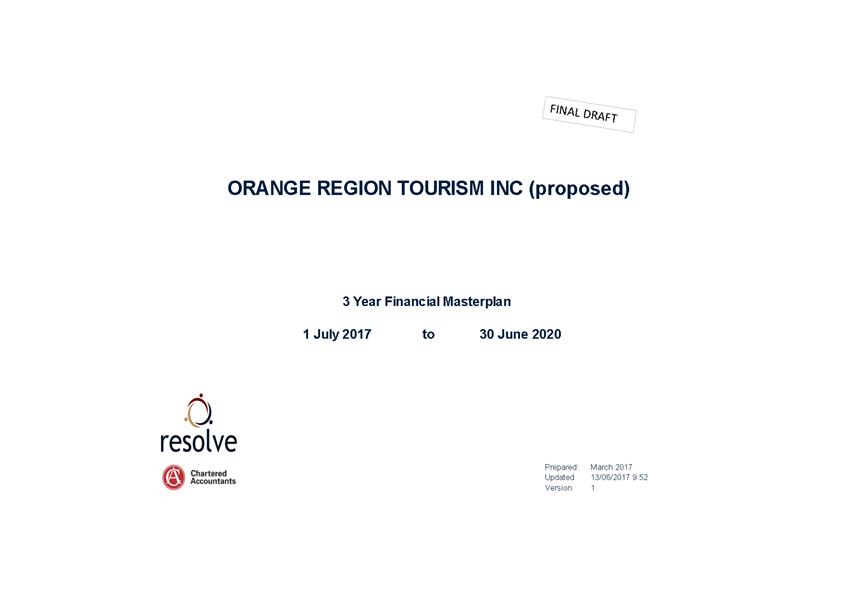
Council Meeting
7 November 2017
5.7 Ministerial
Approval Request to Form the Regional Independent Tourism Entity
Attachment 5 Financial
model new tourims entity









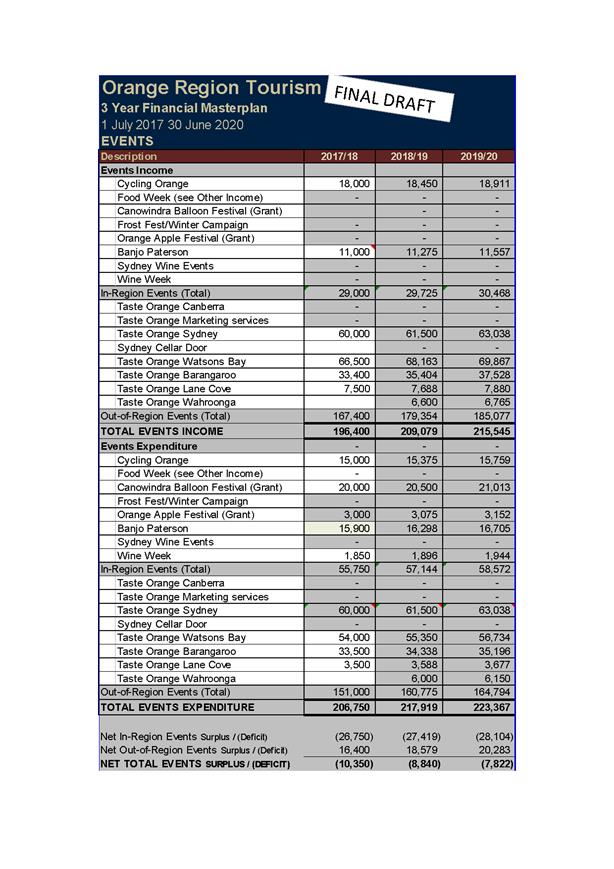

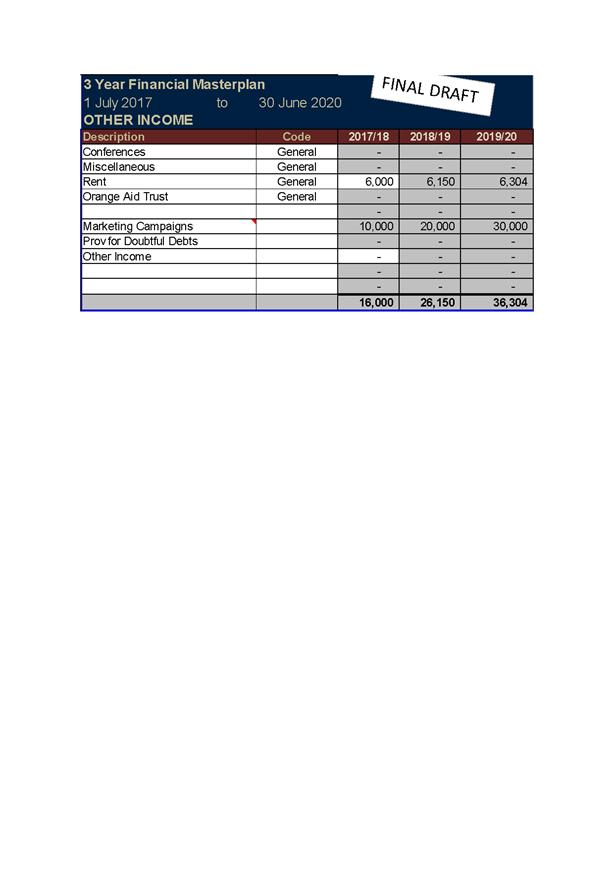

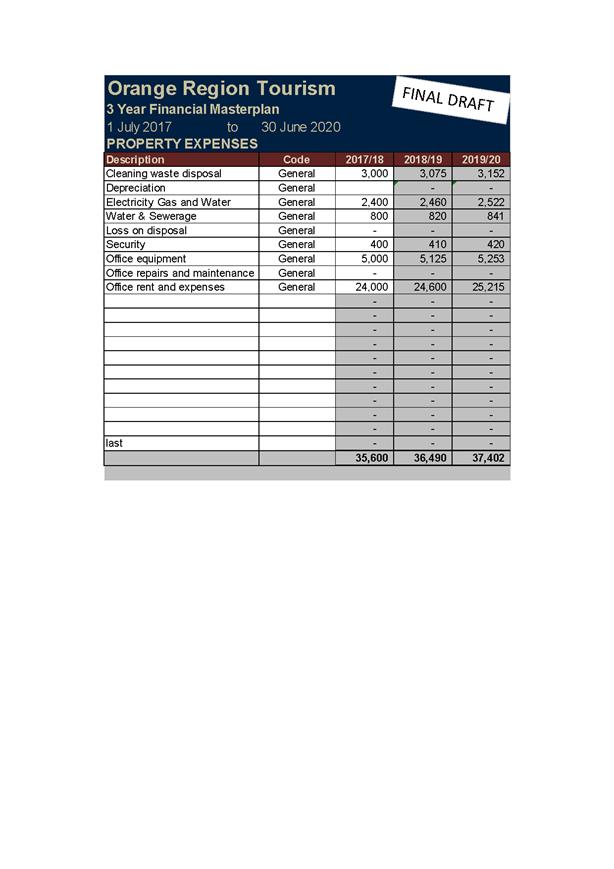

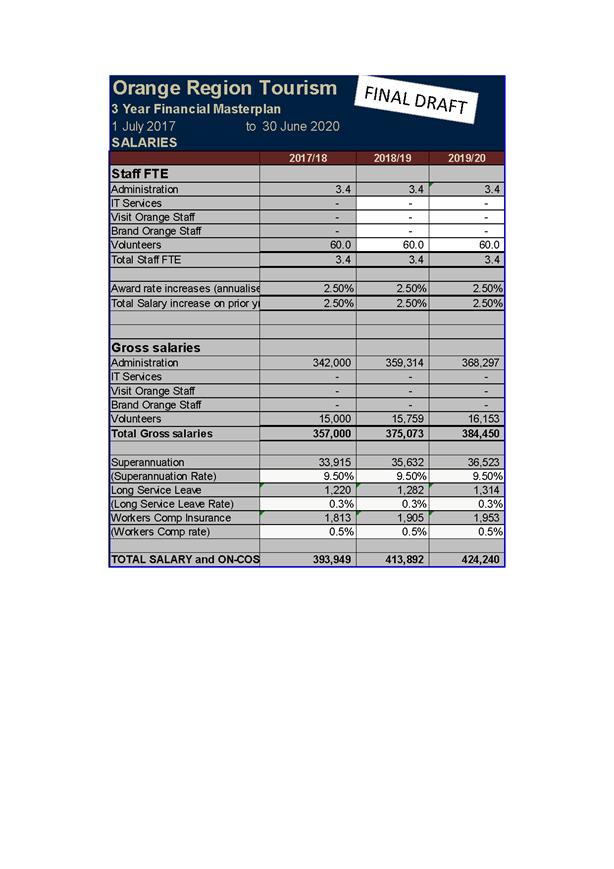

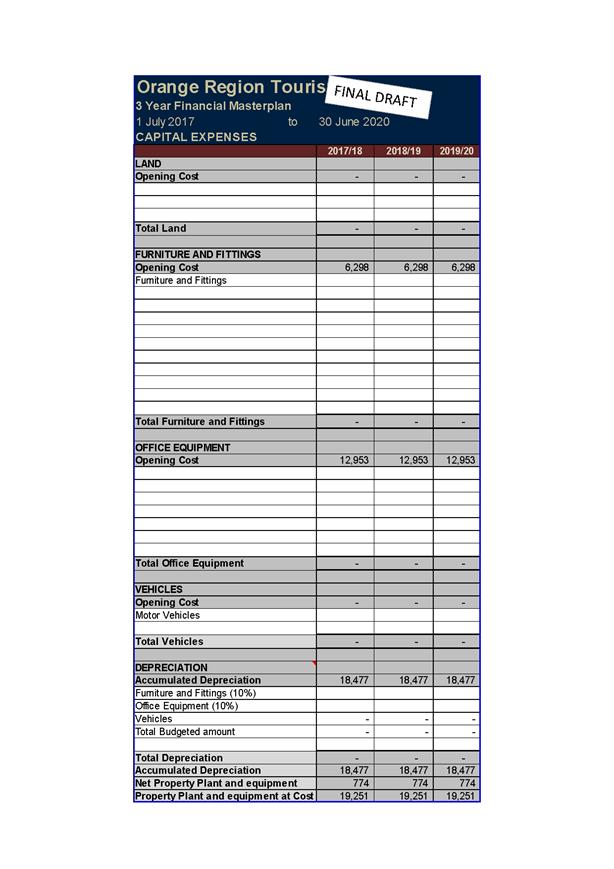
Council Meeting
7 November 2017
5.7 Ministerial
Approval Request to Form the Regional Independent Tourism Entity
Attachment 6 Request
information - Section 358 application - corporation to undertake tourism
promotion activities - Orange Blayney Cabonne

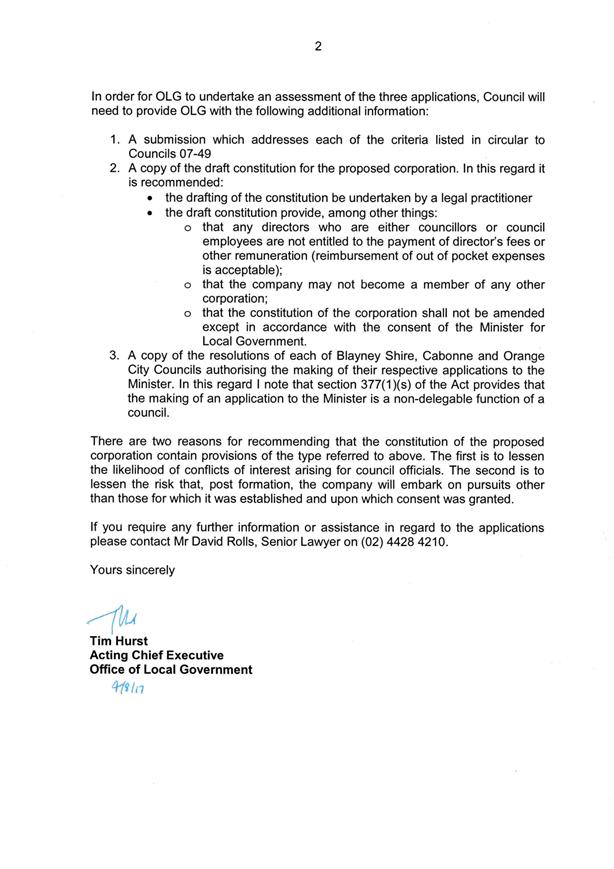
5.8 Independent
Members of the Audit and Risk Management Committee
TRIM
REFERENCE: 2017/2058
AUTHOR: Garry
Styles, General Manager
EXECUTIVE Summary
Council has completed a public Expression of Interest
process to seek interested persons to be appointed as the two independent
members of the Audit and Risk Management Committee. This report provides the
candidates to enable Council to select the two independent members.
Link To Delivery/OPerational Plan
The recommendation in this report relates to the
Delivery/Operational Plan strategy “1.1 Our City -
Provide easily obtainable information on the legal responsibilities of
Councillors, Council staff and the community”.
Financial Implications
Nil
Policy and Governance Implications
Nil
|
Recommendation
1 That
Council appoint Mr Phillip Burgett and Mr Bill Gillooly AM as the two
independent members of the Audit and Risk Management Committee until
September 2020 unless otherwise resolved by Council.
2 That
a formal induction on the Committee’s purpose and responsibilities be
arranged for Committee members.
3 That
the proposed meeting of the Audit and Risk Management Committee scheduled for
24 November 2017 be deferred until after the induction of the members has
been completed.
|
further considerations
Consideration has been given to the
recommendation’s impact on Council’s service delivery; image and
reputation; political; environmental; health and safety; employees;
stakeholders and project management; and no further implications or risks have
been identified.
SUPPORTING INFORMATION
The Office of Local Government has issued guidelines (first
in 2008 and updated in 2010) for Internal Audit which cover how Audit and Risk
Management Committees may be structured and operate. While committees are
currently voluntary, amendments to the Local Government Act 1993 have been made
such that it will compulsory to have such committees after the next general
election in 2020.
Orange City Council has had an Audit and Risk Committee
since 2009. The duties and responsibilities of the Committee is outlined in
point 1 of the attached charter.
The charter of the Committee also identifies the previous
Council’s determination of the membership as two independent and two
councillors, with an alternate councillor nominated.
The two independent members are remunerated. Current fees
and charges have been set by Council at $1,050 (+GST) for the chair per meeting
and $850 (+GST) for the other member per meeting. Councillor members of the
Committee are not paid. Independent members are also entitled to claim per
kilometre rate reimbursement for travel to and from meetings based on the rates
in the Local Government (State) Award.
Appointments to the Committee terminate at the conclusion of
a term of Council. The previous Council approved an expression of interest
process to seek nominations for independent members of the Committee so that
the new Council could select the independent members and re-establish the
Committee if desired. The Councillor members is handled in another report to
Council on Community Committee and external body appointments.
The expression of interest process has been completed after
advertisements were placed in local and metropolitan newspapers plus via
Linkedin. Five responses have been received by the closing date. One late
submission was rejected.
The charter identifies that Council appoint independent
members for a standard two years or longer period if Council so resolves. It is
recommended that the two independent members be appointed for a period to
conclude at the end of the term of the current Council. It is anticipated this
would be September 2020.
Council is provided with the attached applications in order
to determine which applicants are to be appointed as independent members of the
Committee. One of the independent members will be elected as the Chair by the
Committee under the current Charter. Some of the submission information was
provided by applicants under a request for confidentiality and applications
contain personal information which has been redacted or supplied under separate
cover.
The following criteria are points of consideration by
Council regarding the assessment of candidates:
· Candidates were
assessed against the criteria in the Charter and the application form
· The breadth of
experience of candidates as directors of boards or in similar roles as a voting
member and/or chair of Audit and Risk Committees was considered. A
differentiation is noted between the role of a director of a board and of staff
supporting a committee.
· Independence of
members – a view of independence of Committee members can be influenced
by the perception of others around conflicts of interest. The assessment of the
applicants has been considered against the Charter for the Committee and the
Office of Local Government Guidelines (particularly part 4) both of which are attached.
In particular, consideration of these Guidelines regarding the need for
existing/former employees of any council to have a hiatus of two years prior to
appointment to Audit and Risk Management Committees to observe principles of
independence (see section 4 Independent and councillor members on page 27) is
noted.
Additionally, applicant
membership of related entities was considered in terms of possible perception
of conflict arising from the memberships. It is not to say the applicant
wouldn’t effectively manage perceptions or actual conflict. Rather, it is
noted that the consideration of where issues of perceptions of conflicts of
interest, as well as actual conflicts of interest, should be particularly
tested when appointing independent members of an Audit and Risk Management
Committee
· The candidates
experience as members of other Audit and Risk Management Committees was a
requirement of the application process. This is particularly relevant as one of
the independent members will chair the Committee meetings.
· Reference checking
of the two recommended candidates was undertaken to confirm and expand on the
skills and attributes outlined in their applications.
Two candidates, Mr Phillip Burgett and Mr Bill Gillooly are
recommended from a very strong field of applicants. The remaining applicants
would be suitable to place on an eligibility list if future vacancies arose.
Finally, the former Committee had scheduled a meeting of the
Committee for 24 November 2017. Point 7.3(i) in the Committee Charter
identifies the need for an induction meeting to be held for all members. It is
recommended that the meeting be postponed and rescheduled after an induction
has been held and that the date of the induction session and the first meeting
be determined by consulting with Committee members so both meetings are able to
have full attendance.
Attachments
1 Charter
- Audit and Risk Management Committee, D16/38978⇩
2 Office
of Local Government - Internal Audit Guidelines - 2010, D17/63466⇩
3 Gillooly
Application, D17/63514⇩
4 Quirk
Application, D17/63537⇩
5 Burgett
Application PDF, D17/63681⇩
6 Morley
Application PDF, D17/63683⇩
7 Fleming
Application PDF, D17/63685⇩
8 Quirk
CV confidential, D17/63736 - Confidential
Council Meeting
7 November 2017
5.8 Independent
Members of the Audit and Risk Management Committee
Attachment 1 Charter
- Audit and Risk Management Committee
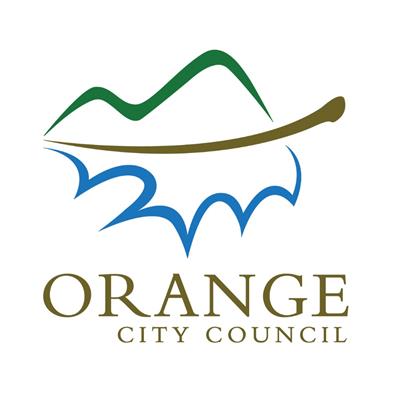
AUDIT AND RISK MANAGEMENT COMMITTEE
CHARTER
Contents
1 Audit and Risk Management
Committee Purpose. 3
2 Authority. 3
3. Composition.. 3
4 Tenure. 4
5 Meetings and Quorum.. 5
6 Confidentiality. 5
7 Responsibilities. 5
7.3 (a) Financial Statements. 6
7.3.(b) Risk Management. 6
7.3.(c) Internal Control. 6
7.3.(d) Internal Audit. 7
7.3.(e) External Audit. 7
7.3.(f) Compliance. 7
7.3.(g) Reporting Responsibilities. 8
7.3.(h) Other Responsibilities. 8
7.3.(i) Individual Responsibilities of
Members. 8
AUDIT AND RISK MANAGEMENT COMMITTEE CHARTER
1 Audit
and Risk Management Committee Purpose
The Audit and Risk Management Committee (ARMC) is an
advisory Committee assisting the Council to fulfil its governance and oversight
responsibilities.
The primary duties and responsibilities of the ARMC
are to assist the Council to discharge its responsibilities relating to:
1.1 Financial
reporting process
1.2 Business
ethics, policies and practices
1.3 Management
and internal controls
1.4 Monitoring
the integrity of the Council’s financial reporting practices and finance
and accounting compliance
1.5 Reviewing
internal controls, key corporate risks and financial audit related matters
1.6 Encouraging
continuous improvement of Council’s systems and practices
1.7 Adoption
of the Internal Audit Plan
1.8 The
Council’s process for monitoring compliance with policies, laws and
regulations and the Council code of conduct.
2 Authority
2.1 The
ARMC is granted delegated authority by Council to carry out its duties and
responsibilities as defined in this charter. The ARMC has delegated
authority to approve investigations into any matters within its scope of
responsibility. It is empowered to:
2.1.(a) Resolve any disagreements between
management and the auditor regarding financial reporting (subject to
confidentiality considerations).
2.1.(b) Pre-approve
all auditing and non-audit services.
2.1.(c) After due consultation with the
General Manager, retain independent counsel, accountants, or others to advise
the committee or assist in the conduct of an investigation.
2.1.(d) Meet with Council management,
external auditors, or outside counsel, as necessary.
2.1.(e) The Council acknowledges that
professional independence and objectivity are key attributes of an efficient
and effective ARMC. The Council and General Manager are therefore committed to
uphold and guarantee the professional independence and objectivity of the ARMC.
3. Composition
3.1 All
appointments to the ARMC shall be made by Council.
3.2 The
ARMC will consist of:
3.2.1 Core Members
(voting)
· Mayor of the day (or a Councillor nominated by the
Mayor as his representative)
· One Councillor
· Two independent external members (not member of
Council and one
to be Chairperson)
3.2.2 Attendee
(non-voting)
· General Manager
· Internal Auditor
· Director responsible for corporate functions
· One alternate Councillor Delegate who will have voting
rights in the absence
of the other Councillor.
3.2.3 Invitees
(non-voting)
· Representatives of the external auditor.
· Other officers of Council as requested by the ARMC
and/or General Manager
3.3 In order to maintain
independence, and to comply with the recommendations of the Office of Local Government,
the ARMC shall elect one of the independent members as its chairperson.
3.4 The selection of
independent members should be undertaken in a transparent
and unbiased manner. This could include calling for expressions of interest
from interested persons.
4 Tenure
4.1
The term of office for an ARMC member shall end on the earlier of:
(a) the
day on which the member resigns from the ARMC
(b) in
the case of a Councillor, the day on which the Councillor ceases to be a
Councillor
(c) two
years in respect of the independent members or such other term as determined by
Council.
(d) the
day on which the member’s appointment is legally terminated by Council.
(e) the
day on which the member is incapacitated by law from holding such office.
4.2 Members
are encouraged to serve multiple terms and to plan for an orderly rotation of
members so that experiences members will always be serving. The ARMC should make
recommendations to Council on membership.
4.3 In
any event, the appointment of each member of the ARMC will be reviewed at the
end of the first year and confirmed for the remaining period subject to
satisfactory performance as determined by Council. A member may be eligible for
re-appointment to the committee for a continuous period not exceeding eight (8)
years.
4.4 In
considering new independent members for the ARMC, selection shall be influenced
by:
(a) Industry standards for similar committees, particularly
relating to the appointment of independents to ARMCs.
(b) Any guidelines issued by the NSW Government
concerning Local Government ARMCs
(c) The attributes and experience of
candidates who respond to Expressions of Interest advertisements for Independent
Members.
4.5
The independent members on the ARMC should be remunerated for attending Committee
meetings. The remuneration shall be adopted by Council.
5 Meetings
and Quorum
5.1 The
committee will meet at least four times a year, with authority to convene
additional meetings, as circumstances require.
5.2 A
quorum shall not exist unless at least 3 voting members are present:
5.3 Members
of the ARMC are generally expected to attend each meeting, in person or via
tele or video-conference with the approval of the Committee Chairperson.
5.4 The
ARMC will invite members of management, auditors or others to attend meetings
and provide pertinent information, as necessary.
5.5 The
Committee will hold private meetings with auditors (see below) and executive
sessions.
5.6 A
meeting agenda will be provided in advance to members, along with appropriate
briefing materials.
5.7 The
Chairperson shall determine the agenda for the ARMC in conjunction with Council
staff.
5.8 Minutes
will be prepared and distributed to the ARMC members and to the next Ordinary
meeting of the Council, including a report explaining any specific
recommendations and key outcomes, if appropriate.
5.9 Meetings
are to be rescheduled if there is not a quorum. The Council’s Internal Auditor
will minute proceedings of all meetings.
5.10 The
chairperson shall endeavour to conduct meetings on a “consensus
basis” but formal voting on recommendations shall be required. Each
member shall have one vote and a majority of those present shall be required to
pass a recommendation. The chairperson shall have a casting vote. The meetings
should operate as far as practicable in accordance with the Council’s
Code of Meeting Practice.
6 Confidentiality
6.1 The
ARMC will ensure that Committee members comply with all relevant laws and
Council’s policies regarding confidentiality, privacy and reporting.
Committee members shall treat all information received as part of the Committee
as confidential and only disclose the content to third parties with the consent
of other members of the Committee.
7 Responsibilities
7.1 The
ARMC has no executive powers, except those expressly provided by Council.
7.2 In
carrying out its responsibilities, the Committee must at all times recognise
that primary responsibility for management of Council rests with the Council
and General Manager as defined by the Local Government Act 1993. The Council
and General Manager shall ensure that reasonable resources are allocated to
providing the ARMC with the information it needs to discharge its
responsibilities.
7.3 The
responsibilities of the ARMC may be revised or expanded by Council from time to
time. The Committee will carry out the following responsibilities:
7.3
(a) Financial Statements
· Review significant accounting and reporting issues,
including complex or unusual transactions and highly judgmental areas, and
recent professional and regulatory pronouncements, and understand their impact
on the financial statements. The ARMC can add value for Councillors and the
process by reviewing the audit objectives, timeline and process, settlement of
identified issues and the independence of the external auditor. This would be
done in consultation with the External Auditor, Internal Auditor and management
· Based on the audit objectives, review with management
and the external auditors the results of the audit, timeline and process,
settlement of identified issues and the independence of the external auditor.
Review the process of the audit, identify unresolved issues.
· Review the audited annual financial statements and
consider whether they are complete, consistent with information known to
committee members, and reflect appropriate accounting principles. Without
having conducted its own assessment the ARMC will need to rely on the work of
Internal, External Auditor and management representations. Therefore any
recommendation to Council would be based on the External Auditors Management
Letter and made under a disclaimer that identifies things such as the audit
process, access to records, auditor appears to be suitably qualified, had
sufficient time to complete, items identified have been resolved to their
satisfaction.
· As part of the External Auditors presentation and
management representations, review with
management and the external auditors all matters required to be communicated to
the Committee under generally accepted auditing Standards.
· Understand how management develops interim financial
information, and the nature and extent of internal and external auditor involvement.
7.3.(b) Risk
Management
· Review whether management has in place a current and
comprehensive risk management framework, and associated procedures for
effective identification and management of business and financial risks,
including fraud.
· Review whether a sound and effective approach has been
followed in developing strategic risk management plans for major projects or
undertakings.
· Review the impact of the risk management framework on
its control environment and insurance arrangements, and
· Review whether a sound and effective approach has been
followed in establishing business continuity planning arrangements, including
whether plans have been tested periodically.
7.3.(c) Internal
Control
Consider
the adequacy and effectiveness of the Council’s internal control systems,
incorporating the:
· Reliability and integrity of financial and operational
information systems, including information technology security and control
· Effectiveness and efficiency of operations and
· Safeguarding assets
· Compliance with contracts, laws and regulations
· Governance framework
· Understand the scope of internal auditors’
review of internal control over financial reporting and obtain reports on
significant findings and recommendations, together with management’s
responses.
7.3.(d) Internal
Audit
· Review and recommend approval of the Internal Audit
Activity Charter, activities, and staffing, and organisational structure of the
internal audit function; and any subsequent changes.
· Have final authority to review and approve the annual
audit plan and all major changes to the plan.
· Ensure there are no unjustified restrictions or
limitations to the activities of internal audit.
· Review the effectiveness of the internal audit
function and objectives, including compliance with The Institute of Internal
Auditors’ International Standards for the Professional Practice of
Internal Auditing.
7.3.(e) External
Audit
· Establish that an appropriate process is in place to
give assurance that the Council complies with the Local Government Act
requirements for financial reporting and auditing.
· Review the external auditors’ proposed audit
scope and approach, including coordination of audit effort with internal audit.
· In accordance with the provisions of s422 to 427 or
the Local Government Act 1993, support the General Manager in reviewing the
performance of the external auditors, and recommend to the General Manager
final approval on the appointment or discharge of the auditors.
· Review and confirm the independence of the external
auditors by obtaining statements from the auditors on relationships between the
auditors and the Council, including non-audit services, and discussing the
relationships with the auditors.
· Review management’s responses to the recommendations
in the external auditor’s management letter.
· On a regular basis, meet separately with the external
auditors to discuss any matters that the Committee or auditors believe should
be discussed privately.
7.3.(f) Compliance
· Review the effectiveness of the system for monitoring
compliance with laws, regulations and contracts and the results of
management’s investigation and follow-up of any instances of
noncompliance.
· Review the findings of any examinations by regulatory
agencies, and any auditor observations.
· Review the process for communicating the code of
conduct to Council personnel, and for monitoring compliance therewith.
· Liaise with the General Manager to obtain regular
updates from management and Council legal counsel regarding compliance matters.
· Review other sections of the annual report and related
regulatory filings before release and consider the accuracy and completeness of
the information.
7.3.(g) Reporting
Responsibilities
· Regularly report to the Council about committee
activities, issues and related recommendations
· Provide an open avenue of communication between
internal audit, the external auditors, and the Council.
· Report annually to the Council, describing the
committee’s compositions, responsibilities and how they were discharged,
and any other information required by law, including non-audit services.
· Review any other reports the Council issues that
relate to Committee responsibilities.
7.3.(h) Other
Responsibilities
· Perform other activities related to this charter as
requested by the Council.
· Institute and oversee special investigations as
needed.
· Review and assess the adequacy of the ARMC Charter
annually, requesting Council approval for proposed changes, and ensure
appropriate disclosure as may be required by law or regulation.
· Confirm annually that all responsibilities outlined in
this charter have been carried out.
· Evaluate the committee’s and individual
members’ performance on a regular basis.
7.3.(i) Individual
Responsibilities of Members
Members
of the ARMC are expected to:
· Understand the relevant legislative and regulatory
requirements appropriate to Orange City Council.
· Contribute the time needed to study and understand the
papers provided.
· Apply good analytical skills, objectivity and good
judgement.
· Express opinions frankly, ask questions that go to the
fundamental core of issues, and pursue independent lines of enquiry.
· Declare any conflicts of interest before participating
in deliberations on the issue where the conflict of interest exists.
· Attend an induction meeting at which they receive
relevant information and briefings on their appointment to assist them to meet
their Committee responsibilities.
REVIEW
|
REVISION
|
DATE
|
RESOLUTION
|
|
Issue Date:
|
June 2009
|
ARMC Charter established 3/07/2009 resolution number
09/260
|
|
1
|
November 2011
|
Changes to document format/presentation only. No
resolution.
|
|
2
|
September 2012
|
Change composition of committee. Resolution 12/345
of 20/09/2012
|
|
3
|
January 2013
|
Change composition of committee. Resolution 12/358
of 18/10/2012
|
Version control – Amendments in version 4
approved by Council on 7/10/14 resolution number 14/961
(Version 4 reference number: TRIM D14/13319)
|
Clause
reference number
|
Current
clause
|
Nature
of proposed changes
|
|
2
|
|
Correction
to clause reference numbers.
|
|
3
|
|
Correction
to clause reference numbers.
|
|
4
|
|
Correction
to clause reference numbers.
|
|
4.3
|
In
any event, the appointment of each member of the ARMC will be reviewed at the
end of the first year and confirmed for the remaining period subject to
satisfactory performance as determined by Council. A member may be eligible
for re-appointment to the committee for a continuous period not exceeding
five (5) years.
|
Amend
to eight (8) years from five (5) years for tenure
|
|
4.4
|
In
considering new independent members for the ARMC, advice will be sought and
regard will be given to:
|
Clause
replaced by the following:
In
considering new independent members for the ARMC, selection shall be
influenced by:
|
|
4.4
|
4.4(a)
Recommendations from an accounting industry body, either CPA Australia or the
Institute of Chartered Accountants Australia.
|
Clause
replaced by the following:
Industry
standards for similar committees, particularly relating to the appointment of
independents to ARMCs.
|
|
4.4
|
4.4(b) Recommendations from Charles Sturt University
(CSU) (endeavouring to maintain one member of the ARMC as a CSU nominee)
|
Clause
replaced by the following:
Any guidelines issued by the NSW Government
concerning Local Government ARMCs
|
|
5.2
|
|
Minor
re-wording.
|
|
5.6
|
|
Minor
re-wording.
|
Version control – Amendments in version 5
approved by Council on 7/10/14 resolution number 14/961
(Version 5 reference number: TRIM D14/27233)
|
Clause
reference number
|
Current
clause
|
Nature
of changes
|
|
4.4
|
4.4(c)
The existence of a nexus between the candidate and the Bathurst, Orange and
Dubbo LGA.
|
Clause
replaced by the following:
The
attributes and experience of candidates who respond to Expression of Interest
advertisements for independent members.
|
|
4.4
|
4.4(d)
The skills and experience of candidates who respond to Expression of Interest
advertisements for independent members.
|
Clause
deleted.
|
|
4.4
|
4.4(e)
The Bathurst Regional Council, Orange City Council and Dubbo City Council
share an Internal Auditor and also recognise the benefits of shared
independent members of the ARMCs.
|
Clause
deleted.
|
|
5.3
|
5.3
Members of the ARMC are expected to attend each meeting, in person or via
tele or video-conference.
|
Clause
replaced by the following:
5.3
Members of the ARMC are generally expected to attend each meeting, in person
or via tele or video-conference with the approval of the Committee
Chairperson.
|
Version control – Amendments in version 6
(Version 6 reference number: TRIM D15/29881)
|
Clause
reference number
|
Current
clause
|
Nature
of changes
|
|
3.3
|
…”Division
of Local Government”
|
Changed
to Office of Local Government
|
Version control – Amendments in version 7
(Version 6 reference number: TRIM D16/38978
|
Clause
reference number
|
Current
clause
|
Nature
of changes
|
|
|
|
|
Council
Meeting
7 November 2017
5.8 Independent
Members of the Audit and Risk Management Committee
Attachment 2 Office
of Local Government - Internal Audit Guidelines - 2010
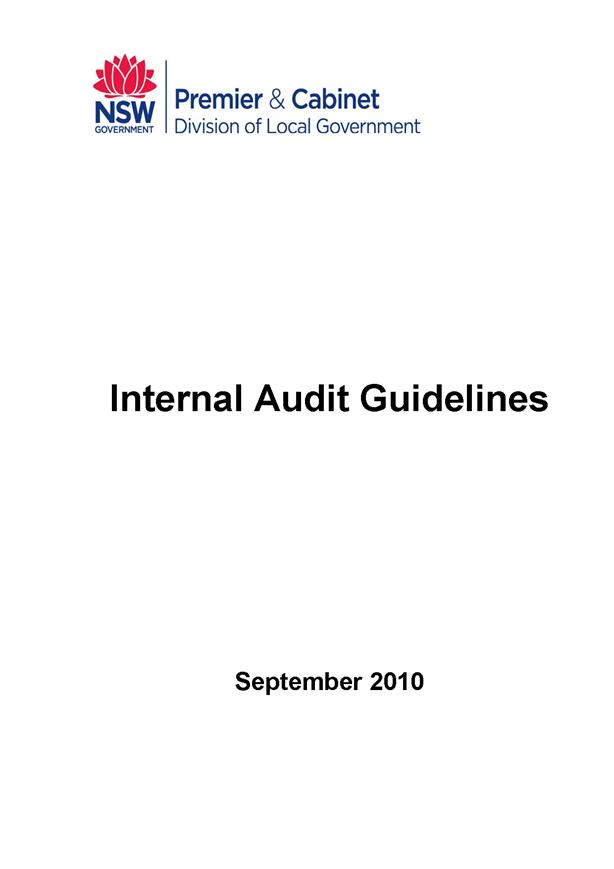

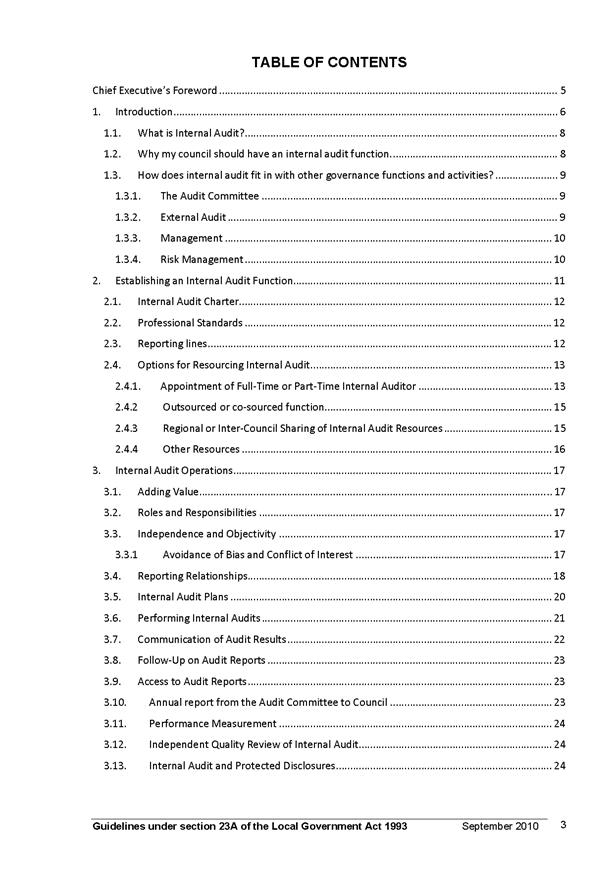

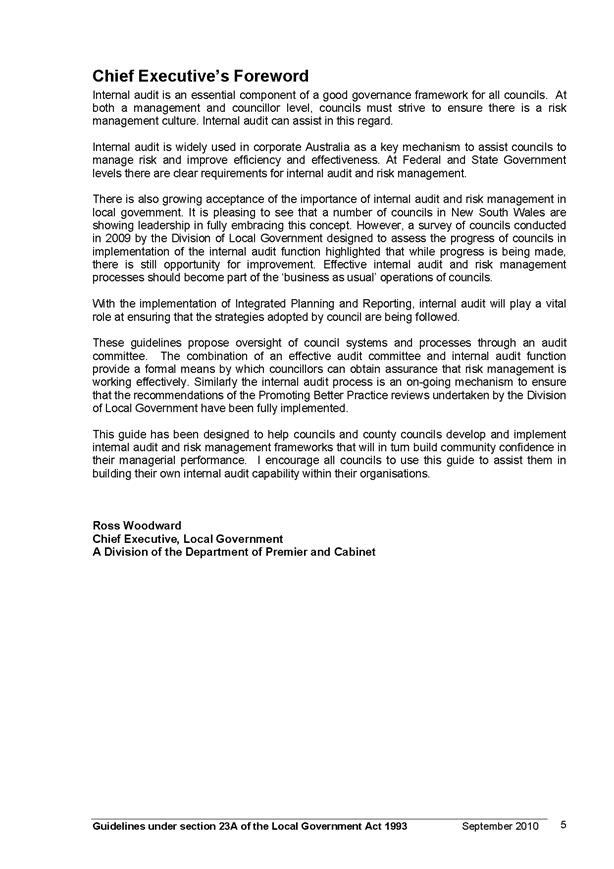

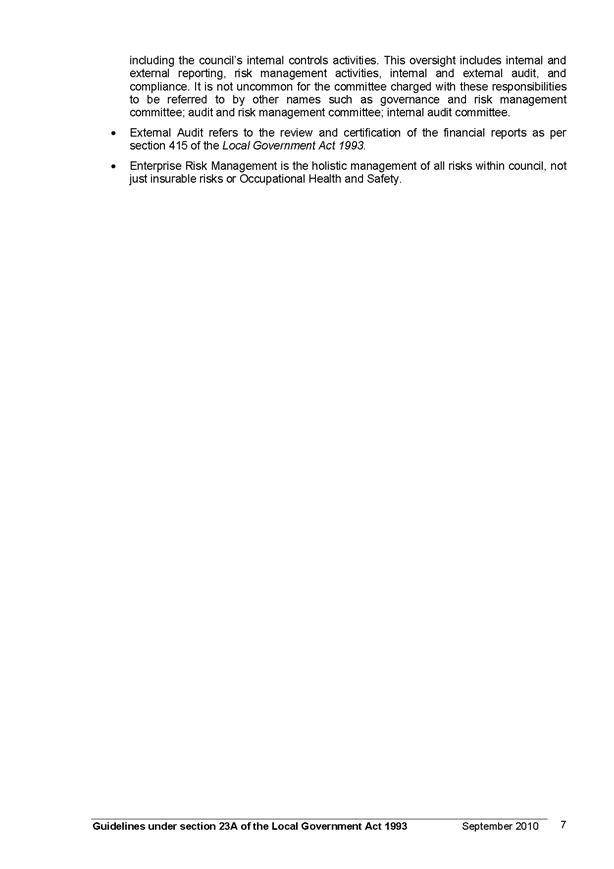

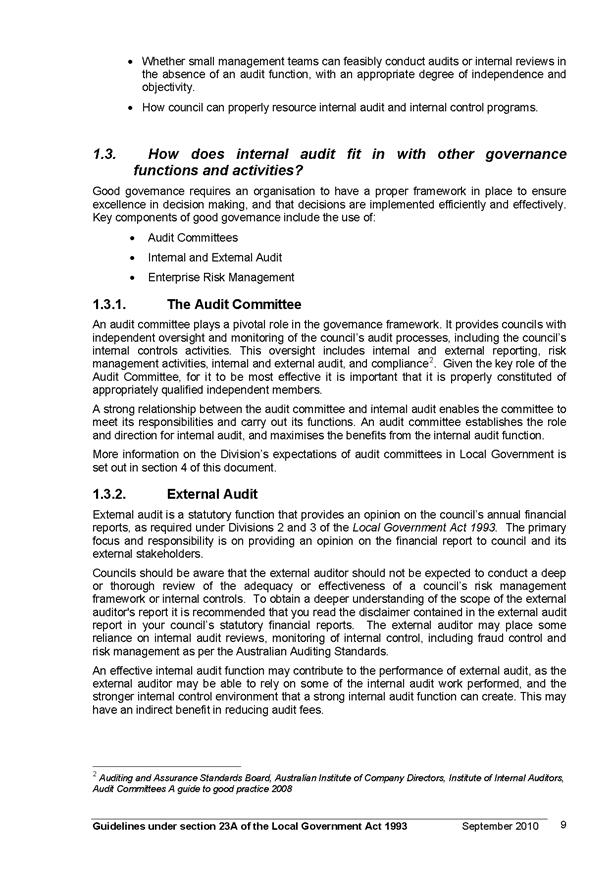
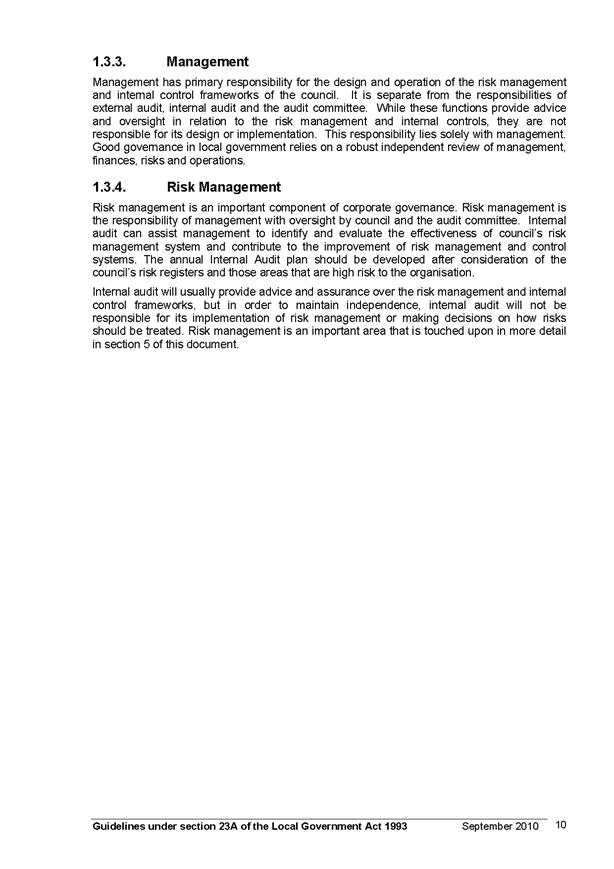
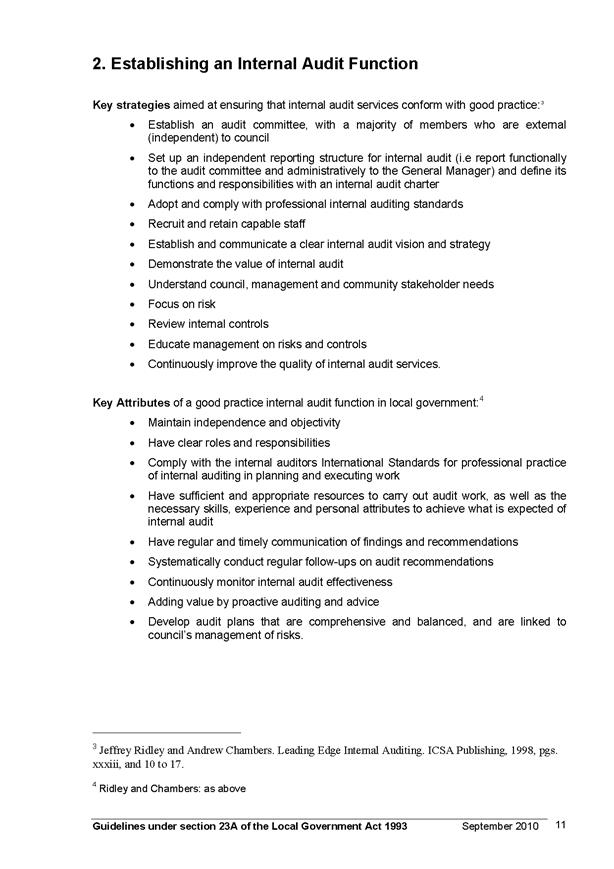

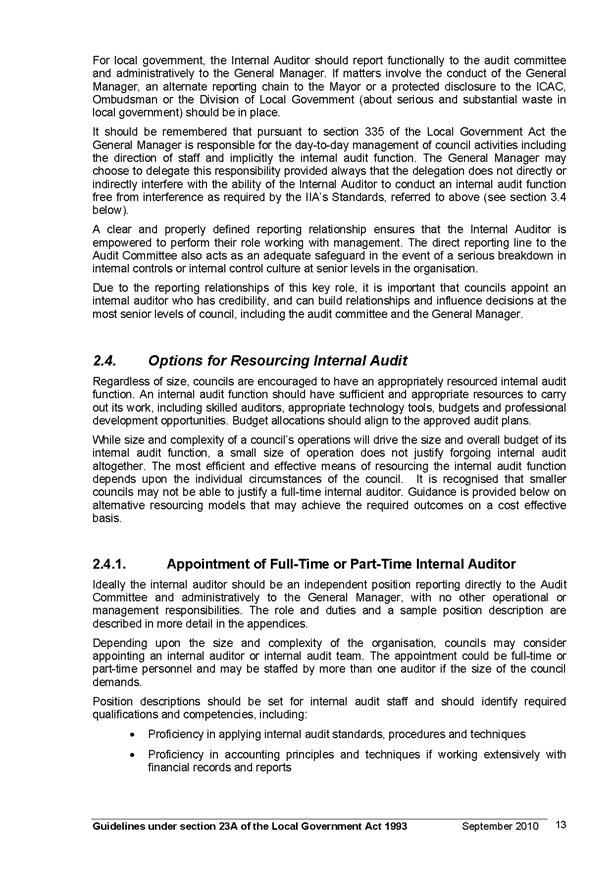
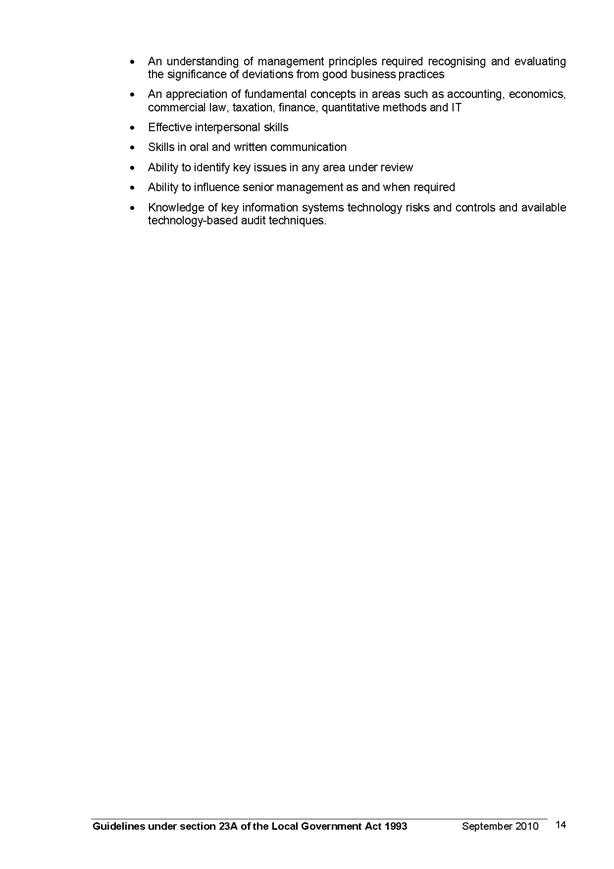
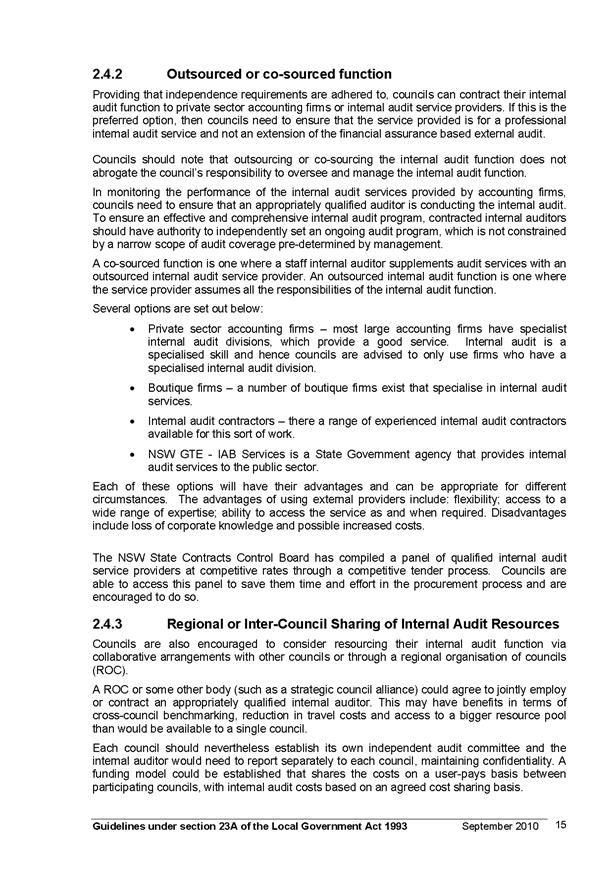

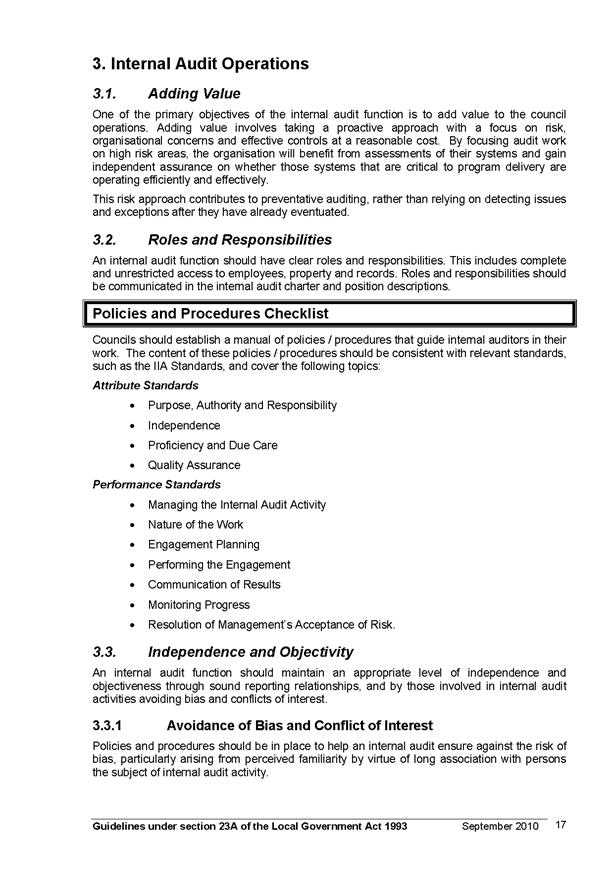
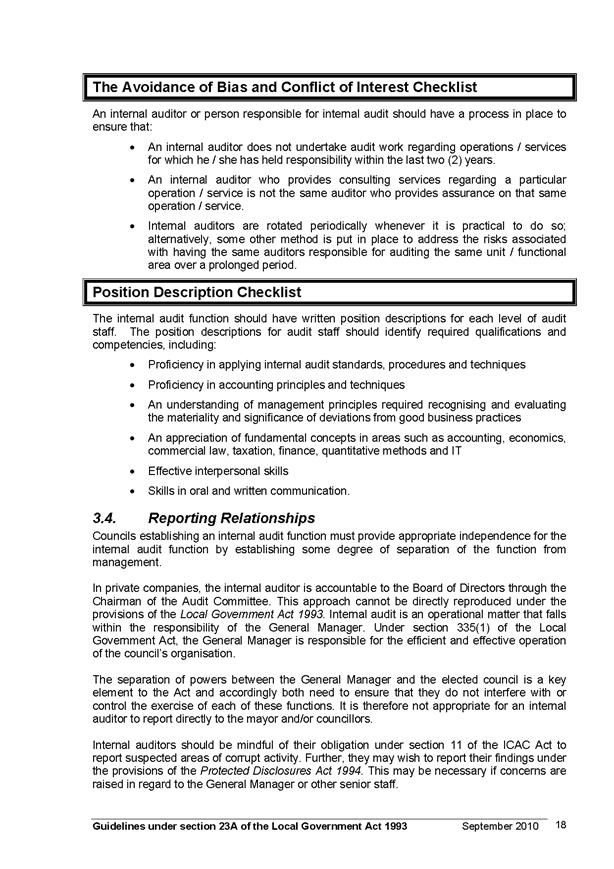
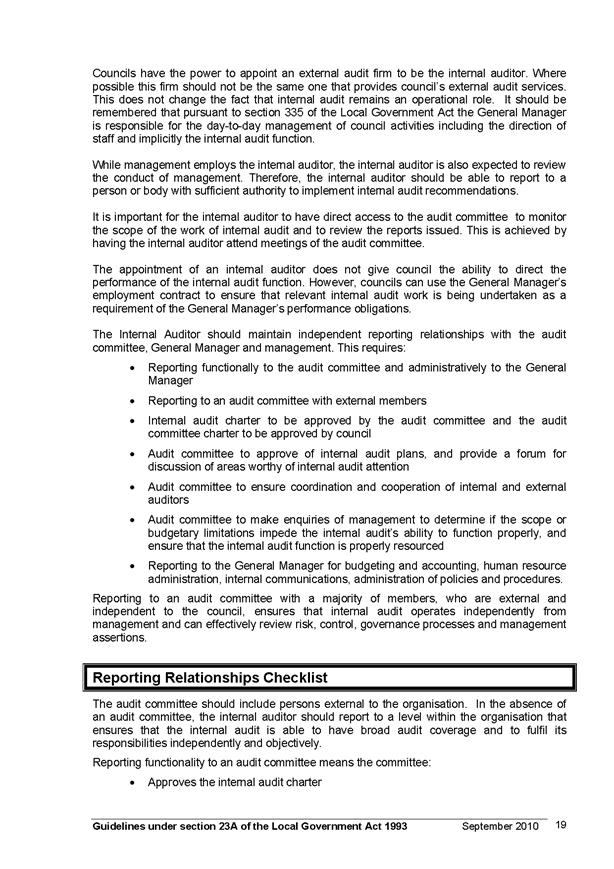
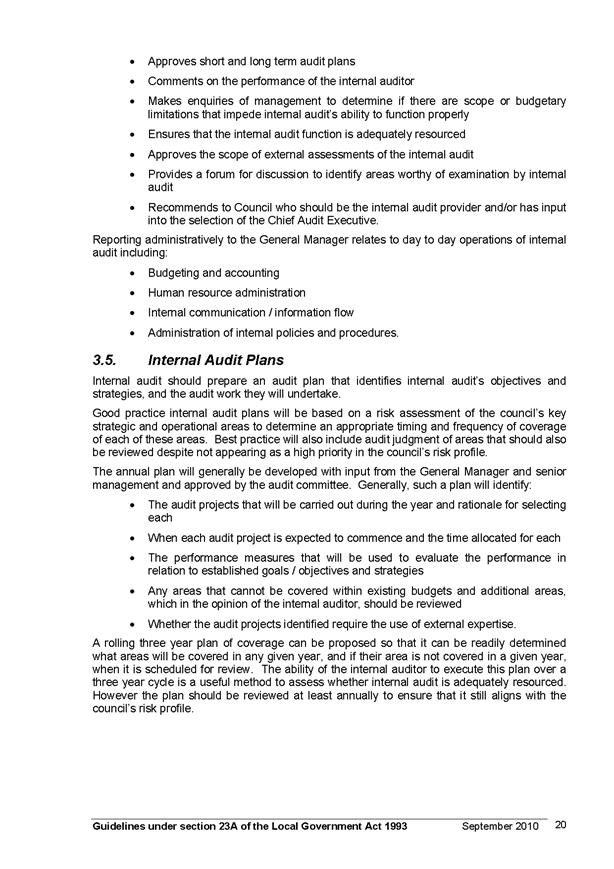
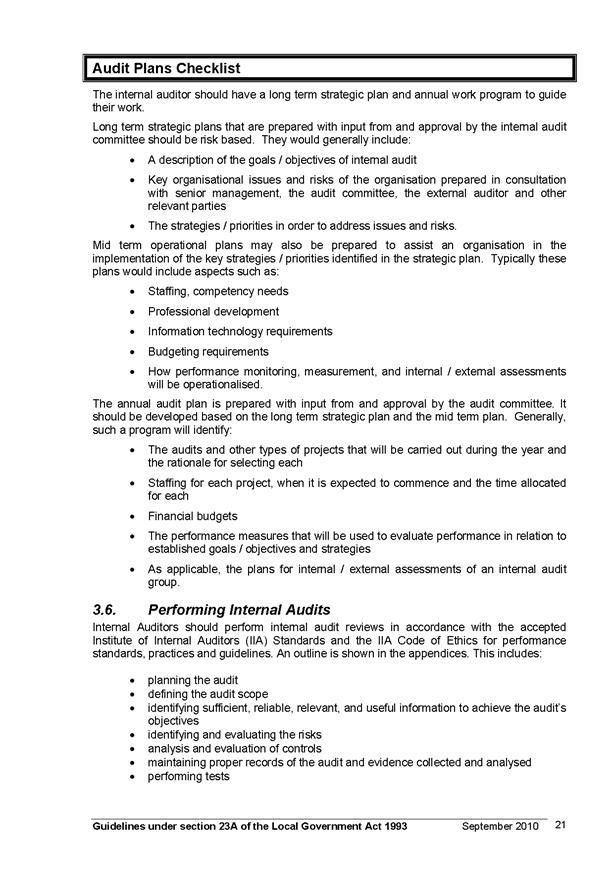
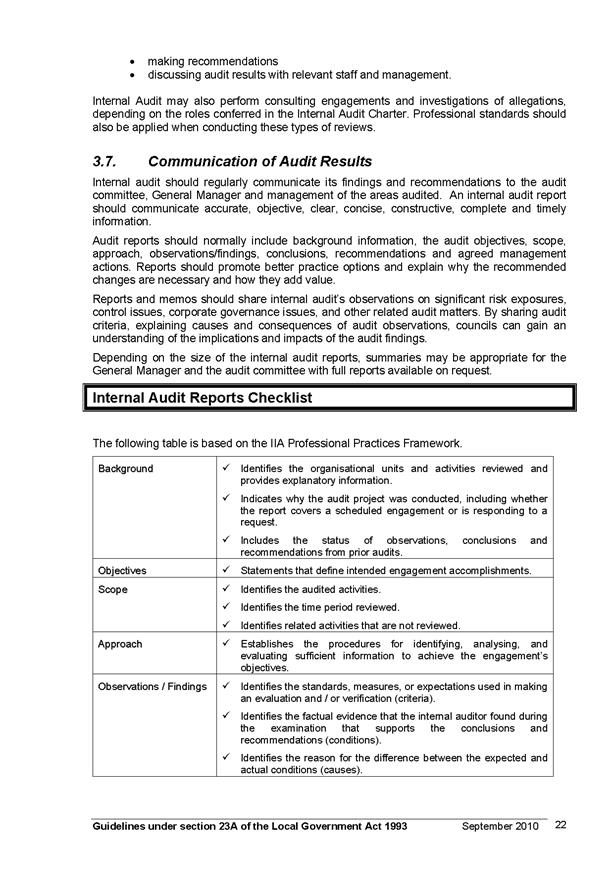
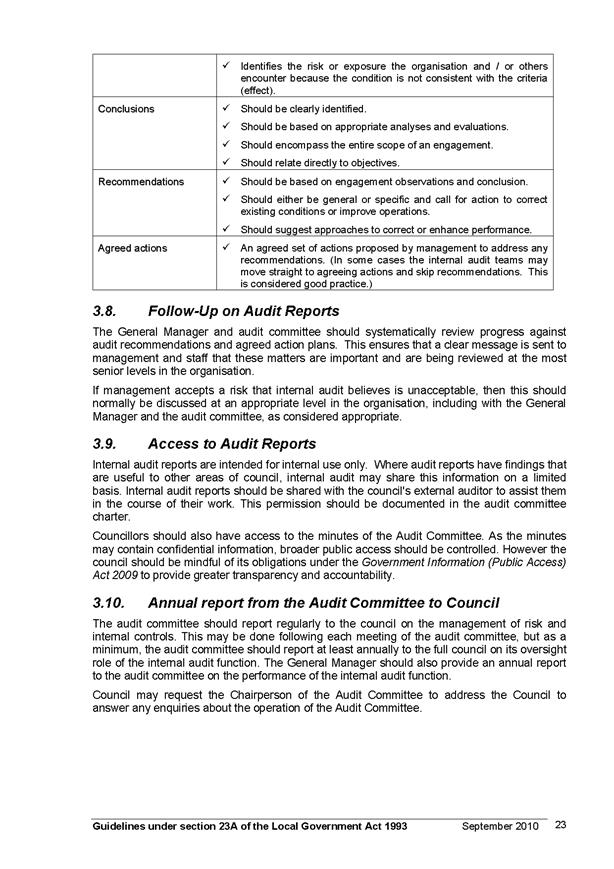
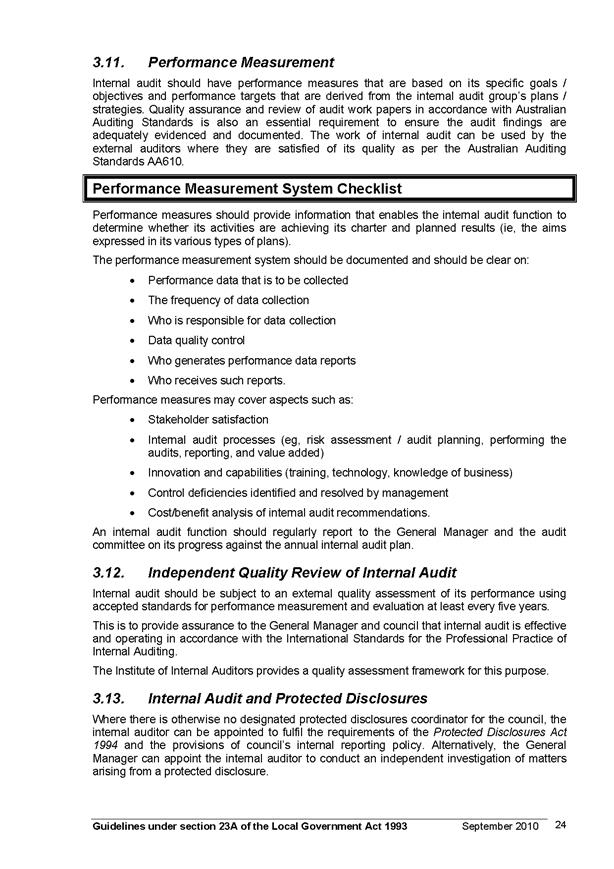
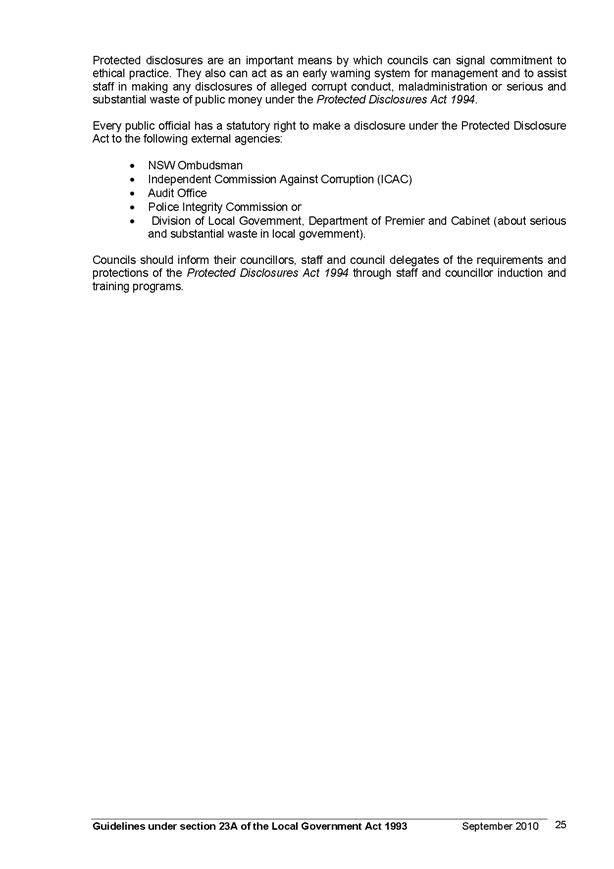
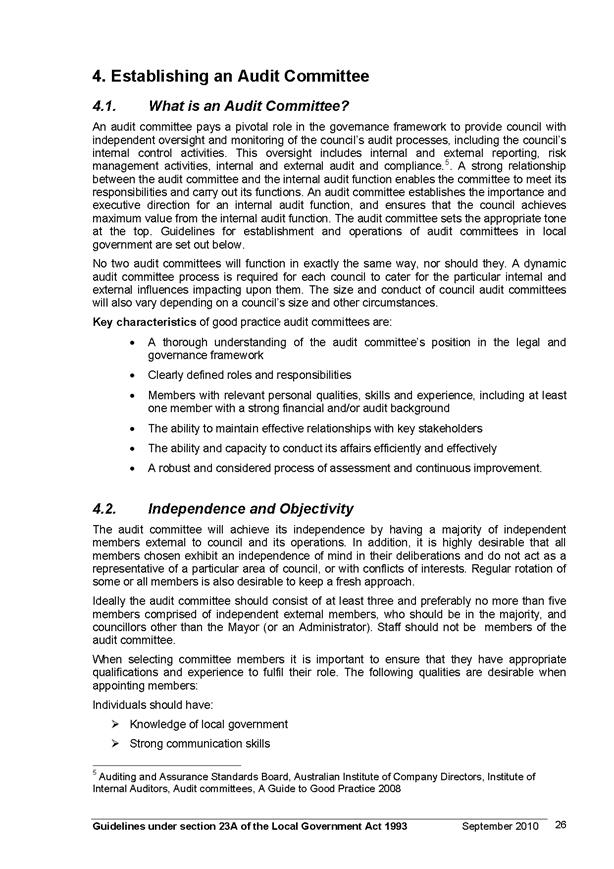
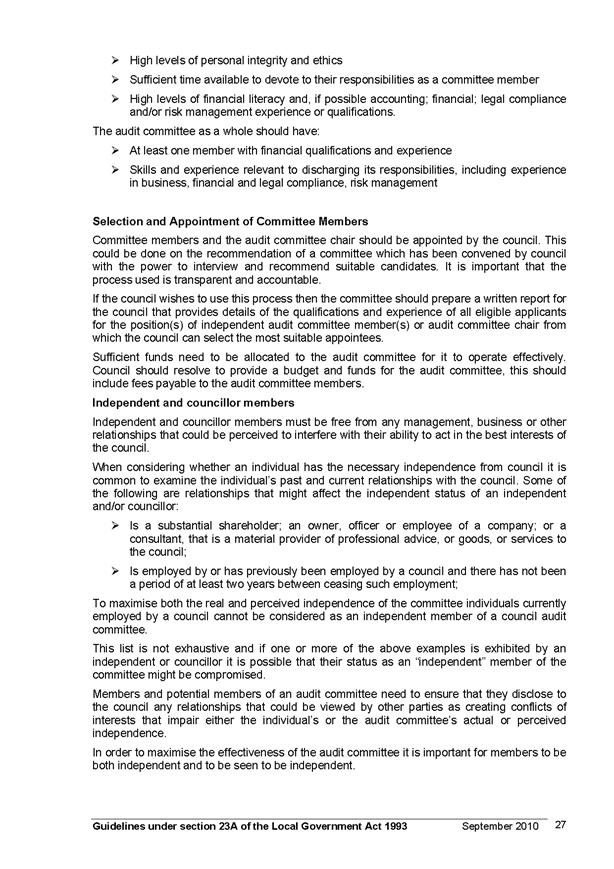
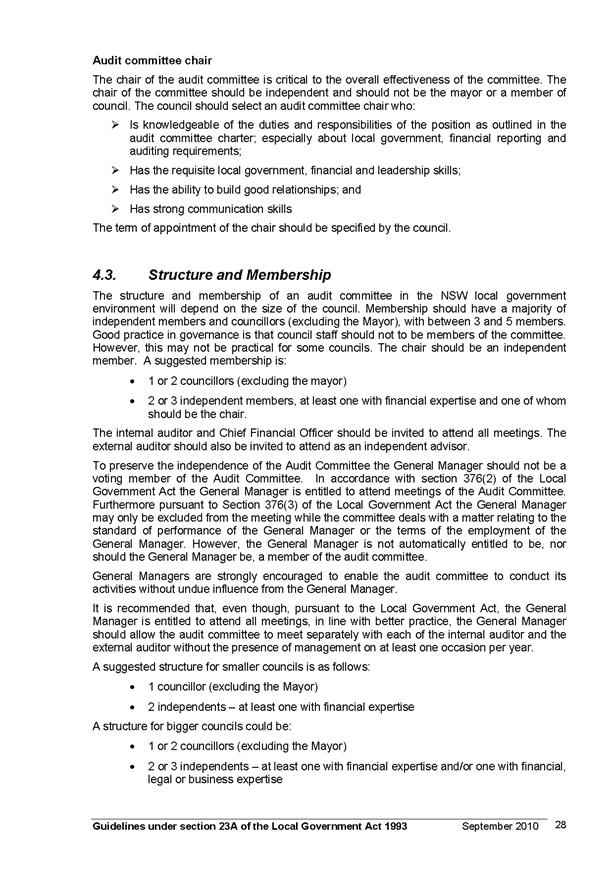
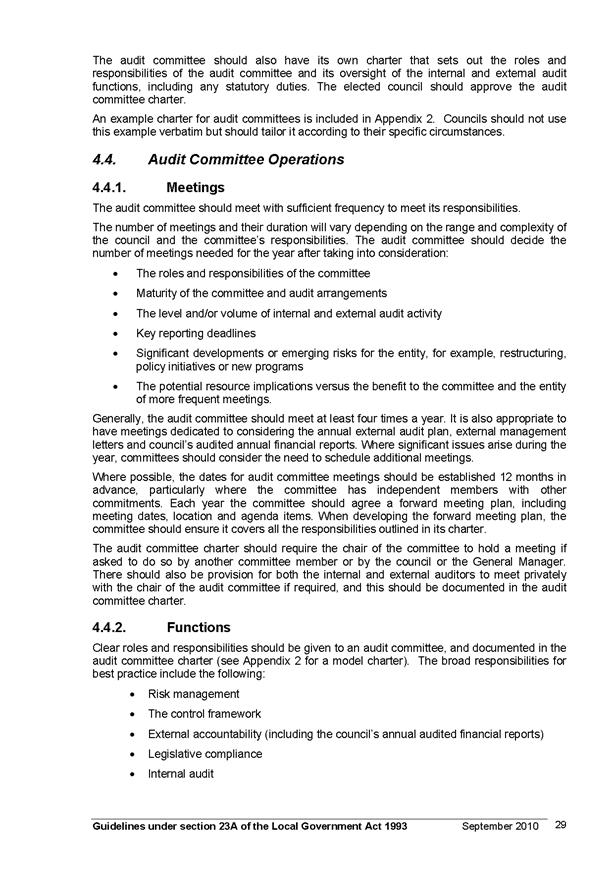
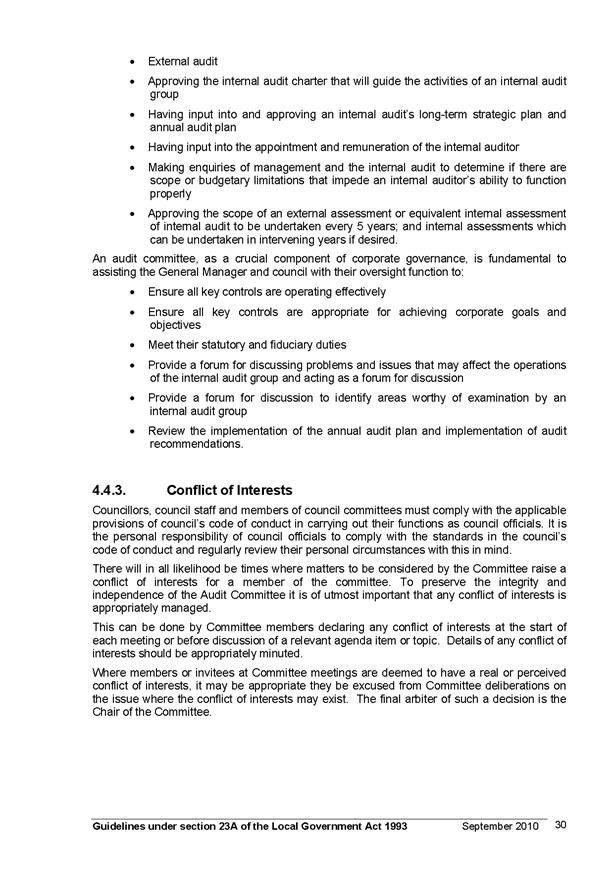
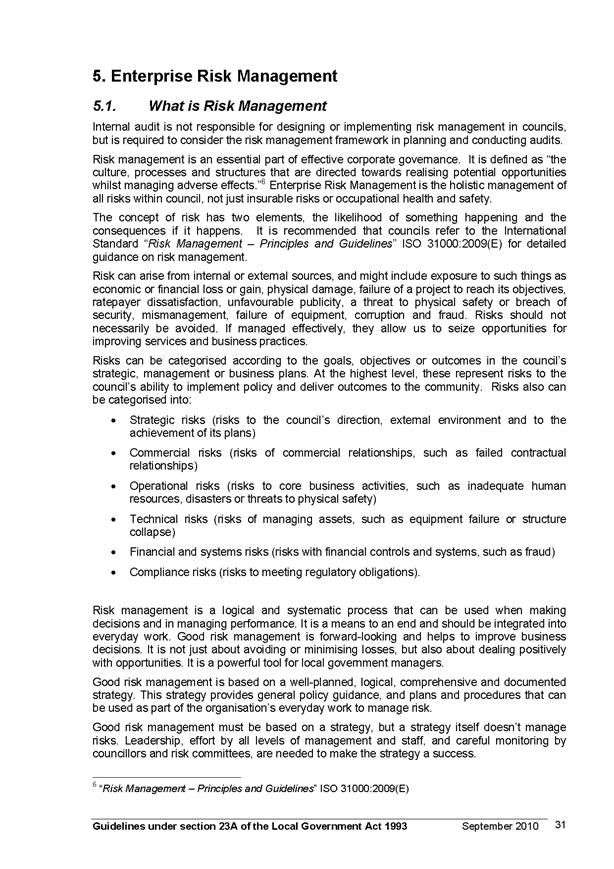
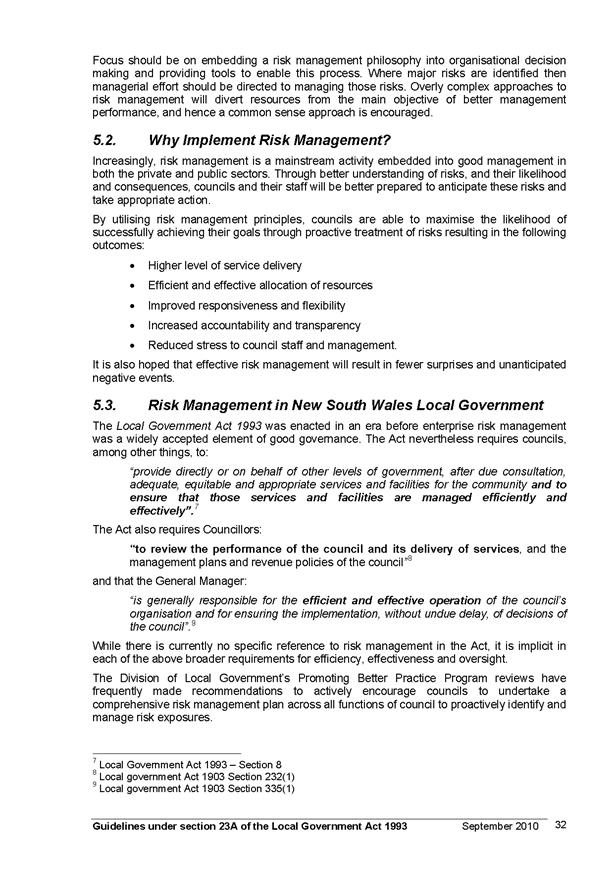
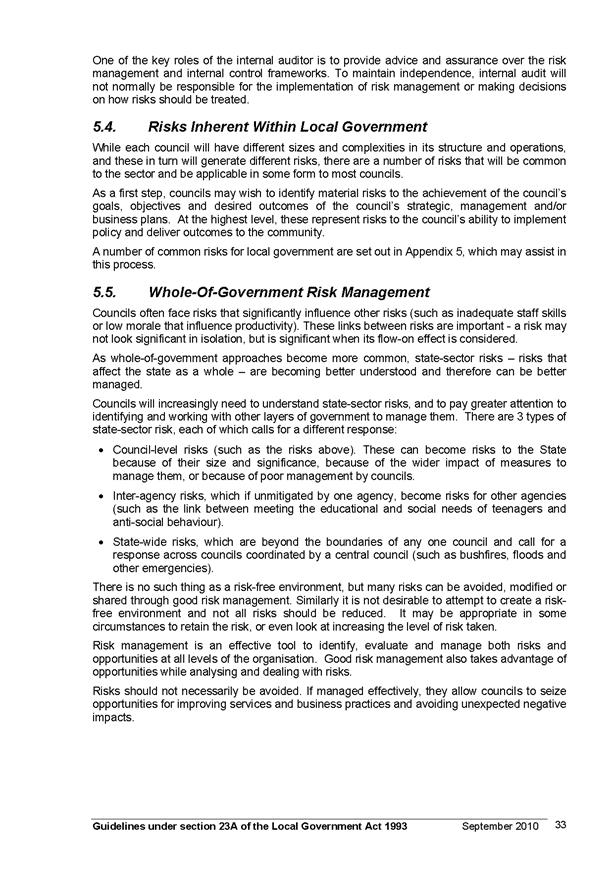
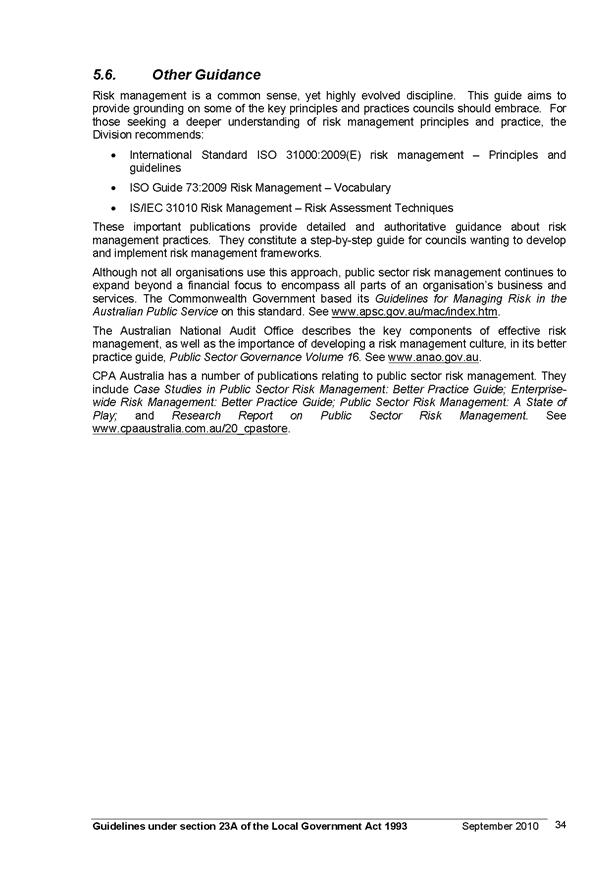
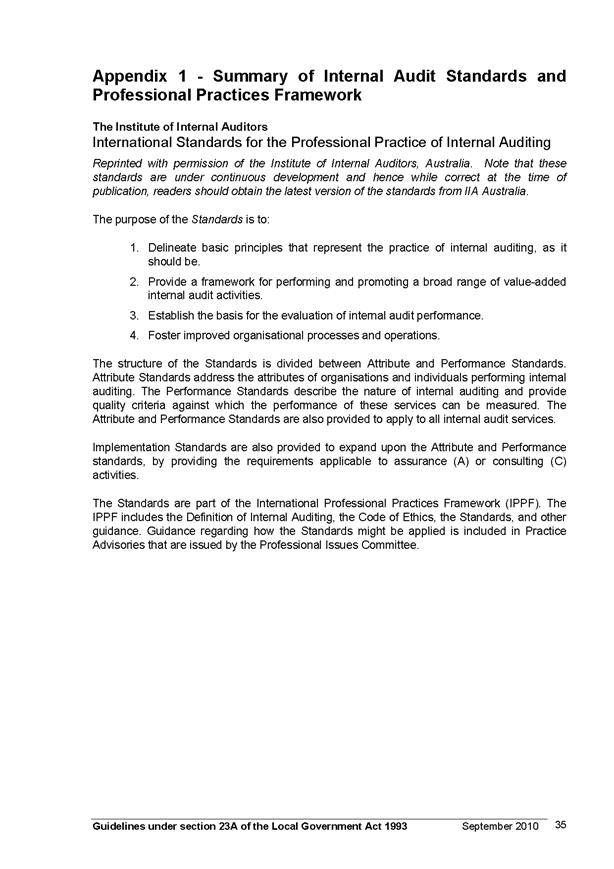
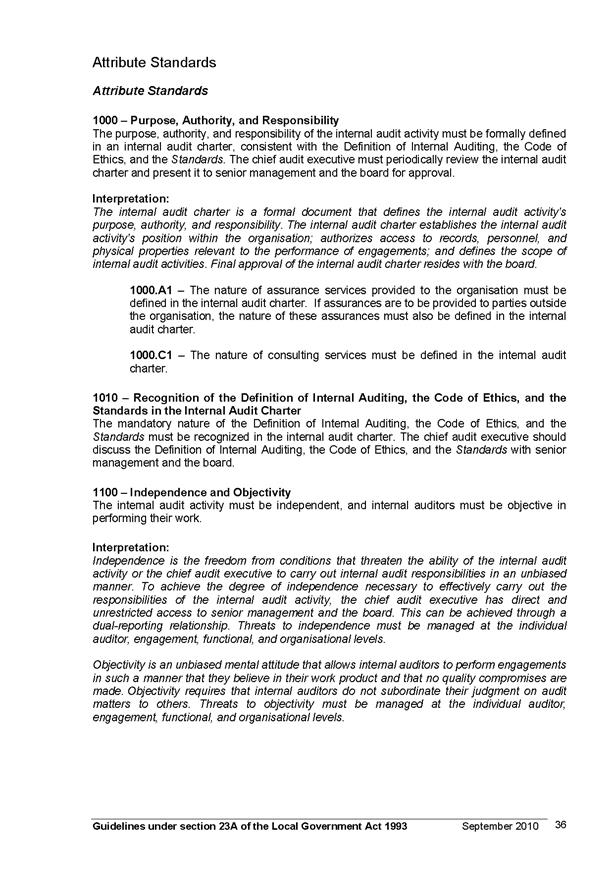
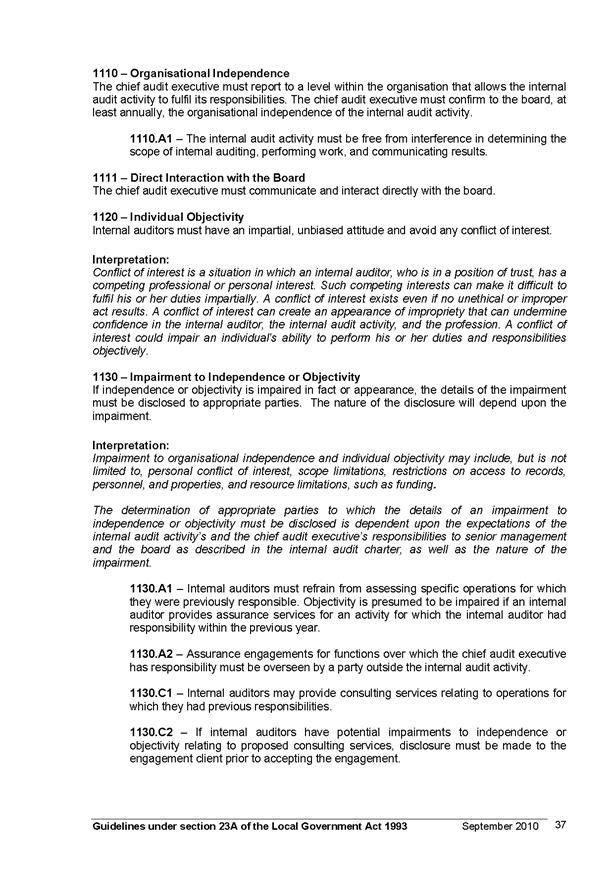
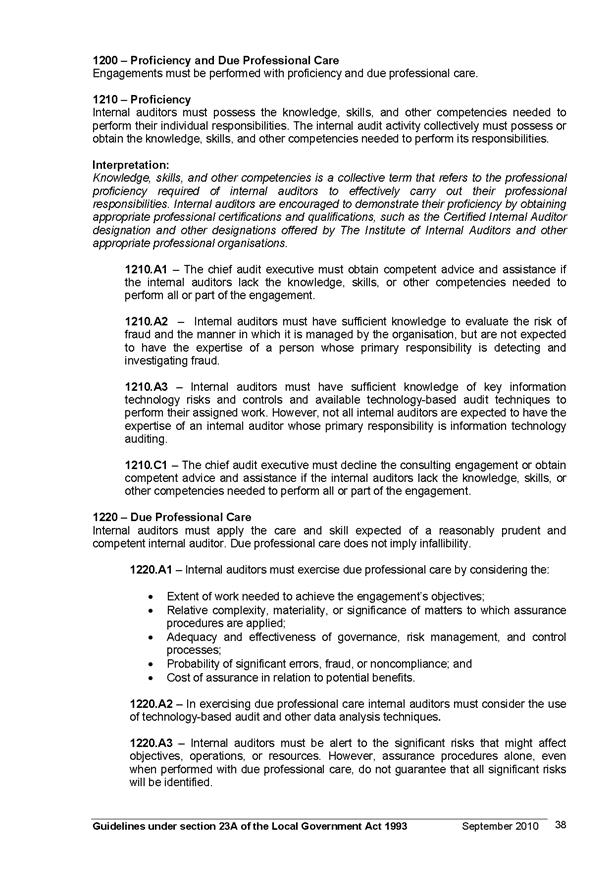
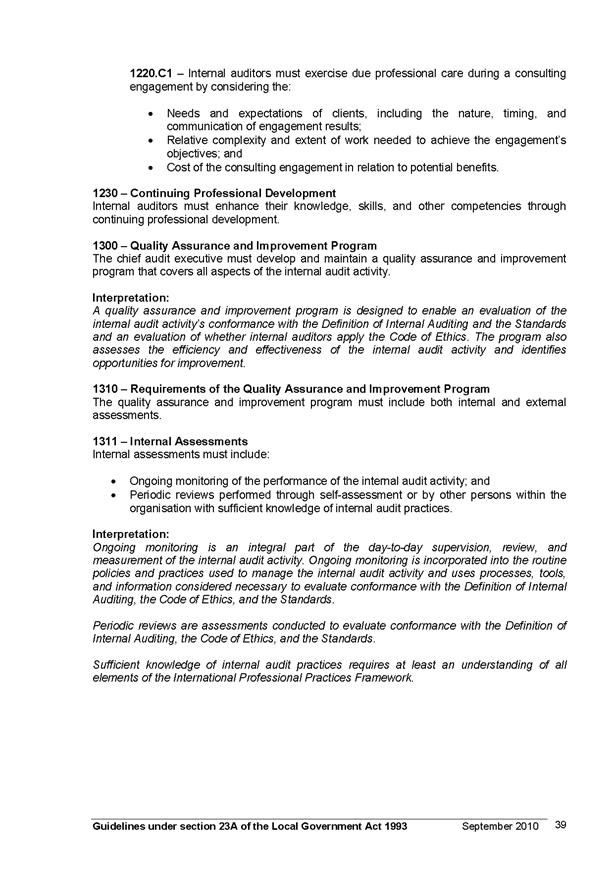
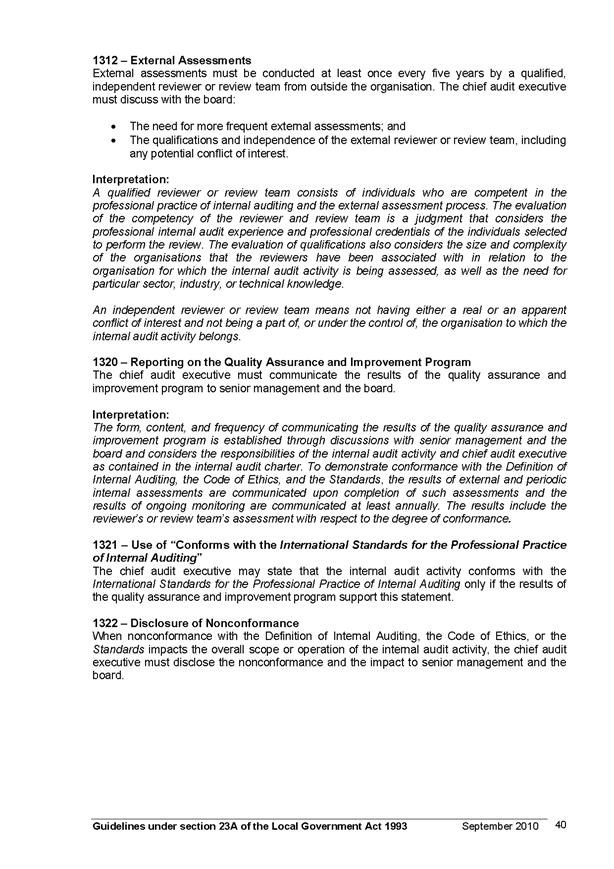
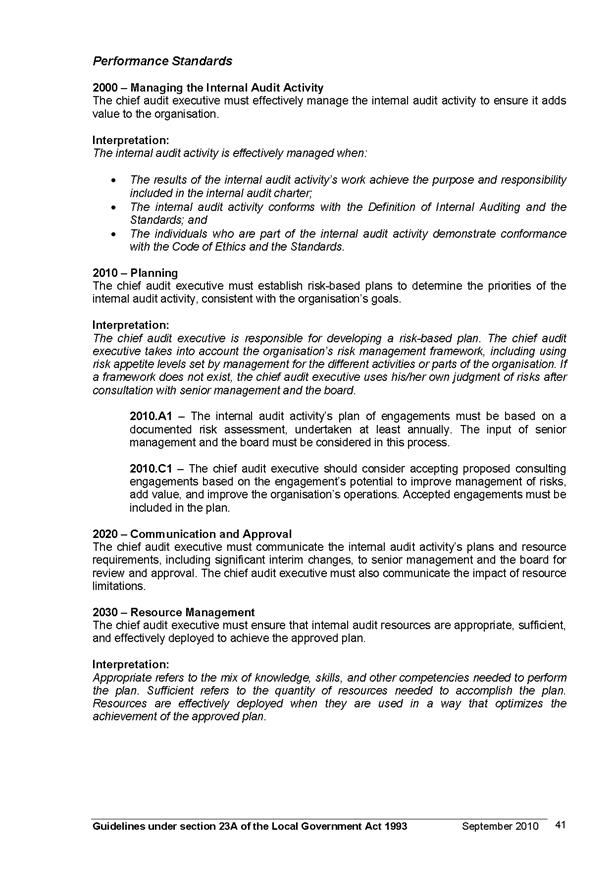
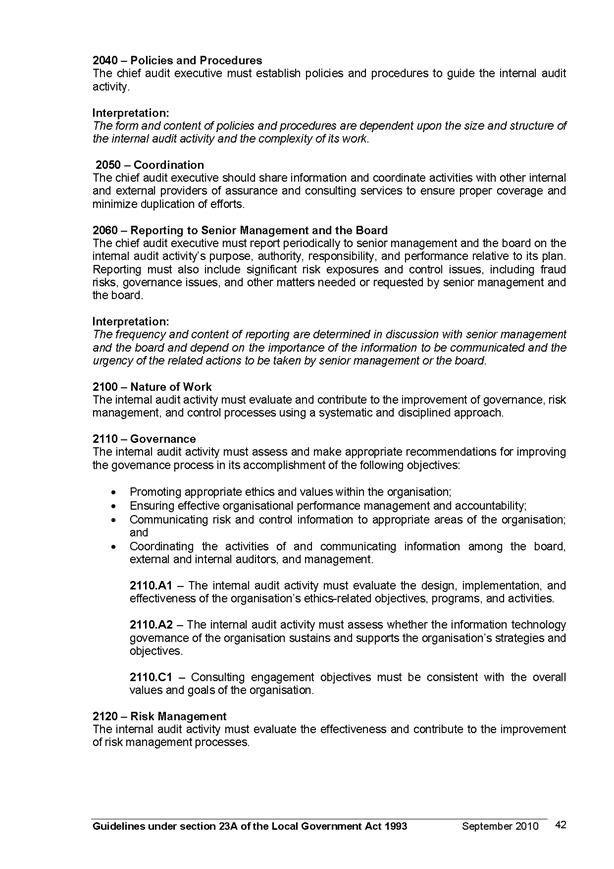
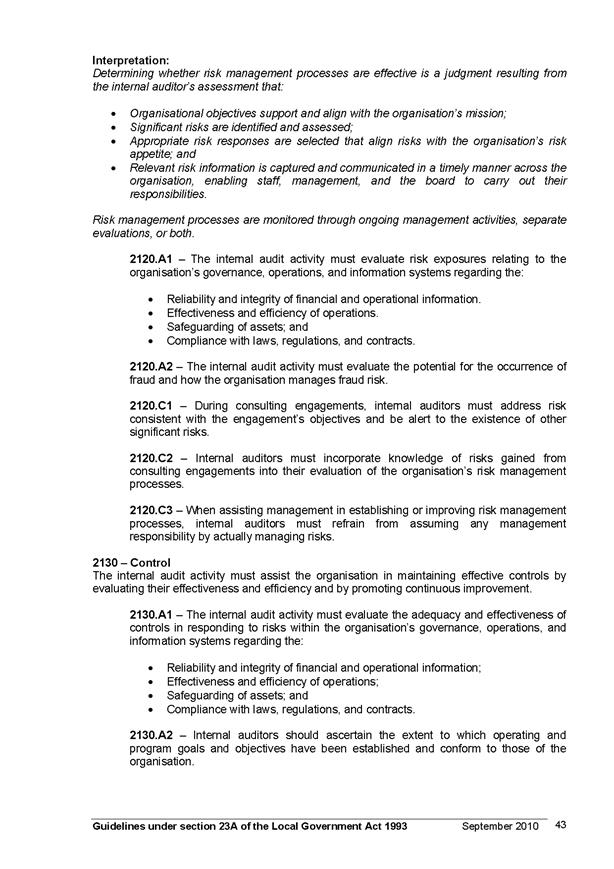
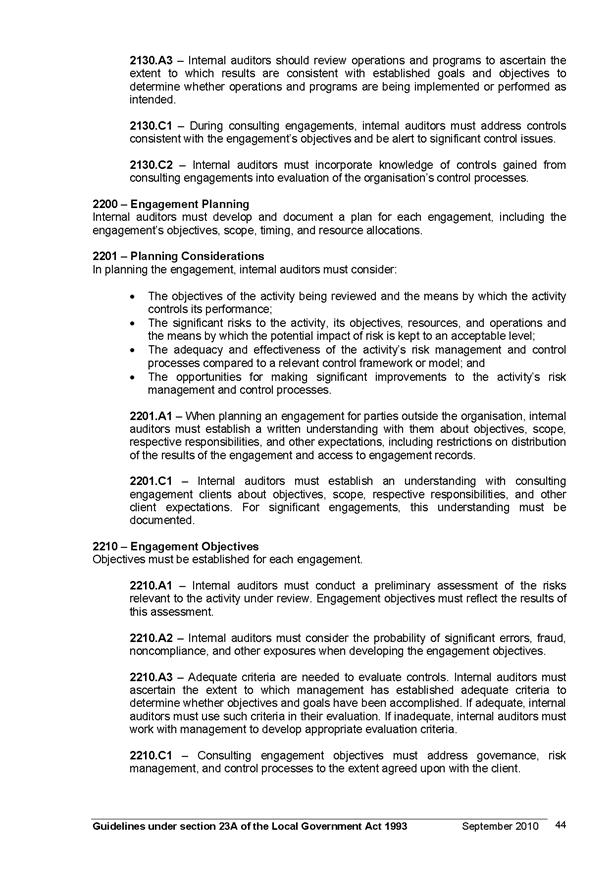
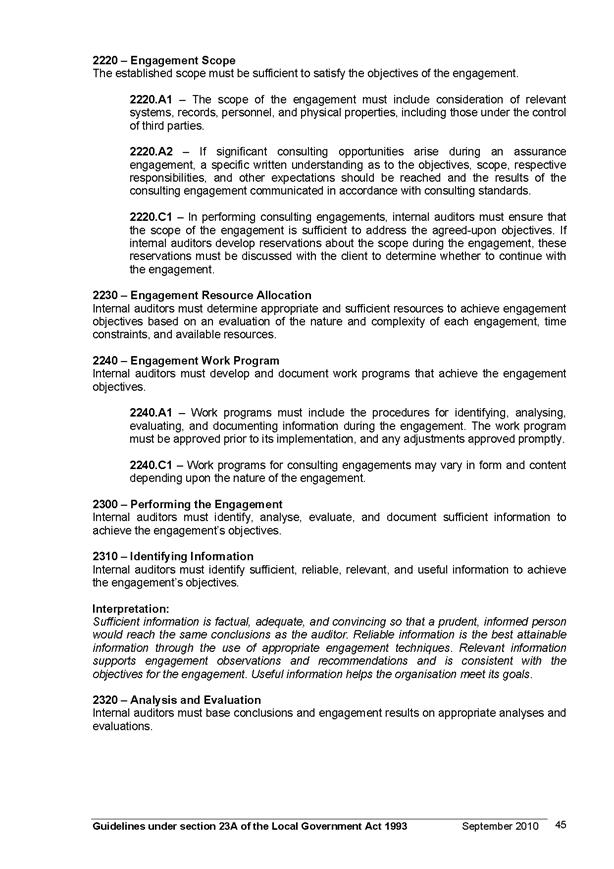
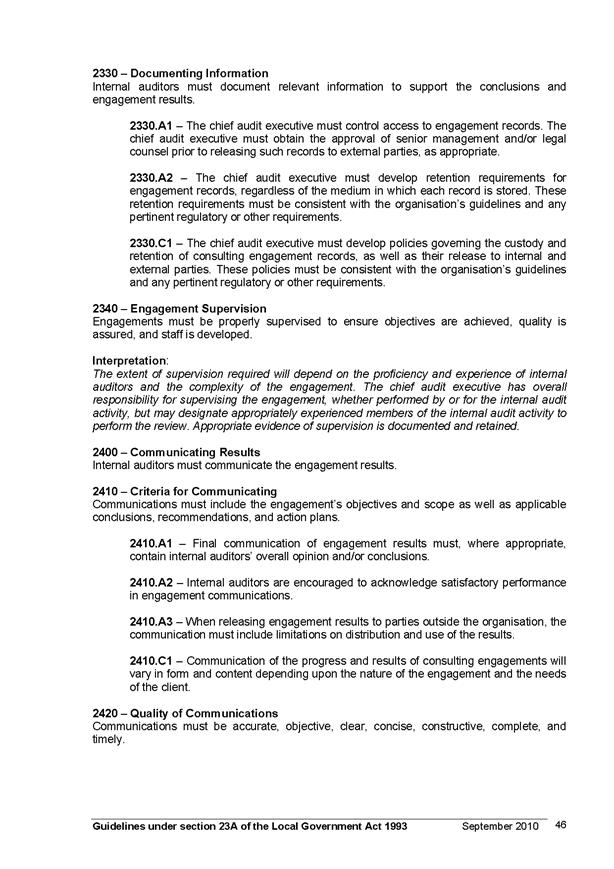
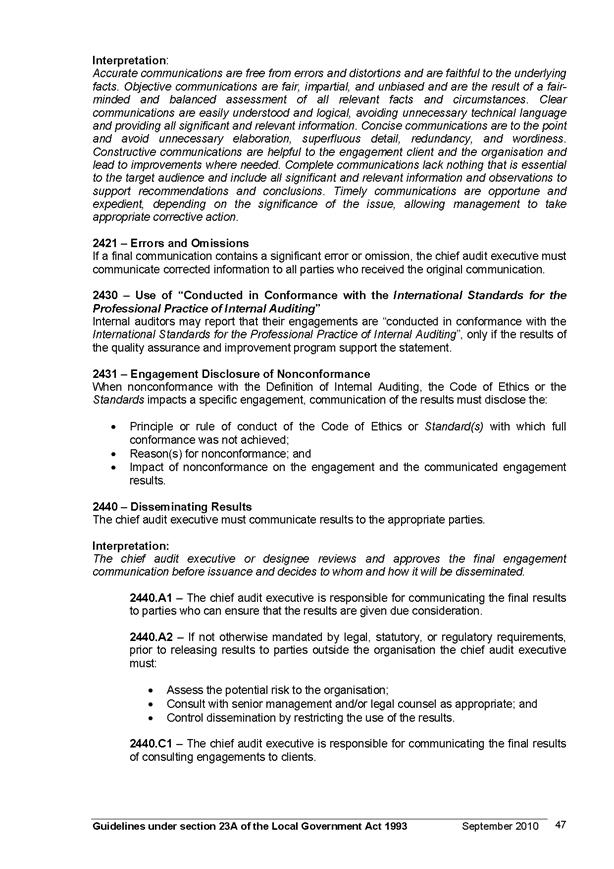
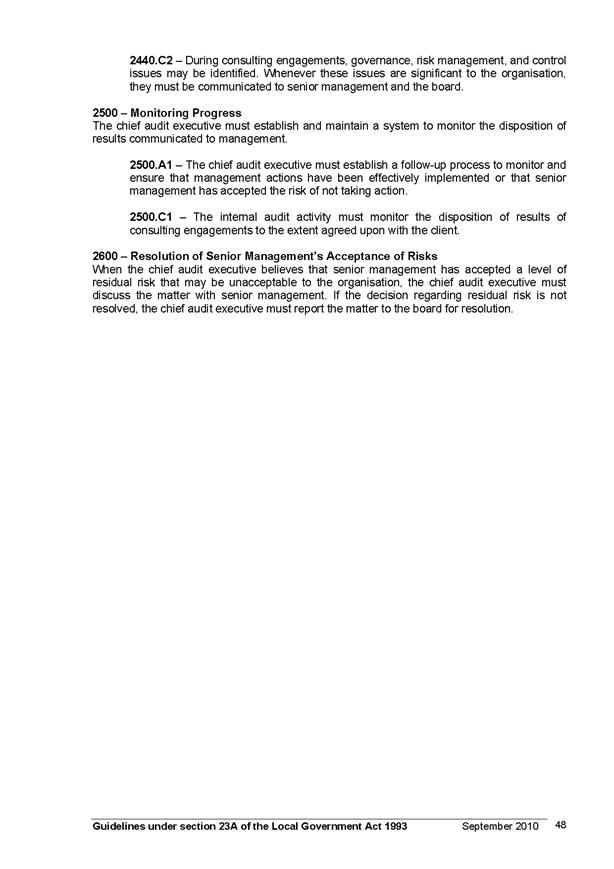
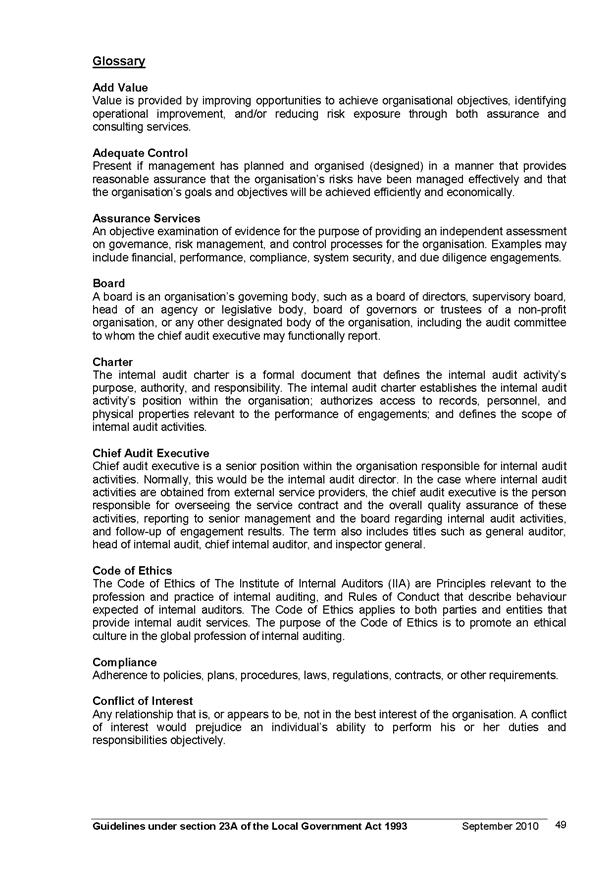
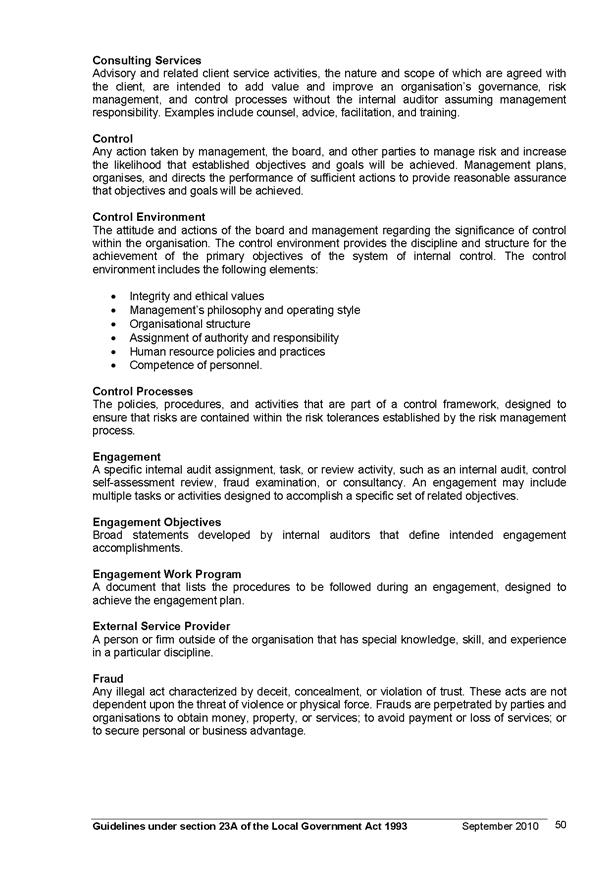
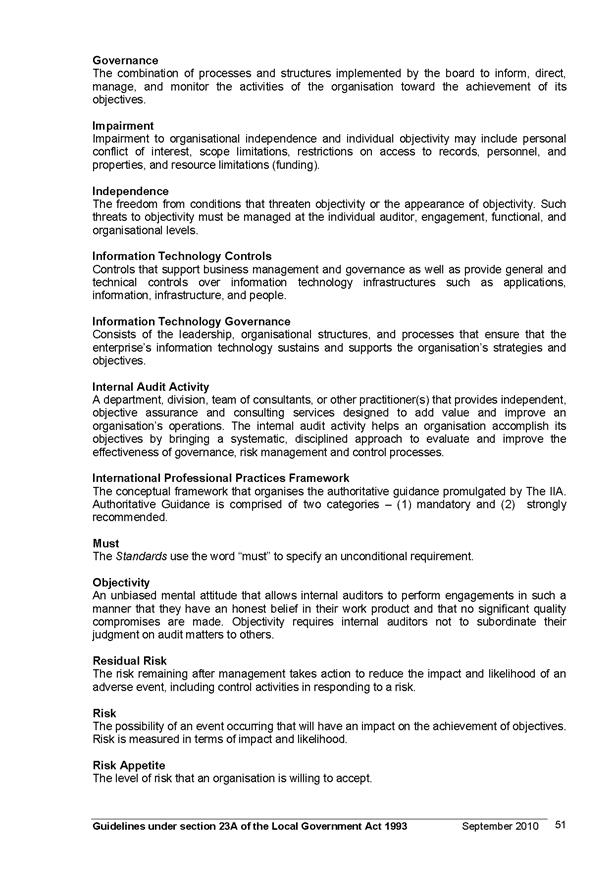
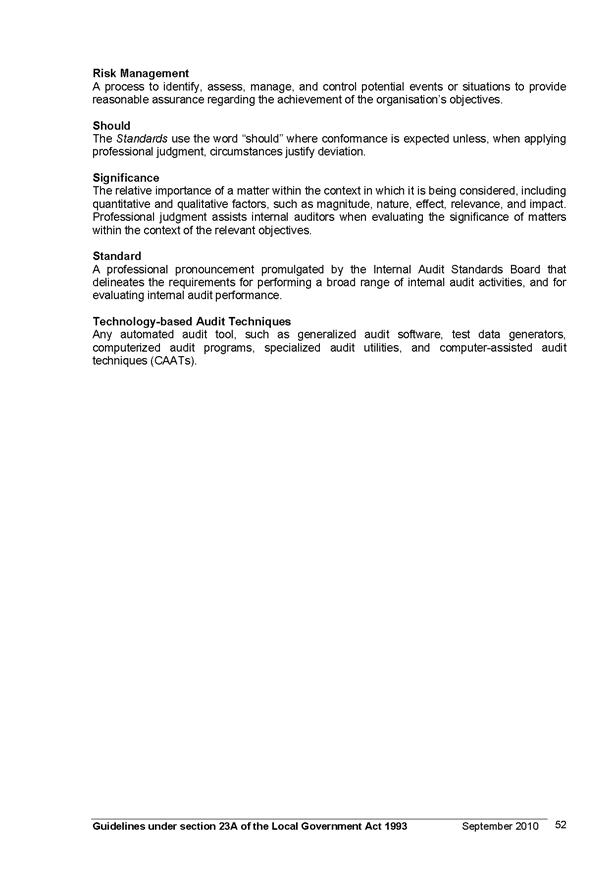
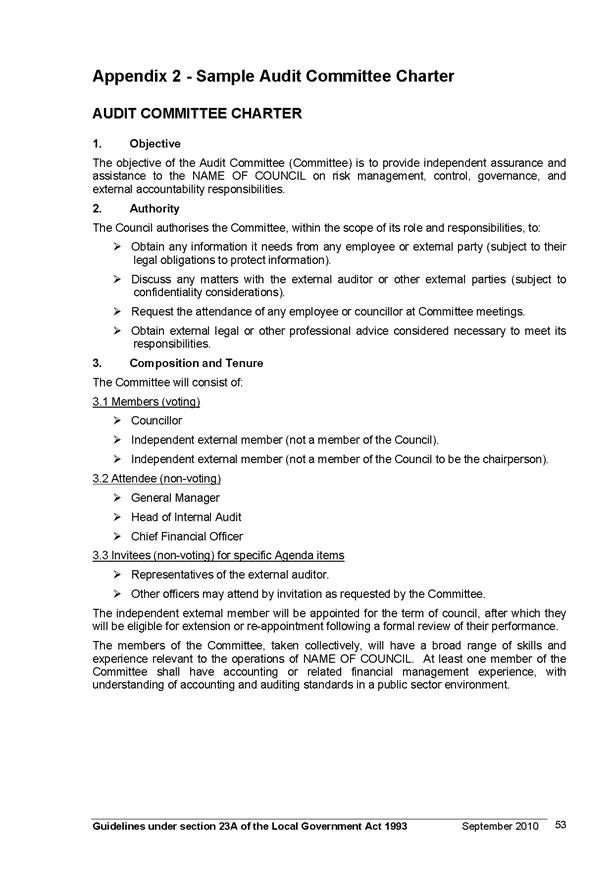
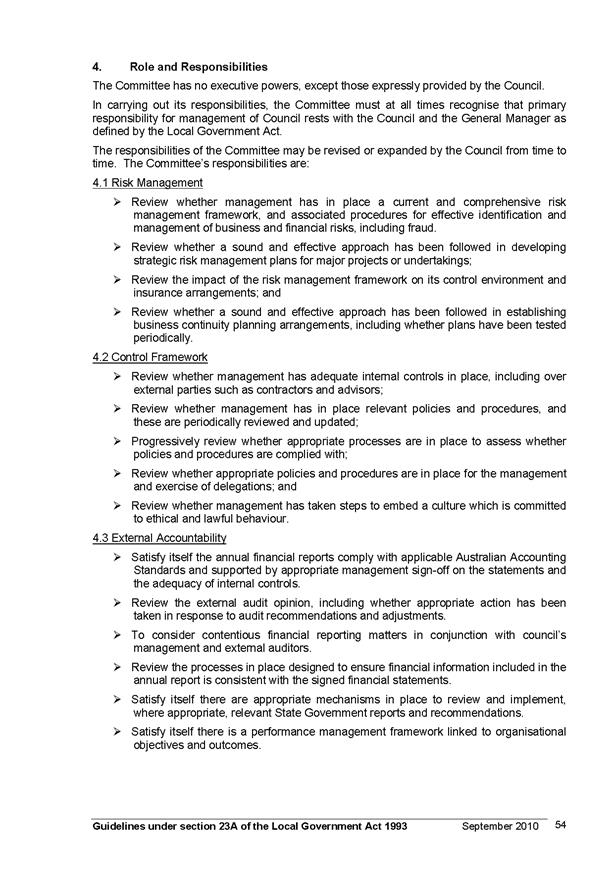
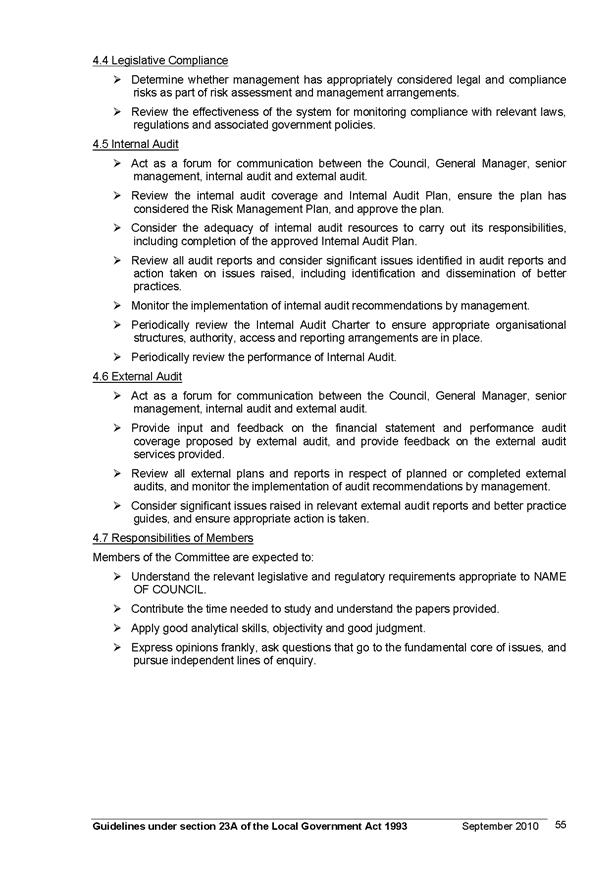
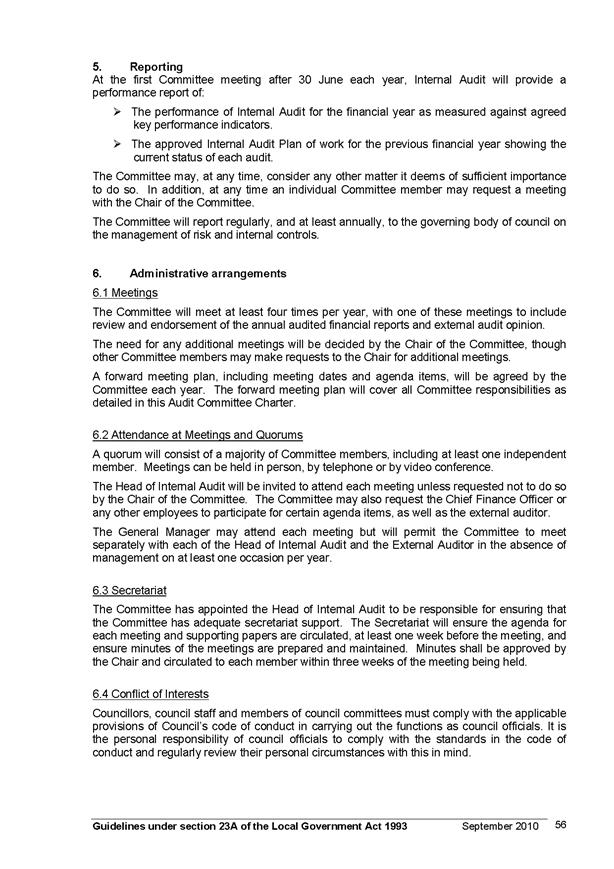
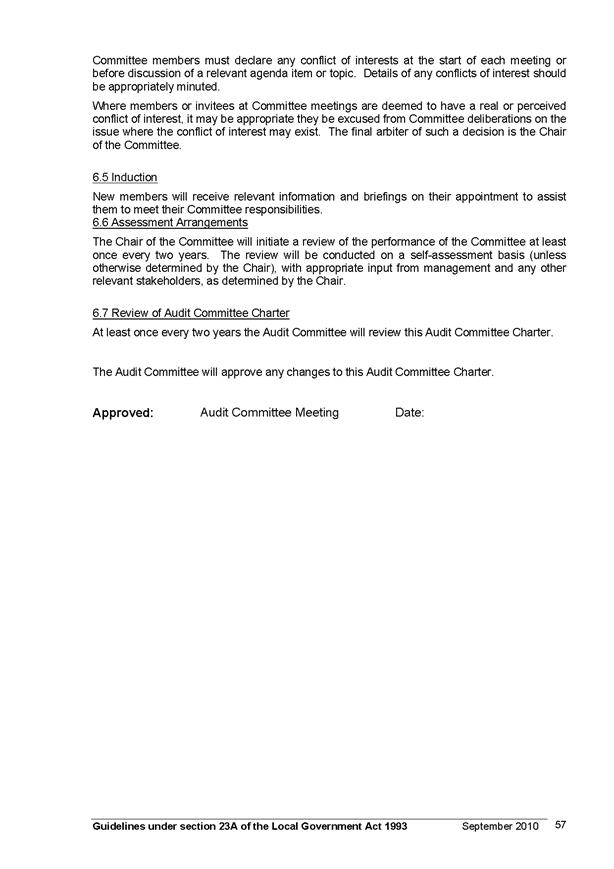
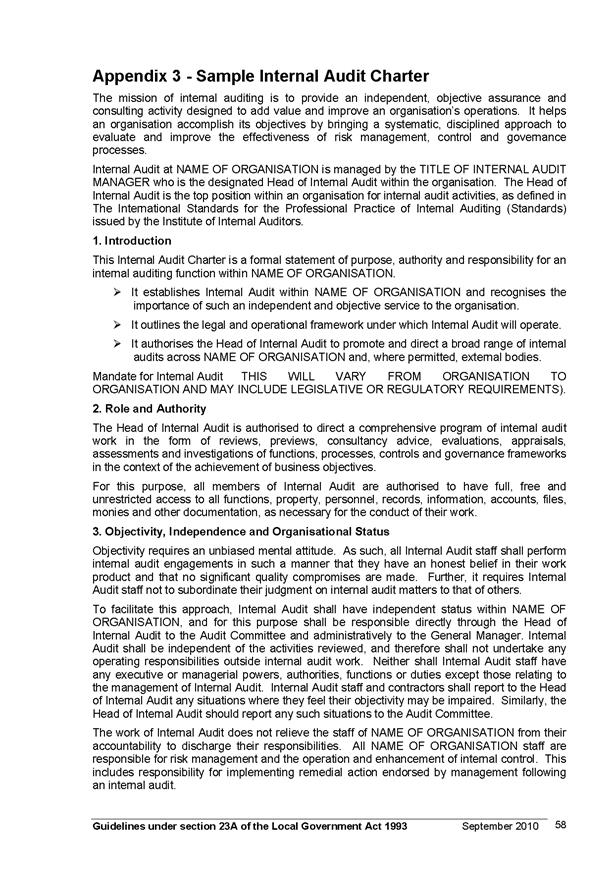
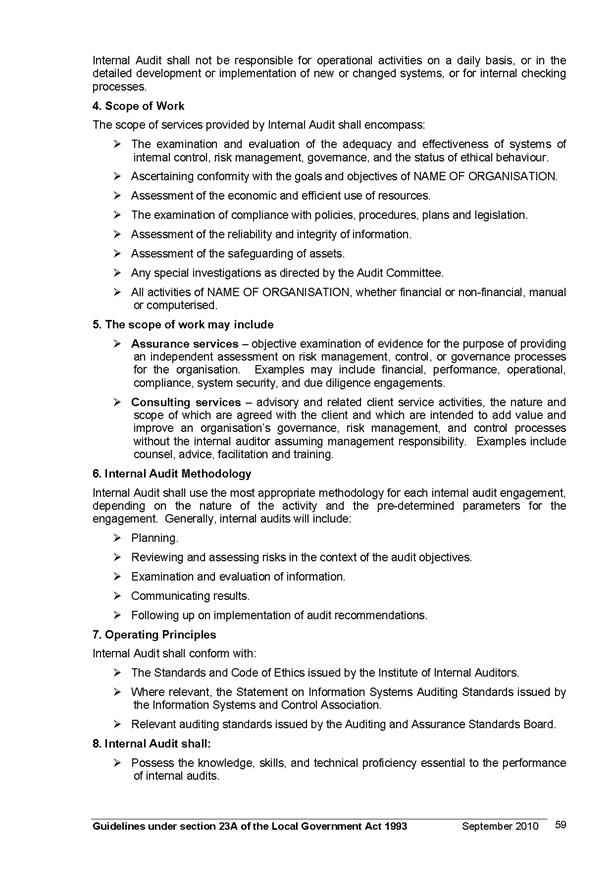
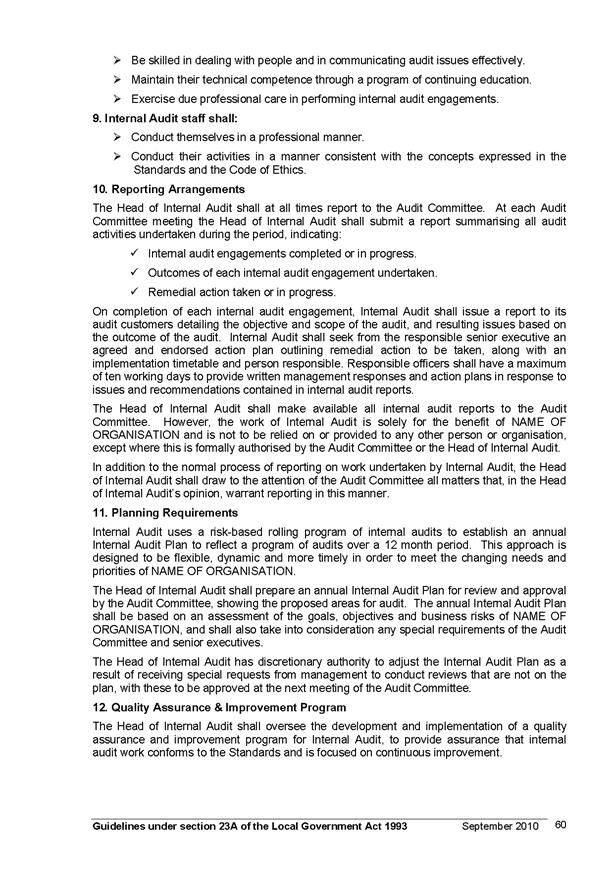
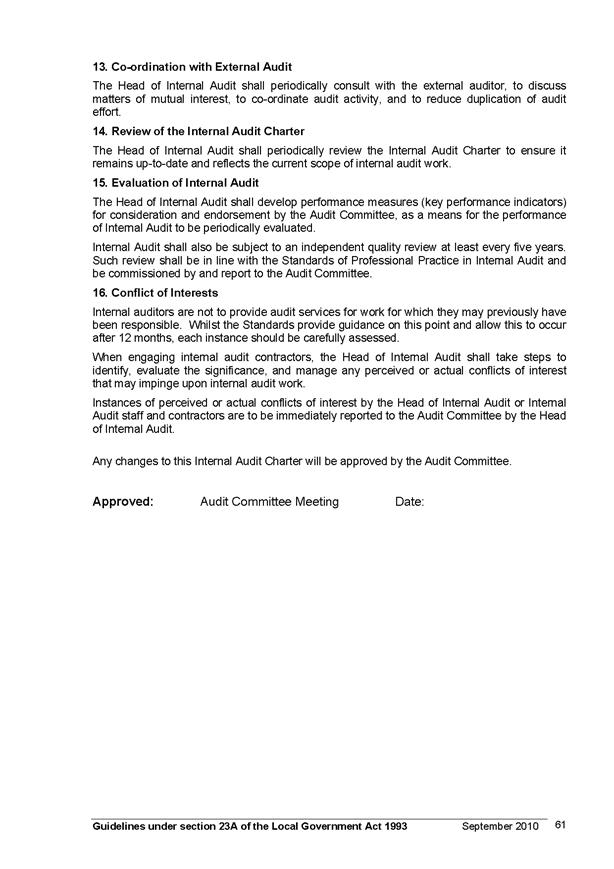
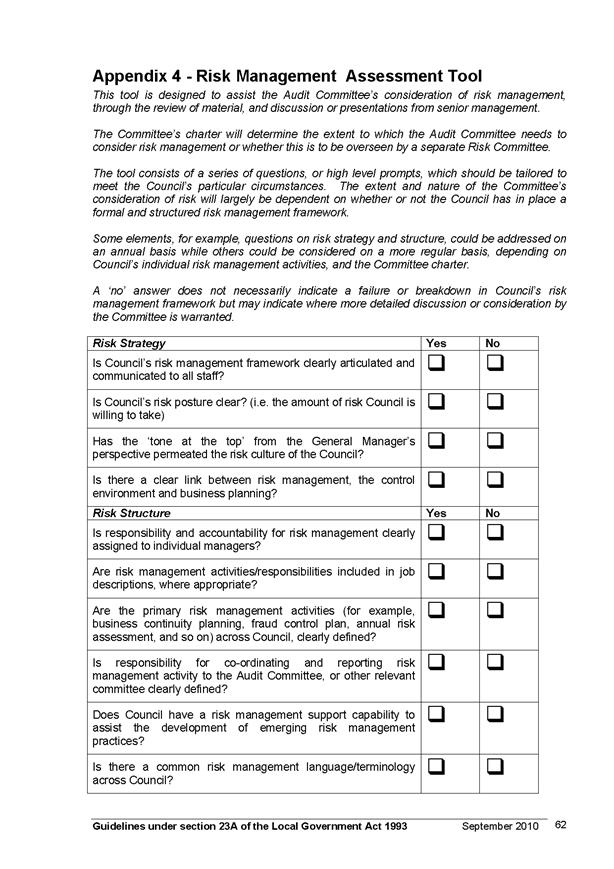
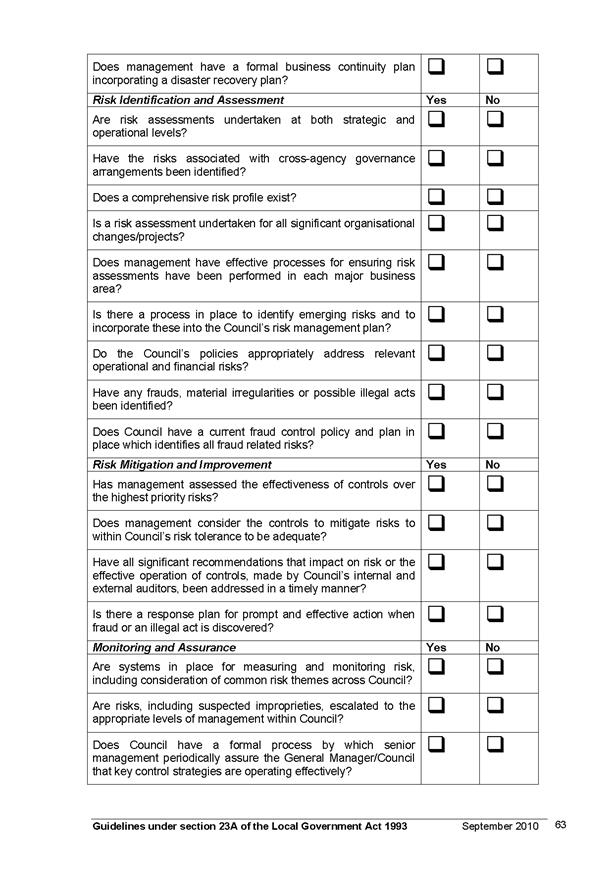
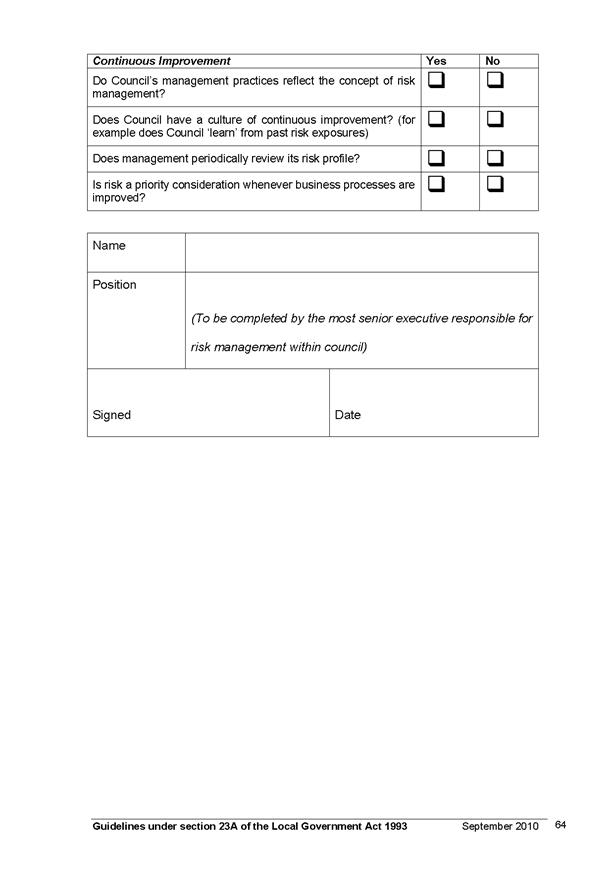
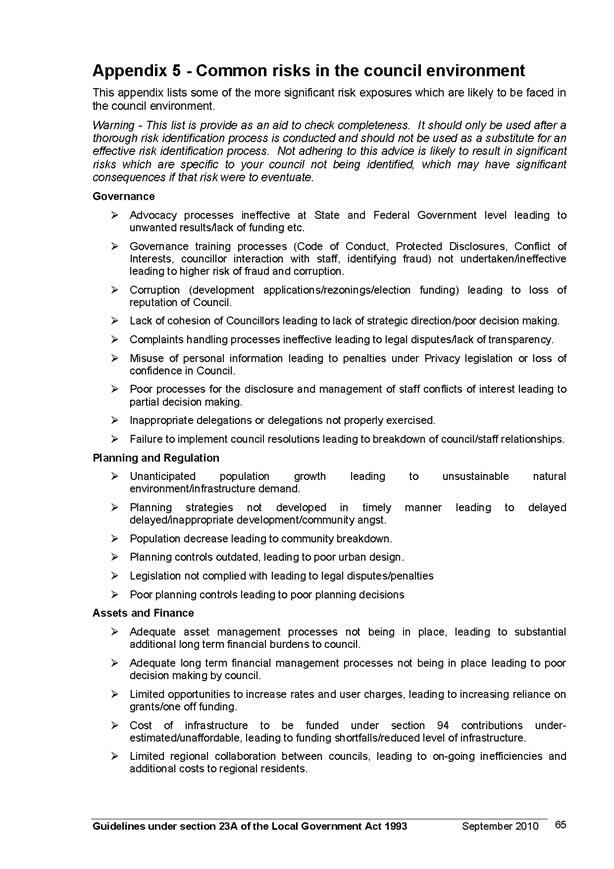
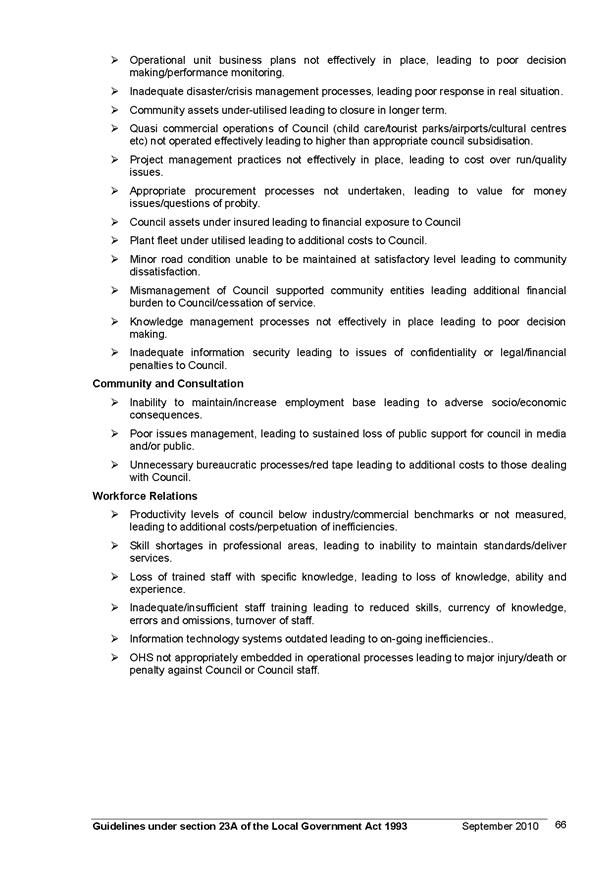
Council
Meeting
7 November 2017
5.8 Independent
Members of the Audit and Risk Management Committee
Attachment 3 Gillooly
Application

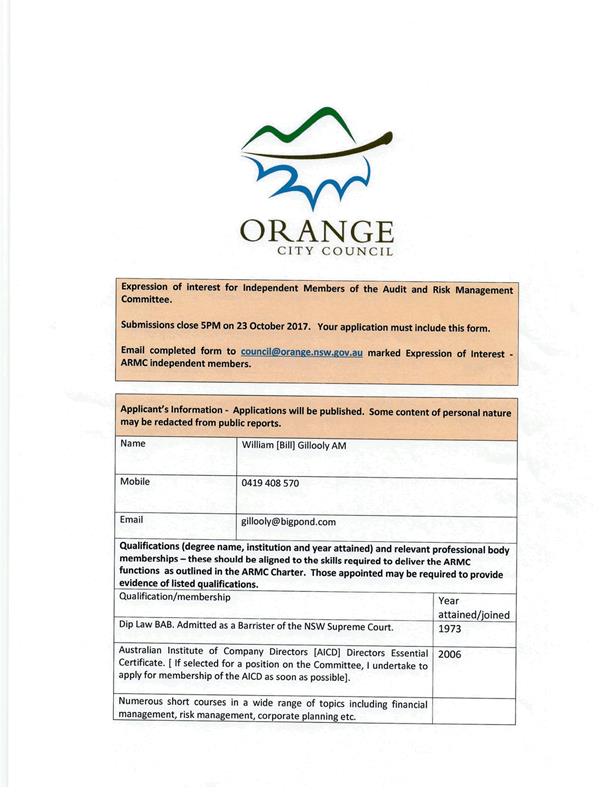

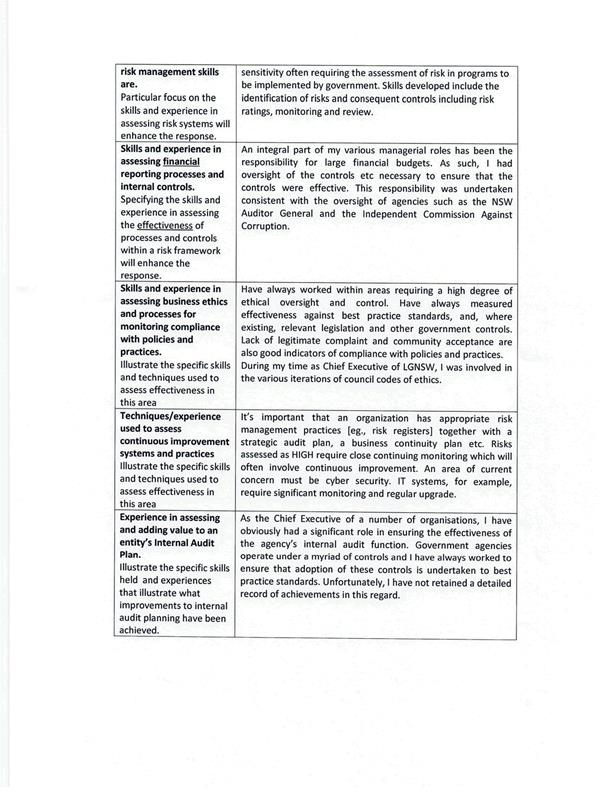

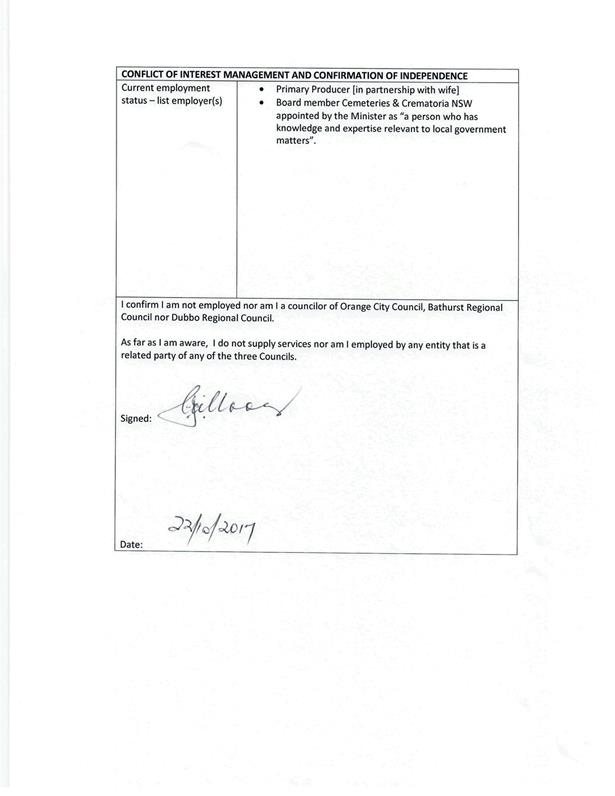
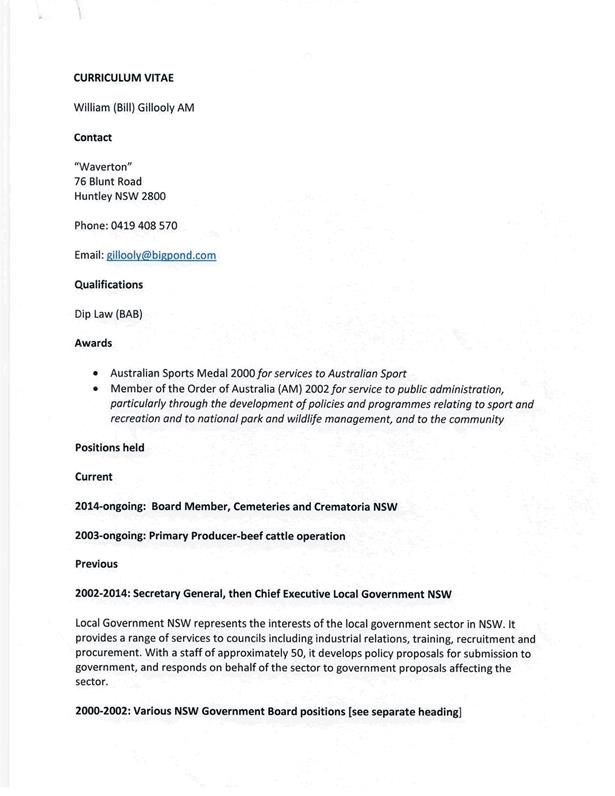
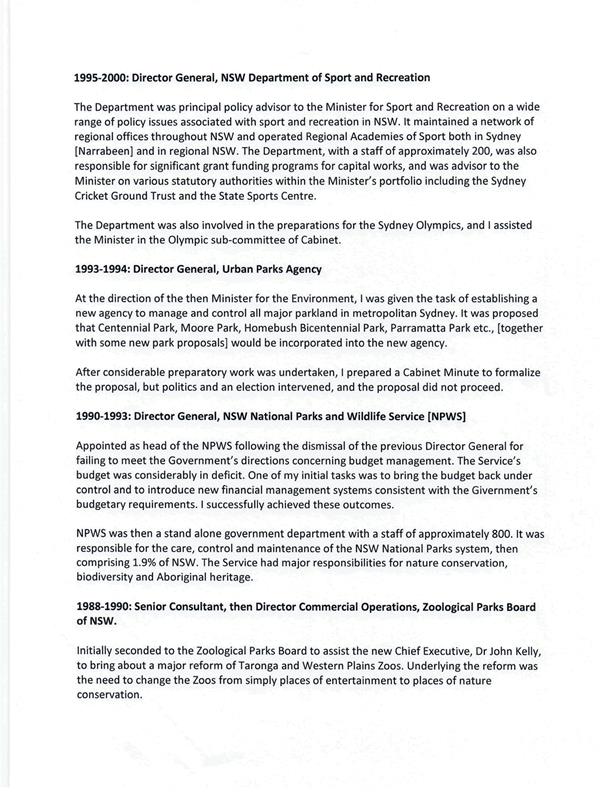
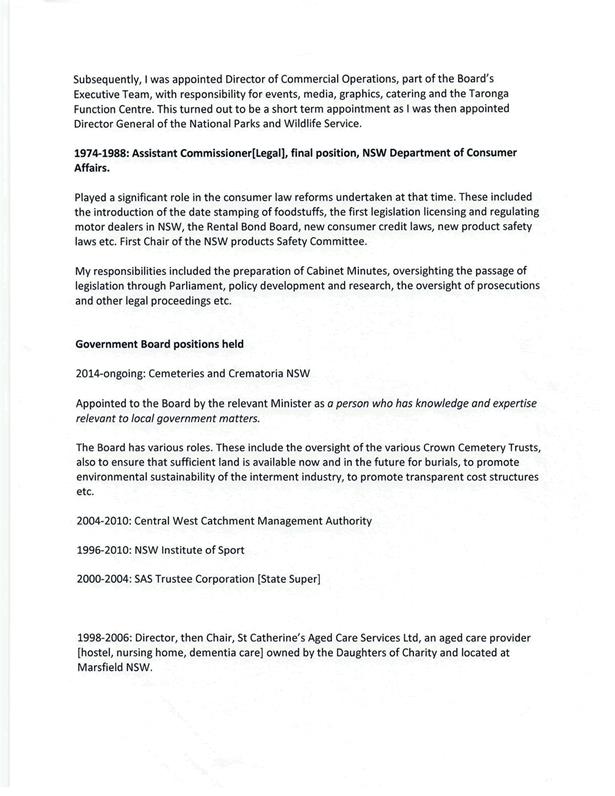
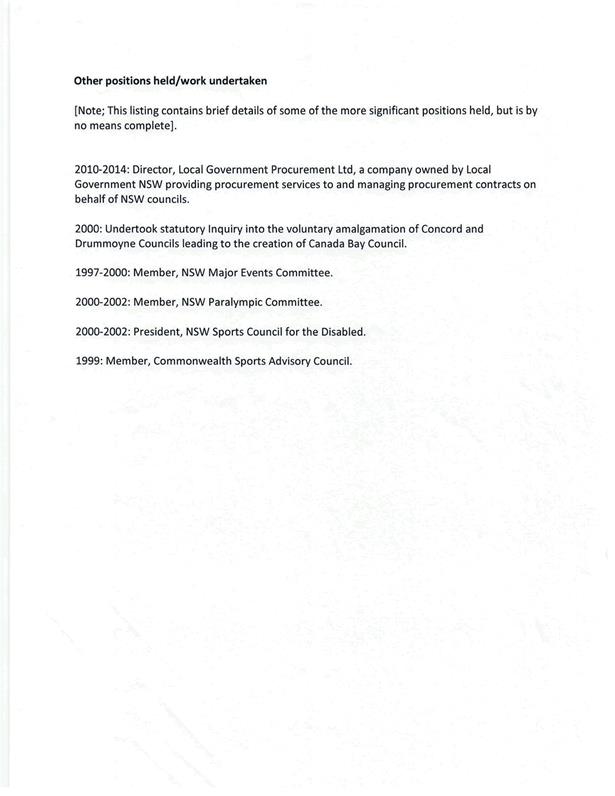
Council
Meeting
7 November 2017
5.8 Independent
Members of the Audit and Risk Management Committee
Attachment 4 Quirk
Application
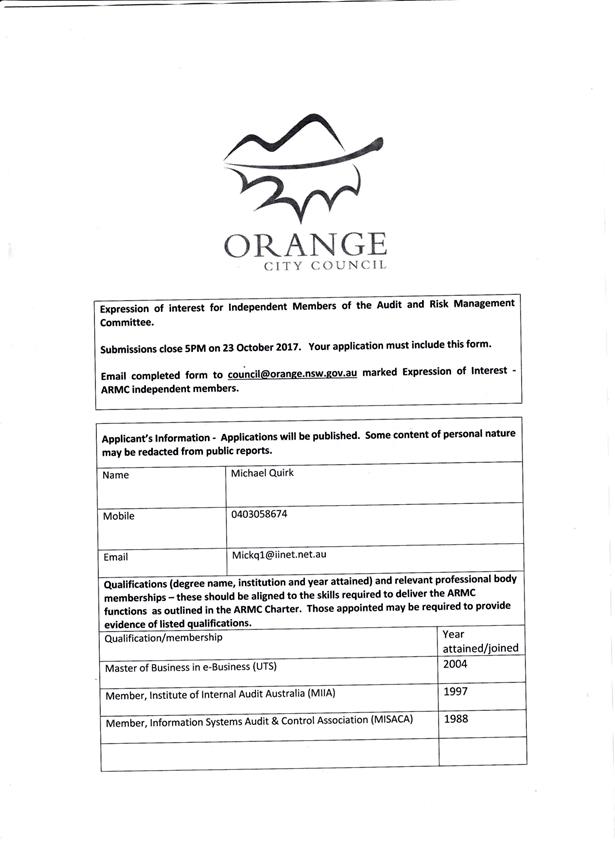
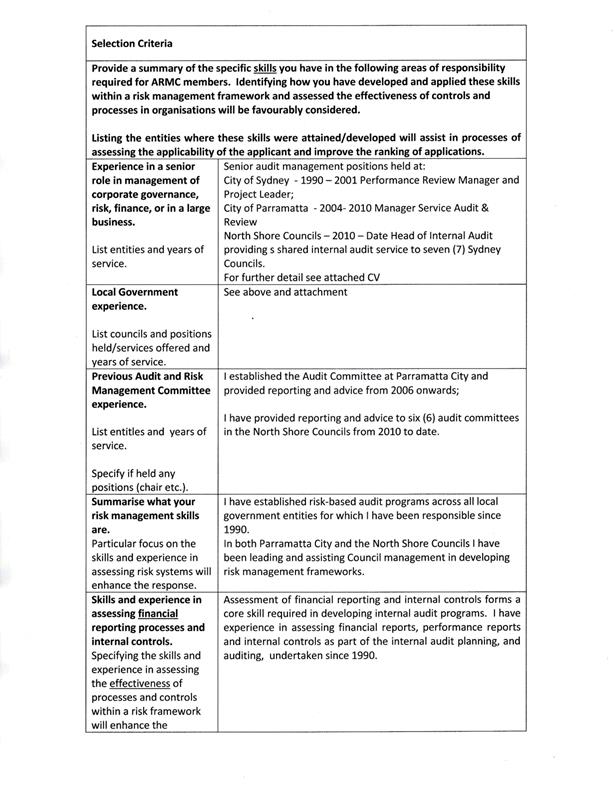
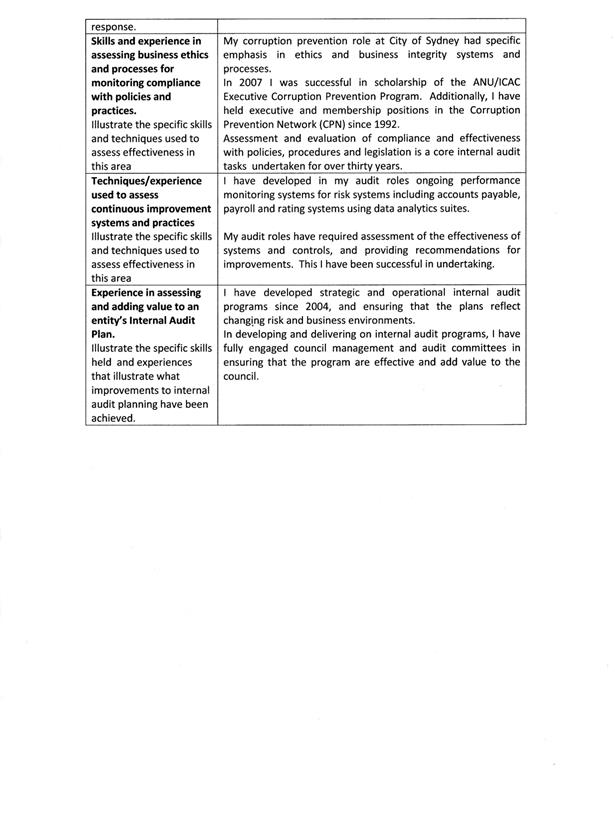
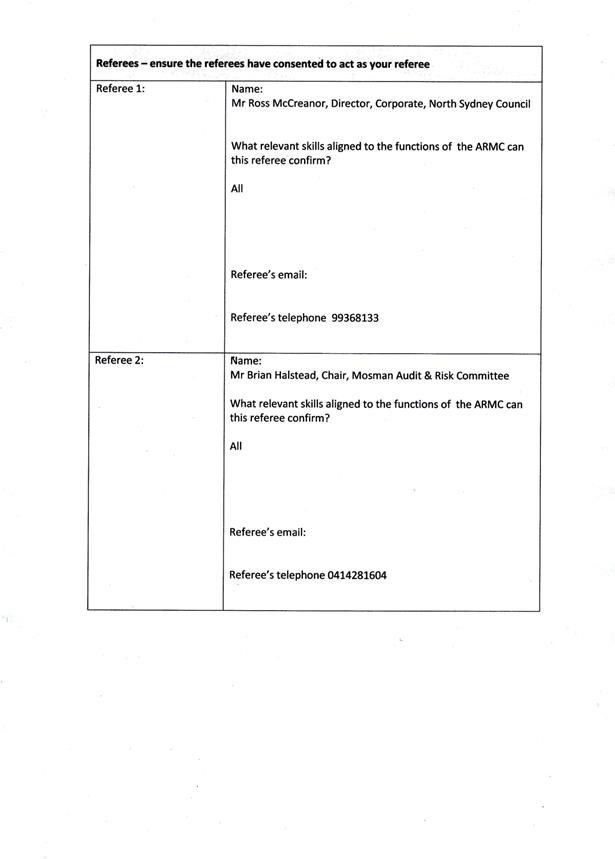
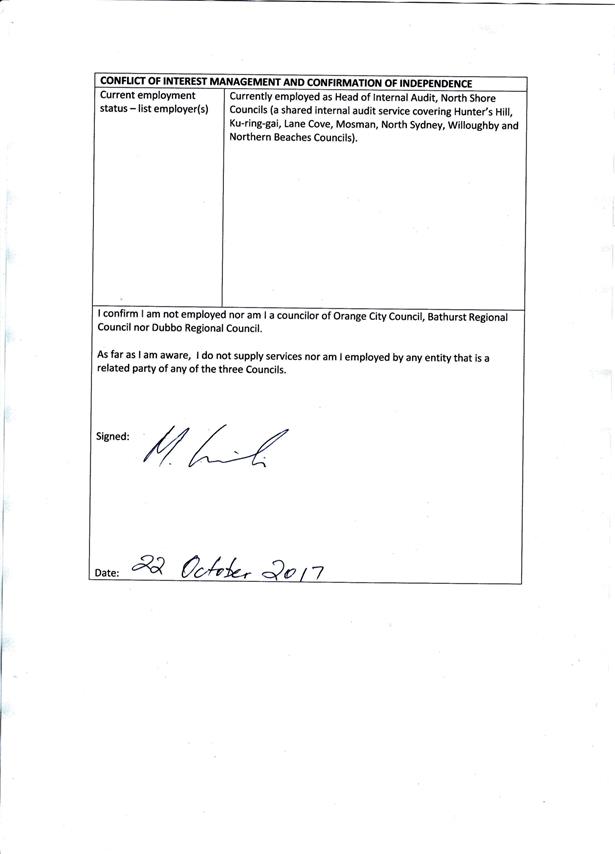
Council
Meeting
7 November 2017
5.8 Independent
Members of the Audit and Risk Management Committee
Attachment 5 Burgett
Application PDF
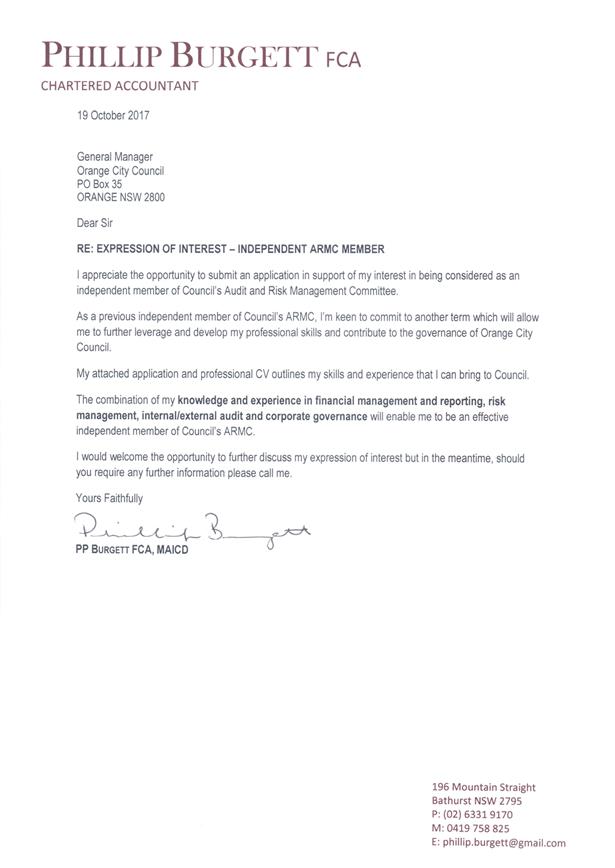
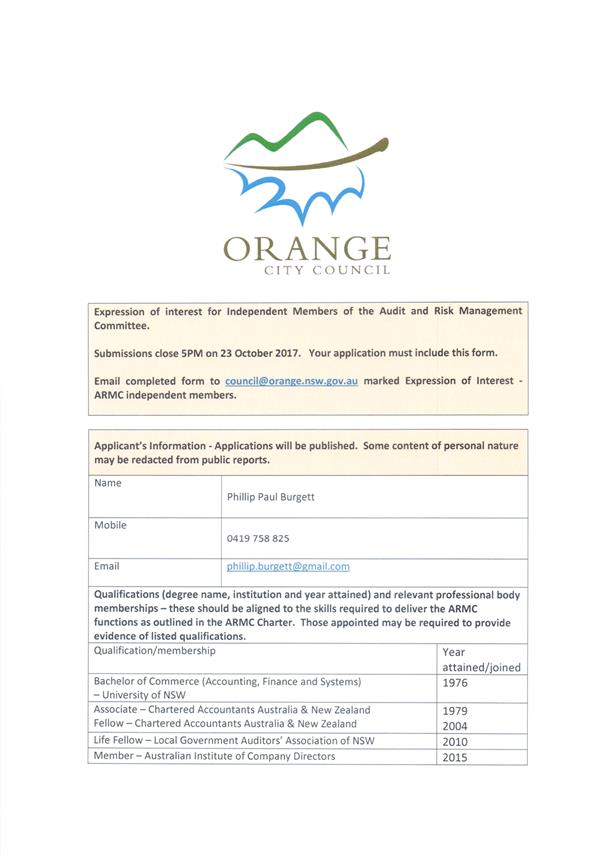
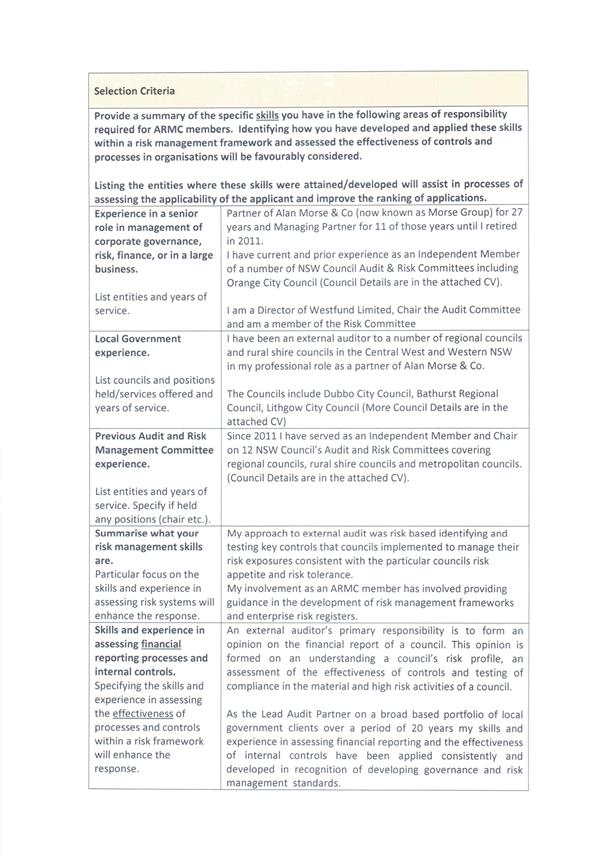
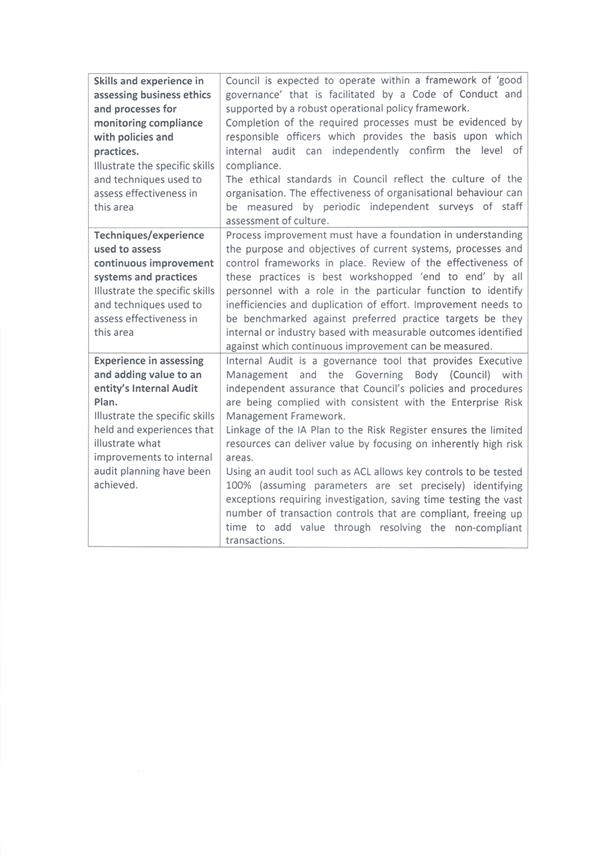
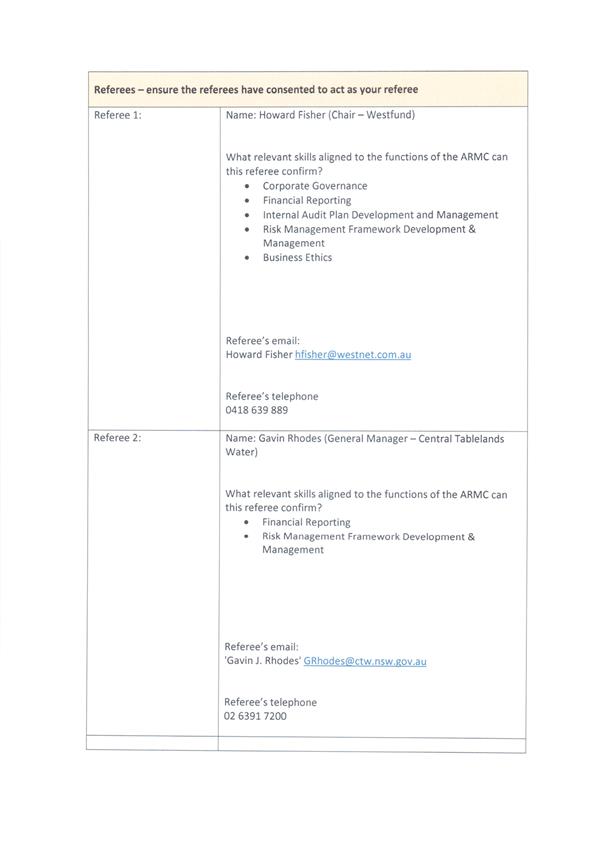
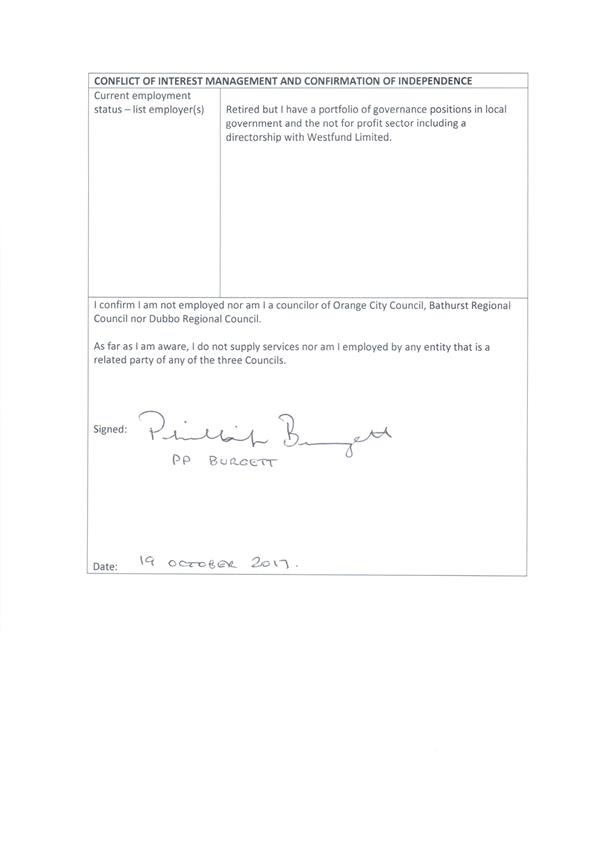
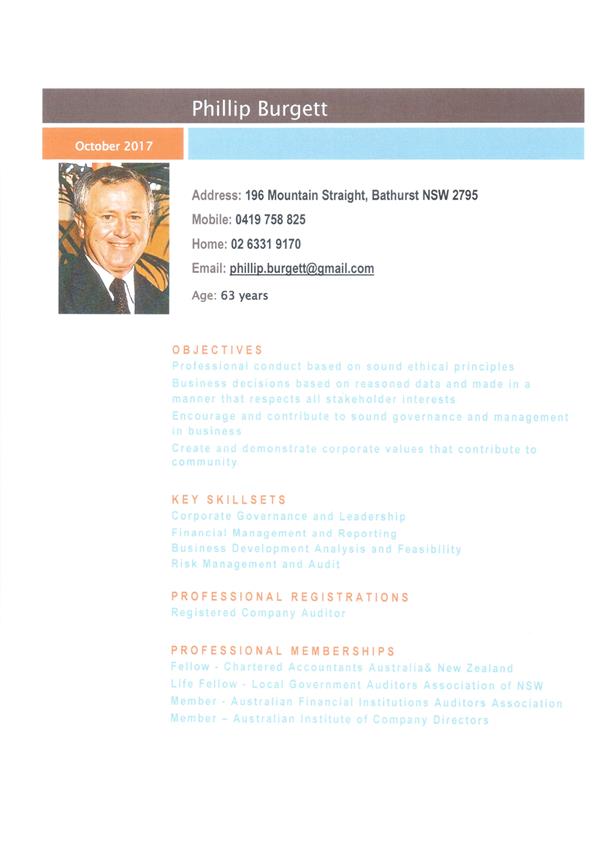
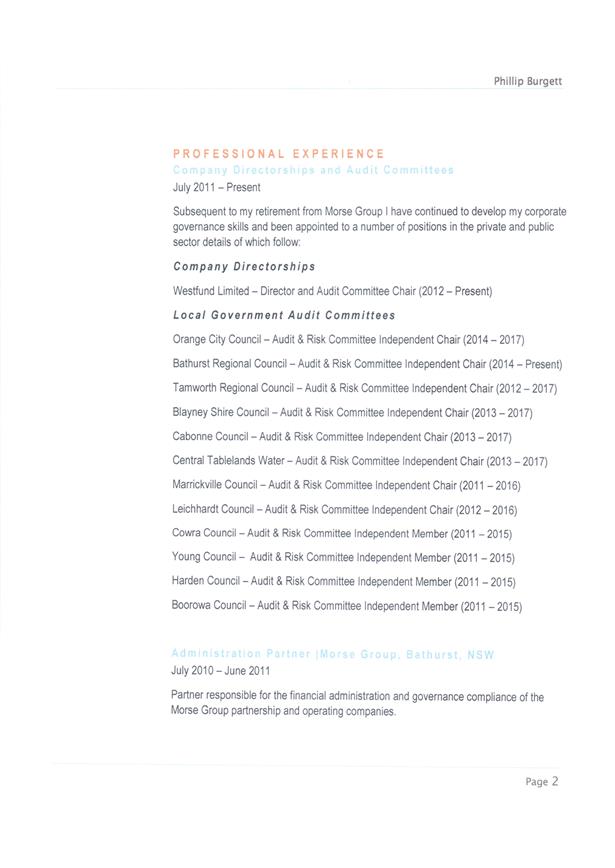
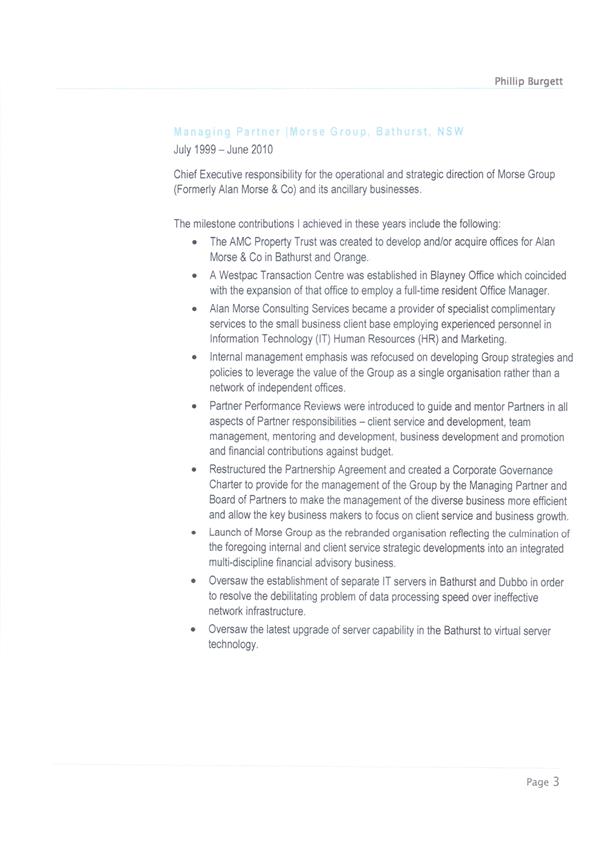
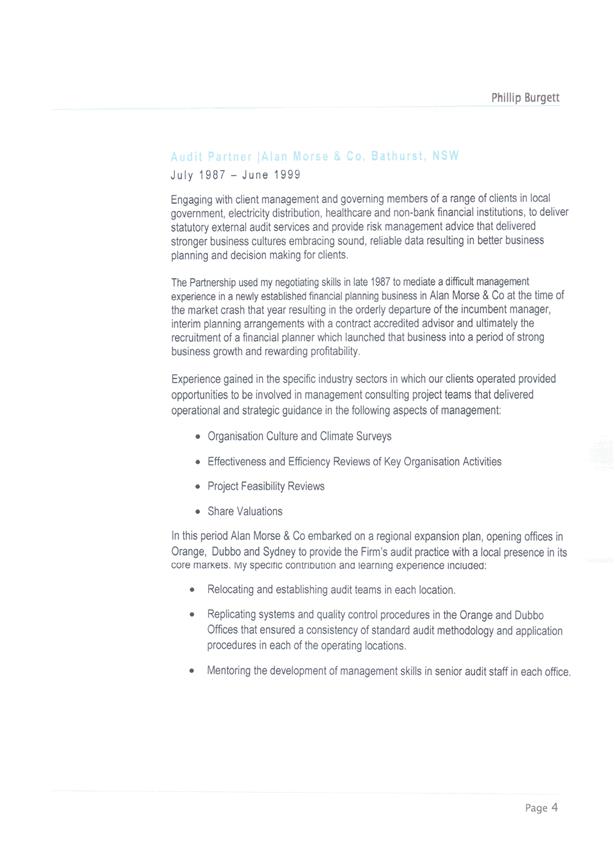
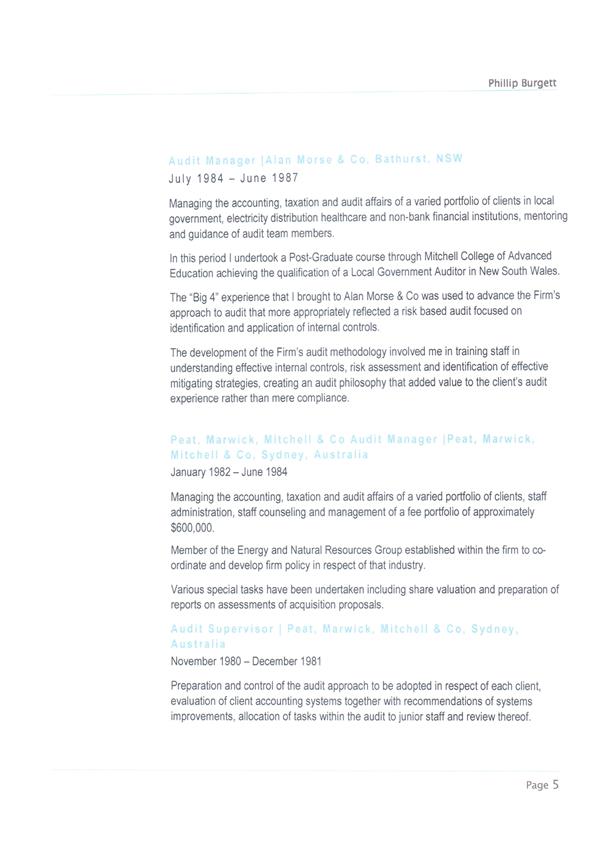
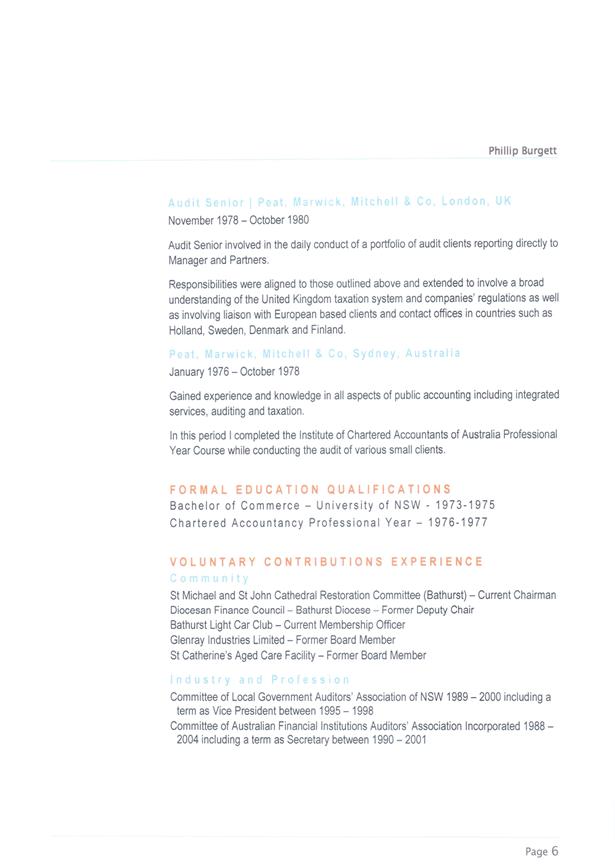
Council
Meeting
7 November 2017
5.8 Independent
Members of the Audit and Risk Management Committee
Attachment 6 Morley
Application PDF
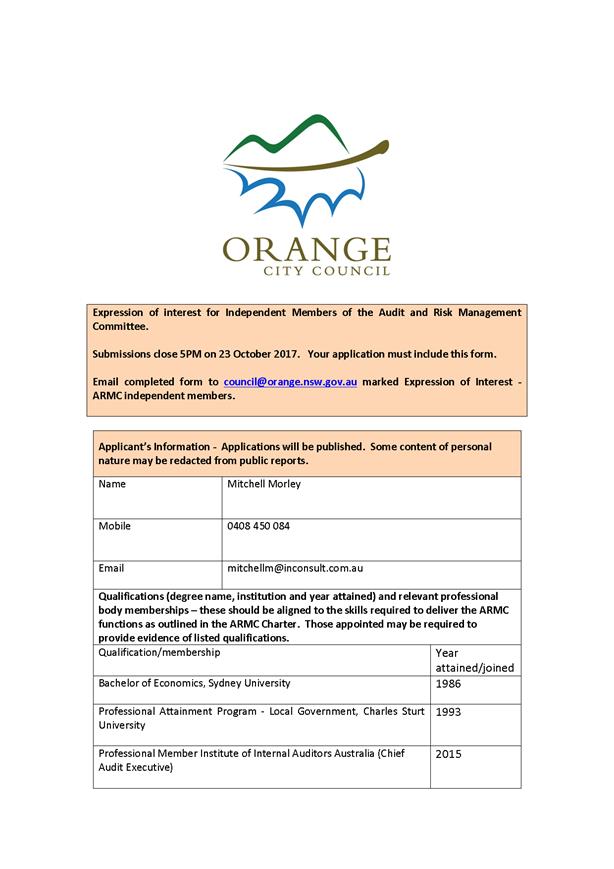
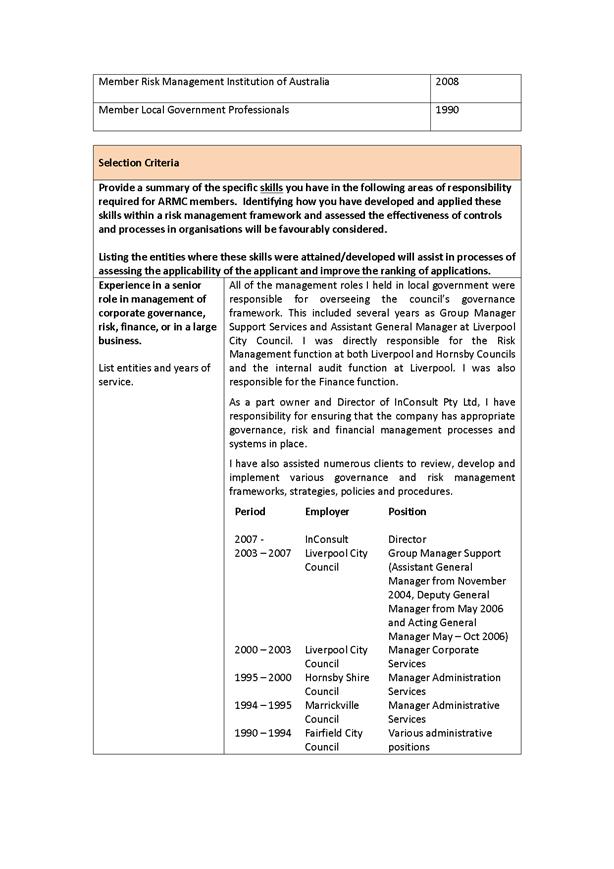
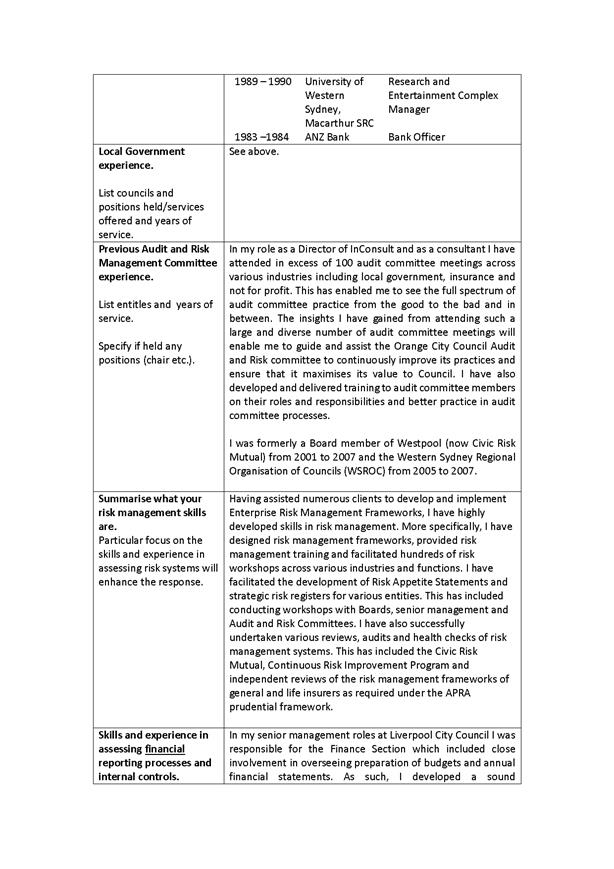
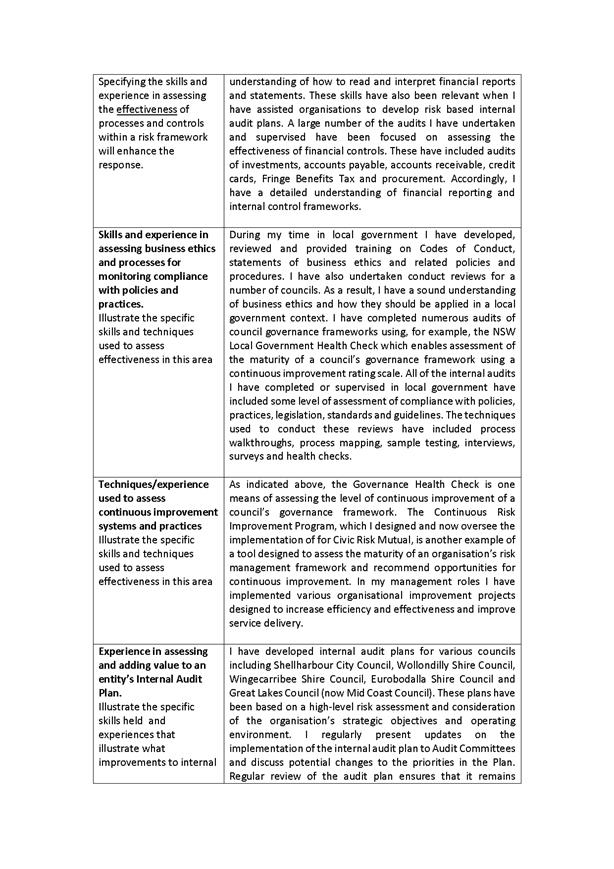

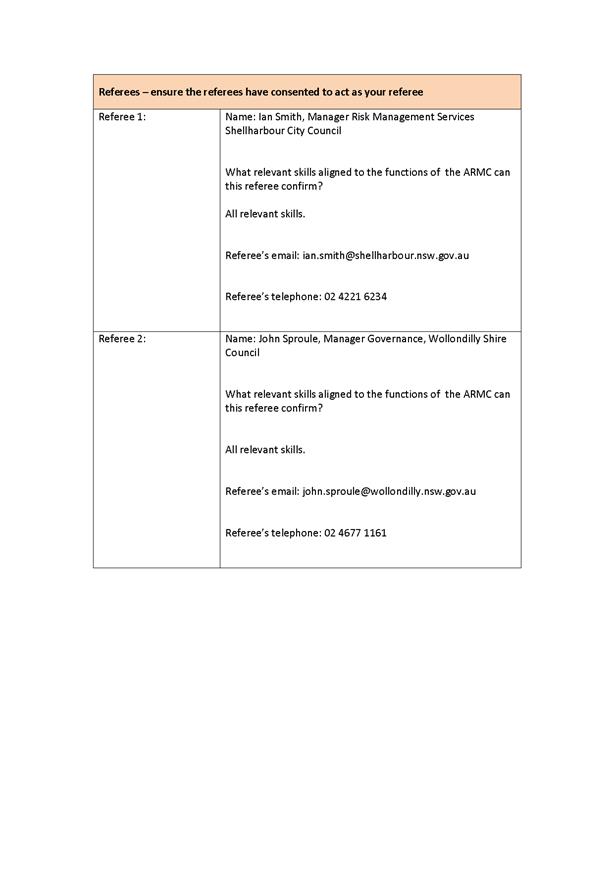
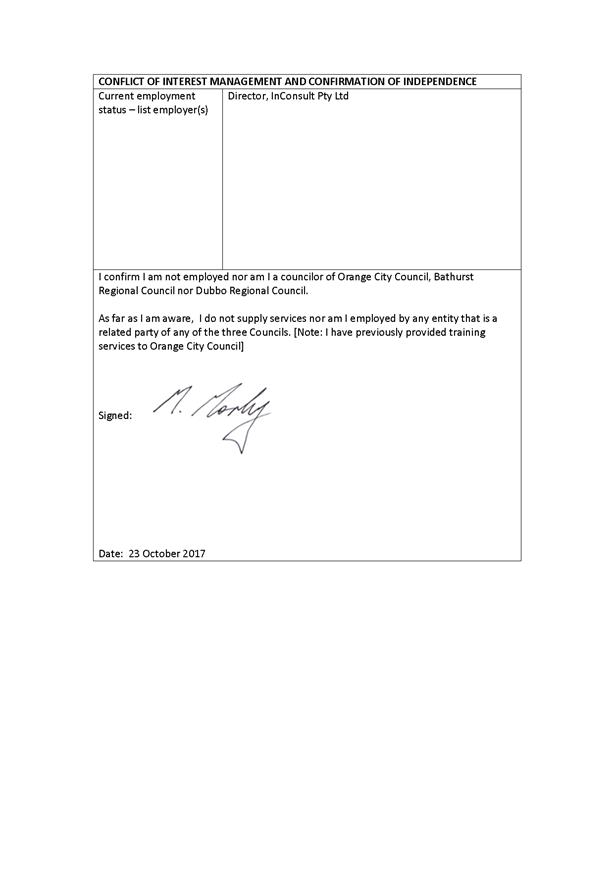
Council
Meeting
7 November 2017
5.8 Independent
Members of the Audit and Risk Management Committee
Attachment 7 Fleming
Application PDF
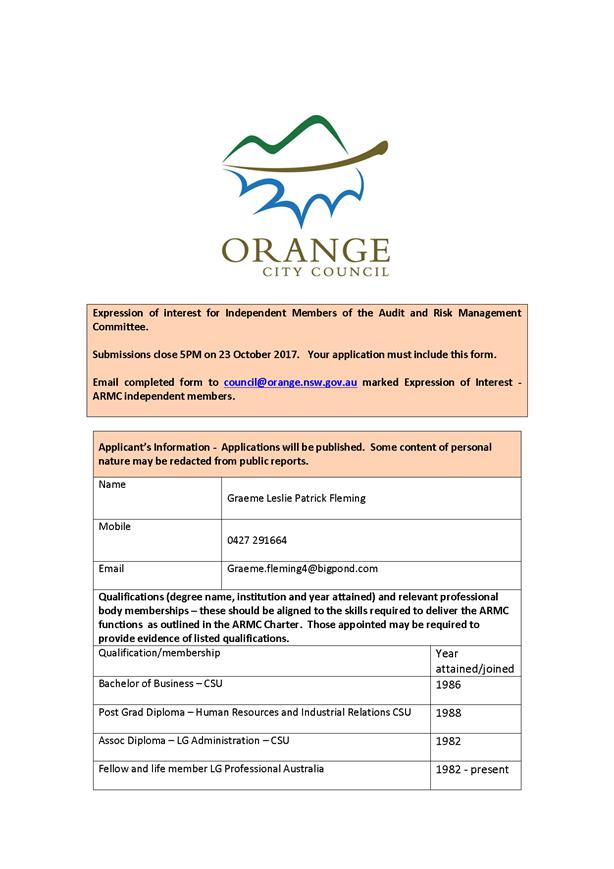
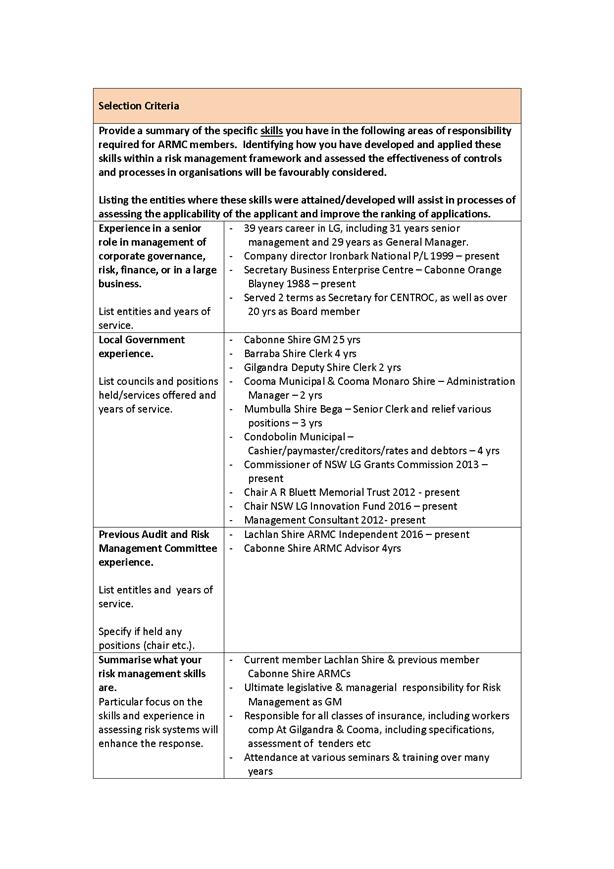
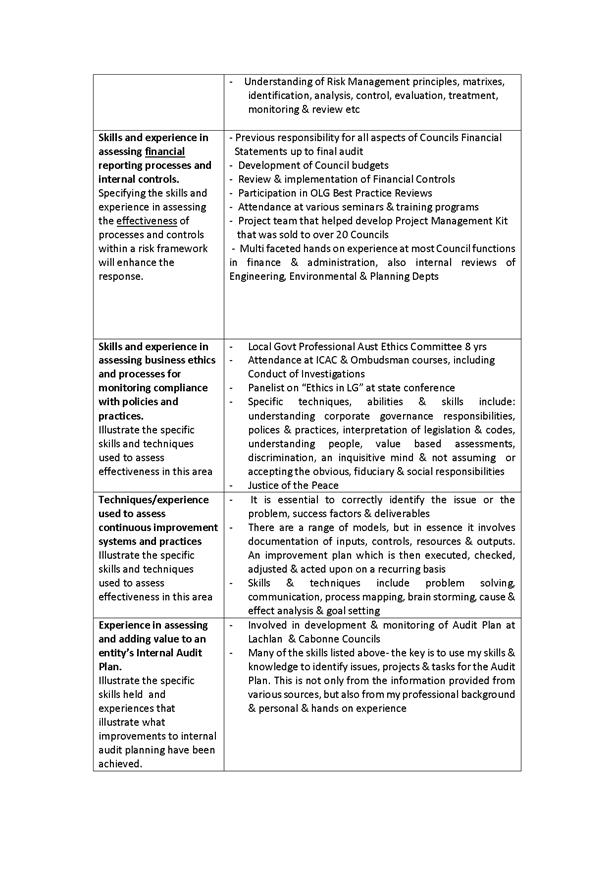
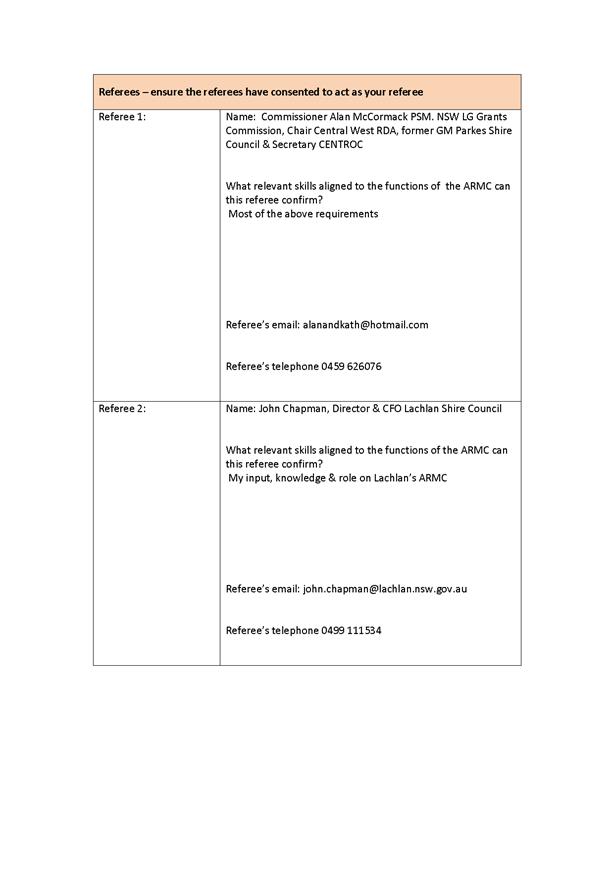
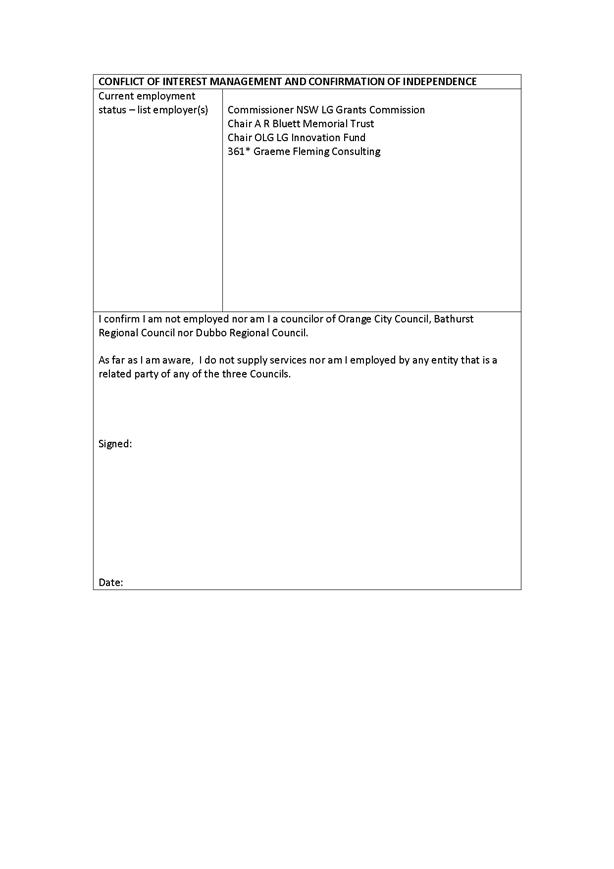
5.9 Operational
Management of the Ophir Road Resource Recovery Centre
RECORD
NUMBER: 2017/2161
AUTHOR: Wayne
Davis, Manager Waste Services and Technical Support
EXECUTIVE Summary
This report outlines the arrangements in place for the
operation of the Ophir Road Resource Recovery Centre, particularly in relation
to the procedures used by staff and contractors for the operation of the
weighbridge and the Recovery Shop, as requested by Council.
Link To Delivery/OPerational Plan
The recommendation in this report relates to the
Delivery/Operational Plan strategy “15.3 Our Environment
– Maintain and renew waste recovery infrastructure assets and services as
specified within the Asset Management Plan at agreed levels of service”.
Financial Implications
Nil
Policy and Governance Implications
Nil
|
Recommendation
That the report by the Manager Waste Services and
Technical Support detailing Operational Management of the Ophir Road Resource
Recovery Centre be acknowledged.
|
further considerations
Consideration has been given to the
recommendation’s impact on Council’s service delivery; image and
reputation; political; environmental; health and safety; employees;
stakeholders and project management; and no further implications or risks have
been identified.
SUPPORTING INFORMATION
The Ophir Road Resource Recovery Centre site was established
in the 1960s with Council taking over its operations in 1994 from a private
contractor. At that point the site was not licenced and it was purely a
landfill with no resource recovery operations being undertaken on the site.
Significant infrastructure upgrades and resource recovery operations have been
implemented over the past 23 years and it is licenced with the Environment
Protection Authority with annual reporting of waste volumes and environmental
monitoring results being administered by Council.
The Ophir Road site is part of an integrated and advanced
waste management system that acts as the primary receival and processing
facility prior to distributing waste streams to respective resource recovery or
landfill destinations. Five other local government authorities (Bathurst,
Blayney, Cabonne, Forbes and Parkes) also access the site for the receipt and
bulk transfer of recyclables to the Visy Material Recovery Facility at Smithfield.
Council’s Euchareena Road Resource Recovery Centre
located outside of Molong is also licenced with the Environment Protection
Authority and is the receival point of processed waste (mixed putrescible or
inert) for landfilling application or shredded food and garden organics for
compost production. Similar to the Ophir Road site, Council reports waste
volumes and environmental monitoring results to the Environment Protection
Authority on an annual basis. The Euchareena Road site commenced operations in August
2013 and is not accessible to the general public as this is an operational
condition of consent from the Department of Planning.
All operations of the Ophir Road and Euchareena Road
Resource Recovery Centres are administered in accordance with the respective
licences and detailed Operational Environmental Management Plans endorsed by
the Environment Protection Authority and Department of Planning. Within these
parameters, Council staff and sub-contracted staff also undertake their duties
in accordance with the adopted Standard Operating Procedures, Work Activity
Procedures, Safe Work Method Procedures, Council’s Code of Conduct and
Work Health and Safety Procedures and Policies.
In addition to these requirements, the contracted Wangarang
staff perform the operational requirements of the weighbridge and Recovery
Shop. Council has engaged Wangarang for these services since 1998 in accordance
with contract terms which ensures both operations align with our operational
opening times of the facility which is open 363 days of the year 8:00am to
5:00pm. Operational reconciliation of accounts is provided to Council on a
monthly basis and under the terms of the Agreement, Council and Wangarang share
equally in a profit share arrangement for the Recovery Shop sale of product.
The engagement of Wangarang provides meaningful employment
for their staff and contributes significantly to Council’s suite of
resource recovery activities and ensures re-usable product is kept out of
landfill.
6 Closed Meeting
- See Closed Agenda
The General Manager will advise the Council if any written
submissions have been received relating to any item advertised for consideration
by a closed meeting of Orange City Council.
The Mayor will extend an invitation to any member of the
public present at the meeting to make a representation to Council as to whether
the meeting should be closed for a particular item.
In accordance with the Local Government Act 1993, and
the Local Government (General) Regulation 2005, in the opinion of the General
Manager, the following business is of a kind as referred to in Section 10A(2)
of the Act, and should be dealt with in a Confidential Session of the Council meeting
closed to the press and public.
|
Recommendation
That Council adjourn into a Closed Meeting and members of
the press and public be excluded from the Closed Meeting, and access to the
correspondence and reports relating to the items considered during the course
of the Closed Meeting be withheld unless declassified by separate resolution.
This action is taken in accordance with Section 10A(2) of the Local
Government Act, 1993 as the items listed come within the following provisions:
6.1 Tender
for Contract Project Management Services
This item is classified CONFIDENTIAL under the
provisions of Section 10A(2) of the Local Government Act 1993, which permits
the meeting to be closed to the public for business relating to (c) information
that would, if disclosed, confer a commercial advantage on a person with whom
the Council is conducting (or proposes to conduct) business.
|
6.1 Tender
for Contract Project Management Services
TRIM
REFERENCE: 2017/2088
AUTHOR: John
Boyd, Operations Manager
Reason
for Confidentiality
This item is
classified CONFIDENTIAL under the provisions of Section 10A(2) of the Local
Government Act 1993, which permits the meeting to be closed to the public for
business relating to (c) information that would, if disclosed, confer a
commercial advantage on a person with whom the Council is conducting (or
proposes to conduct) business.

































































































































































































































































































































